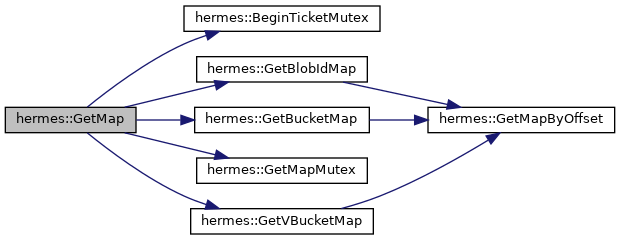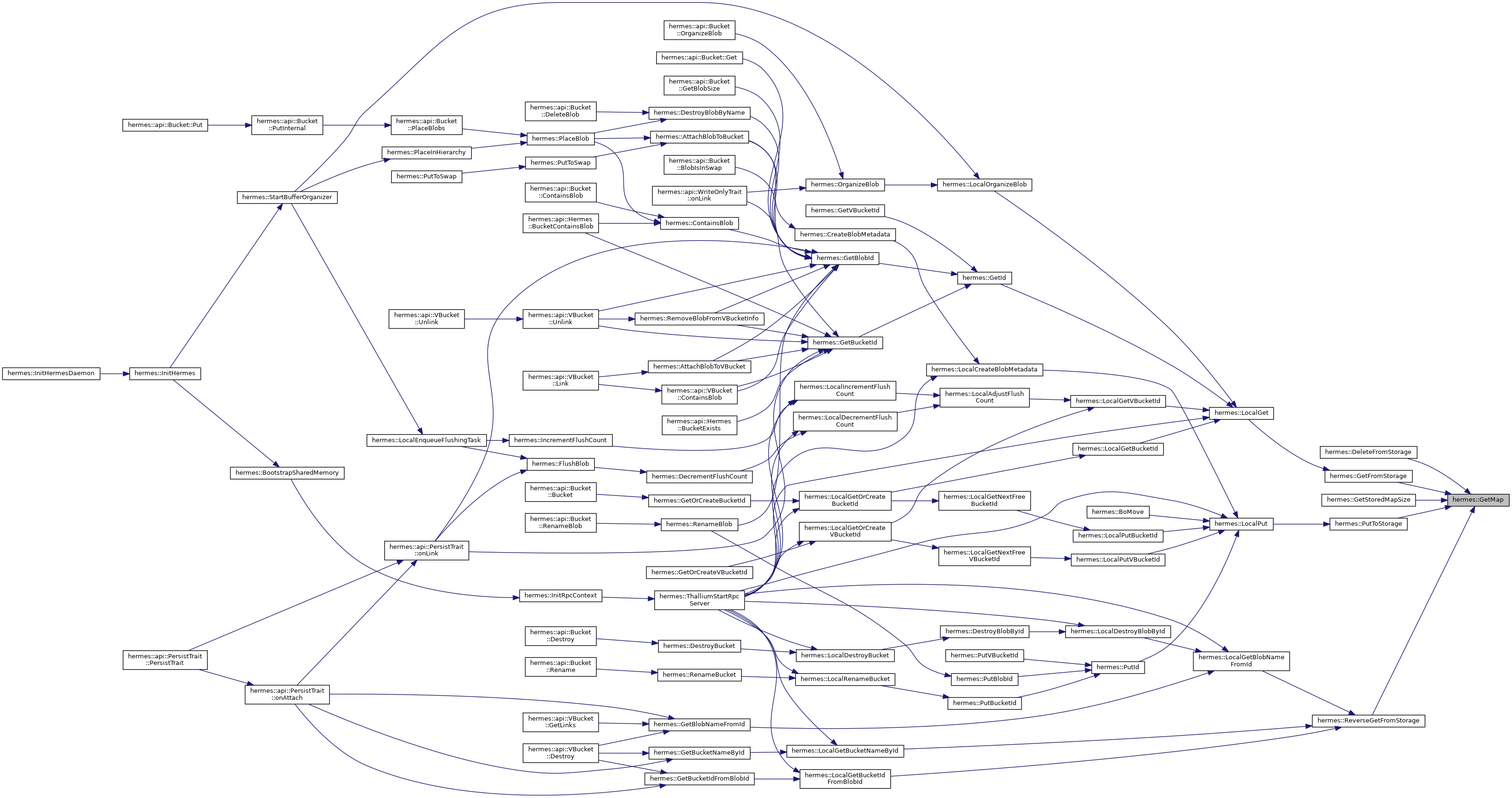Namespaces | |
| pubsub | |
Typedefs | |
| using | BoMoveList = std::vector< std::pair< BufferID, std::vector< BufferID > >> |
| typedef void(* | BarrierFunc) (void *) |
| typedef void(* | FinalizeFunc) (void *) |
| typedef uint8_t | u8 |
| typedef uint16_t | u16 |
| typedef uint32_t | u32 |
| typedef uint64_t | u64 |
| typedef int8_t | i8 |
| typedef int16_t | i16 |
| typedef int32_t | i32 |
| typedef int64_t | i64 |
| typedef float | f32 |
| typedef double | f64 |
| typedef u16 | DeviceID |
| using | PlacementSchema = std::vector< std::pair< size_t, TargetID > > |
| typedef u64 | TraitID |
| typedef void() | ArenaErrorFunc() |
| typedef void(* | StartFunc) (SharedMemoryContext *, RpcContext *, Arena *, const char *, int) |
Enumerations | |
| enum class | BoOperation { kMove , kCopy , kDelete , kCount } |
| enum class | BoPriority { kLow , kHigh , kCount } |
| enum | SwapBlobMembers { SwapBlobMembers_NodeId , SwapBlobMembers_Offset , SwapBlobMembers_Size , SwapBlobMembers_BucketId , SwapBlobMembers_Count } |
| enum | Topology { Topology_Local , Topology_Neighborhood , Topology_Global , Topology_Count } |
| enum | StatusCode { HERMES_OK_MAX = 2 , BLOB_IN_SWAP_PLACE = 1 , HERMES_SUCCESS = 0 , INVALID_BUCKET = -1 , BUCKET_NAME_TOO_LONG = -2 , VBUCKET_NAME_TOO_LONG = -3 , BLOB_NAME_TOO_LONG = -4 , INVALID_BLOB = -5 , BLOB_NOT_IN_BUCKET = -6 , BLOB_NOT_LINKED_TO_VBUCKET = -7 , TRAIT_NOT_VALID = -8 , TRAIT_EXISTS_ALREADY = -9 , OFFSET_MAP_EMPTY = -10 , BLOB_NOT_LINKED_IN_MAP = -11 , BUCKET_IN_USE = -12 , DPE_RANDOM_FOUND_NO_TGT = -13 , DPE_GET_INVALID_TGT = -14 , DPE_ORTOOLS_NO_SOLUTION = -15 , DPE_PLACEMENTSCHEMA_EMPTY = -16 , READ_BLOB_FAILED = -17 , STDIO_OFFSET_ERROR = -18 , STDIO_FWRITE_FAILED = -19 , STDIO_FOPEN_FAILED = -20 , STDIO_FCLOSE_FAILED = -21 , INVALID_FILE = -23 , PLACE_SWAP_BLOB_TO_BUF_FAILED = -24 , DPE_RR_FIND_TGT_FAILED = -25 , HERMES_ERROR_MAX = -26 } |
| enum class | ProcessKind { kApp , kHermes , kCount } |
| enum | ArenaType { kArenaType_BufferPool , kArenaType_MetaData , kArenaType_Transient , kArenaType_Count } |
| enum | MapType { kMapType_Bucket , kMapType_VBucket , kMapType_BlobId , kMapType_BlobInfo , kMapType_Count } |
| enum class | ThresholdViolation { kMin , kMax } |
Functions | |
| ArenaInfo | GetArenaInfo (Config *config) |
| std::vector< std::string > | GetHostsFromFile (const std::string &host_file) |
| void | PushHostNames (Arena *arenas, RpcContext *rpc, const std::vector< std::string > &host_names, MetadataManager *mdm, u8 *shmem_base) |
| SharedMemoryContext | InitHermesCore (Config *config, CommunicationContext *comm, ArenaInfo *arena_info, Arena *arenas, RpcContext *rpc) |
| SharedMemoryContext | BootstrapSharedMemory (Arena *arenas, Config *config, CommunicationContext *comm, RpcContext *rpc, bool is_daemon, bool is_adapter) |
| std::shared_ptr< api::Hermes > | InitHermes (Config *config, bool is_daemon, bool is_adapter) |
| std::shared_ptr< api::Hermes > | InitHermesClient (const char *config_file=NULL) |
| Initialize a Hermes instance as a client or adapter. More... | |
| std::shared_ptr< api::Hermes > | InitHermesDaemon (char *config_file=NULL) |
| Initialize a Hermes instance as a daemon. More... | |
| std::shared_ptr< api::Hermes > | InitHermesDaemon (Config *config) |
| bool | operator== (const BufferInfo &lhs, const BufferInfo &rhs) |
| BufferInfo | LocalGetBufferInfo (SharedMemoryContext *context, BufferID buffer_id) |
| BufferInfo | GetBufferInfo (SharedMemoryContext *context, RpcContext *rpc, BufferID buffer_id) |
| f32 | NormalizeAccessScore (SharedMemoryContext *context, f32 raw_score, f32 size_mb) |
| static f32 | BytesToMegabytes (size_t bytes) |
| std::vector< BufferInfo > | GetBufferInfo (SharedMemoryContext *context, RpcContext *rpc, const std::vector< BufferID > &buffer_ids) |
| f32 | ComputeBlobAccessScore (SharedMemoryContext *context, const std::vector< BufferInfo > &buffer_info) |
| void | SortBufferInfo (std::vector< BufferInfo > &buffer_info, bool increasing) |
| void | SortTargetInfo (std::vector< TargetInfo > &target_info, bool increasing) |
| void | EnqueueBoMove (RpcContext *rpc, const BoMoveList &moves, BlobID blob_id, BucketID bucket_id, const std::string &internal_name, BoPriority priority) |
| void | LocalEnqueueBoMove (SharedMemoryContext *context, RpcContext *rpc, const BoMoveList &moves, BlobID blob_id, BucketID bucket_id, const std::string &internal_blob_name, BoPriority priority) |
| void | BoMove (SharedMemoryContext *context, RpcContext *rpc, const BoMoveList &moves, BlobID blob_id, BucketID bucket_id, const std::string &internal_blob_name) |
| void | LocalOrganizeBlob (SharedMemoryContext *context, RpcContext *rpc, const std::string &internal_blob_name, BucketID bucket_id, f32 epsilon, f32 explicit_importance_score) |
| void | OrganizeBlob (SharedMemoryContext *context, RpcContext *rpc, BucketID bucket_id, const std::string &blob_name, f32 epsilon, f32 importance_score) |
| void | EnforceCapacityThresholds (SharedMemoryContext *context, RpcContext *rpc, ViolationInfo info) |
| void | LocalEnforceCapacityThresholds (SharedMemoryContext *context, RpcContext *rpc, ViolationInfo info) |
| void | LocalShutdownBufferOrganizer (SharedMemoryContext *context) |
| void | FlushBlob (SharedMemoryContext *context, RpcContext *rpc, BlobID blob_id, const std::string &filename, u64 offset, bool async) |
| bool | EnqueueFlushingTask (RpcContext *rpc, BlobID blob_id, const std::string &filename, u64 offset) |
| bool | LocalEnqueueFlushingTask (SharedMemoryContext *context, RpcContext *rpc, BlobID blob_id, const std::string &filename, u64 offset) |
| Status | PlaceInHierarchy (SharedMemoryContext *context, RpcContext *rpc, SwapBlob swap_blob, const std::string &name, const api::Context &ctx) |
| void | LocalAdjustFlushCount (SharedMemoryContext *context, const std::string &vbkt_name, int adjustment) |
| void | LocalIncrementFlushCount (SharedMemoryContext *context, const std::string &vbkt_name) |
| void | LocalDecrementFlushCount (SharedMemoryContext *context, const std::string &vbkt_name) |
| void | IncrementFlushCount (SharedMemoryContext *context, RpcContext *rpc, const std::string &vbkt_name) |
| void | DecrementFlushCount (SharedMemoryContext *context, RpcContext *rpc, const std::string &vbkt_name) |
| void | AwaitAsyncFlushingTasks (SharedMemoryContext *context, RpcContext *rpc, VBucketID id) |
| void | OrganizeDevice (SharedMemoryContext *context, RpcContext *rpc, DeviceID devices_id) |
| bool | operator== (const BufferID &lhs, const BufferID &rhs) |
| void | Finalize (SharedMemoryContext *context, CommunicationContext *comm, RpcContext *rpc, const char *shmem_name, Arena *trans_arena, bool is_application_core, bool force_rpc_shutdown) |
| void | LockBuffer (BufferHeader *header) |
| void | UnlockBuffer (BufferHeader *header) |
| BufferPool * | GetBufferPoolFromContext (SharedMemoryContext *context) |
| Device * | GetDeviceFromHeader (SharedMemoryContext *context, BufferHeader *header) |
| Target * | GetTarget (SharedMemoryContext *context, int index) |
| Target * | GetTargetFromId (SharedMemoryContext *context, TargetID id) |
| std::vector< f32 > | GetBandwidths (SharedMemoryContext *context, const std::vector< TargetID > &targets) |
| Device * | GetDeviceById (SharedMemoryContext *context, DeviceID device_id) |
| DeviceID | GetDeviceIdFromTargetId (TargetID target_id) |
| BufferHeader * | GetHeadersBase (SharedMemoryContext *context) |
| BufferHeader * | GetHeaderByIndex (SharedMemoryContext *context, u32 index) |
| BufferHeader * | GetHeaderByBufferId (SharedMemoryContext *context, BufferID id) |
| void | ResetHeader (BufferHeader *header) |
| static void | MakeHeaderDormant (BufferHeader *header) |
| bool | HeaderIsDormant (BufferHeader *header) |
| i32 | GetSlabUnitSize (SharedMemoryContext *context, DeviceID device_id, int slab_index) |
| i32 | GetSlabBufferSize (SharedMemoryContext *context, DeviceID device_id, int slab_index) |
| BufferID * | GetFreeListPtr (SharedMemoryContext *context, DeviceID device_id) |
| int | GetSlabIndexFromHeader (SharedMemoryContext *context, BufferHeader *header) |
| bool | BufferIsRemote (CommunicationContext *comm, BufferID buffer_id) |
| bool | BufferIsRemote (RpcContext *rpc, BufferID buffer_id) |
| bool | IsNullBufferId (BufferID id) |
| bool | BufferIsByteAddressable (SharedMemoryContext *context, BufferID id) |
| BufferID | PeekFirstFreeBufferId (SharedMemoryContext *context, DeviceID device_id, int slab_index) |
| void | SetFirstFreeBufferId (SharedMemoryContext *context, DeviceID device_id, int slab_index, BufferID new_id) |
| std::atomic< u32 > * | GetAvailableBuffersArray (SharedMemoryContext *context, DeviceID device_id) |
| static u32 | GetNumBuffersAvailable (SharedMemoryContext *context, DeviceID device_id, int slab_index) |
| u32 | GetNumBuffersAvailable (SharedMemoryContext *context, DeviceID device_id) |
| static void | DecrementAvailableBuffers (SharedMemoryContext *context, DeviceID device_id, int slab_index) |
| static void | IncrementAvailableBuffers (SharedMemoryContext *context, DeviceID device_id, int slab_index) |
| void | UpdateBufferingCapacities (SharedMemoryContext *context, i64 adjustment, DeviceID device_id) |
| void | LocalReleaseBuffer (SharedMemoryContext *context, BufferID buffer_id) |
| void | ReleaseBuffer (SharedMemoryContext *context, RpcContext *rpc, BufferID buffer_id) |
| void | ReleaseBuffers (SharedMemoryContext *context, RpcContext *rpc, const std::vector< BufferID > &buffer_ids) |
| void | LocalReleaseBuffers (SharedMemoryContext *context, const std::vector< BufferID > &buffer_ids) |
| BufferID | GetFreeBuffer (SharedMemoryContext *context, DeviceID device_id, int slab_index) |
| std::vector< BufferID > | GetBuffers (SharedMemoryContext *context, const PlacementSchema &schema) |
| u32 | LocalGetBufferSize (SharedMemoryContext *context, BufferID id) |
| u32 | GetBufferSize (SharedMemoryContext *context, RpcContext *rpc, BufferID id) |
| size_t | GetBlobSize (SharedMemoryContext *context, RpcContext *rpc, BufferIdArray *buffer_ids) |
| size_t | GetBlobSizeById (SharedMemoryContext *context, RpcContext *rpc, Arena *arena, BlobID blob_id) |
| ptrdiff_t | GetBufferOffset (SharedMemoryContext *context, BufferID id) |
| u8 * | GetRamBufferPtr (SharedMemoryContext *context, BufferID buffer_id) |
| BufferID | MakeBufferId (u32 node_id, u32 header_index) |
| void | PartitionRamBuffers (Arena *arena, i32 buffer_size, i32 buffer_count, int block_size) |
| BufferID | MakeBufferHeaders (Arena *arena, int buffer_size, u32 start_index, u32 end_index, int node_id, DeviceID device_id, ptrdiff_t initial_offset, u8 **header_begin) |
| Device * | InitDevices (Arena *arena, Config *config, f32 &min_bw, f32 &max_bw) |
| Target * | InitTargets (Arena *arena, Config *config, Device *devices, int node_id) |
| void | MergeRamBufferFreeList (SharedMemoryContext *context, int slab_index) |
| void | SplitRamBufferFreeList (SharedMemoryContext *context, int slab_index) |
| ptrdiff_t | InitBufferPool (u8 *shmem_base, Arena *buffer_pool_arena, Arena *scratch_arena, i32 node_id, Config *config) |
| void | SerializeBufferPoolToFile (SharedMemoryContext *context, FILE *file) |
| void | MakeFullShmemName (char *dest, const char *base) |
| FILE * | FopenOrTerminate (const char *fname, const char *mode) |
| int | OpenOrTerminate (const std::string &fname, int flags, mode_t mode=0) |
| void | InitFilesForBuffering (SharedMemoryContext *context, CommunicationContext &comm) |
| u8 * | InitSharedMemory (const char *shmem_name, size_t total_size) |
| SharedMemoryContext | GetSharedMemoryContext (char *shmem_name) |
| void | UnmapSharedMemory (SharedMemoryContext *context) |
| void | CloseBufferingFiles (SharedMemoryContext *context) |
| void | ReleaseSharedMemoryContext (SharedMemoryContext *context) |
| size_t | LocalWriteBufferById (SharedMemoryContext *context, BufferID id, const Blob &blob, size_t offset) |
| void | WriteBlobToBuffers (SharedMemoryContext *context, RpcContext *rpc, const Blob &blob, const std::vector< BufferID > &buffer_ids) |
| size_t | LocalReadBufferById (SharedMemoryContext *context, BufferID id, Blob *blob, size_t read_offset) |
| size_t | ReadBlobFromBuffers (SharedMemoryContext *context, RpcContext *rpc, Blob *blob, BufferIdArray *buffer_ids, u32 *buffer_sizes) |
| size_t | ReadBlobById (SharedMemoryContext *context, RpcContext *rpc, Arena *arena, Blob blob, BlobID blob_id) |
| size_t | ReadBlobById (SharedMemoryContext *context, RpcContext *rpc, Arena *arena, api::Blob &dest, BlobID blob_id) |
| void | OpenSwapFile (SharedMemoryContext *context, u32 node_id) |
| SwapBlob | WriteToSwap (SharedMemoryContext *context, Blob blob, u32 node_id, BucketID bucket_id) |
| SwapBlob | PutToSwap (SharedMemoryContext *context, RpcContext *rpc, const std::string &name, BucketID bucket_id, const u8 *data, size_t size) |
| size_t | ReadFromSwap (SharedMemoryContext *context, Blob blob, SwapBlob swap_blob) |
| api::Status | PlaceBlob (SharedMemoryContext *context, RpcContext *rpc, PlacementSchema &schema, Blob blob, const std::string &name, BucketID bucket_id, const api::Context &ctx, bool called_from_buffer_organizer) |
| api::Status | StdIoPersistBucket (SharedMemoryContext *context, RpcContext *rpc, Arena *arena, BucketID bucket_id, const std::string &file_name, const std::string &open_mode) |
| api::Status | StdIoPersistBlob (SharedMemoryContext *context, RpcContext *rpc, Arena *arena, BlobID blob_id, int fd, const i32 &offset) |
| f32 | GetBlobImportanceScore (SharedMemoryContext *context, RpcContext *rpc, BlobID blob_id) |
| void | StartBufferPoolRpcServer (SharedMemoryContext *context, const char *addr, i32 num_rpc_threads) |
| template<typename T > | |
| std::vector< SwapBlob > | PutToSwap (SharedMemoryContext *context, RpcContext *rpc, BucketID id, std::vector< std::vector< T >> &blobs, std::vector< std::string > &names) |
| SwapBlob | WriteToSwap (SharedMemoryContext *context, Blob blob, BlobID blob_id, BucketID bucket_id) |
| void | ParseConfig (Arena *arena, const char *path, Config *config) |
| size_t | InitCommunication (CommunicationContext *comm, Arena *arena, size_t trans_arena_size_per_node, bool is_daemon=false, bool is_adapter=false) |
| void | WorldBarrier (CommunicationContext *comm) |
| void | SubBarrier (CommunicationContext *comm) |
| void * | GetAppCommunicator (CommunicationContext *comm) |
| int | MpiGetProcId (MPI_Comm comm) |
| int | MpiGetWorldProcId (void *state) |
| int | MpiGetSubProcId (void *state) |
| int | MpiGetNumProcs (MPI_Comm comm) |
| int | MpiGetNumWorldProcs (void *state) |
| void | MpiBarrier (MPI_Comm comm) |
| void | MpiWorldBarrier (void *state) |
| void | MpiSubBarrier (void *state) |
| bool | MpiFirstOnNode (MPI_Comm comm) |
| size_t | MpiAssignIDsToNodes (CommunicationContext *comm, size_t trans_arena_size_per_node) |
| void | MpiFinalize (void *state) |
| void | PrintExpectedAndFail (const std::string &expected, u32 line_number=0) |
| void | RequireNumDevices (Config *config) |
| void | RequireNumSlabs (Config *config) |
| void | RequireCapacitiesUnset (bool &already_specified) |
| void | RequireBlockSizesUnset (bool &already_specified) |
| void | ParseCapacities (Config *config, YAML::Node capacities, int unit_conversion, bool &already_specified) |
| void | ParseBlockSizes (Config *config, YAML::Node block_sizes, int unit_conversion, bool &already_specified) |
| template<typename T > | |
| void | ParseArray (YAML::Node list_node, const std::string var, T *list, int max_list_len) |
| template<typename T > | |
| void | ParseVector (YAML::Node list_node, std::vector< T > &list) |
| template<typename T > | |
| void | ParseMatrix (YAML::Node matrix_node, const std::string var, T *matrix, int max_row_len, int max_col_len, int *col_len) |
| template<typename T > | |
| void | ParseMatrix (YAML::Node matrix_node, std::string var, T *matrix, int max_row_len, int max_col_len) |
| void | ParseRangeList (YAML::Node list_node, std::string var, std::vector< std::string > &list) |
| void | ParseHostNames (YAML::Node yaml_conf, hermes::Config *config) |
| void | CheckConstraints (Config *config) |
| void | ParseConfigYAML (YAML::Node &yaml_conf, Config *config) |
| void | ParseConfigString (Arena *arena, const std::string &config_string, Config *config) |
| void | InitConfig (hermes::Config *config, const char *config_file) |
| hermes::Config * | CreateConfig (const char *config_file) |
| PlacementSchema | AggregateBlobSchema (PlacementSchema &schema) |
| Status | CalculatePlacement (SharedMemoryContext *context, RpcContext *rpc, const std::vector< size_t > &blob_sizes, std::vector< PlacementSchema > &output, const api::Context &api_context) |
| bool | IsPowerOfTwo (size_t val) |
| uintptr_t | AlignForward (uintptr_t addr, size_t alignment) |
| uintptr_t | AlignBackward (uintptr_t addr, size_t alignment) |
| void | InitArena (Arena *arena, size_t bytes, u8 *base) |
| Arena | InitArenaAndAllocate (size_t bytes) |
| void | DestroyArena (Arena *arena) |
| size_t | GetRemainingCapacity (Arena *arena) |
| void | GrowArena (Arena *arena, size_t new_size) |
The maximum capacity of arena becomes new_size. More... | |
| TemporaryMemory | BeginTemporaryMemory (Arena *arena) |
| void | EndTemporaryMemory (TemporaryMemory *temp_memory) |
| u8 * | PushSize (Arena *arena, size_t size, size_t alignment) |
| u8 * | PushSizeAndClear (Arena *arena, size_t size, size_t alignment) |
| u8 * | GetHeapMemory (Heap *heap) |
| FreeBlock * | GetHeapFreeList (Heap *heap) |
| FreeBlock * | NextFreeBlock (Heap *heap, FreeBlock *block) |
| u8 * | HeapOffsetToPtr (Heap *heap, u32 offset) |
| u32 | GetHeapOffset (Heap *heap, u8 *ptr) |
| void | HeapErrorHandler () |
| u32 | ComputeHeapExtent (Heap *heap, void *item, u32 size) |
| u8 * | HeapExtentToPtr (Heap *heap) |
| Heap * | InitHeapInArena (Arena *arena, bool grows_up, u16 alignment) |
| FreeBlock * | FindFirstFit (Heap *heap, u32 desired_size) |
| u8 * | HeapPushSize (Heap *heap, u32 size) |
| void | HeapFree (Heap *heap, void *ptr) |
| void * | HeapRealloc (Heap *heap, void *ptr, size_t size) |
| void | CoalesceFreeBlocks (Heap *heap) |
| Ticket | TryBeginTicketMutex (TicketMutex *mutex, Ticket *existing_ticket) |
| void | BeginTicketMutex (TicketMutex *mutex) |
| void | EndTicketMutex (TicketMutex *mutex) |
| bool | BeginReaderLock (RwLock *lock) |
| void | EndReaderLock (RwLock *lock) |
| void | BeginWriterLock (RwLock *lock) |
| void | EndWriterLock (RwLock *lock) |
| template<typename T > | |
| T * | PushStruct (Arena *arena, size_t alignment=8) |
| template<typename T > | |
| T * | PushClearedStruct (Arena *arena, size_t alignment=8) |
| template<typename T > | |
| T * | PushArray (Arena *arena, int count, size_t alignment=8) |
| template<typename T > | |
| T * | PushClearedArray (Arena *arena, int count, size_t alignment=8) |
| template<typename T > | |
| T * | HeapPushStruct (Heap *heap) |
| template<typename T > | |
| T * | HeapPushArray (Heap *heap, u32 count) |
| bool | operator!= (const TargetID &lhs, const TargetID &rhs) |
| static bool | IsNameTooLong (const std::string &name, size_t max) |
| bool | IsBlobNameTooLong (const std::string &name) |
| bool | IsBucketNameTooLong (const std::string &name) |
| bool | IsVBucketNameTooLong (const std::string &name) |
| static bool | IsNullId (u64 id) |
| bool | IsNullBucketId (BucketID id) |
| bool | IsNullVBucketId (VBucketID id) |
| bool | IsNullBlobId (BlobID id) |
| bool | IsNullTargetId (TargetID id) |
| static u32 | GetBlobNodeId (BlobID id) |
| void | LocalPut (MetadataManager *mdm, const char *key, u64 val, MapType map_type) |
| void | LocalPut (MetadataManager *mdm, BlobID key, const BlobInfo &value) |
| u64 | LocalGet (MetadataManager *mdm, const char *key, MapType map_type) |
| void | LocalDelete (MetadataManager *mdm, BlobID key) |
| void | LocalDelete (MetadataManager *mdm, const char *key, MapType map_type) |
| MetadataManager * | GetMetadataManagerFromContext (SharedMemoryContext *context) |
| static void | MetadataArenaErrorHandler () |
| u32 | HashString (MetadataManager *mdm, RpcContext *rpc, const char *str) |
| u64 | GetId (SharedMemoryContext *context, RpcContext *rpc, const char *name, MapType map_type) |
| BucketID | GetBucketId (SharedMemoryContext *context, RpcContext *rpc, const char *name) |
| BucketID | LocalGetBucketId (SharedMemoryContext *context, const char *name) |
| VBucketID | GetVBucketId (SharedMemoryContext *context, RpcContext *rpc, const char *name) |
| VBucketID | LocalGetVBucketId (SharedMemoryContext *context, const char *name) |
| std::string | MakeInternalBlobName (const std::string &name, BucketID id) |
| BlobID | GetBlobId (SharedMemoryContext *context, RpcContext *rpc, const std::string &name, BucketID bucket_id, bool track_stats) |
| void | PutId (MetadataManager *mdm, RpcContext *rpc, const std::string &name, u64 id, MapType map_type) |
| void | PutBucketId (MetadataManager *mdm, RpcContext *rpc, const std::string &name, BucketID id) |
| void | LocalPutBucketId (MetadataManager *mdm, const std::string &name, BucketID id) |
| void | PutVBucketId (MetadataManager *mdm, RpcContext *rpc, const std::string &name, VBucketID id) |
| void | LocalPutVBucketId (MetadataManager *mdm, const std::string &name, VBucketID id) |
| void | PutBlobId (MetadataManager *mdm, RpcContext *rpc, const std::string &name, BlobID id, BucketID bucket_id) |
| void | DeleteId (MetadataManager *mdm, RpcContext *rpc, const std::string &name, MapType map_type) |
| void | DeleteBucketId (MetadataManager *mdm, RpcContext *rpc, const std::string &name) |
| void | DeleteVBucketId (MetadataManager *mdm, RpcContext *rpc, const std::string &name) |
| void | LocalDeleteBlobInfo (MetadataManager *mdm, BlobID blob_id) |
| void | LocalDeleteBlobId (MetadataManager *mdm, const std::string &name, BucketID bucket_id) |
| void | DeleteBlobId (MetadataManager *mdm, RpcContext *rpc, const std::string &name, BucketID bucket_id) |
| BucketInfo * | LocalGetBucketInfoByIndex (MetadataManager *mdm, u32 index) |
| std::string | LocalGetBlobNameFromId (SharedMemoryContext *context, BlobID blob_id) |
| std::string | GetBlobNameFromId (SharedMemoryContext *context, RpcContext *rpc, BlobID blob_id) |
| u64 | HexStringToU64 (const std::string &s) |
| BucketID | LocalGetBucketIdFromBlobId (SharedMemoryContext *context, BlobID id) |
| BucketID | GetBucketIdFromBlobId (SharedMemoryContext *context, RpcContext *rpc, BlobID id) |
| BucketInfo * | LocalGetBucketInfoById (MetadataManager *mdm, BucketID id) |
| std::vector< BlobID > | GetBlobIds (SharedMemoryContext *context, RpcContext *rpc, BucketID bucket_id) |
| VBucketInfo * | GetVBucketInfoByIndex (MetadataManager *mdm, u32 index) |
| BucketID | LocalGetNextFreeBucketId (SharedMemoryContext *context, const std::string &name) |
| BucketID | LocalGetOrCreateBucketId (SharedMemoryContext *context, const std::string &name) |
| BucketID | GetOrCreateBucketId (SharedMemoryContext *context, RpcContext *rpc, const std::string &name) |
| VBucketID | LocalGetNextFreeVBucketId (SharedMemoryContext *context, const std::string &name) |
| VBucketID | LocalGetOrCreateVBucketId (SharedMemoryContext *context, const std::string &name) |
| VBucketID | GetOrCreateVBucketId (SharedMemoryContext *context, RpcContext *rpc, const std::string &name) |
| void | CopyIds (u64 *dest, u64 *src, u32 count) |
| void | ReplaceBlobIdInBucket (SharedMemoryContext *context, RpcContext *rpc, BucketID bucket_id, BlobID old_blob_id, BlobID new_blob_id) |
| void | AddBlobIdToBucket (MetadataManager *mdm, RpcContext *rpc, BlobID blob_id, BucketID bucket_id) |
| void | AddBlobIdToVBucket (MetadataManager *mdm, RpcContext *rpc, BlobID blob_id, VBucketID vbucket_id) |
| u32 | AllocateBufferIdList (SharedMemoryContext *context, RpcContext *rpc, u32 target_node, const std::vector< BufferID > &buffer_ids) |
| bool | BlobIsInSwap (BlobID id) |
| void | GetBufferIdList (Arena *arena, SharedMemoryContext *context, RpcContext *rpc, BlobID blob_id, BufferIdArray *buffer_ids) |
| std::vector< BufferID > | GetBufferIdList (SharedMemoryContext *context, RpcContext *rpc, BlobID blob_id) |
| BufferIdArray | GetBufferIdsFromBlobId (Arena *arena, SharedMemoryContext *context, RpcContext *rpc, BlobID blob_id, u32 **sizes) |
| void | LocalCreateBlobMetadata (SharedMemoryContext *context, MetadataManager *mdm, const std::string &blob_name, BlobID blob_id, TargetID effective_target) |
| void | CreateBlobMetadata (SharedMemoryContext *context, RpcContext *rpc, const std::string &blob_name, BlobID blob_id, TargetID effective_target) |
| void | AttachBlobToBucket (SharedMemoryContext *context, RpcContext *rpc, const char *blob_name, BucketID bucket_id, const std::vector< BufferID > &buffer_ids, TargetID effective_target, bool is_swap_blob, bool called_from_buffer_organizer) |
| void | FreeBufferIdList (SharedMemoryContext *context, RpcContext *rpc, BlobID blob_id) |
| void | LocalDeleteBlobMetadata (MetadataManager *mdm, const char *blob_name, BlobID blob_id, BucketID bucket_id) |
| void | WaitForOutstandingBlobOps (MetadataManager *mdm, BlobID blob_id) |
| void | LocalDestroyBlobByName (SharedMemoryContext *context, RpcContext *rpc, const char *blob_name, BlobID blob_id, BucketID bucket_id) |
| void | LocalDestroyBlobById (SharedMemoryContext *context, RpcContext *rpc, BlobID blob_id, BucketID bucket_id) |
| void | RemoveBlobFromBucketInfo (SharedMemoryContext *context, RpcContext *rpc, BucketID bucket_id, BlobID blob_id) |
| void | DestroyBlobByName (SharedMemoryContext *context, RpcContext *rpc, BucketID bucket_id, const std::string &blob_name) |
| void | RenameBlob (SharedMemoryContext *context, RpcContext *rpc, const std::string &old_name, const std::string &new_name, BucketID bucket_id) |
| bool | ContainsBlob (SharedMemoryContext *context, RpcContext *rpc, BucketID bucket_id, const std::string &blob_name) |
| void | DestroyBlobById (SharedMemoryContext *context, RpcContext *rpc, BlobID id, BucketID bucket_id) |
| bool | DestroyBucket (SharedMemoryContext *context, RpcContext *rpc, const char *name, BucketID bucket_id) |
| bool | DestroyVBucket (SharedMemoryContext *context, RpcContext *rpc, const char *name, VBucketID vbucket_id) |
| void | LocalRenameBucket (SharedMemoryContext *context, RpcContext *rpc, BucketID id, const std::string &old_name, const std::string &new_name) |
| void | RenameBucket (SharedMemoryContext *context, RpcContext *rpc, BucketID id, const std::string &old_name, const std::string &new_name) |
| void | LocalIncrementRefcount (SharedMemoryContext *context, BucketID id) |
| void | LocalDecrementRefcount (SharedMemoryContext *context, BucketID id) |
| void | DecrementRefcount (SharedMemoryContext *context, RpcContext *rpc, BucketID id) |
| u64 | LocalGetRemainingTargetCapacity (SharedMemoryContext *context, TargetID id) |
| SystemViewState * | GetLocalSystemViewState (MetadataManager *mdm) |
| SystemViewState * | GetLocalSystemViewState (SharedMemoryContext *context) |
| std::vector< u64 > | LocalGetGlobalDeviceCapacities (SharedMemoryContext *context) |
| std::vector< u64 > | GetGlobalDeviceCapacities (SharedMemoryContext *context, RpcContext *rpc) |
| GlobalSystemViewState * | GetGlobalSystemViewState (SharedMemoryContext *context) |
| std::vector< ViolationInfo > | LocalUpdateGlobalSystemViewState (SharedMemoryContext *context, u32 node_id, std::vector< i64 > adjustments) |
| void | UpdateGlobalSystemViewState (SharedMemoryContext *context, RpcContext *rpc) |
| TargetID | FindTargetIdFromDeviceId (const std::vector< TargetID > &targets, DeviceID device_id) |
| static ptrdiff_t | GetOffsetFromMdm (MetadataManager *mdm, void *ptr) |
| SystemViewState * | CreateSystemViewState (Arena *arena, Config *config) |
| GlobalSystemViewState * | CreateGlobalSystemViewState (RpcContext *rpc, Arena *arena, Config *config) |
| std::string | GetSwapFilename (MetadataManager *mdm, u32 node_id) |
| std::vector< BufferID > | SwapBlobToVec (SwapBlob swap_blob) |
| SwapBlob | VecToSwapBlob (std::vector< BufferID > &vec) |
| SwapBlob | IdArrayToSwapBlob (BufferIdArray ids) |
| void | InitMetadataManager (MetadataManager *mdm, RpcContext *rpc, Arena *arena, Config *config) |
| VBucketInfo * | LocalGetVBucketInfoByIndex (MetadataManager *mdm, u32 index) |
| VBucketInfo * | LocalGetVBucketInfoById (MetadataManager *mdm, VBucketID id) |
| void | LocalIncrementRefcount (SharedMemoryContext *context, VBucketID id) |
| void | LocalDecrementRefcount (SharedMemoryContext *context, VBucketID id) |
| void | DecrementRefcount (SharedMemoryContext *context, RpcContext *rpc, VBucketID id) |
| u32 | GetRelativeNodeId (RpcContext *rpc, int offset) |
| u32 | GetNextNode (RpcContext *rpc) |
| u32 | GetPreviousNode (RpcContext *rpc) |
| std::vector< TargetID > | GetNodeTargets (SharedMemoryContext *context, RpcContext *rpc, u32 target_node) |
| std::vector< TargetID > | GetNeighborhoodTargets (SharedMemoryContext *context, RpcContext *rpc) |
| u64 | GetRemainingTargetCapacity (SharedMemoryContext *context, RpcContext *rpc, TargetID target_id) |
| std::vector< u64 > | GetRemainingTargetCapacities (SharedMemoryContext *context, RpcContext *rpc, const std::vector< TargetID > &targets) |
| void | AttachBlobToVBucket (SharedMemoryContext *context, RpcContext *rpc, const char *blob_name, const char *bucket_name, VBucketID vbucket_id) |
| std::string | LocalGetBucketNameById (SharedMemoryContext *context, BucketID blob_id) |
| std::vector< BlobID > | GetBlobsFromVBucketInfo (SharedMemoryContext *context, RpcContext *rpc, VBucketID vbucket_id) |
| void | RemoveBlobFromVBucketInfo (SharedMemoryContext *context, RpcContext *rpc, VBucketID vbucket_id, const char *blob_name, const char *bucket_name) |
| std::string | GetBucketNameById (SharedMemoryContext *context, RpcContext *rpc, BucketID id) |
| f32 | ScoringFunction (MetadataManager *mdm, Stats *stats) |
| int | LocalGetNumOutstandingFlushingTasks (SharedMemoryContext *context, VBucketID id) |
| int | GetNumOutstandingFlushingTasks (SharedMemoryContext *context, RpcContext *rpc, VBucketID id) |
| bool | LocalLockBlob (SharedMemoryContext *context, BlobID blob_id) |
| bool | LocalUnlockBlob (SharedMemoryContext *context, BlobID blob_id) |
| void | GetPidTid (u32 &pid, u32 &tid) |
| bool | LockBlob (SharedMemoryContext *context, RpcContext *rpc, BlobID blob_id) |
| bool | UnlockBlob (SharedMemoryContext *context, RpcContext *rpc, BlobID blob_id) |
| void | MakeShmemString (ShmemString *sms, u8 *memory, const char *val, u32 size) |
| void | MakeShmemString (ShmemString *sms, u8 *memory, const std::string &val) |
| std::string | GetShmemString (ShmemString *sms) |
| void | InitNeighborhoodTargets (SharedMemoryContext *context, RpcContext *rpc) |
| void | BeginGlobalTicketMutex (SharedMemoryContext *context, RpcContext *rpc) |
| void | EndGlobalTicketMutex (SharedMemoryContext *context, RpcContext *rpc) |
| void | LocalBeginGlobalTicketMutex (MetadataManager *mdm) |
| void | LocalEndGlobalTicketMutex (MetadataManager *mdm) |
| void | IncrementBlobStats (SharedMemoryContext *context, RpcContext *rpc, BlobID blob_id) |
| void | LocalIncrementBlobStats (MetadataManager *mdm, BlobID blob_id) |
| void | LocalReplaceBlobIdInBucket (SharedMemoryContext *context, BucketID bucket_id, BlobID old_blob_id, BlobID new_blob_id) |
| TicketMutex * | GetMapMutex (MetadataManager *mdm, MapType map_type) |
| void | LocalAddBlobIdToBucket (MetadataManager *mdm, BucketID bucket_id, BlobID blob_id, bool track_stats=true) |
| void | LocalAddBlobIdToVBucket (MetadataManager *mdm, VBucketID vbucket_id, BlobID blob_id) |
| std::vector< BufferID > | LocalGetBufferIdList (MetadataManager *mdm, BlobID blob_id) |
| void | LocalGetBufferIdList (Arena *arena, MetadataManager *mdm, BlobID blob_id, BufferIdArray *buffer_ids) |
| void | LocalFreeBufferIdList (SharedMemoryContext *context, BlobID blob_id) |
| bool | LocalDestroyBucket (SharedMemoryContext *context, RpcContext *rpc, const char *bucket_name, BucketID bucket_id) |
| bool | LocalDestroyVBucket (SharedMemoryContext *context, const char *vbucket_name, VBucketID vbucket_id) |
| u32 | LocalAllocateBufferIdList (MetadataManager *mdm, const std::vector< BufferID > &buffer_ids) |
| bool | LocalContainsBlob (SharedMemoryContext *context, BucketID bucket_id, BlobID blob_id) |
| void | LocalRemoveBlobFromBucketInfo (SharedMemoryContext *context, BucketID bucket_id, BlobID blob_id) |
| void | StartGlobalSystemViewStateUpdateThread (SharedMemoryContext *context, RpcContext *rpc, Arena *arena, double sleep_ms) |
| void | InitMetadataStorage (SharedMemoryContext *context, MetadataManager *mdm, Arena *arena, Config *config) |
| std::vector< BlobID > | LocalGetBlobIds (SharedMemoryContext *context, BucketID bucket_id) |
| std::vector< TargetID > | LocalGetNodeTargets (SharedMemoryContext *context) |
| f32 | LocalGetBlobImportanceScore (SharedMemoryContext *context, BlobID blob_id) |
| void | LocalRemoveBlobFromVBucketInfo (SharedMemoryContext *context, VBucketID vbucket_id, BlobID blob_id) |
| std::vector< BlobID > | LocalGetBlobsFromVBucketInfo (SharedMemoryContext *context, VBucketID vbucket_id) |
| Heap * | GetIdHeap (MetadataManager *mdm) |
| Heap * | GetMapHeap (MetadataManager *mdm) |
| IdList | AllocateIdList (MetadataManager *mdm, u32 length) |
| void | FreeIdList (MetadataManager *mdm, IdList id_list) |
| u32 | AppendToChunkedIdList (MetadataManager *mdm, ChunkedIdList *id_list, u64 id) |
| void | PutToStorage (MetadataManager *mdm, const char *key, u64 val, MapType map_type) |
| void | PutToStorage (MetadataManager *mdm, BlobID key, const BlobInfo &val) |
| u64 | GetFromStorage (MetadataManager *mdm, const char *key, MapType map_type) |
| std::string | ReverseGetFromStorage (MetadataManager *mdm, u64 id, MapType map_type) |
| void | DeleteFromStorage (MetadataManager *mdm, BlobID key, bool lock) |
| void | DeleteFromStorage (MetadataManager *mdm, const char *key, MapType map_type) |
| u32 | HashStringForStorage (MetadataManager *mdm, RpcContext *rpc, const char *str) |
| void | SeedHashForStorage (size_t seed) |
| size_t | GetStoredMapSize (MetadataManager *mdm, MapType map_type) |
| std::vector< TargetID > | LocalGetNeighborhoodTargets (SharedMemoryContext *context) |
| BlobInfo * | GetBlobInfoPtr (MetadataManager *mdm, BlobID blob_id) |
| void | ReleaseBlobInfoPtr (MetadataManager *mdm) |
| u64 * | GetIdsPtr (MetadataManager *mdm, IdList id_list) |
| u64 * | GetIdsPtr (MetadataManager *mdm, ChunkedIdList id_list) |
| void | ReleaseIdsPtr (MetadataManager *mdm) |
| std::vector< u64 > | GetChunkedIdList (MetadataManager *mdm, ChunkedIdList id_list) |
| static IdMap * | GetMapByOffset (MetadataManager *mdm, u32 offset) |
| static IdMap * | GetBucketMap (MetadataManager *mdm) |
| static IdMap * | GetVBucketMap (MetadataManager *mdm) |
| static IdMap * | GetBlobIdMap (MetadataManager *mdm) |
| void | CheckHeapOverlap (MetadataManager *mdm) |
| IdMap * | GetMap (MetadataManager *mdm, MapType map_type) |
| BlobInfoMap * | GetBlobInfoMapNoLock (MetadataManager *mdm) |
| BlobInfoMap * | GetBlobInfoMap (MetadataManager *mdm) |
| void | ReleaseMap (MetadataManager *mdm, MapType map_type) |
| Stats | LocalGetBlobStats (SharedMemoryContext *context, BlobID blob_id) |
| IdList | GetEmbeddedIdList (MetadataManager *mdm, u32 offset) |
| BufferID * | GetBufferIdsPtrFromBlobId (MetadataManager *mdm, BlobID blob_id, size_t &length) |
| static char * | GetKey (MetadataManager *mdm, IdMap *map, u32 index) |
| template<typename T > | |
| void | FreeIdList (MetadataManager *mdm, T id_list) |
| void | FreeEmbeddedIdList (MetadataManager *mdm, u32 offset) |
| void | AllocateOrGrowIdList (MetadataManager *mdm, ChunkedIdList *id_list) |
| u64 | GetChunkedIdListElement (MetadataManager *mdm, ChunkedIdList *id_list, u32 index) |
| void | SetChunkedIdListElement (MetadataManager *mdm, ChunkedIdList *id_list, u32 index, u64 value) |
| i64 | GetIndexOfId (MetadataManager *mdm, ChunkedIdList *id_list, u64 id) |
| u32 | AllocateEmbeddedIdList (MetadataManager *mdm, u32 length) |
| static bool | HasAllocated (ChunkedIdList *list) |
| static bool | HasAllocatedBlobs (VBucketInfo *info) |
| static bool | HasAllocatedBlobs (BucketInfo *info) |
| std::vector< TargetID > | LocalGetTargets (SharedMemoryContext *context, IdList target_list) |
| void | InitSwapSpaceFilename (MetadataManager *mdm, Arena *arena, Config *config) |
| void | InitRpcContext (RpcContext *rpc, u32 num_nodes, u32 node_id, Config *config) |
| void * | CreateRpcState (Arena *arena) |
| void | InitRpcClients (RpcContext *rpc) |
| void | ShutdownRpcClients (RpcContext *rpc) |
| void | RunDaemon (SharedMemoryContext *context, RpcContext *rpc, CommunicationContext *comm, Arena *trans_arena, const char *shmem_name) |
| void | FinalizeClient (SharedMemoryContext *context, RpcContext *rpc, CommunicationContext *comm, Arena *trans_arena, bool stop_daemon) |
| void | FinalizeRpcContext (RpcContext *rpc, bool is_daemon) |
| std::string | GetServerName (RpcContext *rpc, u32 node_id, bool is_buffer_organizer=false) |
| std::string | GetProtocol (RpcContext *rpc) |
| void | StartBufferOrganizer (SharedMemoryContext *context, RpcContext *rpc, Arena *arena, const char *addr, int num_threads, int port) |
| void | CopyStringToCharArray (const std::string &src, char *dest, size_t max) |
| void | ThalliumStartRpcServer (SharedMemoryContext *context, RpcContext *rpc, Arena *arena, const char *addr, i32 num_rpc_threads) |
| void | StopGlobalSystemViewStateUpdateThread (RpcContext *rpc) |
| std::string | GetHostNameFromNodeId (RpcContext *rpc, u32 node_id) |
| std::string | GetRpcAddress (RpcContext *rpc, Config *config, u32 node_id, int port) |
| size_t | BulkRead (RpcContext *rpc, u32 node_id, const char *func_name, u8 *data, size_t max_size, BufferID id) |
| template<typename A > | |
| void | serialize (A &ar, BufferID &buffer_id) |
| template<typename A > | |
| void | serialize (A &ar, BucketID &bucket_id) |
| template<typename A > | |
| void | serialize (A &ar, VBucketID &vbucket_id) |
| template<typename A > | |
| void | serialize (A &ar, BlobID &blob_id) |
| template<typename A > | |
| void | serialize (A &ar, TargetID &target_id) |
| template<typename A > | |
| void | serialize (A &ar, SwapBlob &swap_blob) |
| template<typename A > | |
| void | serialize (A &ar, BufferInfo &info) |
| template<typename A > | |
| void | save (A &ar, MapType &map_type) |
| template<typename A > | |
| void | load (A &ar, MapType &map_type) |
| template<typename A > | |
| void | save (A &ar, BoPriority &priority) |
| template<typename A > | |
| void | load (A &ar, BoPriority &priority) |
| template<typename A > | |
| void | save (A &ar, ThresholdViolation &violation) |
| template<typename A > | |
| void | load (A &ar, ThresholdViolation &violation) |
| template<typename A > | |
| void | save (A &ar, BoOperation &op) |
| template<typename A > | |
| void | load (A &ar, BoOperation &op) |
| template<typename A > | |
| void | serialize (A &ar, BoArgs &bo_args) |
| template<typename A > | |
| void | serialize (A &ar, BoTask &bo_task) |
| template<typename A > | |
| void | serialize (A &ar, ViolationInfo &info) |
| static ThalliumState * | GetThalliumState (RpcContext *rpc) |
| static ClientThalliumState * | GetClientThalliumState (RpcContext *rpc) |
| static bool | IsBoFunction (const char *func_name) |
| template<typename ReturnType , typename... Ts> | |
| ReturnType | RpcCall (RpcContext *rpc, u32 node_id, const char *func_name, Ts... args) |
| size_t | RoundUpToMultiple (size_t val, size_t multiple) |
| size_t | RoundDownToMultiple (size_t val, size_t multiple) |
| void | InitDefaultConfig (Config *config) |
| void | FailedLibraryCall (std::string func) |
Variables | |
| const int | kGlobalDebugMaxAllocations = KILOBYTES(64) |
| DebugState * | global_debug_id_state |
| DebugState * | global_debug_map_state |
| char | global_debug_map_name [] = "/hermes_debug_map_heap" |
| char | global_debug_id_name [] = "/hermes_debug_id_heap" |
| const size_t | kDefaultCoeffs = 1000 + 1 |
| static constexpr int | kMaxBufferPoolSlabs = 8 |
| constexpr int | kMaxPathLength = 256 |
| constexpr int | kMaxBufferPoolShmemNameLength = 64 |
| constexpr int | kMaxDevices = 8 |
| constexpr int | kMaxBucketNameSize = 256 |
| constexpr int | kMaxVBucketNameSize = 256 |
| constexpr char | kPlaceInHierarchy [] = "PlaceInHierarchy" |
| const TargetID | kSwapTargetId = {{0, 0, 0}} |
| constexpr int | kBucketIdStringSize = sizeof(BucketID) * 2 |
| constexpr int | kMaxBlobNameSize = 64 - kBucketIdStringSize |
| const int | kAttemptsBeforeYield = 100 |
| static const u64 | hextable [] |
| static const u32 | kGlobalMutexNodeId = 1 |
| const int | kIdListChunkSize = 10 |
| static constexpr int | kMaxTraitsPerVBucket = 8 |
| const int | kMaxServerNameSize = 128 |
| const int | kMaxServerSuffixSize = 16 |
| const int | kMaxServerNamePrefix = 32 |
| const int | kMaxServerNamePostfix = 8 |
| const char | kBoPrefix [] = "BO::" |
| const int | kBoPrefixLength = sizeof(kBoPrefix) - 1 |
Detailed Description
Make a class singleton when used with the class. format for class name T Singleton<T>::GetInstance()
- Template Parameters
-
T
Typedef Documentation
◆ BoMoveList
| using hermes::BoMoveList = typedef std::vector<std::pair<BufferID, std::vector<BufferID> >> |
move list for buffer organizer
◆ BarrierFunc
| typedef void(* hermes::BarrierFunc) (void *) |
MPI barrier function pointer
◆ FinalizeFunc
| typedef void(* hermes::FinalizeFunc) (void *) |
MPI finalize function pointer
◆ u8
| typedef uint8_t hermes::u8 |
8-bit unsigned integer
◆ u16
| typedef uint16_t hermes::u16 |
16-bit unsigned integer
◆ u32
| typedef uint32_t hermes::u32 |
32-bit unsigned integer
◆ u64
| typedef uint64_t hermes::u64 |
64-bit unsigned integer
◆ i8
| typedef int8_t hermes::i8 |
8-bit signed integer
◆ i16
| typedef int16_t hermes::i16 |
16-bit signed integer
◆ i32
| typedef int32_t hermes::i32 |
32-bit signed integer
◆ i64
| typedef int64_t hermes::i64 |
64-bit signed integer
◆ f32
| typedef float hermes::f32 |
32-bit float
◆ f64
| typedef double hermes::f64 |
64-bit float
◆ DeviceID
| typedef u16 hermes::DeviceID |
device id in unsigned 16-bit integer
◆ PlacementSchema
| using hermes::PlacementSchema = typedef std::vector<std::pair<size_t, TargetID> > |
A PlacementSchema is a vector of (size, target) pairs where size is the number of bytes to buffer and target is the TargetID where to buffer those bytes.
◆ TraitID
| typedef u64 hermes::TraitID |
Trait ID type
◆ ArenaErrorFunc
| typedef void() hermes::ArenaErrorFunc() |
Arena error function
◆ StartFunc
| typedef void(* hermes::StartFunc) (SharedMemoryContext *, RpcContext *, Arena *, const char *, int) |
start function for RPC server
Enumeration Type Documentation
◆ BoOperation
|
strong |
buffer organizer operations
◆ BoPriority
|
strong |
buffer organizer priorities
◆ SwapBlobMembers
An enum to represent swap BLOB members
- Todo:
- (chogan): metaprogramming - Generate this
◆ Topology
| enum hermes::Topology |
topology
◆ StatusCode
| enum hermes::StatusCode |
Hermes status codes.
◆ ProcessKind
|
strong |
◆ ArenaType
| enum hermes::ArenaType |
Arena types
| Enumerator | |
|---|---|
| kArenaType_BufferPool | Buffer pool: This must always be first! |
| kArenaType_MetaData | Metadata |
| kArenaType_Transient | Scratch space |
| kArenaType_Count | Sentinel value |
◆ MapType
| enum hermes::MapType |
map type
◆ ThresholdViolation
|
strong |
min/max threshold violation
Function Documentation
◆ GetArenaInfo()
get arena information from config configuration


◆ GetHostsFromFile()
| std::vector<std::string> hermes::GetHostsFromFile | ( | const std::string & | host_file | ) |
get hosts from host_file file

◆ PushHostNames()
| void hermes::PushHostNames | ( | Arena * | arenas, |
| RpcContext * | rpc, | ||
| const std::vector< std::string > & | host_names, | ||
| MetadataManager * | mdm, | ||
| u8 * | shmem_base | ||
| ) |
push host names


◆ InitHermesCore()
| SharedMemoryContext hermes::InitHermesCore | ( | Config * | config, |
| CommunicationContext * | comm, | ||
| ArenaInfo * | arena_info, | ||
| Arena * | arenas, | ||
| RpcContext * | rpc | ||
| ) |
initialize Hermes core
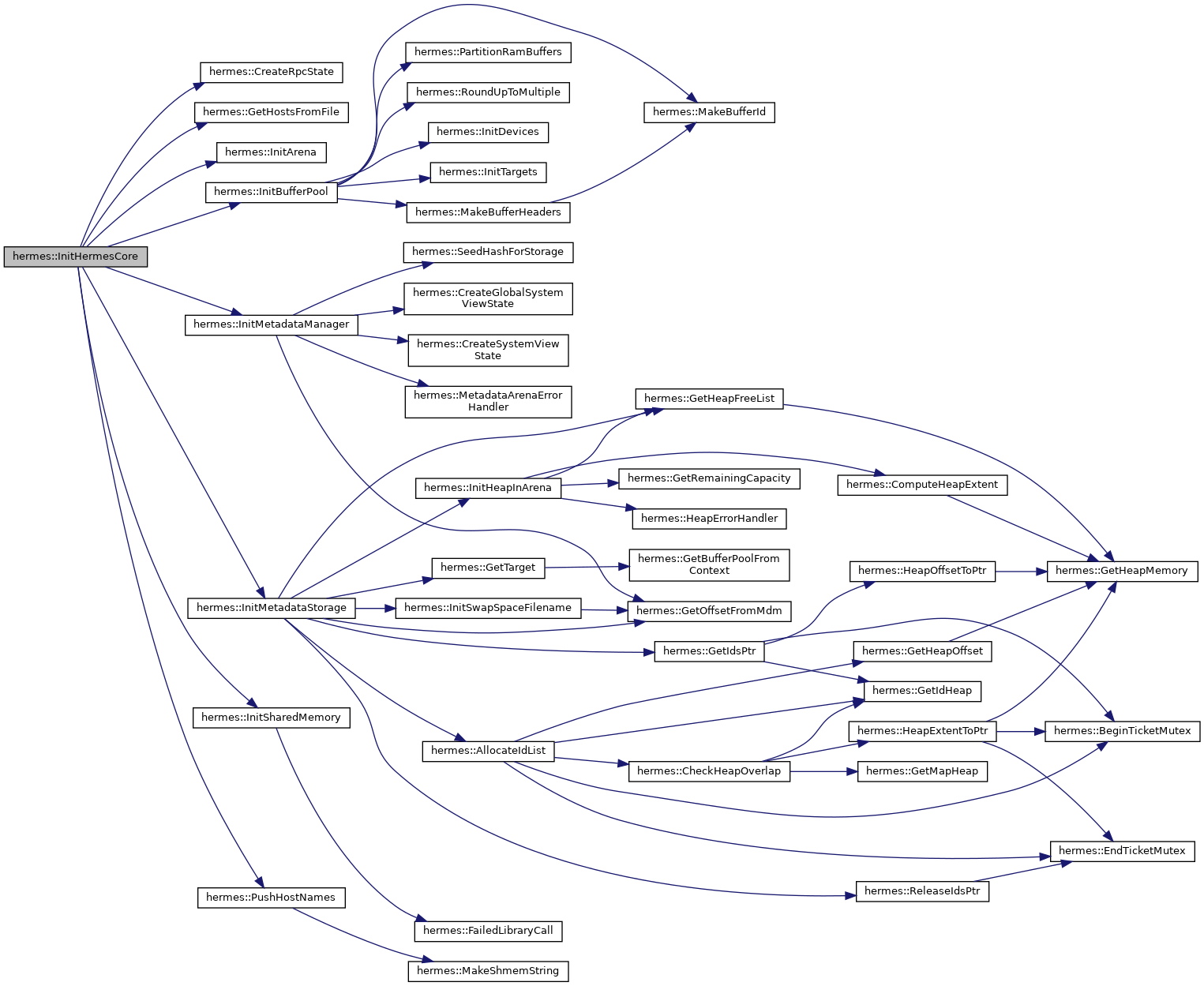

◆ BootstrapSharedMemory()
| SharedMemoryContext hermes::BootstrapSharedMemory | ( | Arena * | arenas, |
| Config * | config, | ||
| CommunicationContext * | comm, | ||
| RpcContext * | rpc, | ||
| bool | is_daemon, | ||
| bool | is_adapter | ||
| ) |
boostrap shared memory
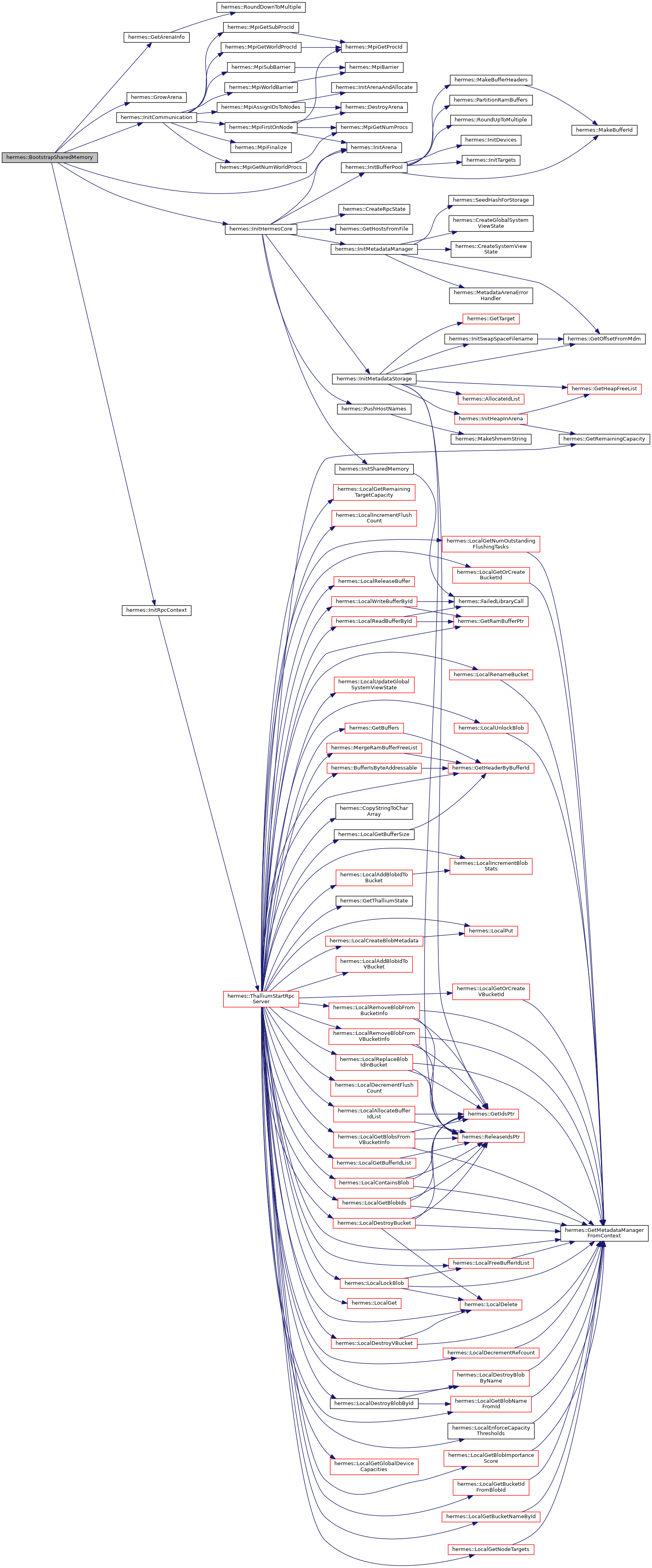

◆ InitHermes()
| std::shared_ptr< api::Hermes > hermes::InitHermes | ( | Config * | config, |
| bool | is_daemon = false, |
||
| bool | is_adapter = false |
||
| ) |
This is an overloaded member function, provided for convenience. It differs from the above function only in what argument(s) it accepts.
Allows programatically generating configurations.
- Parameters
-
config a pointer to configuration is_daemon a flag to run Hermes as a daemon is_adapter a flag to run Hermes in adapter mode
- Returns
- An initialized Hermes instance.
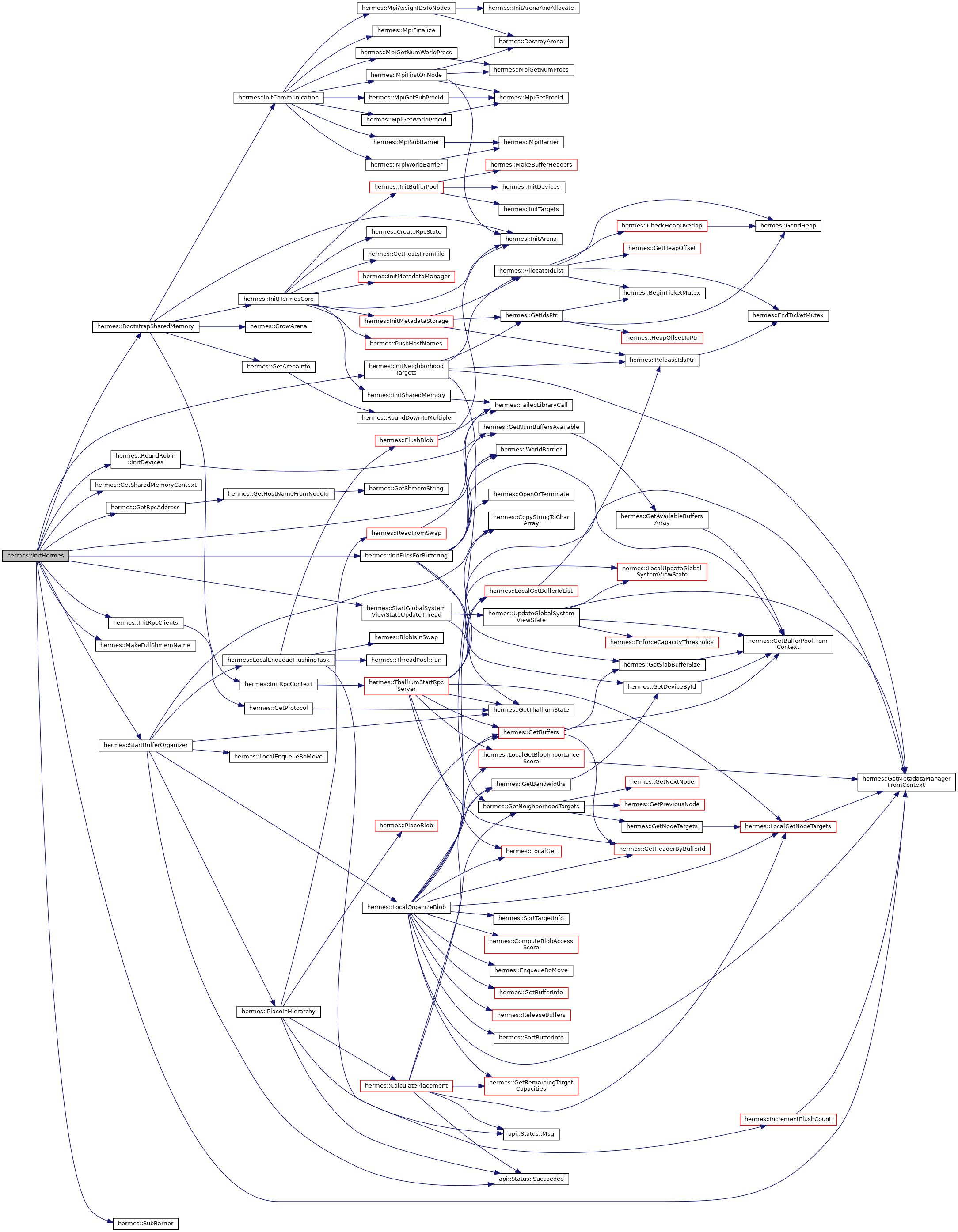

◆ InitHermesClient()
| std::shared_ptr< api::Hermes > hermes::InitHermesClient | ( | const char * | config_file = NULL | ) |
Initialize a Hermes instance as a client or adapter.
- Parameters
-
config_file The (relative or absolute) path to a hermes configuration file
- Precondition
- An existing Hermes daemon must already be running.
- Returns
- An initialized Hermes instance.
◆ InitHermesDaemon() [1/2]
| std::shared_ptr< api::Hermes > hermes::InitHermesDaemon | ( | char * | config_file = NULL | ) |
Initialize a Hermes instance as a daemon.
A Hermes daemon is one or more processes (one per node) that handle all Hermes background services. This includes RPC servers, thread pools, buffer organization, and SystemViewState updates. A daemon is necessary in workflows that involve 2 or more applications sharing buffered data. Without a daemon, (i.e., co-deploying Hermes services with an application) the lifetime of Hermes is tied to the app.
- Parameters
-
config_file The (relative or absolute) path to a hermes configuration file
- Returns
- An initialized Hermes instance.
◆ InitHermesDaemon() [2/2]
| std::shared_ptr< api::Hermes > hermes::InitHermesDaemon | ( | Config * | config | ) |
This is an overloaded member function, provided for convenience. It differs from the above function only in what argument(s) it accepts.
- Parameters
-
config A valid Config.
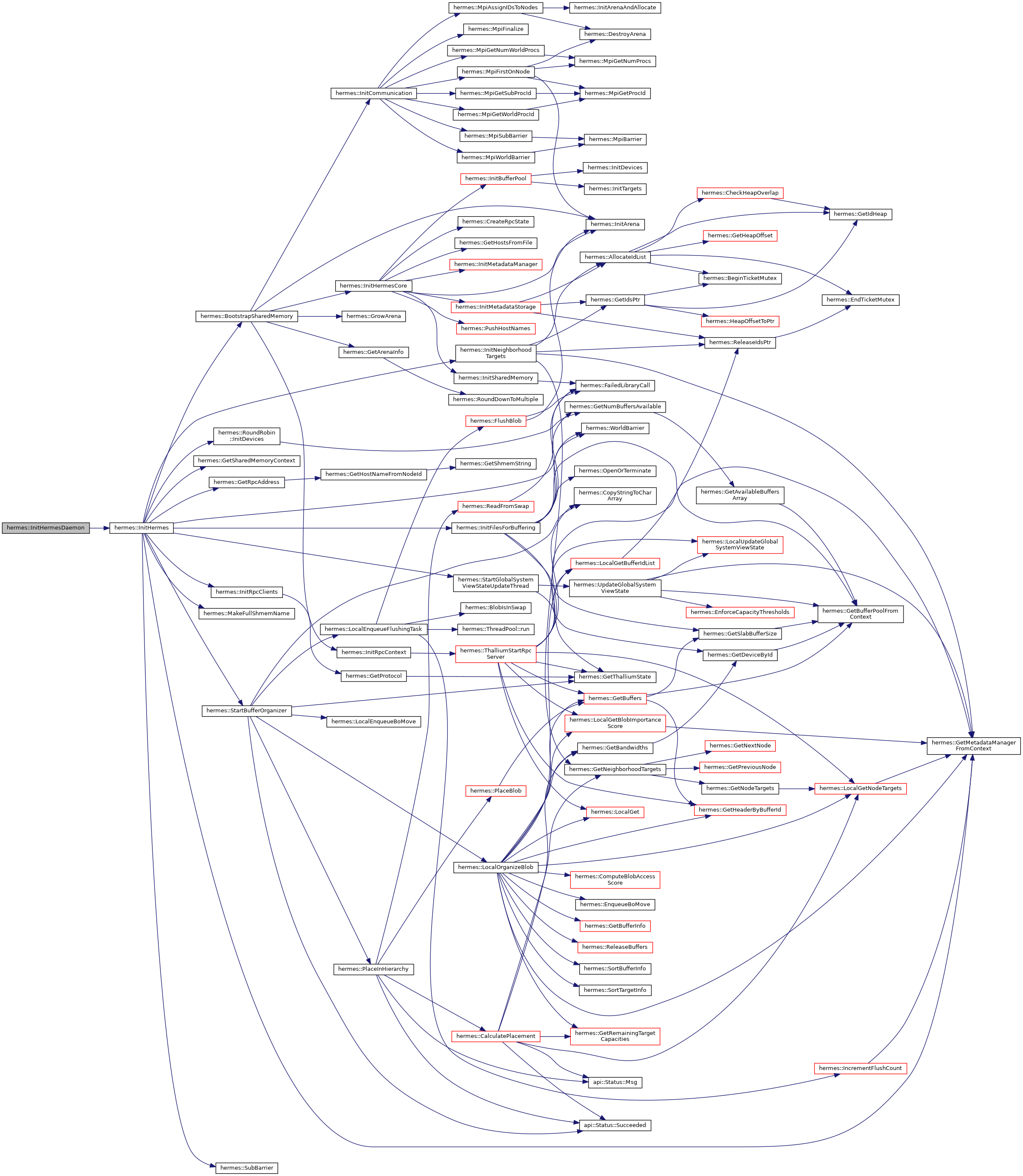
◆ operator==() [1/2]
| bool hermes::operator== | ( | const BufferInfo & | lhs, |
| const BufferInfo & | rhs | ||
| ) |
comparison operator
◆ LocalGetBufferInfo()
| BufferInfo hermes::LocalGetBufferInfo | ( | SharedMemoryContext * | context, |
| BufferID | buffer_id | ||
| ) |
get buffer information locally


◆ GetBufferInfo() [1/2]
| BufferInfo hermes::GetBufferInfo | ( | SharedMemoryContext * | context, |
| RpcContext * | rpc, | ||
| BufferID | buffer_id | ||
| ) |
get buffer information


◆ NormalizeAccessScore()
| f32 hermes::NormalizeAccessScore | ( | SharedMemoryContext * | context, |
| f32 | raw_score, | ||
| f32 | size_mb | ||
| ) |
normalize access score from raw-score using size_mb


◆ BytesToMegabytes()
|
inlinestatic |
< MB

◆ GetBufferInfo() [2/2]
| std::vector< BufferInfo > hermes::GetBufferInfo | ( | SharedMemoryContext * | context, |
| RpcContext * | rpc, | ||
| const std::vector< BufferID > & | buffer_ids | ||
| ) |
get buffer information

◆ ComputeBlobAccessScore()
| f32 hermes::ComputeBlobAccessScore | ( | SharedMemoryContext * | context, |
| const std::vector< BufferInfo > & | buffer_info | ||
| ) |
compute BLOB access score


◆ SortBufferInfo()
| void hermes::SortBufferInfo | ( | std::vector< BufferInfo > & | buffer_info, |
| bool | increasing | ||
| ) |
sort buffer information

◆ SortTargetInfo()
| void hermes::SortTargetInfo | ( | std::vector< TargetInfo > & | target_info, |
| bool | increasing | ||
| ) |
sort target information

◆ EnqueueBoMove()
| void hermes::EnqueueBoMove | ( | RpcContext * | rpc, |
| const BoMoveList & | moves, | ||
| BlobID | blob_id, | ||
| BucketID | bucket_id, | ||
| const std::string & | internal_name, | ||
| BoPriority | priority | ||
| ) |
enqueue buffer organizer move list

◆ LocalEnqueueBoMove()
| void hermes::LocalEnqueueBoMove | ( | SharedMemoryContext * | context, |
| RpcContext * | rpc, | ||
| const BoMoveList & | moves, | ||
| BlobID | blob_id, | ||
| BucketID | bucket_id, | ||
| const std::string & | internal_blob_name, | ||
| BoPriority | priority | ||
| ) |
enqueue buffer organizer move list locally

◆ BoMove()
| void hermes::BoMove | ( | SharedMemoryContext * | context, |
| RpcContext * | rpc, | ||
| const BoMoveList & | moves, | ||
| BlobID | blob_id, | ||
| BucketID | bucket_id, | ||
| const std::string & | internal_blob_name | ||
| ) |
Assumes all BufferIDs in destinations are local
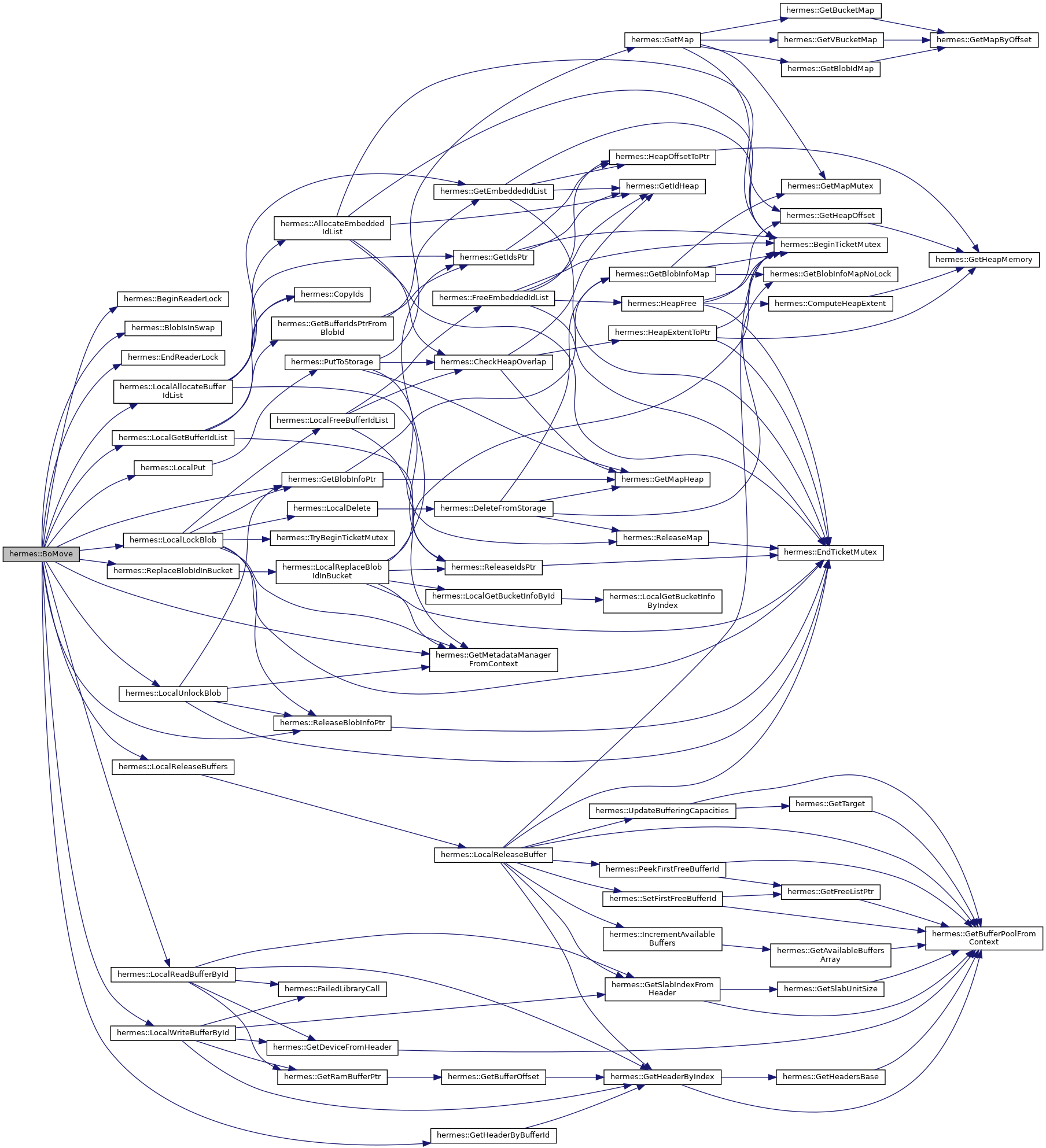
◆ LocalOrganizeBlob()
| void hermes::LocalOrganizeBlob | ( | SharedMemoryContext * | context, |
| RpcContext * | rpc, | ||
| const std::string & | internal_blob_name, | ||
| BucketID | bucket_id, | ||
| f32 | epsilon, | ||
| f32 | explicit_importance_score | ||
| ) |
organize BLOB locally
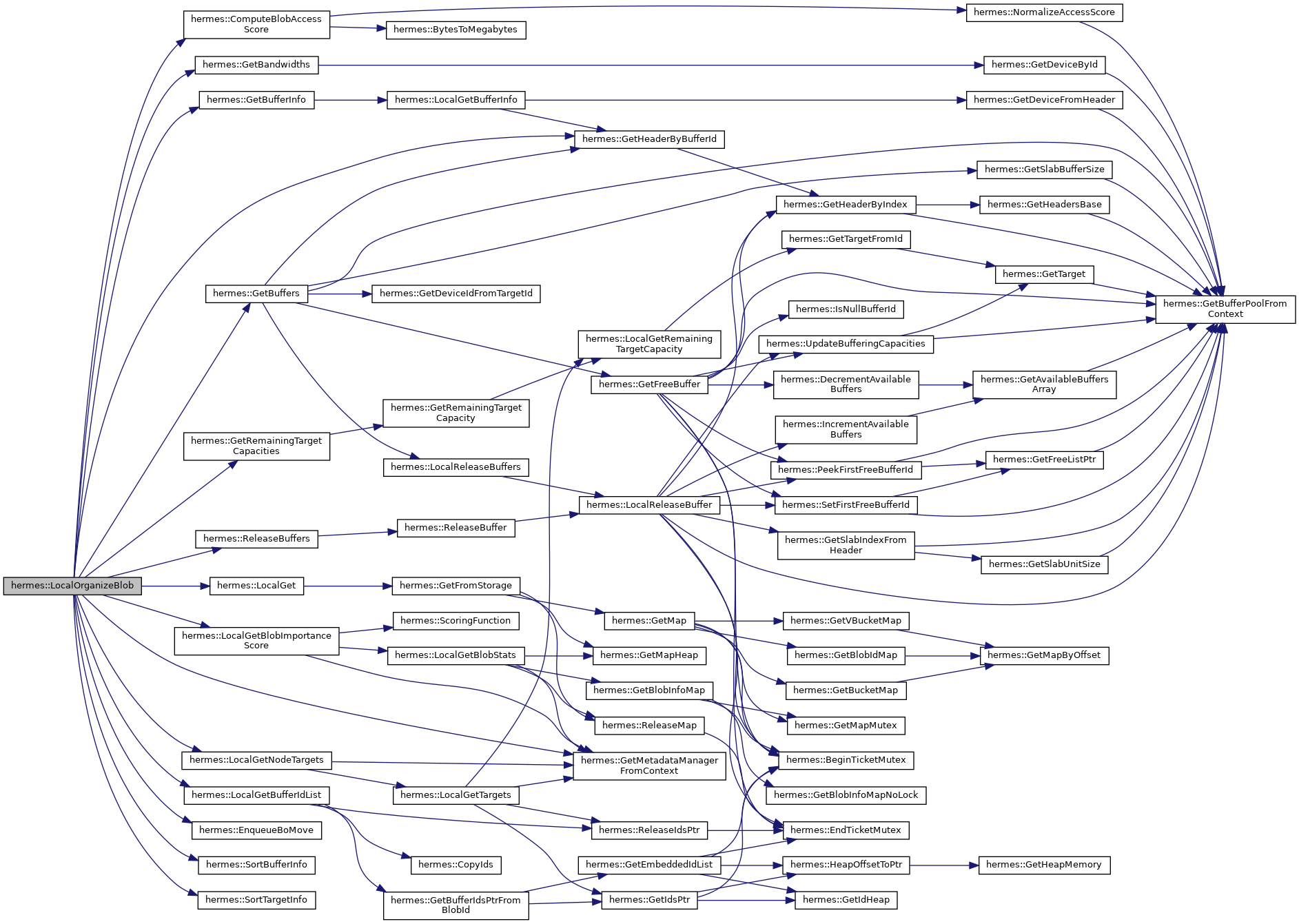

◆ OrganizeBlob()
| void hermes::OrganizeBlob | ( | SharedMemoryContext * | context, |
| RpcContext * | rpc, | ||
| BucketID | bucket_id, | ||
| const std::string & | blob_name, | ||
| f32 | epsilon, | ||
| f32 | importance_score = -1 |
||
| ) |
organize BLOB
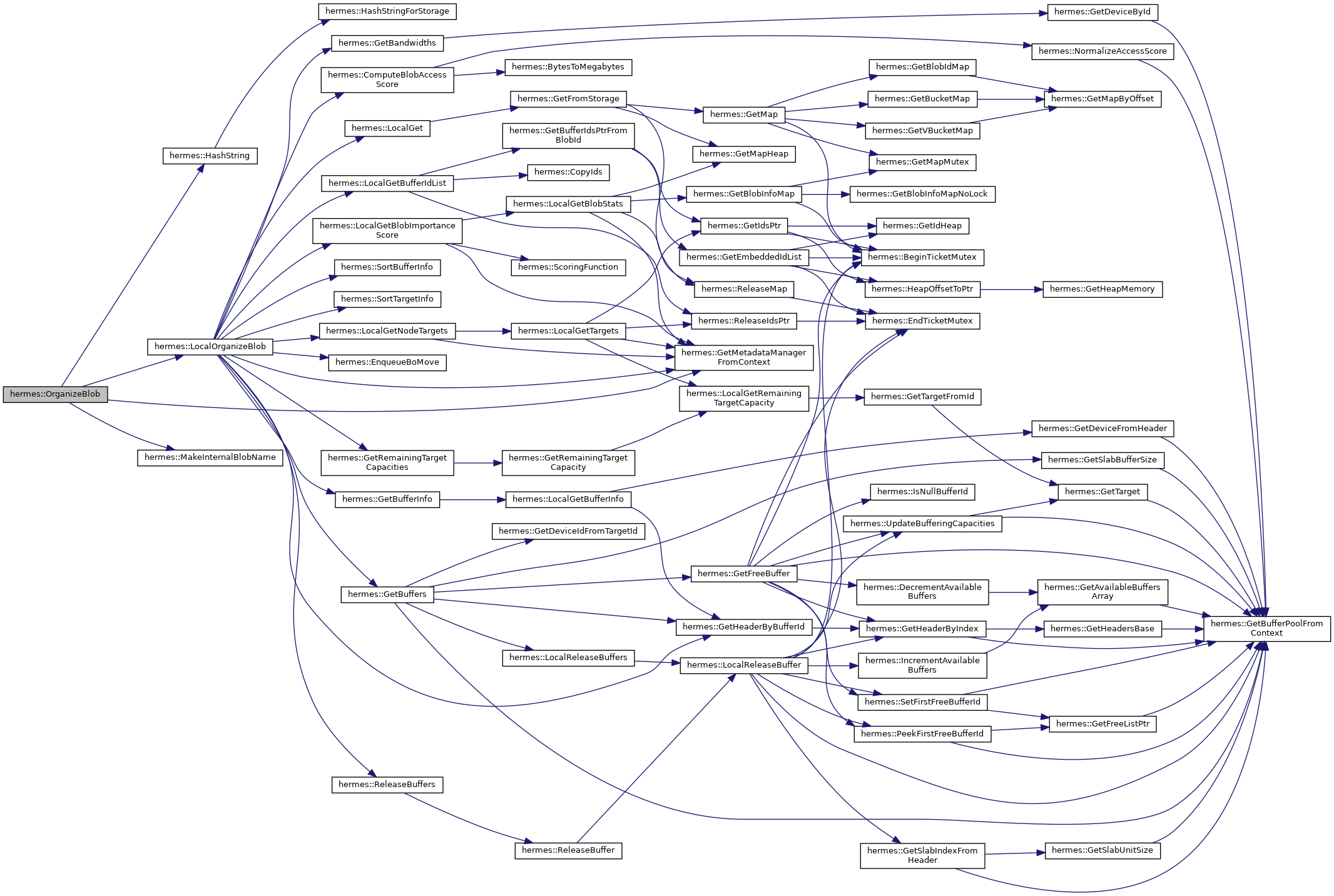

◆ EnforceCapacityThresholds()
| void hermes::EnforceCapacityThresholds | ( | SharedMemoryContext * | context, |
| RpcContext * | rpc, | ||
| ViolationInfo | info | ||
| ) |
enforce capacity threholds


◆ LocalEnforceCapacityThresholds()
| void hermes::LocalEnforceCapacityThresholds | ( | SharedMemoryContext * | context, |
| RpcContext * | rpc, | ||
| ViolationInfo | info | ||
| ) |
enforce capacity threholds locally


◆ LocalShutdownBufferOrganizer()
| void hermes::LocalShutdownBufferOrganizer | ( | SharedMemoryContext * | context | ) |
shut down buffer organizer locally

◆ FlushBlob()
| void hermes::FlushBlob | ( | SharedMemoryContext * | context, |
| RpcContext * | rpc, | ||
| BlobID | blob_id, | ||
| const std::string & | filename, | ||
| u64 | offset, | ||
| bool | async | ||
| ) |
< KB
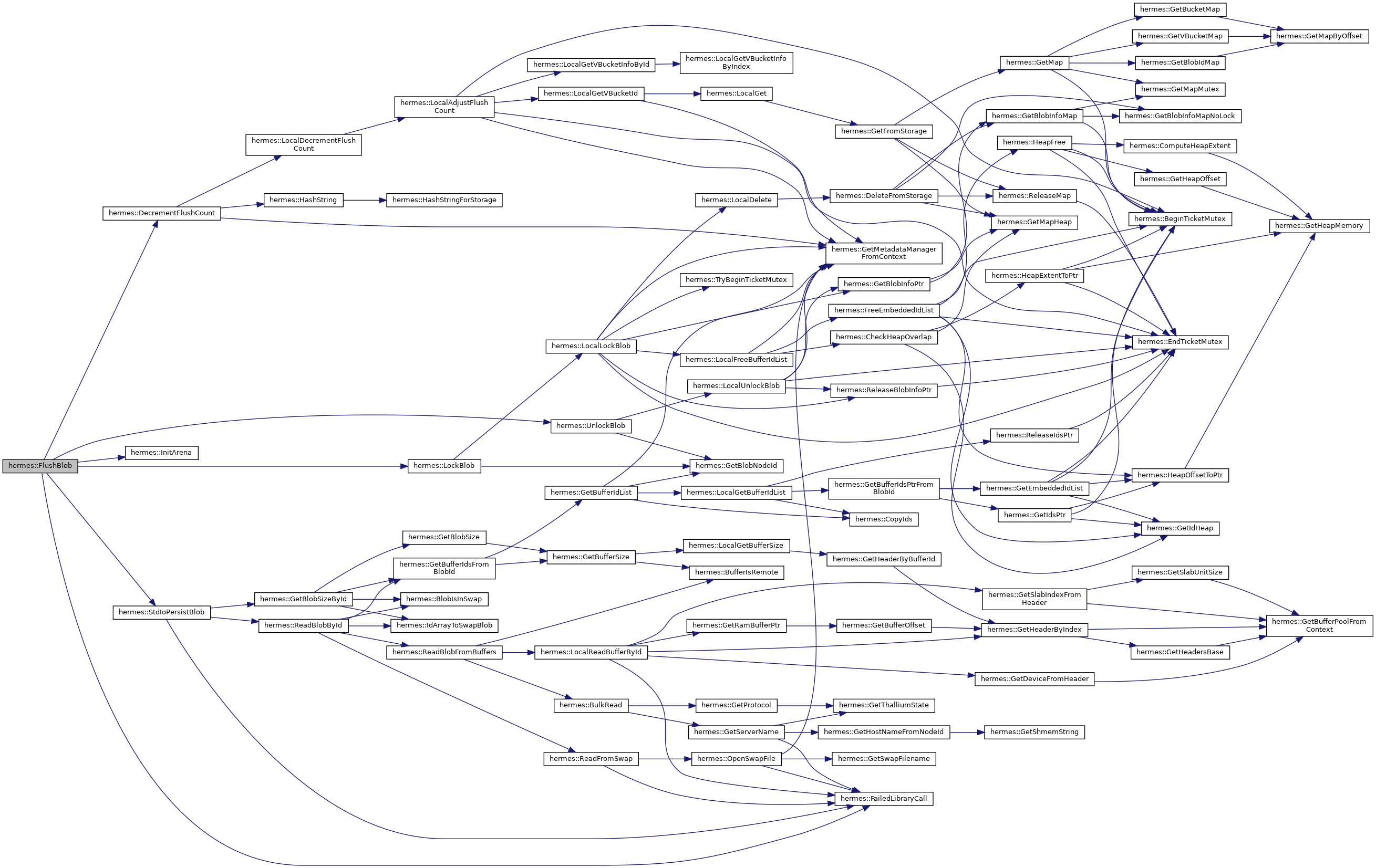

◆ EnqueueFlushingTask()
| bool hermes::EnqueueFlushingTask | ( | RpcContext * | rpc, |
| BlobID | blob_id, | ||
| const std::string & | filename, | ||
| u64 | offset | ||
| ) |
enqueue flushing task

◆ LocalEnqueueFlushingTask()
| bool hermes::LocalEnqueueFlushingTask | ( | SharedMemoryContext * | context, |
| RpcContext * | rpc, | ||
| BlobID | blob_id, | ||
| const std::string & | filename, | ||
| u64 | offset | ||
| ) |
enqueue flushing task locally
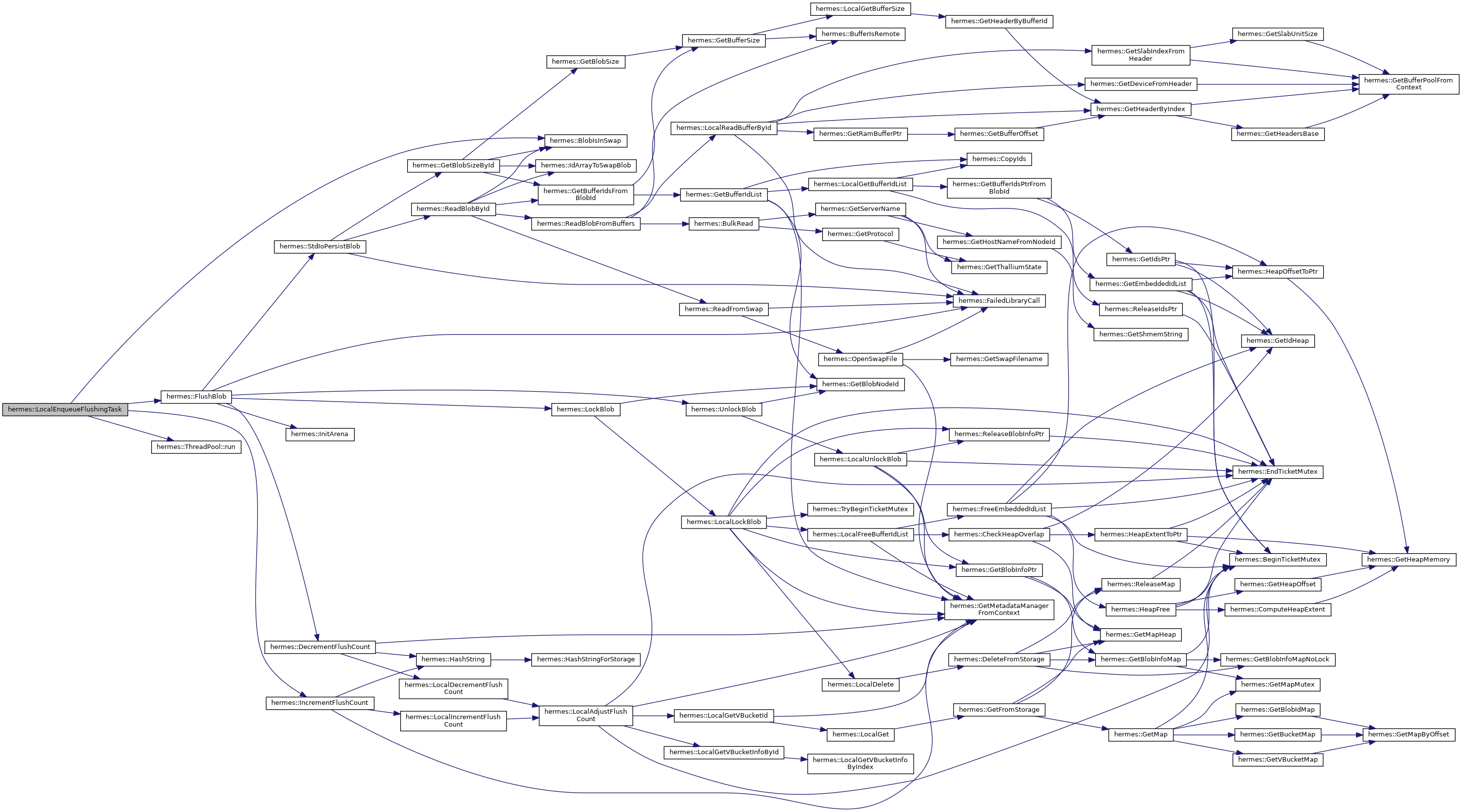

◆ PlaceInHierarchy()
| api::Status hermes::PlaceInHierarchy | ( | SharedMemoryContext * | context, |
| RpcContext * | rpc, | ||
| SwapBlob | swap_blob, | ||
| const std::string & | name, | ||
| const api::Context & | ctx | ||
| ) |
place BLOBs in hierarchy
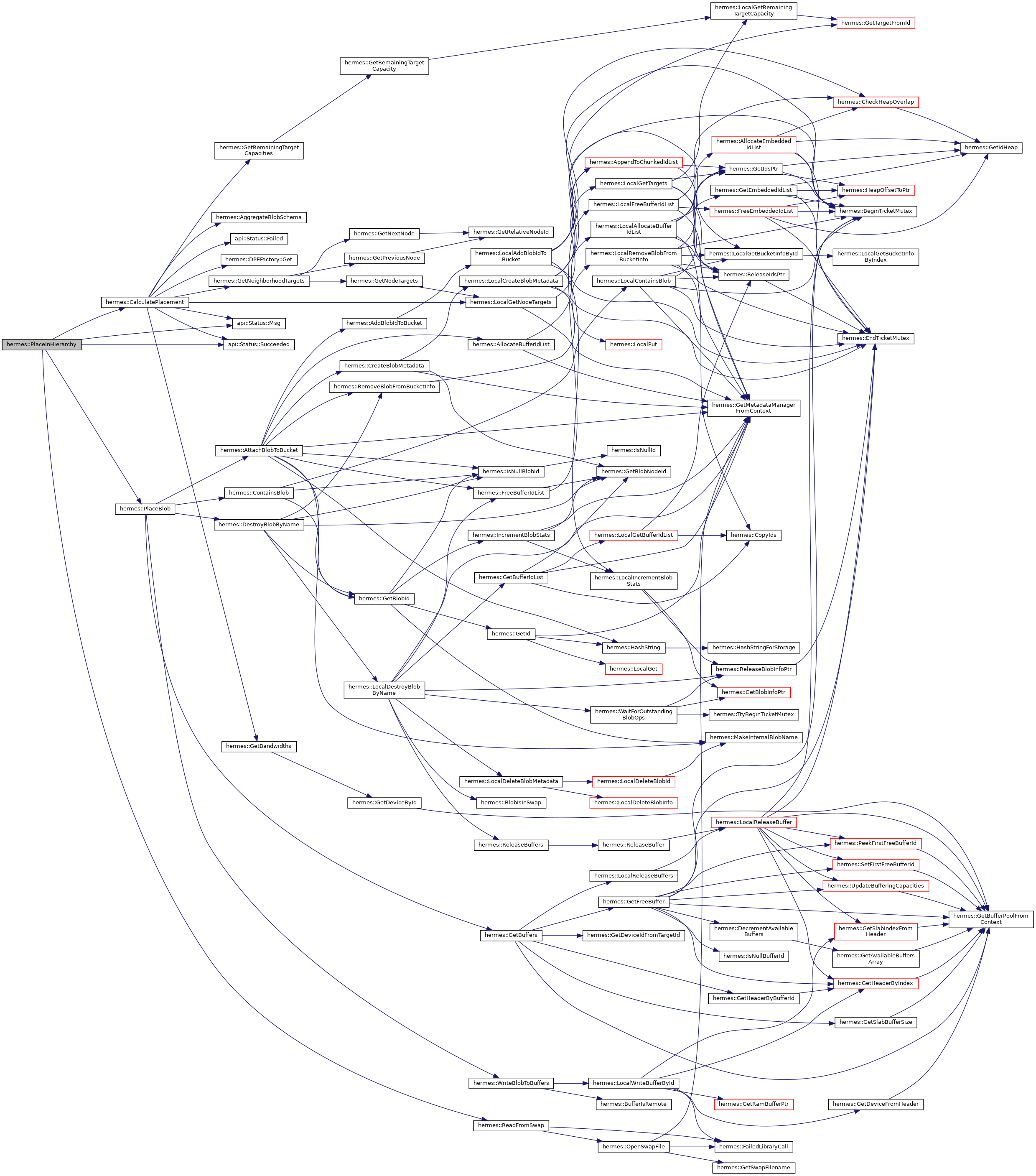

◆ LocalAdjustFlushCount()
| void hermes::LocalAdjustFlushCount | ( | SharedMemoryContext * | context, |
| const std::string & | vbkt_name, | ||
| int | adjustment | ||
| ) |
adjust flush coun locally


◆ LocalIncrementFlushCount()
| void hermes::LocalIncrementFlushCount | ( | SharedMemoryContext * | context, |
| const std::string & | vbkt_name | ||
| ) |
increment flush count locally


◆ LocalDecrementFlushCount()
| void hermes::LocalDecrementFlushCount | ( | SharedMemoryContext * | context, |
| const std::string & | vbkt_name | ||
| ) |
decrement flush count locally


◆ IncrementFlushCount()
| void hermes::IncrementFlushCount | ( | SharedMemoryContext * | context, |
| RpcContext * | rpc, | ||
| const std::string & | vbkt_name | ||
| ) |
increment flush count


◆ DecrementFlushCount()
| void hermes::DecrementFlushCount | ( | SharedMemoryContext * | context, |
| RpcContext * | rpc, | ||
| const std::string & | vbkt_name | ||
| ) |
decrement flush count


◆ AwaitAsyncFlushingTasks()
| void hermes::AwaitAsyncFlushingTasks | ( | SharedMemoryContext * | context, |
| RpcContext * | rpc, | ||
| VBucketID | id | ||
| ) |
await asynchronous flushing tasks


◆ OrganizeDevice()
| void hermes::OrganizeDevice | ( | SharedMemoryContext * | context, |
| RpcContext * | rpc, | ||
| DeviceID | devices_id | ||
| ) |
organize device
◆ operator==() [2/2]
◆ Finalize()
| void hermes::Finalize | ( | SharedMemoryContext * | context, |
| CommunicationContext * | comm, | ||
| RpcContext * | rpc, | ||
| const char * | shmem_name, | ||
| Arena * | trans_arena, | ||
| bool | is_application_core, | ||
| bool | force_rpc_shutdown | ||
| ) |
Free all resources held by Hermes.
- Parameters
-
context The Hermes instance's shared memory context. comm The Hermes instance's communication context. rpc The Hermes instance's RPC context. shmem_name The name of the shared memory. trans_arena The instance's transient arena. is_application_core Whether or not this rank is an app rank. force_rpc_shutdown Force RPC shutdown when it is true.
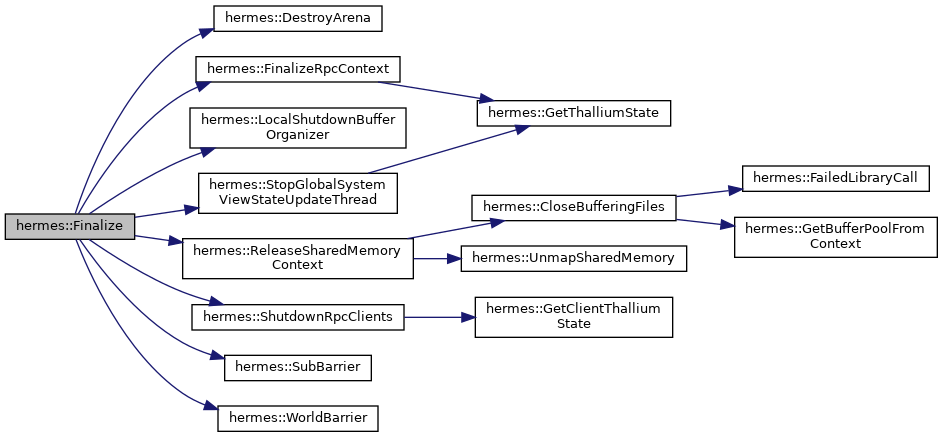

◆ LockBuffer()
| void hermes::LockBuffer | ( | BufferHeader * | header | ) |
Lock header buffer.
◆ UnlockBuffer()
| void hermes::UnlockBuffer | ( | BufferHeader * | header | ) |
Unlock header buffer.
◆ GetBufferPoolFromContext()
| BufferPool * hermes::GetBufferPoolFromContext | ( | SharedMemoryContext * | context | ) |
Obtains a pointer to the BufferPool constructed in shared memory.
Since the BufferPool lives in shared memory, this pointer should never be freed. It is only destroyed when the Hermes core closes the shared memory.
- Parameters
-
context The shared memory context for accessing the BufferPool.
- Returns
- A pointer to the BufferPool constructed in the shared memory represented by
context.
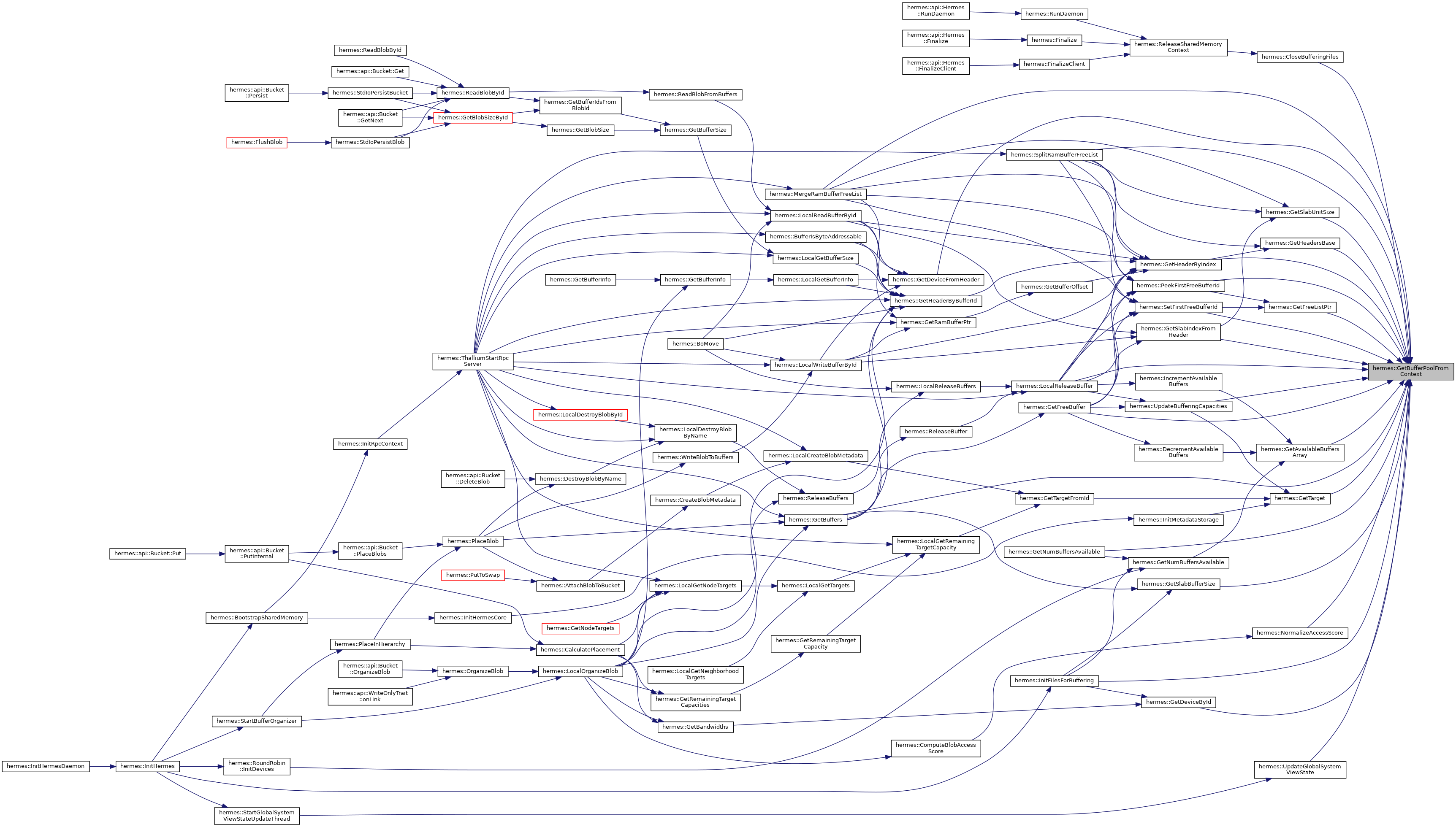
◆ GetDeviceFromHeader()
| Device * hermes::GetDeviceFromHeader | ( | SharedMemoryContext * | context, |
| BufferHeader * | header | ||
| ) |
Get Device from context SharedMemoryContext and header BufferHeader


◆ GetTarget()
| Target * hermes::GetTarget | ( | SharedMemoryContext * | context, |
| int | index | ||
| ) |
Get Target from context SharedMemoryContext and index index.


◆ GetTargetFromId()
| Target * hermes::GetTargetFromId | ( | SharedMemoryContext * | context, |
| TargetID | id | ||
| ) |
Get Target from context SharedMemoryContext and id TargetID.


◆ GetBandwidths()
| std::vector< f32 > hermes::GetBandwidths | ( | SharedMemoryContext * | context, |
| const std::vector< TargetID > & | targets | ||
| ) |
Returns a vector of bandwidths in MiB per second for a given Target list.
Element n of the result is the bandwidth of the Device that backs the nth element of targets.
- Parameters
-
context The shared memory context needed to access BufferPool info. targets The list of targets for which to retrieve bandwidth info.
- Returns
- The list of bandwidths, one for each target in
targets, in MiB/sec.


◆ GetDeviceById()
| Device * hermes::GetDeviceById | ( | SharedMemoryContext * | context, |
| DeviceID | device_id | ||
| ) |
Returns a pointer to the Device with index device_id in the shared memory context.
This pointer should never be freed, since it lives in shared memory and is managed by the Hermes core.
- Parameters
-
context The shared memory context where the Devices are stored. device_id An identifier for the desired Device. This is an index into an array of Devices.
- Returns
- A pointer to the Device with ID device_id.


◆ GetDeviceIdFromTargetId()
◆ GetHeadersBase()
| BufferHeader * hermes::GetHeadersBase | ( | SharedMemoryContext * | context | ) |
Returns a pointer to the first BufferHeader in the array of BufferHeaders constructed in the shared memory context.
This pointer should never be freed, as it is managed by the Hermes core. Indexing off this pointer, one can easily iterate through all BufferHeaders. When retrieving a specific header, use GetHeaderByBufferId.
Example:
- Parameters
-
context The shared memory context where the BufferHeaders live.
- Returns
- A pointer to the first BufferHeader in the array of BufferHeaders.

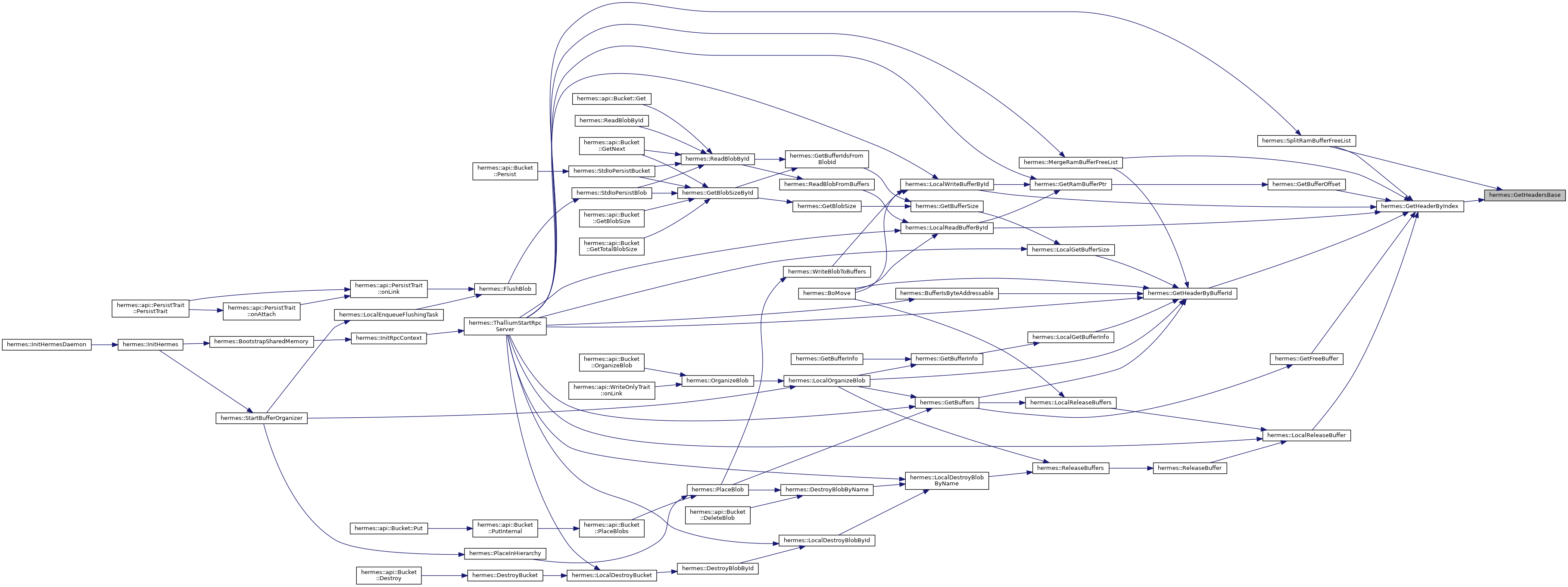
◆ GetHeaderByIndex()
|
inline |
Get BufferHeader from context SharedMemoryContext and index index.

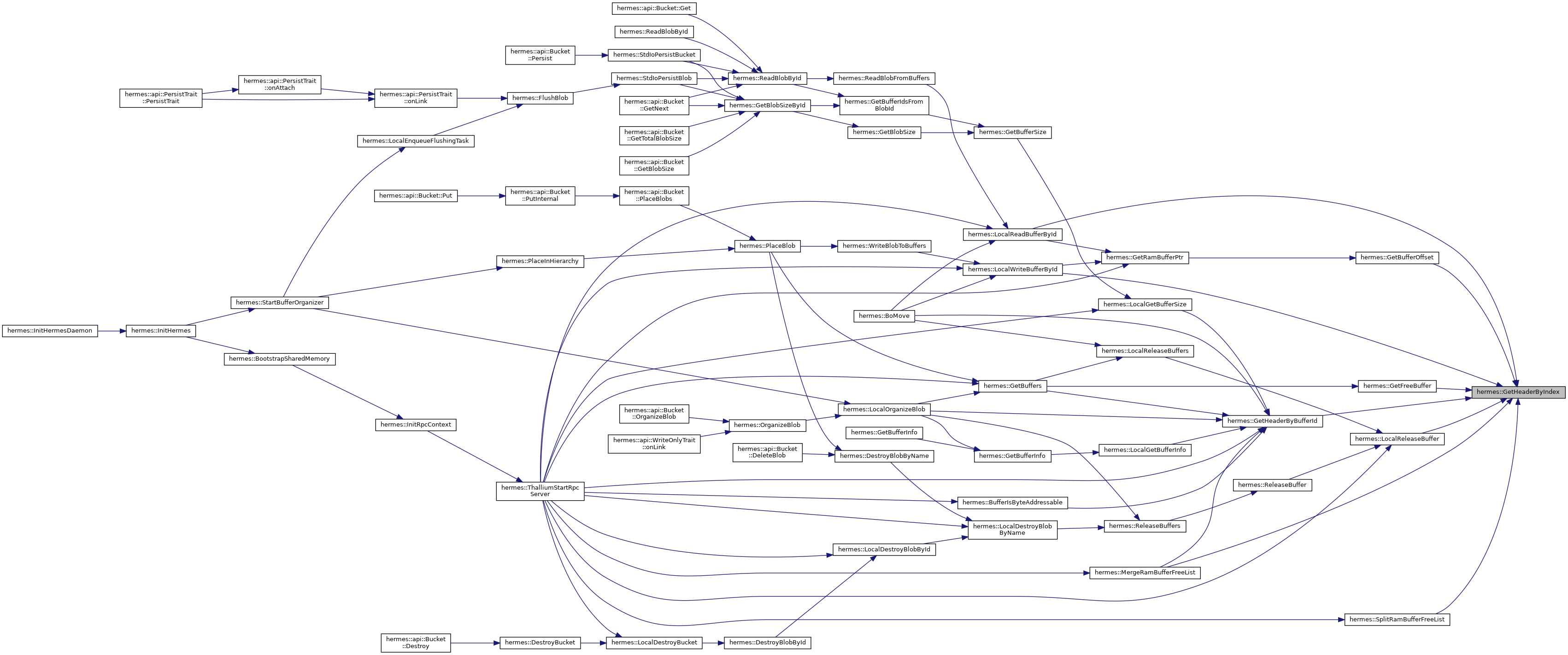
◆ GetHeaderByBufferId()
| BufferHeader * hermes::GetHeaderByBufferId | ( | SharedMemoryContext * | context, |
| BufferID | id | ||
| ) |
Retrieves the BufferHeader that corresponds to BufferID id.
This pointer should never be freed. The BufferHeaders are managed by the Hermes core.
- Parameters
-
context The shared memory context for accessing the BufferHeaders. id The desired BufferID to retrieve.
- Returns
- A pointer to the BufferHeader that corresponds to
id.


◆ ResetHeader()
| void hermes::ResetHeader | ( | BufferHeader * | header | ) |
◆ MakeHeaderDormant()
|
inlinestatic |
Make header BufferHeader dormant by setting capacity to 0.

◆ HeaderIsDormant()
| bool hermes::HeaderIsDormant | ( | BufferHeader * | header | ) |
Returns whether or not header is currently backed by physical storage.
A dormant header has no storage associated with it. It exists to facilitate the splitting and merging mechanisms. Splitting buffers into smaller buffers requires more headers. When that happens, dormant headers become associated with backing storage, and become "live."
- Parameters
-
header The header to check.
- Returns
- true if
headeris not backed by physical storage, false otherwise.

◆ GetSlabUnitSize()
| i32 hermes::GetSlabUnitSize | ( | SharedMemoryContext * | context, |
| DeviceID | device_id, | ||
| int | slab_index | ||
| ) |
Get slab unit size from context SharedMemoryContext, device_id Device ID, and slab_index slab index.


◆ GetSlabBufferSize()
| i32 hermes::GetSlabBufferSize | ( | SharedMemoryContext * | context, |
| DeviceID | device_id, | ||
| int | slab_index | ||
| ) |
Get slab buffer size from context SharedMemoryContext, device_id Device ID, and slab_index slab index.


◆ GetFreeListPtr()
| BufferID* hermes::GetFreeListPtr | ( | SharedMemoryContext * | context, |
| DeviceID | device_id | ||
| ) |
Get BufferID pointer to the free list offset of device_id Device ID from context SharedMemoryContext.


◆ GetSlabIndexFromHeader()
| int hermes::GetSlabIndexFromHeader | ( | SharedMemoryContext * | context, |
| BufferHeader * | header | ||
| ) |
Get slab index from context SharedMemoryContext and header BufferHeader.


◆ BufferIsRemote() [1/2]
| bool hermes::BufferIsRemote | ( | CommunicationContext * | comm, |
| BufferID | buffer_id | ||
| ) |
Check if node ID of buffer_id BufferID is same as node ID of comm CommunicationContext.

◆ BufferIsRemote() [2/2]
| bool hermes::BufferIsRemote | ( | RpcContext * | rpc, |
| BufferID | buffer_id | ||
| ) |
Check if node ID of buffer_id BufferID is same as node ID of rpc RpcContext.
◆ IsNullBufferId()
| bool hermes::IsNullBufferId | ( | BufferID | id | ) |
◆ BufferIsByteAddressable()
| bool hermes::BufferIsByteAddressable | ( | SharedMemoryContext * | context, |
| BufferID | id | ||
| ) |
Check if the device with context SharedMemoryContext and buffer_id BufferID is byte-addressable.


◆ PeekFirstFreeBufferId()
| BufferID hermes::PeekFirstFreeBufferId | ( | SharedMemoryContext * | context, |
| DeviceID | device_id, | ||
| int | slab_index | ||
| ) |
Get the first free BufferID from context SharedMemoryContext, device_id DeviceID, and slab_index slab index.


◆ SetFirstFreeBufferId()
| void hermes::SetFirstFreeBufferId | ( | SharedMemoryContext * | context, |
| DeviceID | device_id, | ||
| int | slab_index, | ||
| BufferID | new_id | ||
| ) |
Set the value at slab_index slab index of free list from context SharedMemoryContext and device_id DeviceID as new_id BufferID.


◆ GetAvailableBuffersArray()
| std::atomic< u32 > * hermes::GetAvailableBuffersArray | ( | SharedMemoryContext * | context, |
| DeviceID | device_id | ||
| ) |
Get the array of available buffer offsets from context SharedMemoryContext and device_id DeviceID.


◆ GetNumBuffersAvailable() [1/2]
|
static |
Get the number of available buffers from context SharedMemoryContext, and device_id DeviceID at slab_index slab index.


◆ GetNumBuffersAvailable() [2/2]
| u32 hermes::GetNumBuffersAvailable | ( | SharedMemoryContext * | context, |
| DeviceID | device_id | ||
| ) |
Get the number of available buffers from context SharedMemoryContext, and device_id DeviceID.

◆ DecrementAvailableBuffers()
|
static |
Decrement the number of available buffers at slab_index slab index from context SharedMemoryContext and device_id DeviceID.


◆ IncrementAvailableBuffers()
|
static |
Increment the number of available buffers at slab_index slab index from context SharedMemoryContext and device_id DeviceID.


◆ UpdateBufferingCapacities()
| void hermes::UpdateBufferingCapacities | ( | SharedMemoryContext * | context, |
| i64 | adjustment, | ||
| DeviceID | device_id | ||
| ) |
Update buffering capacities of device_id DeviceID by adjustment from context SharedMemoryContext.


◆ LocalReleaseBuffer()
| void hermes::LocalReleaseBuffer | ( | SharedMemoryContext * | context, |
| BufferID | buffer_id | ||
| ) |
Release local buffer_id buffer from context SharedMemoryContext.
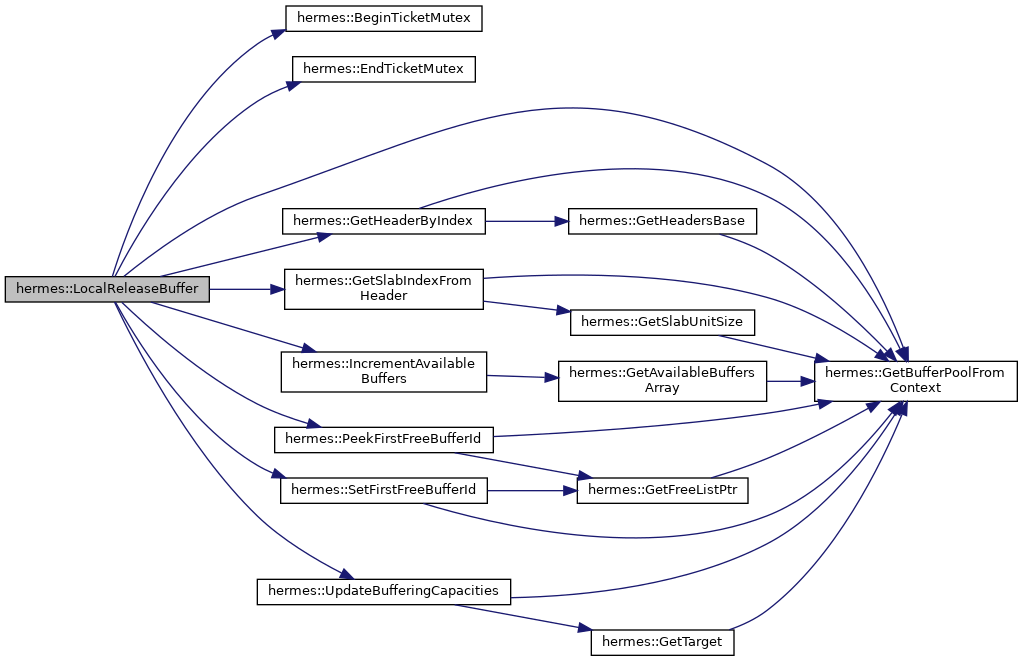

◆ ReleaseBuffer()
| void hermes::ReleaseBuffer | ( | SharedMemoryContext * | context, |
| RpcContext * | rpc, | ||
| BufferID | buffer_id | ||
| ) |
Release remote buffer_id buffer from context SharedMemoryContext and rpc RpcContext.
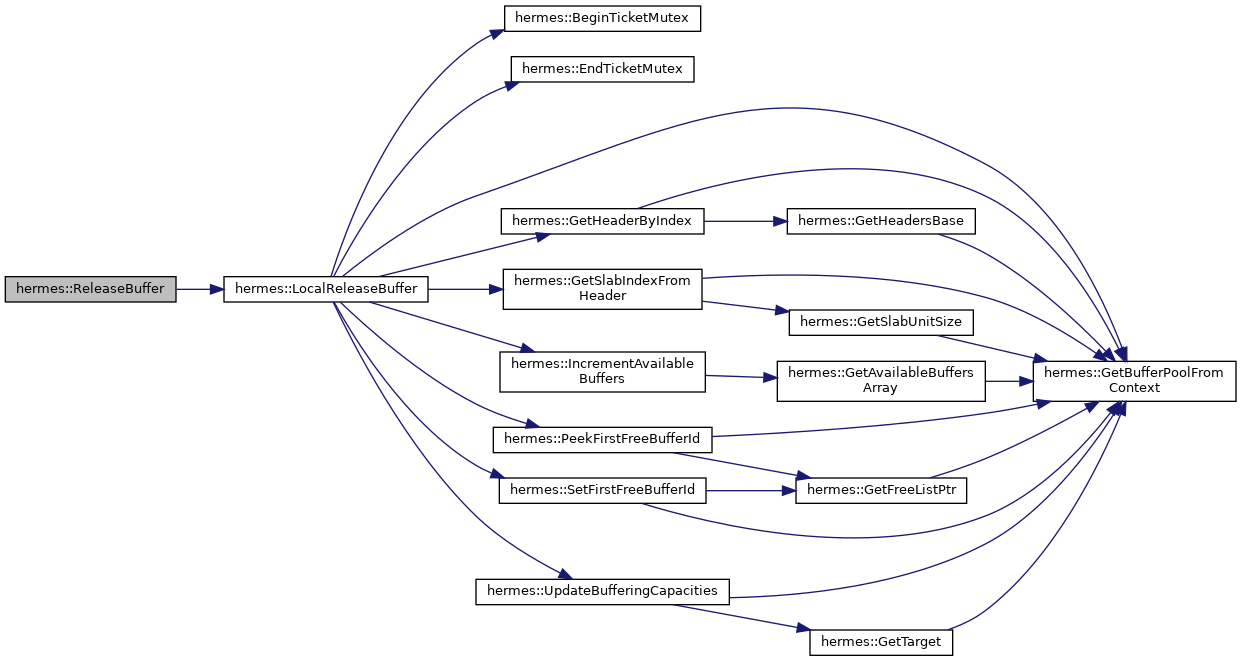

◆ ReleaseBuffers()
| void hermes::ReleaseBuffers | ( | SharedMemoryContext * | context, |
| RpcContext * | rpc, | ||
| const std::vector< BufferID > & | buffer_ids | ||
| ) |
Release remote buffer_ids buffers from context SharedMemoryContext and rpc RpcContext.
Returns buffer_ids to the BufferPool free lists so that they can be used again. Data in the buffers is considered abandonded, and can be overwritten.
- Parameters
-
context The shared memory context where the BufferPool lives. rpc The RPC context to enable a remote call if necessary. buffer_ids The list of buffer_ids to return to the BufferPool.
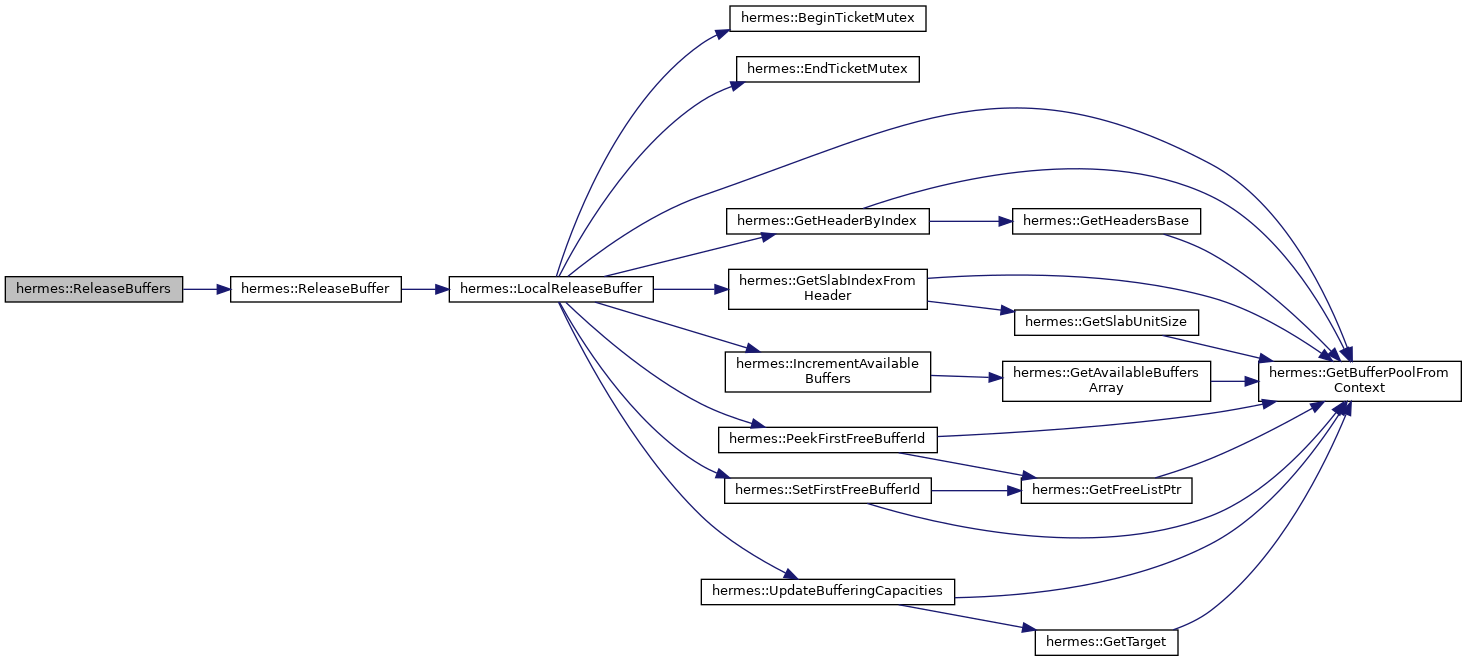

◆ LocalReleaseBuffers()
| void hermes::LocalReleaseBuffers | ( | SharedMemoryContext * | context, |
| const std::vector< BufferID > & | buffer_ids | ||
| ) |
Release local buffer_ids buffers from context SharedMemoryContext.
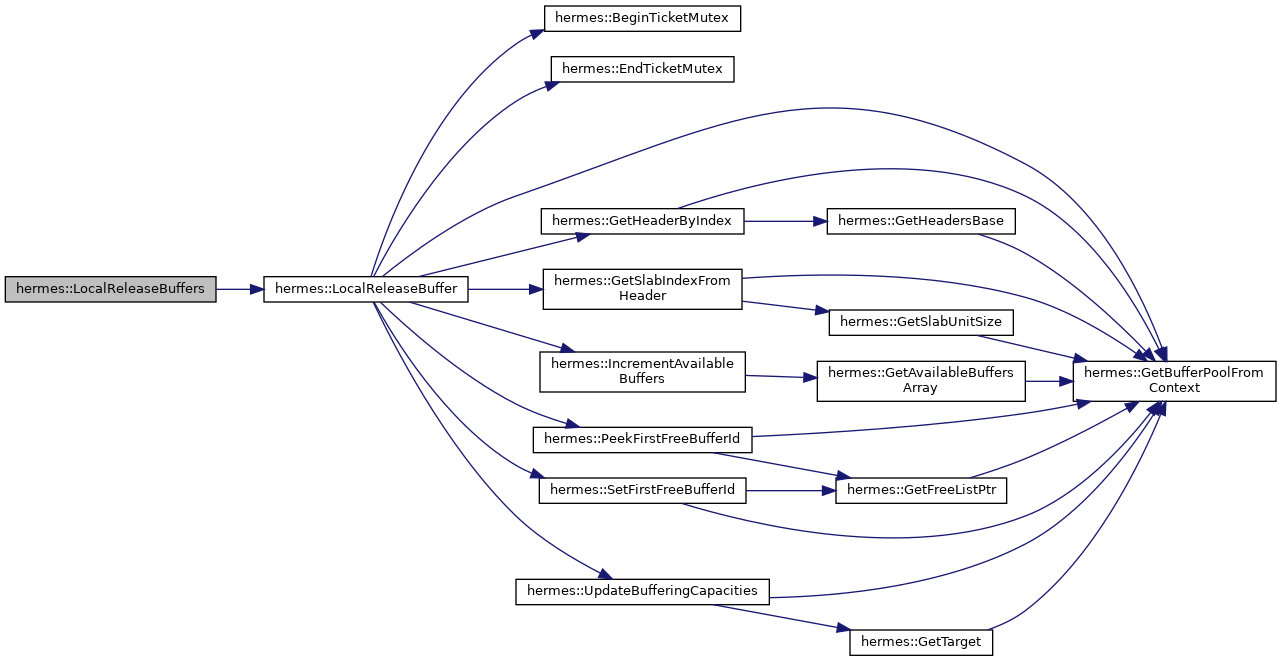

◆ GetFreeBuffer()
| BufferID hermes::GetFreeBuffer | ( | SharedMemoryContext * | context, |
| DeviceID | device_id, | ||
| int | slab_index | ||
| ) |
Get the BufferID of free buffer at slab_index slab index from context SharedMemoryContext and device_id DeviceID.
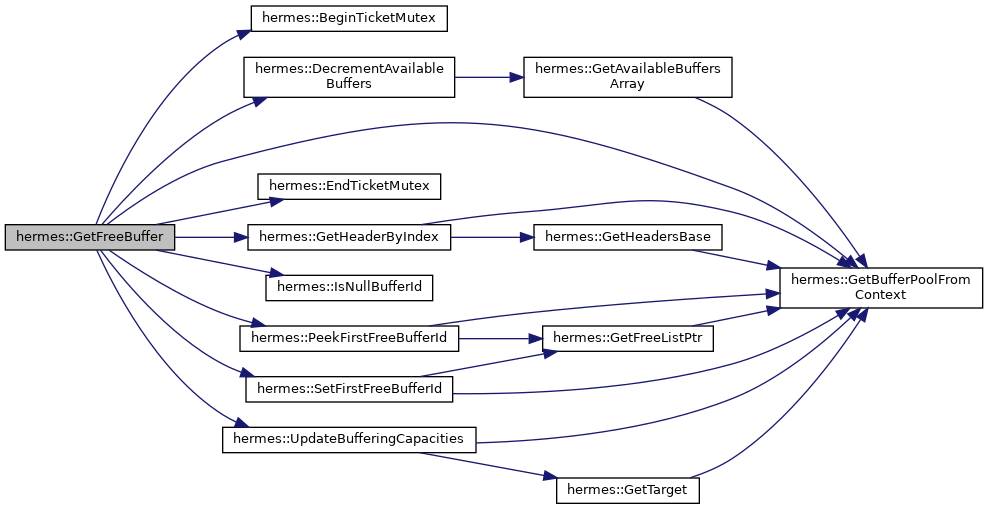

◆ GetBuffers()
| std::vector< BufferID > hermes::GetBuffers | ( | SharedMemoryContext * | context, |
| const PlacementSchema & | schema | ||
| ) |
Returns a vector of BufferIDs that satisfy the constrains of schema.
If a request cannot be fulfilled, an empty list is returned. GetBuffers will never partially satisfy a request. It is all or nothing. If schema includes a remote Device, this function will make an RPC call to get BufferIDs from a remote node.
- Parameters
-
context The shared memory context for the BufferPool. schema A description of the amount and Device of storage requested.
- Returns
- A vector of BufferIDs that can be used for storage, and that satisfy
schema, or an empty vector if the request could not be fulfilled.
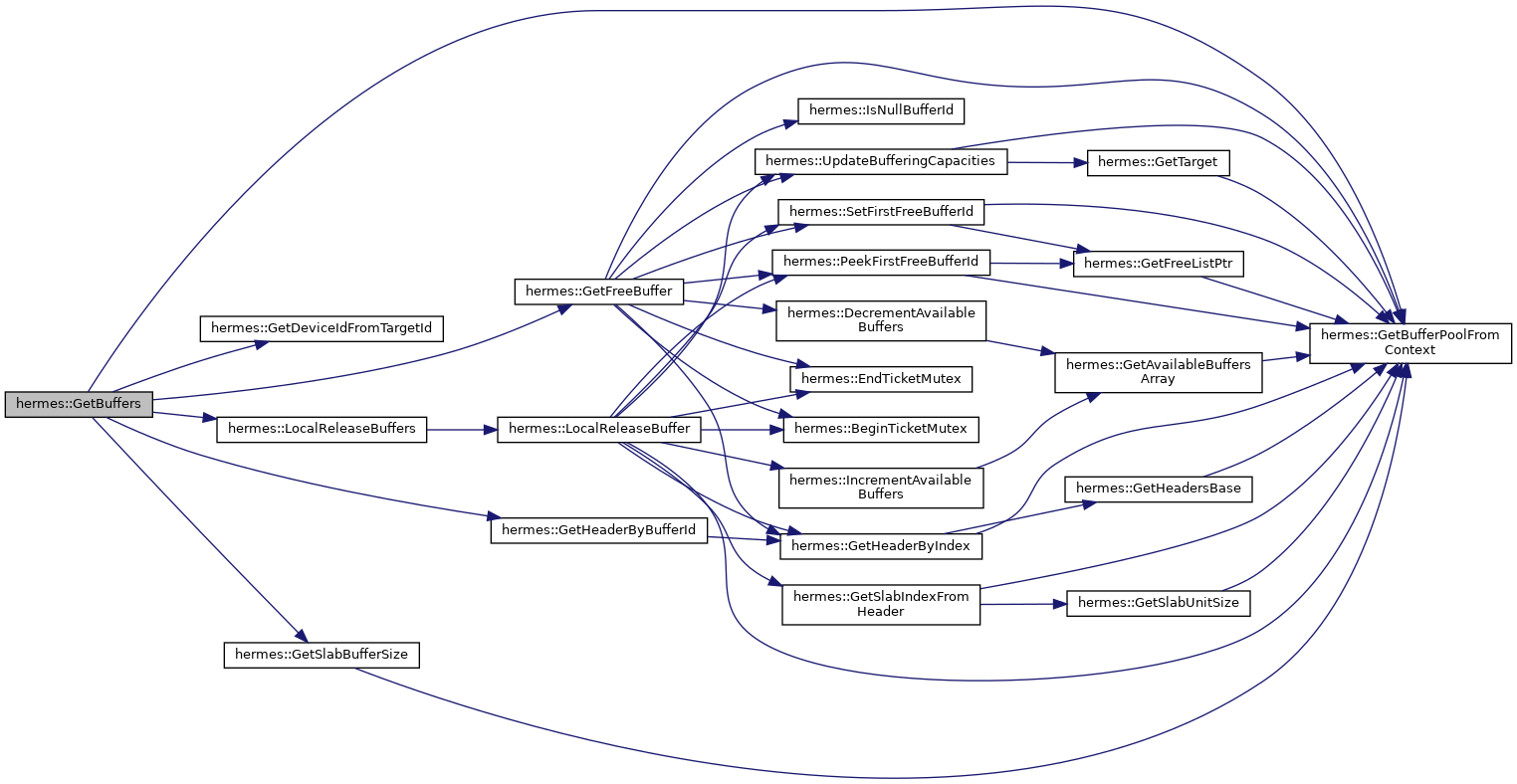

◆ LocalGetBufferSize()
| u32 hermes::LocalGetBufferSize | ( | SharedMemoryContext * | context, |
| BufferID | id | ||
| ) |
Get buffer size from context SharedMemoryContext and id BufferID.


◆ GetBufferSize()
| u32 hermes::GetBufferSize | ( | SharedMemoryContext * | context, |
| RpcContext * | rpc, | ||
| BufferID | id | ||
| ) |
Get remote buffer size from context SharedMemoryContext, rpc RpcContext, and id BufferID.


◆ GetBlobSize()
| size_t hermes::GetBlobSize | ( | SharedMemoryContext * | context, |
| RpcContext * | rpc, | ||
| BufferIdArray * | buffer_ids | ||
| ) |
Get remote BLOB size from context SharedMemoryContext, rpc RpcContext, and buffer_ids BufferIdArray.


◆ GetBlobSizeById()
| size_t hermes::GetBlobSizeById | ( | SharedMemoryContext * | context, |
| RpcContext * | rpc, | ||
| Arena * | arena, | ||
| BlobID | blob_id | ||
| ) |
Get remote BLOB size from context SharedMemoryContext, rpc RpcContext, arena Arena, and blob_id BlobID.


◆ GetBufferOffset()
| ptrdiff_t hermes::GetBufferOffset | ( | SharedMemoryContext * | context, |
| BufferID | id | ||
| ) |
Get buffer offset of id buffer from context SharedMemoryContext.


◆ GetRamBufferPtr()
| u8 * hermes::GetRamBufferPtr | ( | SharedMemoryContext * | context, |
| BufferID | buffer_id | ||
| ) |
Get RAM buffer pointer of id buffer from context SharedMemoryContext.


◆ MakeBufferId()
◆ PartitionRamBuffers()
| void hermes::PartitionRamBuffers | ( | Arena * | arena, |
| i32 | buffer_size, | ||
| i32 | buffer_count, | ||
| int | block_size | ||
| ) |
Partition RAM buffers by block_size for buffer_count buffers with buffer_size size in arena Arena.

◆ MakeBufferHeaders()
| BufferID hermes::MakeBufferHeaders | ( | Arena * | arena, |
| int | buffer_size, | ||
| u32 | start_index, | ||
| u32 | end_index, | ||
| int | node_id, | ||
| DeviceID | device_id, | ||
| ptrdiff_t | initial_offset, | ||
| u8 ** | header_begin | ||
| ) |
Make end_index - start_index amount of BufferHeaders.


◆ InitDevices()
Initialize devices.

◆ InitTargets()
Initialize targets.

◆ MergeRamBufferFreeList()
| void hermes::MergeRamBufferFreeList | ( | SharedMemoryContext * | context, |
| int | slab_index | ||
| ) |
Merge RAM buffer free list.
- Todo:
- (chogan): needs more testing for the case when the free list has been jumbled for a while. Currently, we just test a nice linear free list.
TODO(chogan):
- Parameters
-
context The shared memory context for accessing the BufferPool slab_index The 0-based index of the slab to merge.
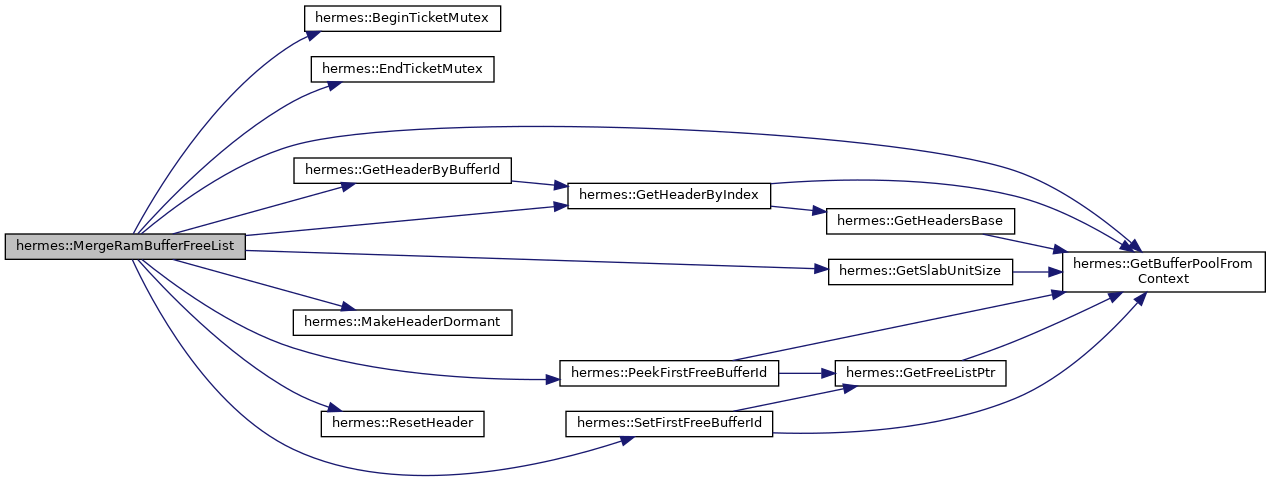

◆ SplitRamBufferFreeList()
| void hermes::SplitRamBufferFreeList | ( | SharedMemoryContext * | context, |
| int | slab_index | ||
| ) |
Split RAM buffer free list.
- Todo:
- (chogan) Needs more testing for the case when the free list has been jumbled for a while. Currently we just test a nice linear free list.
TODO(chogan):
- Parameters
-
context The shared memory context for accessing the BufferPool. slab_index The 0-based index of the slab to split.
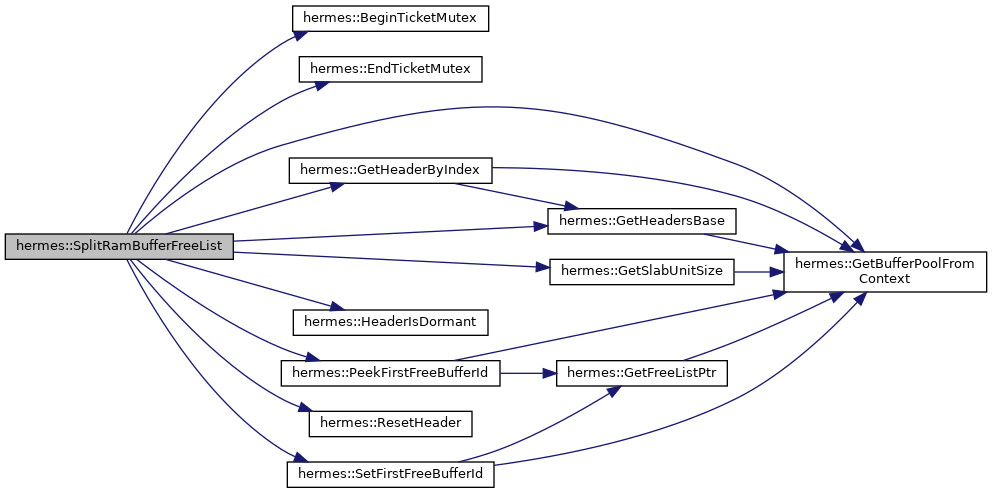

◆ InitBufferPool()
| ptrdiff_t hermes::InitBufferPool | ( | u8 * | hermes_memory, |
| Arena * | buffer_pool_arena, | ||
| Arena * | scratch_arena, | ||
| i32 | node_id, | ||
| Config * | config | ||
| ) |
Initializes a BufferPool inside an existing shared memory segment.
Divides the shared memory segment pointed to by hermes_memory into 1) An array of RAM buffers. 2) An array of BufferHeaders. 3) An array of Devices. 4) The BufferPool struct, which contains pointers (really offsets) to the data above.
The sizes of each of these sections is controlled by the config parameter. Each BufferHeader is initialized to point to a specfic offset. In the case of a RAM buffer, this offset is from the beginning of the shared memory. In the case of a file buffer, the offset is from the beginning of a file. Free lists for each slab in each Device are also constructed.
- Parameters
-
hermes_memory The base pointer to a shared memory segment. buffer_pool_arena An Arena backed by the shared memory segment pointed to by hermes_shared_memory. scratch_arena An arena for temporary allocations that are destroyed when this function exits. node_id The identifier of the node this function is running on. config Configuration that specifies how the BufferPool is constructed.
- Returns
- The offset of the beginning of the BufferPool from the beginning of shared memory.
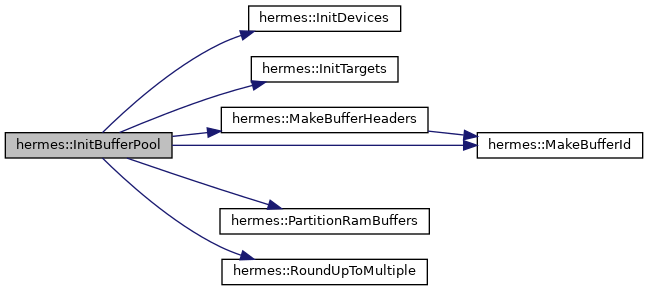

◆ SerializeBufferPoolToFile()
| void hermes::SerializeBufferPoolToFile | ( | SharedMemoryContext * | context, |
| FILE * | file | ||
| ) |
Write buffer pool to file file.

◆ MakeFullShmemName()
| void hermes::MakeFullShmemName | ( | char * | dest, |
| const char * | base | ||
| ) |
Constructs a unique (among users) shared memory name from a base name.
Copies the base name into the dest buffer and appends the value of the USER envioronment variable. The dest buffer should be large enough to hold the base name and the value of USER.
- Parameters
-
[out] dest A buffer for the full shared memory name. [in] base The base shared memory name.

◆ FopenOrTerminate()
| FILE* hermes::FopenOrTerminate | ( | const char * | fname, |
| const char * | mode | ||
| ) |
Terminate if fopen() call fails. Otherwise, return file pointer.
◆ OpenOrTerminate()
| int hermes::OpenOrTerminate | ( | const std::string & | fname, |
| int | flags, | ||
| mode_t | mode = 0 |
||
| ) |
Terminate if open() call fails. Otherwise, return file pointer.

◆ InitFilesForBuffering()
| void hermes::InitFilesForBuffering | ( | SharedMemoryContext * | context, |
| CommunicationContext & | comm | ||
| ) |
- Todo:
- Creates and opens all files that will be used for buffering. Stores open FILE pointers in the
context. The file buffering paradaigm uses one file per slab for each Device. Ifposix_fallocateis available, andmake_spaceistrue, each file's capacity is reserved. Otherwise, the files will be initialized with 0 size.
- Parameters
-
context The SharedMemoryContext in which to store the opened FILE pointers. comm context for communication
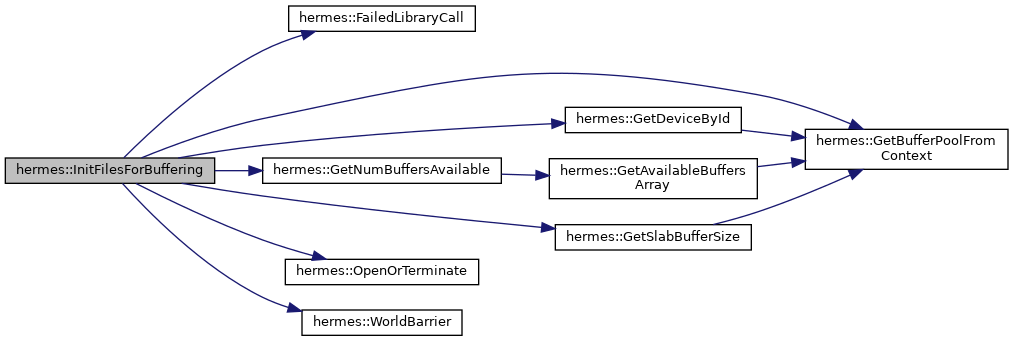

◆ InitSharedMemory()
| u8 * hermes::InitSharedMemory | ( | const char * | shmem_name, |
| size_t | total_size | ||
| ) |
Initialize shared memory.


◆ GetSharedMemoryContext()
| SharedMemoryContext hermes::GetSharedMemoryContext | ( | char * | shmem_name | ) |
Retrieves information required for accessing the BufferPool shared memory.
Maps an existing shared memory segment into the calling process's address space. Application cores will call this function, and the Hermes core initialization will have already created the shared memory segment. Application cores can then use the context to access the BufferPool.
- Parameters
-
shmem_name The name of the shared memory segment.
- Returns
- The shared memory context required to access the BufferPool.

◆ UnmapSharedMemory()
| void hermes::UnmapSharedMemory | ( | SharedMemoryContext * | context | ) |
Unmap shared memory.

◆ CloseBufferingFiles()
| void hermes::CloseBufferingFiles | ( | SharedMemoryContext * | context | ) |
Close buffering files.


◆ ReleaseSharedMemoryContext()
| void hermes::ReleaseSharedMemoryContext | ( | SharedMemoryContext * | context | ) |
Unmaps the shared memory represented by context and closes any open file descriptors
This isn't strictly necessary, since the segment will be unmapped when the process exits and the file descriptors will be closed, but is here for completeness.
- Parameters
-
context The shared memory to unmap.


◆ LocalWriteBufferById()
| size_t hermes::LocalWriteBufferById | ( | SharedMemoryContext * | context, |
| BufferID | id, | ||
| const Blob & | blob, | ||
| size_t | offset | ||
| ) |
Write buffer by id buffer locally.


◆ WriteBlobToBuffers()
| void hermes::WriteBlobToBuffers | ( | SharedMemoryContext * | context, |
| RpcContext * | rpc, | ||
| const Blob & | blob, | ||
| const std::vector< BufferID > & | buffer_ids | ||
| ) |
Sketch of how an I/O client might write.
Writes the blob to the collection of buffer_ids. The BufferIDs inform the call whether it is writing locally, remotely, to RAM (or a byte addressable Device) or to a file (block addressable Device).
- Parameters
-
context The shared memory context needed to access BufferPool info rpc The Hermes instance's RPC context blob The data to write buffer_ids The collection of BufferIDs that should buffer the blob


◆ LocalReadBufferById()
| size_t hermes::LocalReadBufferById | ( | SharedMemoryContext * | context, |
| BufferID | id, | ||
| Blob * | blob, | ||
| size_t | read_offset | ||
| ) |
Read buffer by id buffer locally.


◆ ReadBlobFromBuffers()
| size_t hermes::ReadBlobFromBuffers | ( | SharedMemoryContext * | context, |
| RpcContext * | rpc, | ||
| Blob * | blob, | ||
| BufferIdArray * | buffer_ids, | ||
| u32 * | buffer_sizes | ||
| ) |
Sketch of how an I/O client might read.
Reads the collection of buffer_ids into blob. The BufferIDs inform the call whether it is reading locally, remotely, from RAM (or a byte addressable Device) or to a file (block addressable Device).
- Parameters
-
context The shared memory context needed to access BufferPool info. rpc The RPC context needed to make a remote call if necessary. blob A place to store the read data. buffer_ids The collection of BufferIDs that hold the buffered blob. buffer_sizes A list of sizes that correspond to each buffer in buffer_ids. Its length is the length ofbuffer_ids
- Returns
- The total number of bytes read
< KB


◆ ReadBlobById() [1/2]
| size_t hermes::ReadBlobById | ( | SharedMemoryContext * | context, |
| RpcContext * | rpc, | ||
| Arena * | arena, | ||
| Blob | blob, | ||
| BlobID | blob_id | ||
| ) |
Read blob_id BLOB.
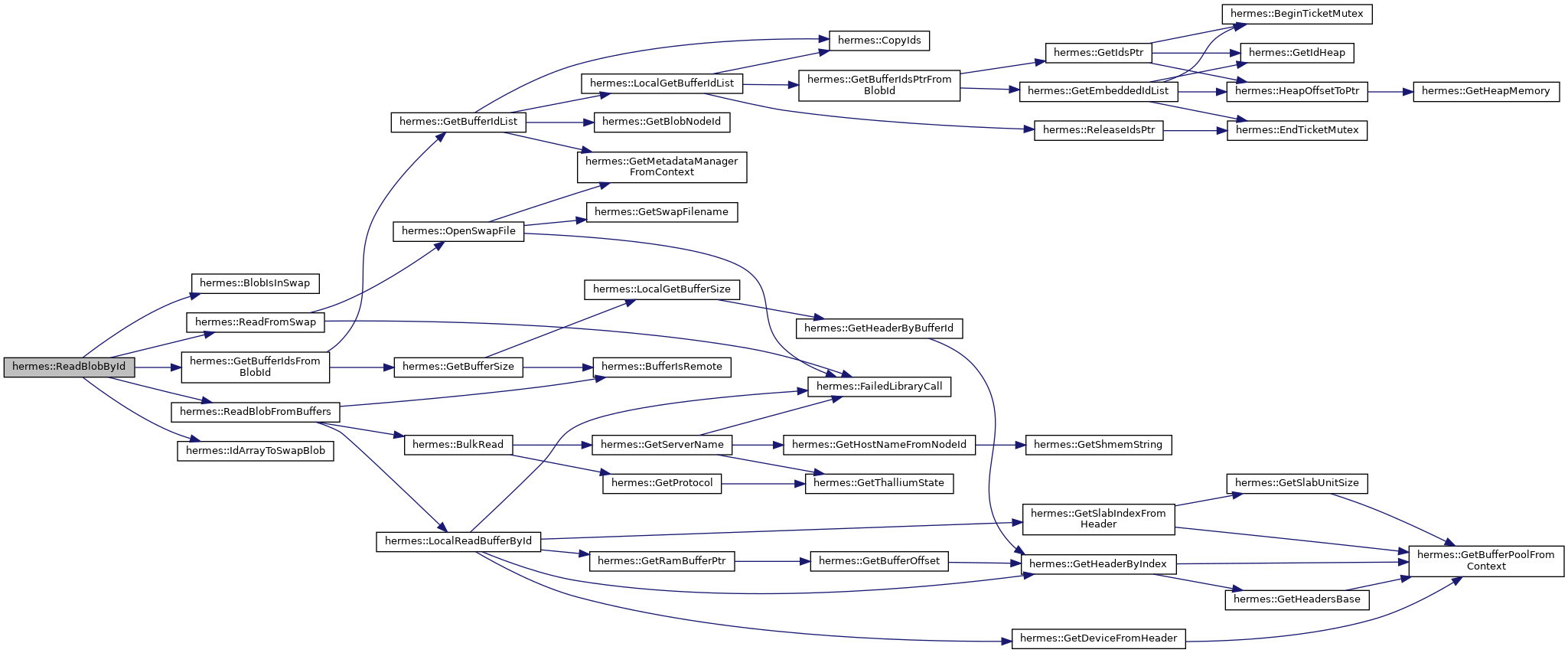

◆ ReadBlobById() [2/2]
| size_t hermes::ReadBlobById | ( | SharedMemoryContext * | context, |
| RpcContext * | rpc, | ||
| Arena * | arena, | ||
| api::Blob & | dest, | ||
| BlobID | blob_id | ||
| ) |
Read a remote blob_id BLOB.
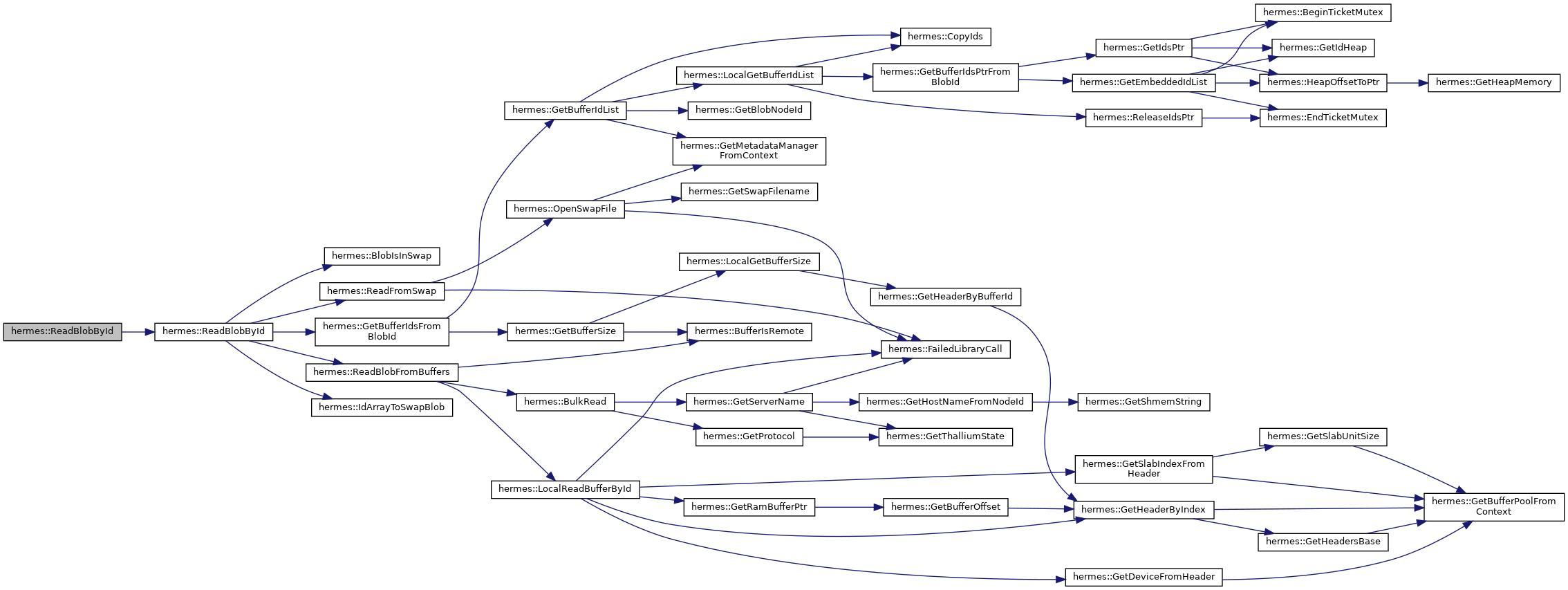
◆ OpenSwapFile()
| void hermes::OpenSwapFile | ( | SharedMemoryContext * | context, |
| u32 | node_id | ||
| ) |
Open swap file.
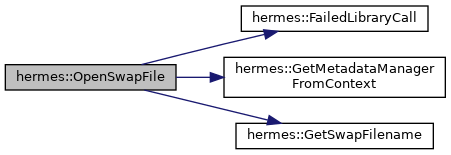

◆ WriteToSwap() [1/2]
| SwapBlob hermes::WriteToSwap | ( | SharedMemoryContext * | context, |
| Blob | blob, | ||
| u32 | node_id, | ||
| BucketID | bucket_id | ||
| ) |
Write blob data to a swap file.


◆ PutToSwap() [1/2]
| SwapBlob hermes::PutToSwap | ( | SharedMemoryContext * | context, |
| RpcContext * | rpc, | ||
| const std::string & | name, | ||
| BucketID | bucket_id, | ||
| const u8 * | data, | ||
| size_t | size | ||
| ) |
Put data to a remote swap.
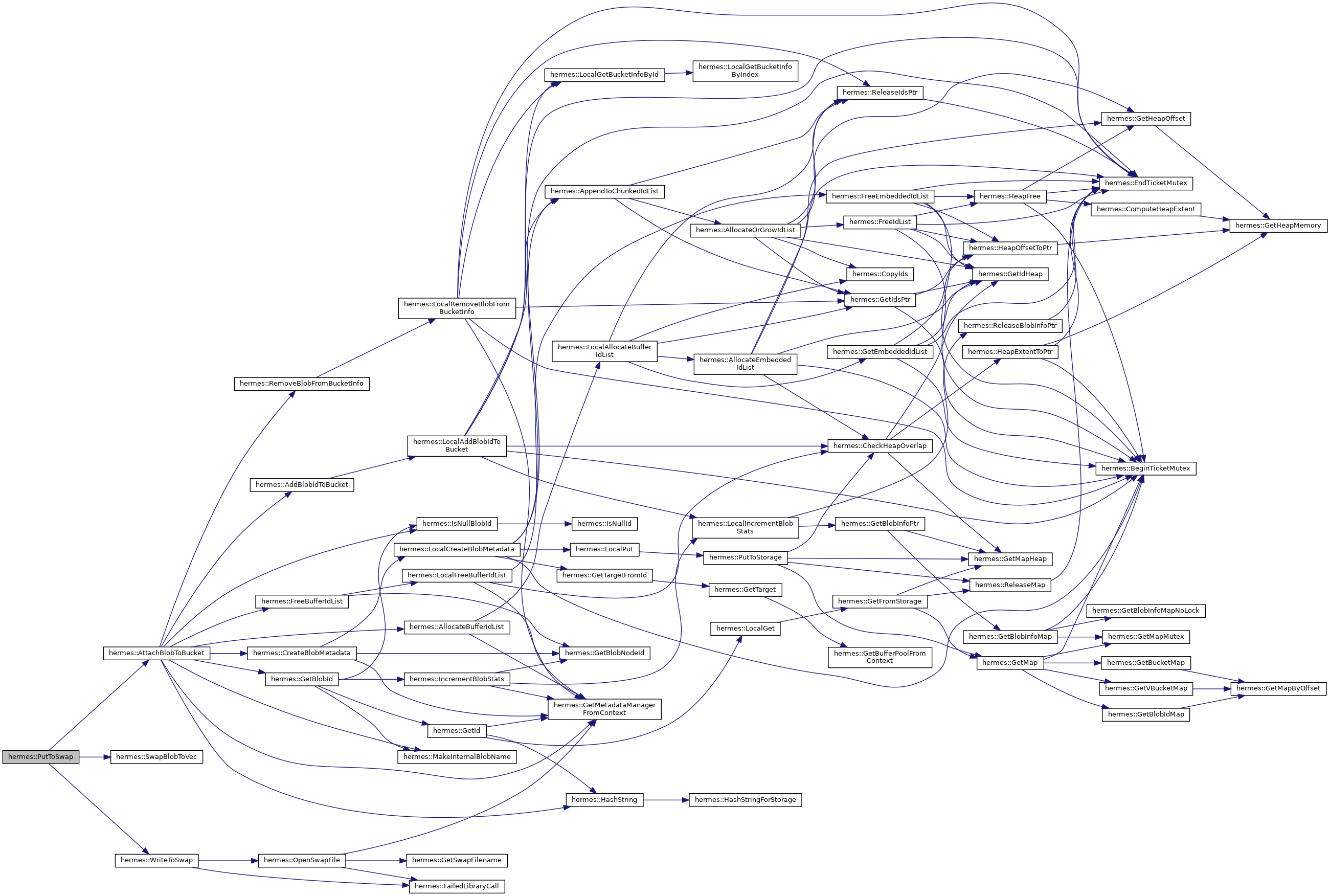

◆ ReadFromSwap()
| size_t hermes::ReadFromSwap | ( | SharedMemoryContext * | context, |
| Blob | blob, | ||
| SwapBlob | swap_blob | ||
| ) |
Read blob data from swap file.


◆ PlaceBlob()
| api::Status hermes::PlaceBlob | ( | SharedMemoryContext * | context, |
| RpcContext * | rpc, | ||
| PlacementSchema & | schema, | ||
| Blob | blob, | ||
| const std::string & | name, | ||
| BucketID | bucket_id, | ||
| const api::Context & | ctx, | ||
| bool | called_from_buffer_organizer | ||
| ) |
Place blob BLOB.
< end timing
< begin timing
< end timing
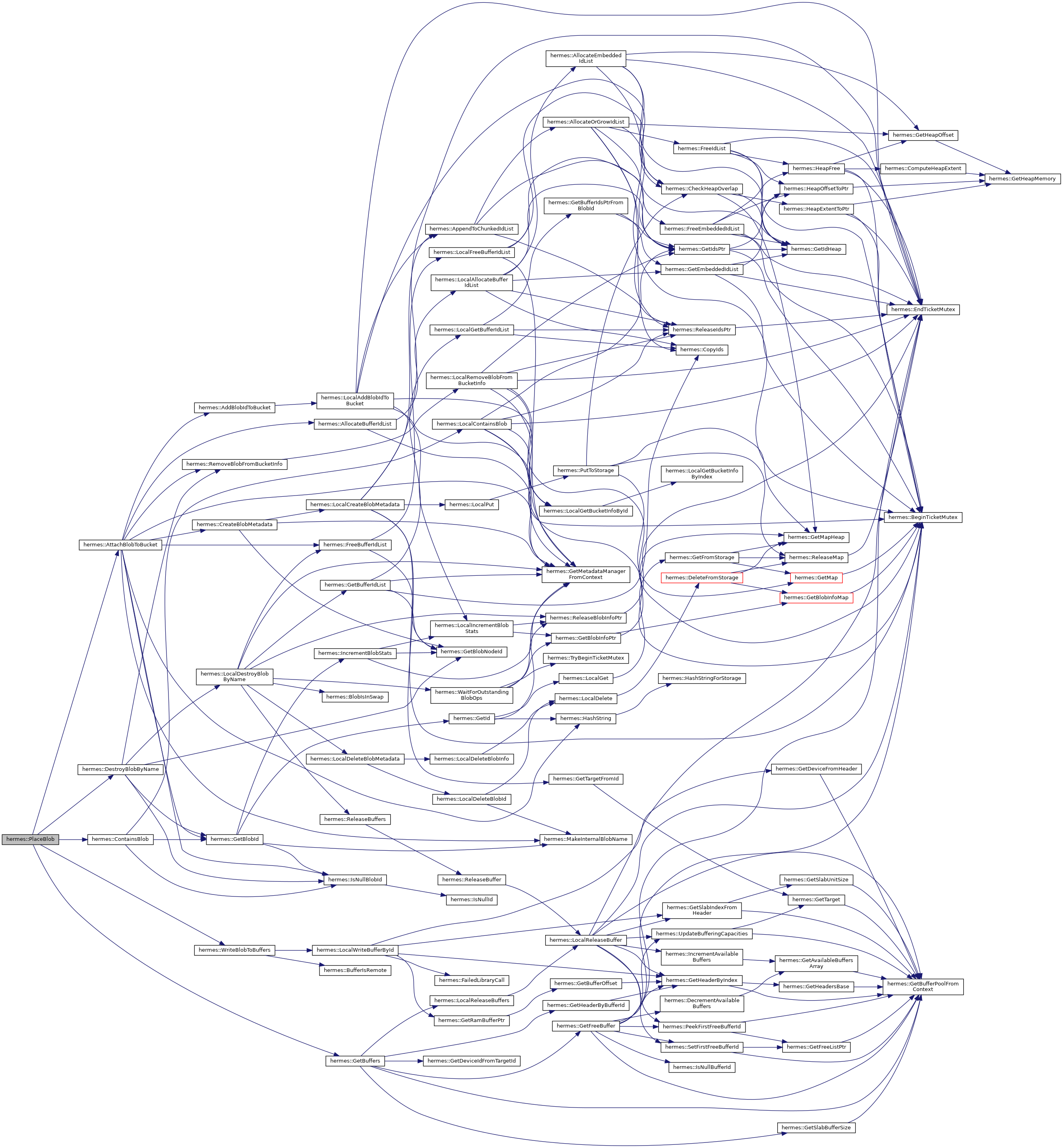

◆ StdIoPersistBucket()
| api::Status hermes::StdIoPersistBucket | ( | SharedMemoryContext * | context, |
| RpcContext * | rpc, | ||
| Arena * | arena, | ||
| BucketID | bucket_id, | ||
| const std::string & | file_name, | ||
| const std::string & | open_mode | ||
| ) |
Persist Bucket using stdio.
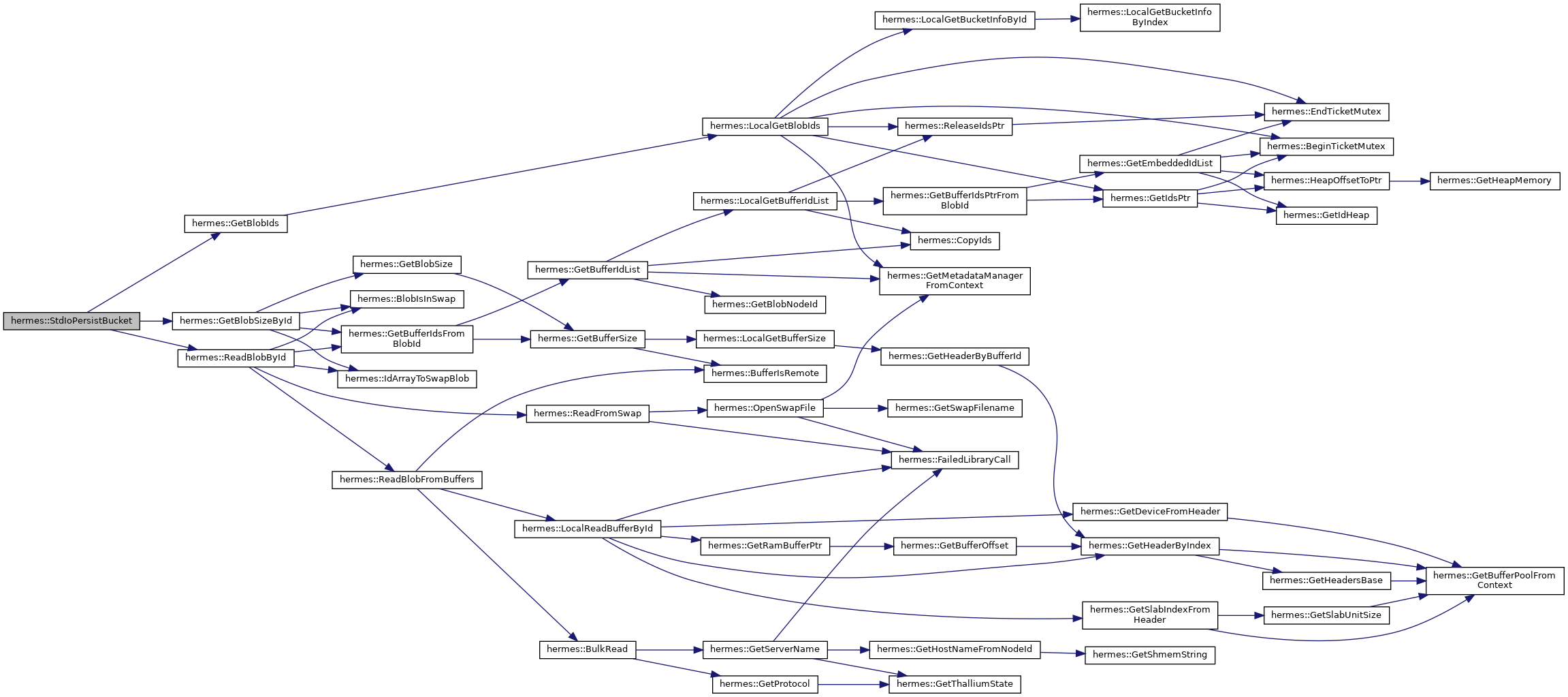

◆ StdIoPersistBlob()
| api::Status hermes::StdIoPersistBlob | ( | SharedMemoryContext * | context, |
| RpcContext * | rpc, | ||
| Arena * | arena, | ||
| BlobID | blob_id, | ||
| int | fd, | ||
| const i32 & | offset | ||
| ) |
Persist BLOB using stdio.
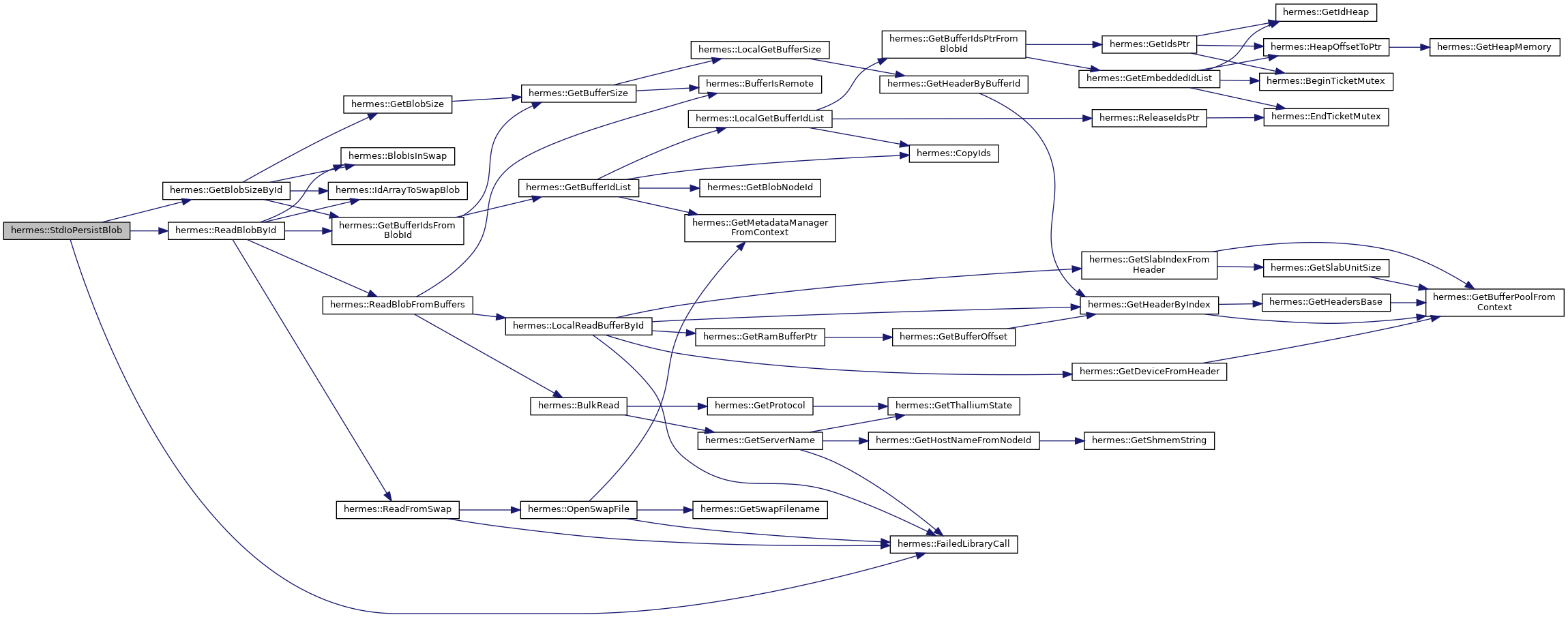

◆ GetBlobImportanceScore()
| f32 hermes::GetBlobImportanceScore | ( | SharedMemoryContext * | context, |
| RpcContext * | rpc, | ||
| BlobID | blob_id | ||
| ) |
Get the importance score of blob_id BLOB.

◆ StartBufferPoolRpcServer()
| void hermes::StartBufferPoolRpcServer | ( | SharedMemoryContext * | context, |
| const char * | addr, | ||
| i32 | num_rpc_threads | ||
| ) |
Starts an RPC server that will listen for remote requests directed to the BufferPool.
- Parameters
-
context The shared memory context where the BufferPool lives addr The address and port where the RPC server will listen This address must be a compatible with whatever the RPC implementation is. num_rpc_threads number of RPC threads
◆ PutToSwap() [2/2]
| std::vector<SwapBlob> hermes::PutToSwap | ( | SharedMemoryContext * | context, |
| RpcContext * | rpc, | ||
| BucketID | id, | ||
| std::vector< std::vector< T >> & | blobs, | ||
| std::vector< std::string > & | names | ||
| ) |
A template function to put BLOBs into swap
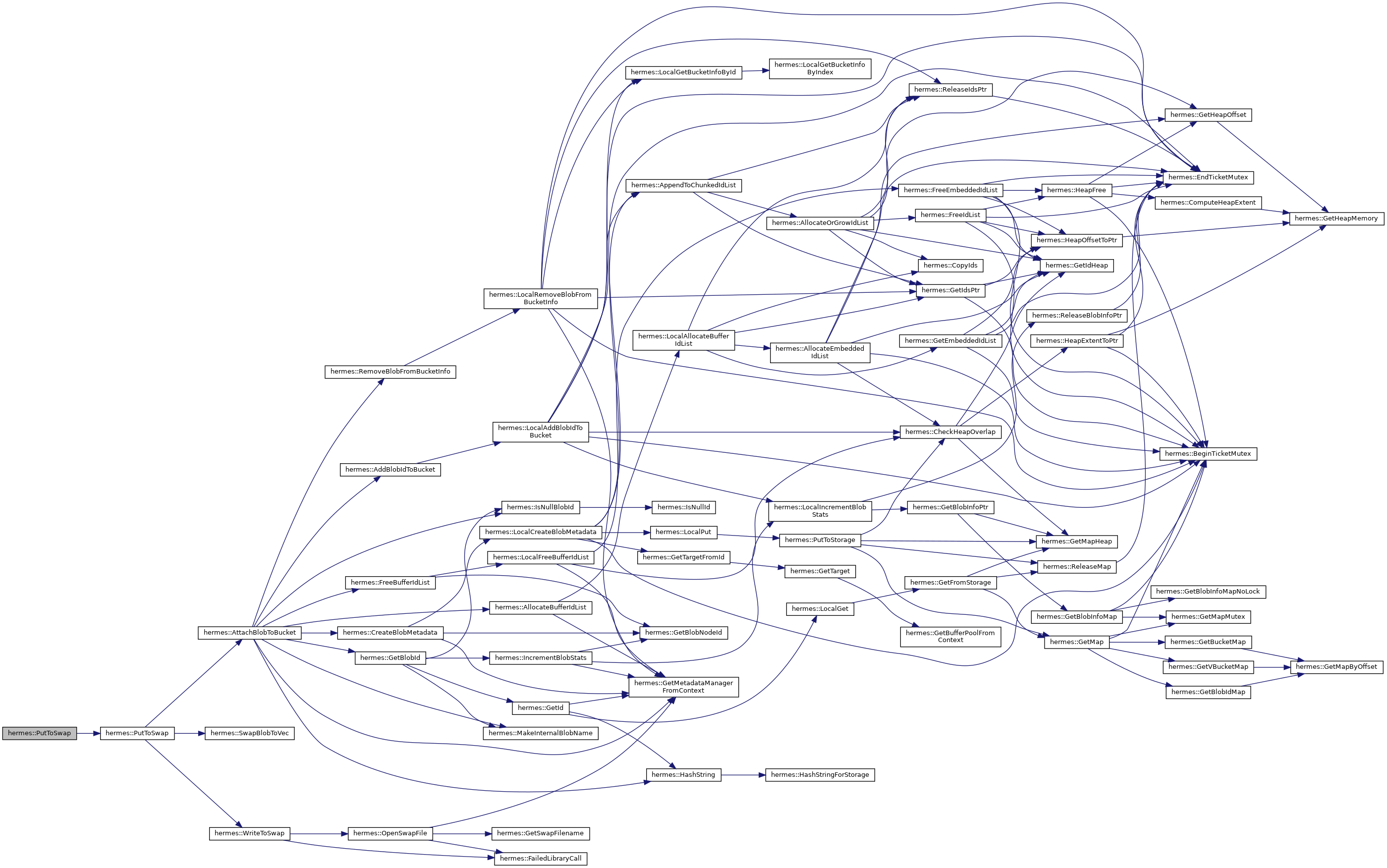
◆ WriteToSwap() [2/2]
| SwapBlob hermes::WriteToSwap | ( | SharedMemoryContext * | context, |
| Blob | blob, | ||
| BlobID | blob_id, | ||
| BucketID | bucket_id | ||
| ) |
write BLOB to swap.
◆ ParseConfig()
parse YAML configuration file
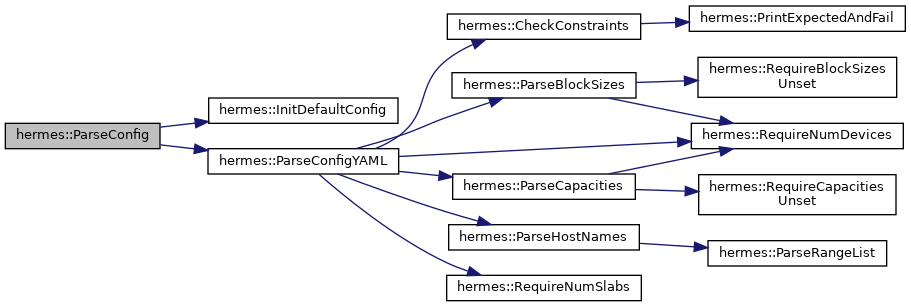

◆ InitCommunication()
| size_t hermes::InitCommunication | ( | CommunicationContext * | comm, |
| Arena * | arena, | ||
| size_t | trans_arena_size_per_node, | ||
| bool | is_daemon, | ||
| bool | is_adapter | ||
| ) |
initialize MPI communication.
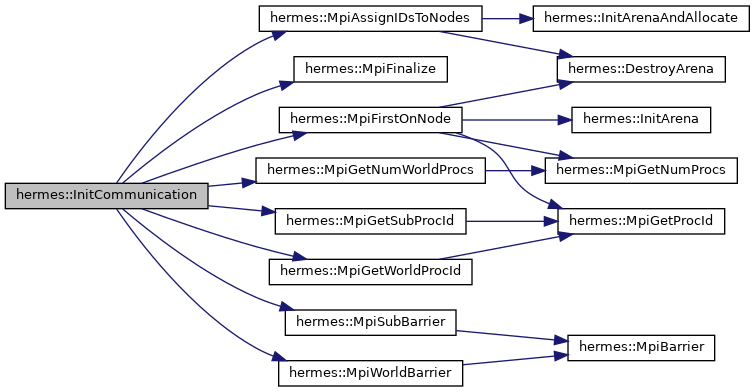

◆ WorldBarrier()
|
inline |
world communicator

◆ SubBarrier()
|
inline |
sub-communicator
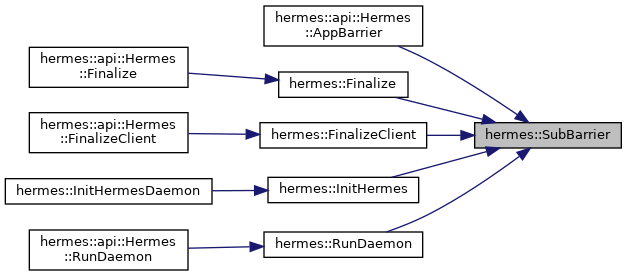
◆ GetAppCommunicator()
| void * hermes::GetAppCommunicator | ( | CommunicationContext * | comm | ) |
get the application's communicator

◆ MpiGetProcId()
|
inline |
get the MPI process ID of comm MPI communicator.

◆ MpiGetWorldProcId()
|
inline |
get the MPI process ID of MPI world communicator from state MPIState.


◆ MpiGetSubProcId()
|
inline |
get the MPI process ID of MPI sub-communicator from state MPIState.


◆ MpiGetNumProcs()
|
inline |
get the number of MPI processes of comm MPI communicator.

◆ MpiGetNumWorldProcs()
|
inline |
get the number of MPI processes of MPI world communicator.


◆ MpiBarrier()
|
inline |
a wrapper for MPI_Barrier() fucntion

◆ MpiWorldBarrier()
|
inline |
a wrapper for MPI global communicator's MPI_Barrier() function


◆ MpiSubBarrier()
|
inline |
a wrapper for MPI sub-communicator's MPI_Barrier() function


◆ MpiFirstOnNode()
| bool hermes::MpiFirstOnNode | ( | MPI_Comm | comm | ) |
Returns true if the calling rank is the lowest numbered rank on its node in communicator comm.
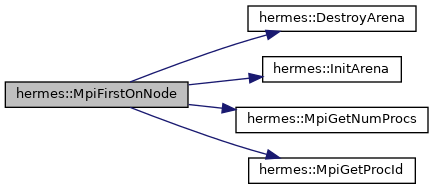

◆ MpiAssignIDsToNodes()
| size_t hermes::MpiAssignIDsToNodes | ( | CommunicationContext * | comm, |
| size_t | trans_arena_size_per_node | ||
| ) |
Assigns each node an ID and returns the size in bytes of the transient arena for the calling rank.


◆ MpiFinalize()
| void hermes::MpiFinalize | ( | void * | state | ) |
a wrapper for MPI_Finalize() function

◆ PrintExpectedAndFail()
| void hermes::PrintExpectedAndFail | ( | const std::string & | expected, |
| u32 | line_number = 0 |
||
| ) |
print expected value and fail when an error occurs

◆ RequireNumDevices()
| void hermes::RequireNumDevices | ( | Config * | config | ) |
log an error message when the number of devices is < 1 in config

◆ RequireNumSlabs()
| void hermes::RequireNumSlabs | ( | Config * | config | ) |
log an error message when the number of any slab is < 1 in config

◆ RequireCapacitiesUnset()
| void hermes::RequireCapacitiesUnset | ( | bool & | already_specified | ) |
log an error message when capacities are specified multiple times

◆ RequireBlockSizesUnset()
| void hermes::RequireBlockSizesUnset | ( | bool & | already_specified | ) |
log an error message when block sizes are specified multiple times

◆ ParseCapacities()
| void hermes::ParseCapacities | ( | Config * | config, |
| YAML::Node | capacities, | ||
| int | unit_conversion, | ||
| bool & | already_specified | ||
| ) |
parse capacities from configuration file in YAML


◆ ParseBlockSizes()
| void hermes::ParseBlockSizes | ( | Config * | config, |
| YAML::Node | block_sizes, | ||
| int | unit_conversion, | ||
| bool & | already_specified | ||
| ) |
parse block sizes from configuration file in YAML


◆ ParseArray()
| void hermes::ParseArray | ( | YAML::Node | list_node, |
| const std::string | var, | ||
| T * | list, | ||
| int | max_list_len | ||
| ) |
parse var array from configuration file in YAML
◆ ParseVector()
| void hermes::ParseVector | ( | YAML::Node | list_node, |
| std::vector< T > & | list | ||
| ) |
parse list_node vector from configuration file in YAML
◆ ParseMatrix() [1/2]
| void hermes::ParseMatrix | ( | YAML::Node | matrix_node, |
| const std::string | var, | ||
| T * | matrix, | ||
| int | max_row_len, | ||
| int | max_col_len, | ||
| int * | col_len | ||
| ) |
parse matrix_node matrix using col_len column length
◆ ParseMatrix() [2/2]
| void hermes::ParseMatrix | ( | YAML::Node | matrix_node, |
| std::string | var, | ||
| T * | matrix, | ||
| int | max_row_len, | ||
| int | max_col_len | ||
| ) |
parse matrix_node matrix from configuration file in YAML
◆ ParseRangeList()
| void hermes::ParseRangeList | ( | YAML::Node | list_node, |
| std::string | var, | ||
| std::vector< std::string > & | list | ||
| ) |
parse range list from configuration file in YAML

◆ ParseHostNames()
| void hermes::ParseHostNames | ( | YAML::Node | yaml_conf, |
| hermes::Config * | config | ||
| ) |
parse host names from configuration file in YAML


◆ CheckConstraints()
| void hermes::CheckConstraints | ( | Config * | config | ) |
check constraints in config configuration


◆ ParseConfigYAML()
| void hermes::ParseConfigYAML | ( | YAML::Node & | yaml_conf, |
| Config * | config | ||
| ) |
< KB
< MB
< GB
< KB
< MB
< GB
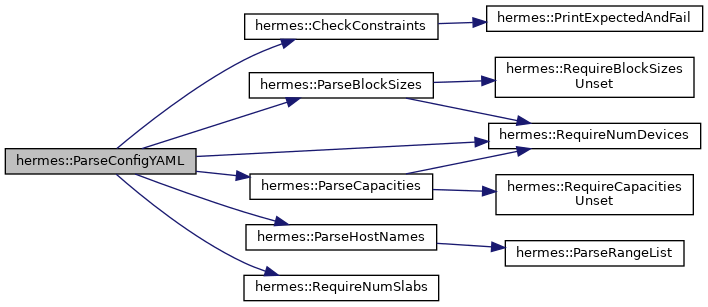

◆ ParseConfigString()
| void hermes::ParseConfigString | ( | Arena * | arena, |
| const std::string & | config_string, | ||
| Config * | config | ||
| ) |
parse configuration string

◆ InitConfig()
| void hermes::InitConfig | ( | hermes::Config * | config, |
| const char * | config_file | ||
| ) |
< KB

◆ CreateConfig()
| hermes::Config* hermes::CreateConfig | ( | const char * | config_file | ) |
create configuration file
◆ AggregateBlobSchema()
| PlacementSchema hermes::AggregateBlobSchema | ( | PlacementSchema & | schema | ) |
aggregate BLOB schema

◆ CalculatePlacement()
| Status hermes::CalculatePlacement | ( | SharedMemoryContext * | context, |
| RpcContext * | rpc, | ||
| const std::vector< size_t > & | blob_sizes, | ||
| std::vector< PlacementSchema > & | output, | ||
| const api::Context & | api_context | ||
| ) |
calculate data placement


◆ IsPowerOfTwo()
| bool hermes::IsPowerOfTwo | ( | size_t | val | ) |
Check if val number is a power of 2 or not. Use a bitwise operator instead of log_2(n) math function.

◆ AlignForward()
| uintptr_t hermes::AlignForward | ( | uintptr_t | addr, |
| size_t | alignment | ||
| ) |
align addr forward by alignment.


◆ AlignBackward()
| uintptr_t hermes::AlignBackward | ( | uintptr_t | addr, |
| size_t | alignment | ||
| ) |
align addr backward by alignment.

◆ InitArena()
initialize arena Arena with bytes capacity and base address
Initializes an Arena with a starting size and base pointer. The base parameter must point to a contiguous region of allocated memory of at least bytes bytes.
- Parameters
-
[in,out] arena The Arena to initialize. [in] bytes The desired size in bytes of the Arena's backing memory. [in] base A pointer to the beginning of the Arena's backing memory.

◆ InitArenaAndAllocate()
| Arena hermes::InitArenaAndAllocate | ( | size_t | bytes | ) |
initialize arena by allocating bytes memory
Initializes an Arena with a starting size. This function uses malloc to allocate a contiguous region of length bytes for the arena.
- Parameters
-
[in] bytes The desired size in bytes to allocate.
- Returns
- An arena with capacity
bytes.

◆ DestroyArena()
| void hermes::DestroyArena | ( | Arena * | arena | ) |
free arena Arena memory and reset its members to 0.
Frees the memory backing the Arena, and zeros out all its fields.
Only Arenas whose backing memory was created by malloc should be destroyed with this function. Arenas using shared memory as the backing store should not be destroyed. The backing memory is reclaimed when the shared memory is unlinked.
- Parameters
-
[in,out] arena The Arena to destroy.

◆ GetRemainingCapacity()
| size_t hermes::GetRemainingCapacity | ( | Arena * | arena | ) |
◆ GrowArena()
| void hermes::GrowArena | ( | Arena * | arena, |
| size_t | new_size | ||
| ) |
The maximum capacity of arena becomes new_size.
Expands the backing memory for an arena to be new_size bytes.
Becuase this function uses realloc, it will only work for Arenas whose backing store was created with malloc. It cannot be used with Arenas whose backing store is shared memory (e.g., the BufferPool arena).
- Parameters
-
arena The arena to expand. new_size The new (larger) size that the Arena should occupy.

◆ BeginTemporaryMemory()
| TemporaryMemory hermes::BeginTemporaryMemory | ( | Arena * | arena | ) |
return a temporary memory that points to arena Arena
◆ EndTemporaryMemory()
| void hermes::EndTemporaryMemory | ( | TemporaryMemory * | temp_memory | ) |
copy temp_memory usage information back to its arena.
◆ PushSize()
Returns a pointer to a raw region of size bytes.
This is the lower level Arena allocation function. The higher level PushStruct and PushArray should be used by clients.
- Parameters
-
[in,out] arena The Arena to allocate from. [in] size The requested memory size in bytes. [in] alignment Align the result to a desired multiple.
- Returns
- A pointer to the beginning of a contiguous region of
sizebytes.


◆ PushSizeAndClear()
Returns a pointer to a raw region of bytes that are cleared to zero.
Like PushSize, but clears the requested region to zero.
- Parameters
-
[in,out] arena The Arena to allocate from. [in] size The requested memory size in bytes. [in] alignment Align the result to a desired multiple.
- Returns
- A pointer to the beginning of a contiguous region of
sizezeros.


◆ GetHeapMemory()
get heap memory address
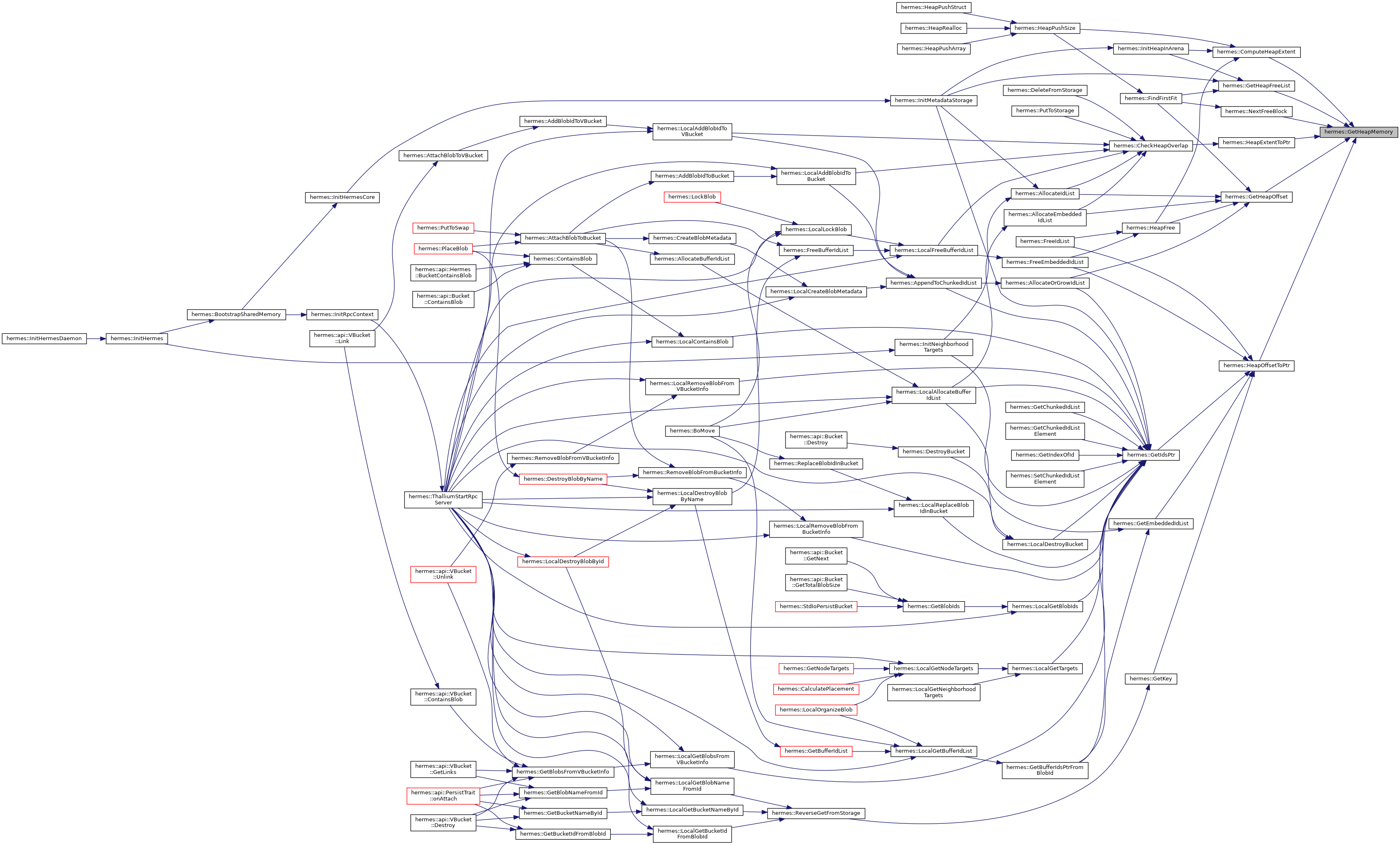
◆ GetHeapFreeList()
get heap free block pointer


◆ NextFreeBlock()
get heap's next free block from block.


◆ HeapOffsetToPtr()
get pointer to heap's memory from offset.

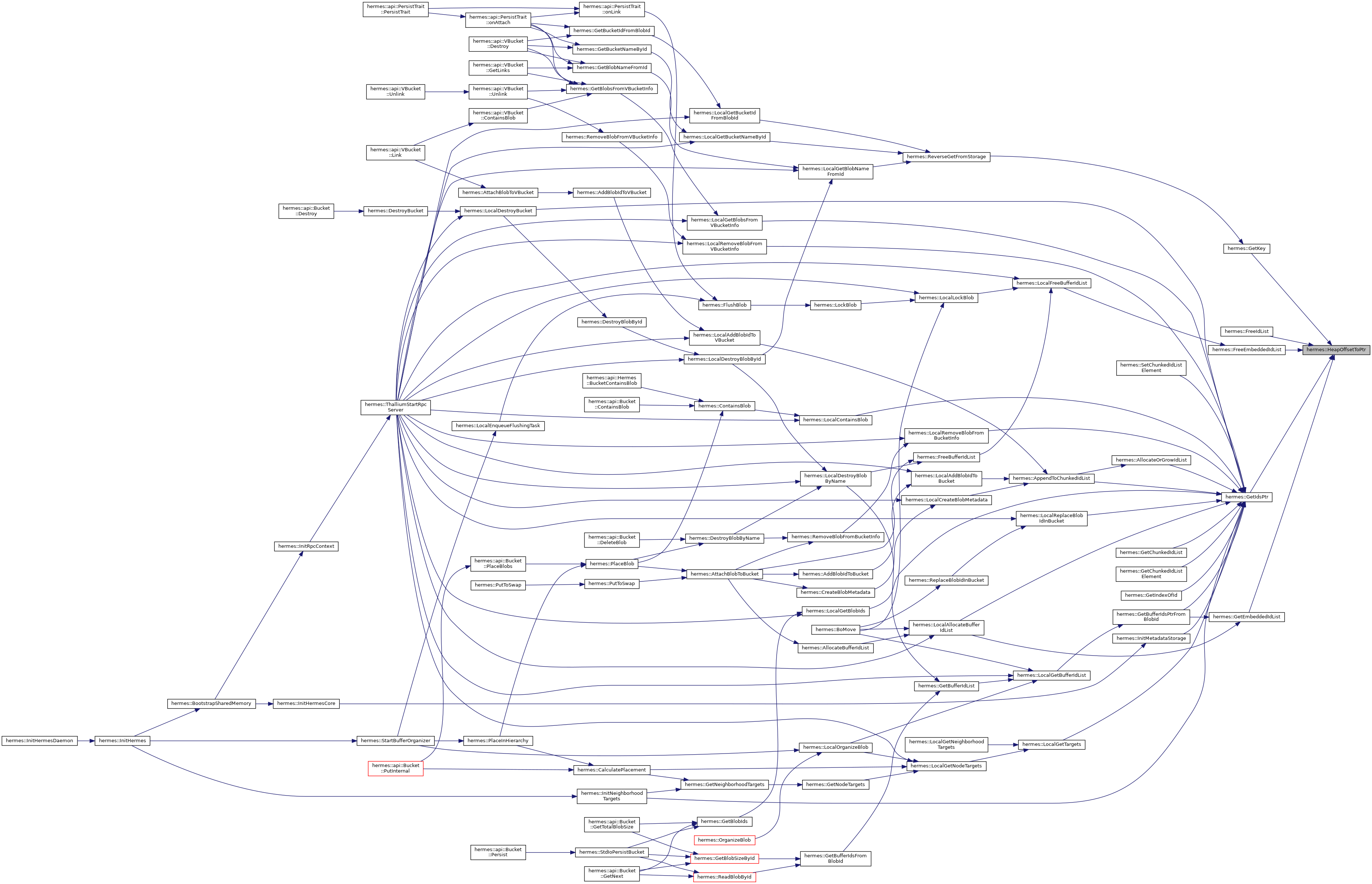
◆ GetHeapOffset()
get pointer to heap's memory from offset.


◆ HeapErrorHandler()
| void hermes::HeapErrorHandler | ( | ) |
print a fatal out-of-memory error message.

◆ ComputeHeapExtent()
compute heap's extent


◆ HeapExtentToPtr()
return a pointer to heap's extent


◆ InitHeapInArena()
initialize heap in arena with 4G capacity.


◆ FindFirstFit()
get the pointer to first free block from heap that has desired_size.


◆ HeapPushSize()
push size to heap

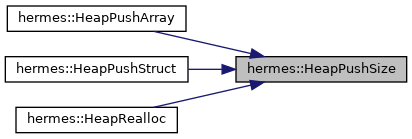
◆ HeapFree()
| void hermes::HeapFree | ( | Heap * | heap, |
| void * | ptr | ||
| ) |
free heap


◆ HeapRealloc()
| void * hermes::HeapRealloc | ( | Heap * | heap, |
| void * | ptr, | ||
| size_t | size | ||
| ) |
reallocate heap

◆ CoalesceFreeBlocks()
| void hermes::CoalesceFreeBlocks | ( | Heap * | heap | ) |
coalesce free blocks from heap
◆ TryBeginTicketMutex()
| Ticket hermes::TryBeginTicketMutex | ( | TicketMutex * | mutex, |
| Ticket * | existing_ticket | ||
| ) |
acquire ticket from existing_ticket or new one from mutex

◆ BeginTicketMutex()
| void hermes::BeginTicketMutex | ( | TicketMutex * | mutex | ) |
begin ticket mutex
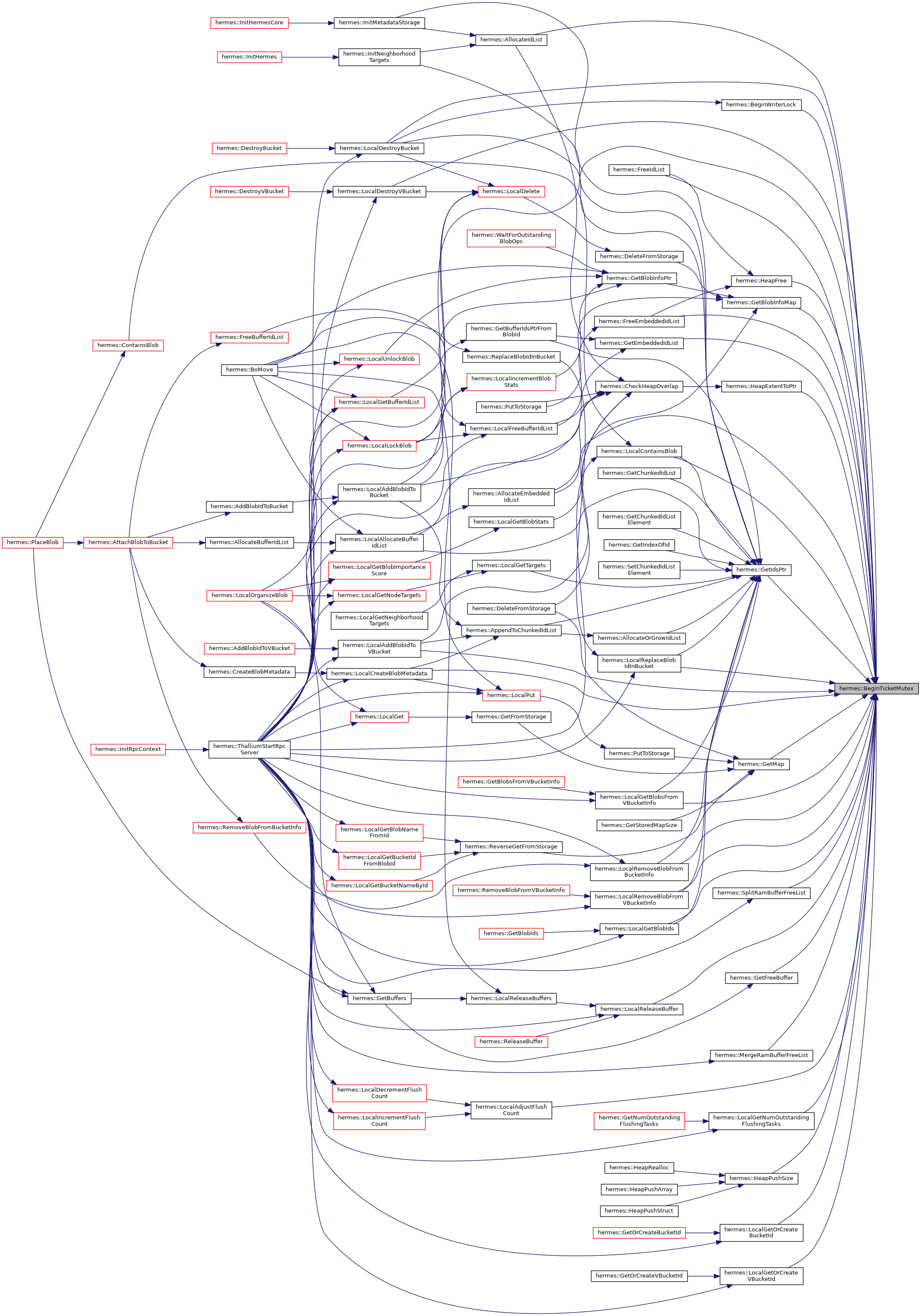
◆ EndTicketMutex()
| void hermes::EndTicketMutex | ( | TicketMutex * | mutex | ) |
end ticket mutex
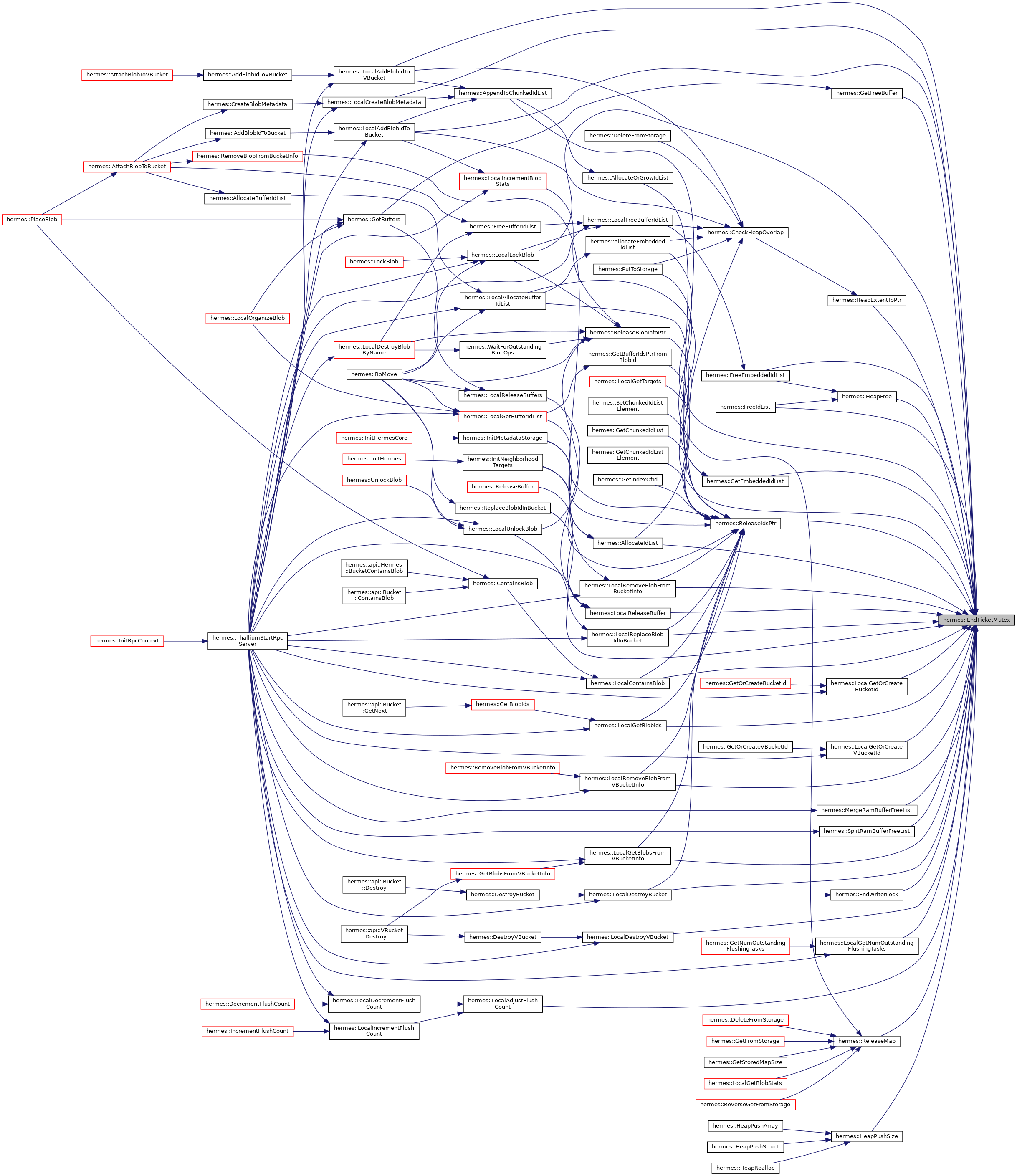
◆ BeginReaderLock()
| bool hermes::BeginReaderLock | ( | RwLock * | lock | ) |
begin reader lock by incrementing lock's readers.

◆ EndReaderLock()
| void hermes::EndReaderLock | ( | RwLock * | lock | ) |
end reader lock

◆ BeginWriterLock()
| void hermes::BeginWriterLock | ( | RwLock * | lock | ) |
begin writer lock


◆ EndWriterLock()
| void hermes::EndWriterLock | ( | RwLock * | lock | ) |
end writer lock


◆ PushStruct()
|
inline |
Reserves space for and returns a pointer to a T instance.
Note that the T instance will be uninitialized. The caller is responsible for any initialization.
- Parameters
-
[in,out] arena The backing Arena from which to reserve space. [in] alignment Align the result to a desired multiple.
- Returns
- A pointer to an uninitialized
Tinstance.

◆ PushClearedStruct()
|
inline |
Reserves space for, clears to zero, and returns a pointer to a T instance.
Like PushStruct, but all the object's members are initialized to zero. Note: assumes 0/NULL is a valid value for all the object's members.
- Parameters
-
[in,out] arena The backing Arena from which to reserve space. [in] alignment Align the result to a desired multiple.
- Returns
- A pointer to a
Tinstance with all members initialized to zero.

◆ PushArray()
|
inline |
Reserves space for count T objects and returns a pointer to the first one.
The objects will be uninitialized.
- Parameters
-
[in,out] arena The backing Arena from which to reserve space. [in] count The number of objects to allocate. [in] alignment Align the result to a desired multiple.
- Returns
- A pointer to the first
Tinstance in the uninitialized array.

◆ PushClearedArray()
|
inline |
Reserves space for count T objects, clears them to zero, and returns a pointer to the first one.
- Parameters
-
[in,out] arena The backing Arena from which to reserve space. [in] count The number of objects to allocate. [in] alignment Align the result to a desired multiple.
- Returns
- A pointer to the first
Tinstance in the array.

◆ HeapPushStruct()
|
inline |
A template for pushing structure to heap.

◆ HeapPushArray()
A template for pushing array of count size to heap.

◆ operator!=()
"not equal" comparision operator
◆ IsNameTooLong()
|
static |
is name too long for max?

◆ IsBlobNameTooLong()
| bool hermes::IsBlobNameTooLong | ( | const std::string & | name | ) |
is BLOB's name too long for kMaxBlobNameSize?


◆ IsBucketNameTooLong()
| bool hermes::IsBucketNameTooLong | ( | const std::string & | name | ) |
is Bucket's name too long for kMaxBucketNameSize?


◆ IsVBucketNameTooLong()
| bool hermes::IsVBucketNameTooLong | ( | const std::string & | name | ) |
is vBucket's name too long for kMaxVBucketNameSize?

◆ IsNullId()
|
inlinestatic |
is id null?
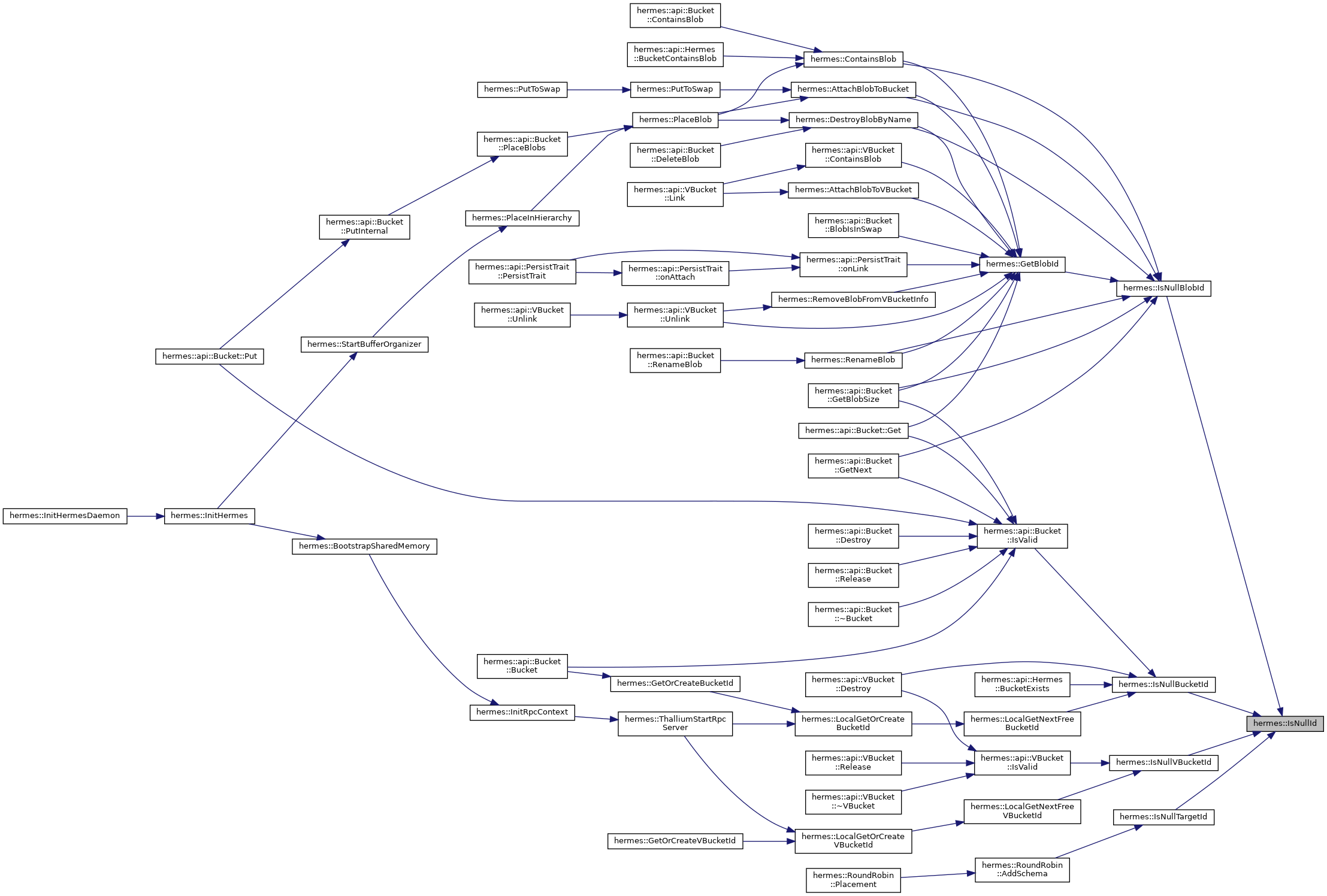
◆ IsNullBucketId()
| bool hermes::IsNullBucketId | ( | BucketID | id | ) |
is Bucket id null?


◆ IsNullVBucketId()
| bool hermes::IsNullVBucketId | ( | VBucketID | id | ) |
is VBucket id null?


◆ IsNullBlobId()
| bool hermes::IsNullBlobId | ( | BlobID | id | ) |
is BLOB id null?

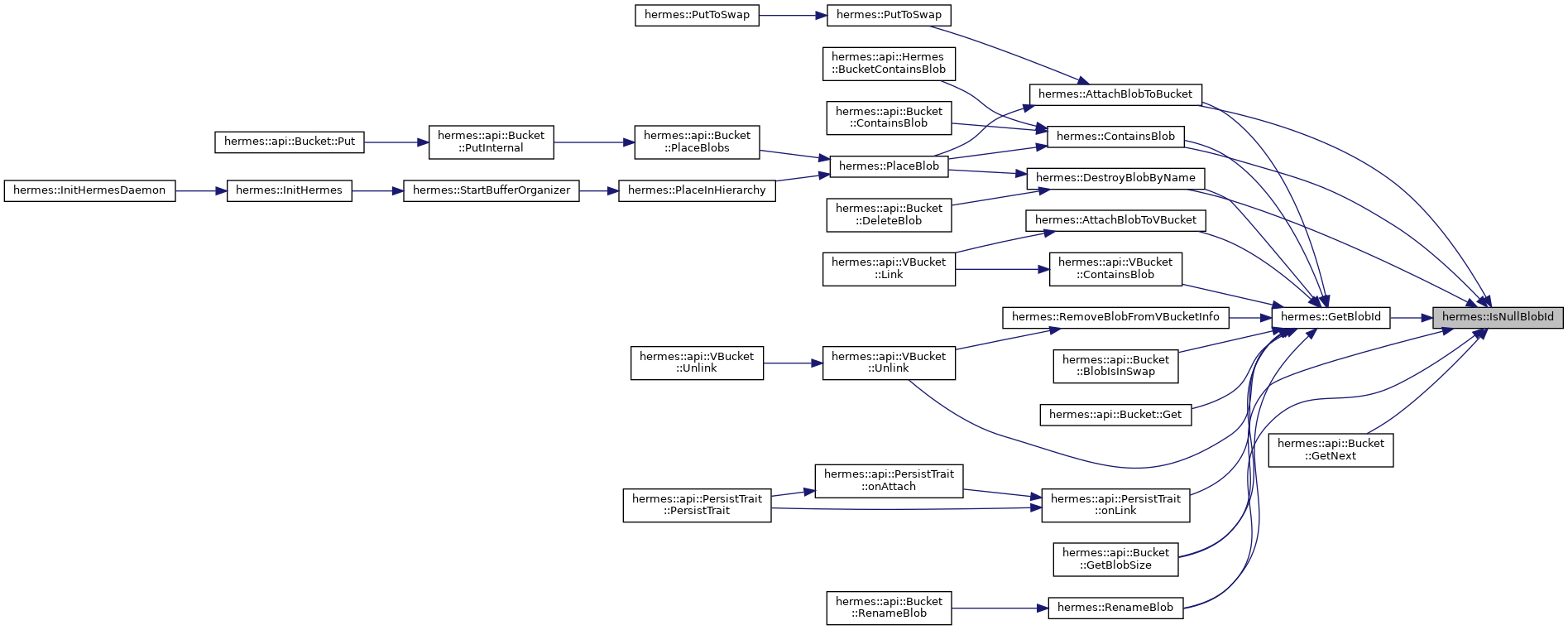
◆ IsNullTargetId()
| bool hermes::IsNullTargetId | ( | TargetID | id | ) |
is Target id null?


◆ GetBlobNodeId()
get the node ID of id BLOB
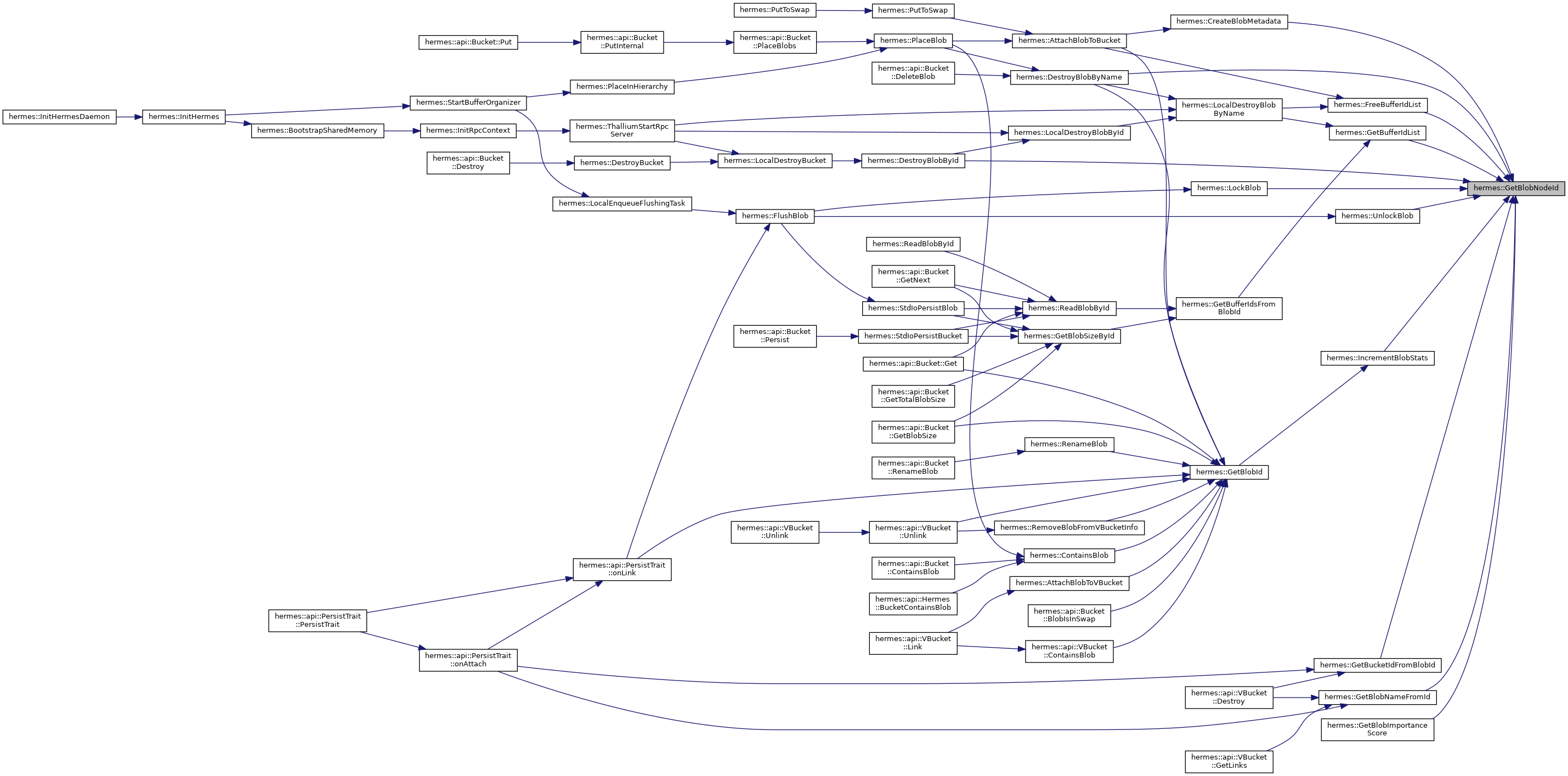
◆ LocalPut() [1/2]
| void hermes::LocalPut | ( | MetadataManager * | mdm, |
| const char * | key, | ||
| u64 | val, | ||
| MapType | map_type | ||
| ) |
put key, value, and map_type locally
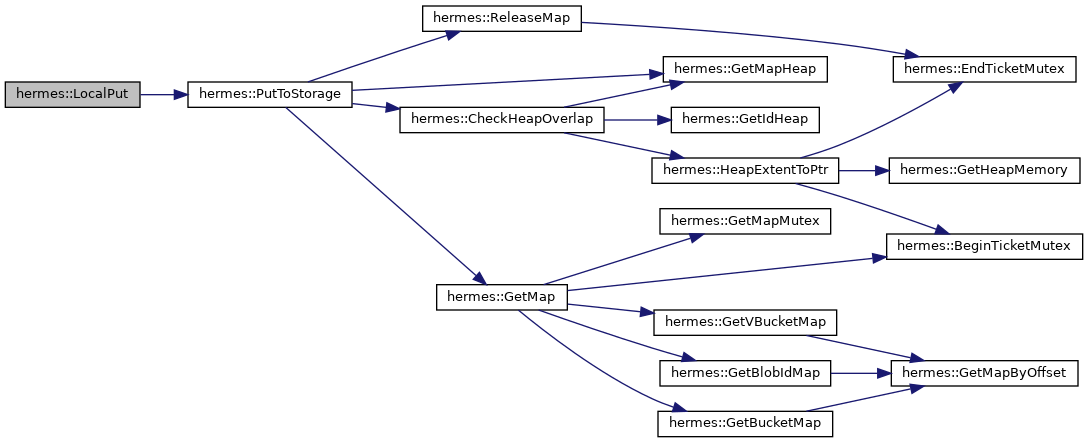

◆ LocalPut() [2/2]
| void hermes::LocalPut | ( | MetadataManager * | mdm, |
| BlobID | key, | ||
| const BlobInfo & | value | ||
| ) |
put key and value locally
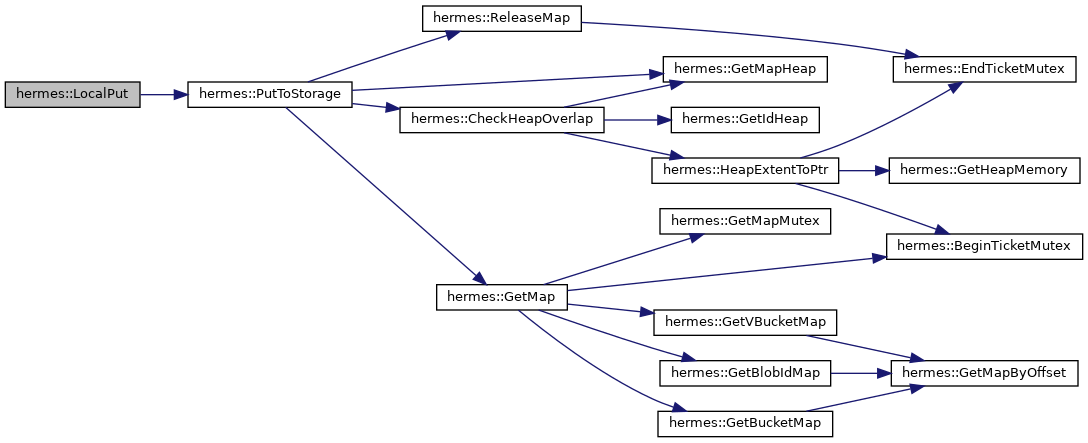
◆ LocalGet()
| u64 hermes::LocalGet | ( | MetadataManager * | mdm, |
| const char * | key, | ||
| MapType | map_type | ||
| ) |
get the value of key and map_type locally

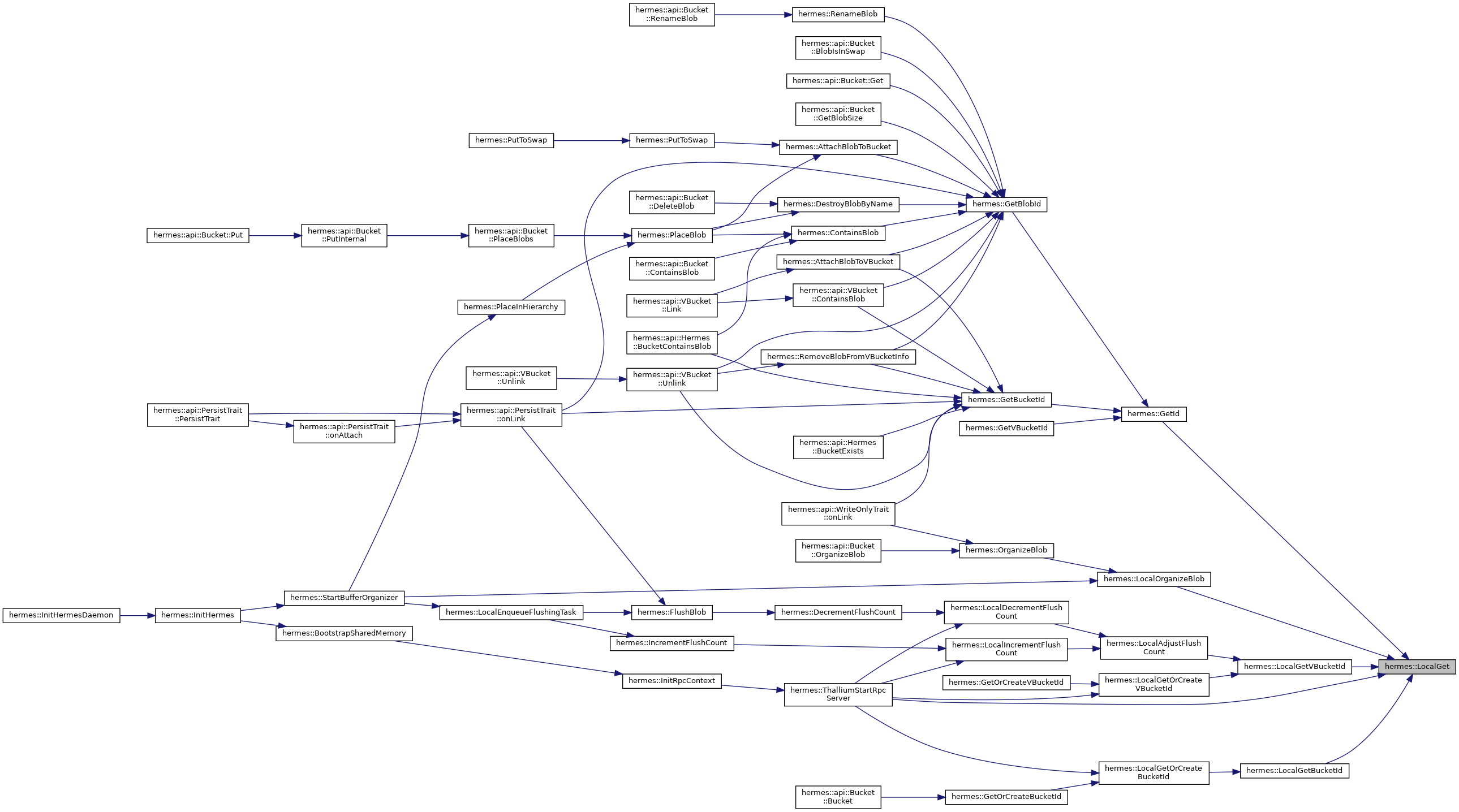
◆ LocalDelete() [1/2]
| void hermes::LocalDelete | ( | MetadataManager * | mdm, |
| BlobID | key | ||
| ) |
delete key locally


◆ LocalDelete() [2/2]
| void hermes::LocalDelete | ( | MetadataManager * | mdm, |
| const char * | key, | ||
| MapType | map_type | ||
| ) |
delete map_type locally

◆ GetMetadataManagerFromContext()
| MetadataManager * hermes::GetMetadataManagerFromContext | ( | SharedMemoryContext * | context | ) |
get metadata manager from context shared memory context
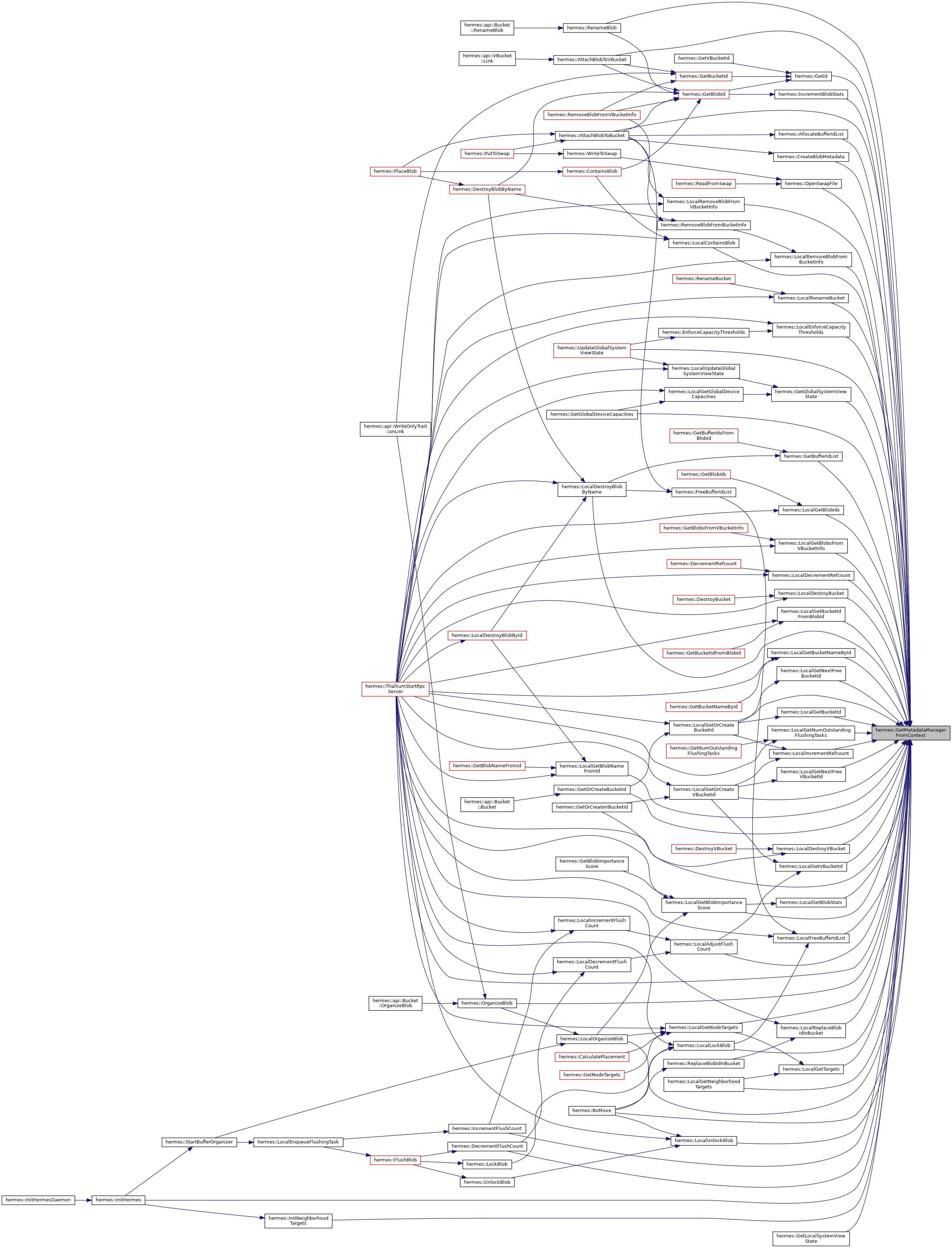
◆ MetadataArenaErrorHandler()
|
static |
log error when metadata arena capacity is full

◆ HashString()
| u32 hermes::HashString | ( | MetadataManager * | mdm, |
| RpcContext * | rpc, | ||
| const char * | str | ||
| ) |
get hash string for metadata storage

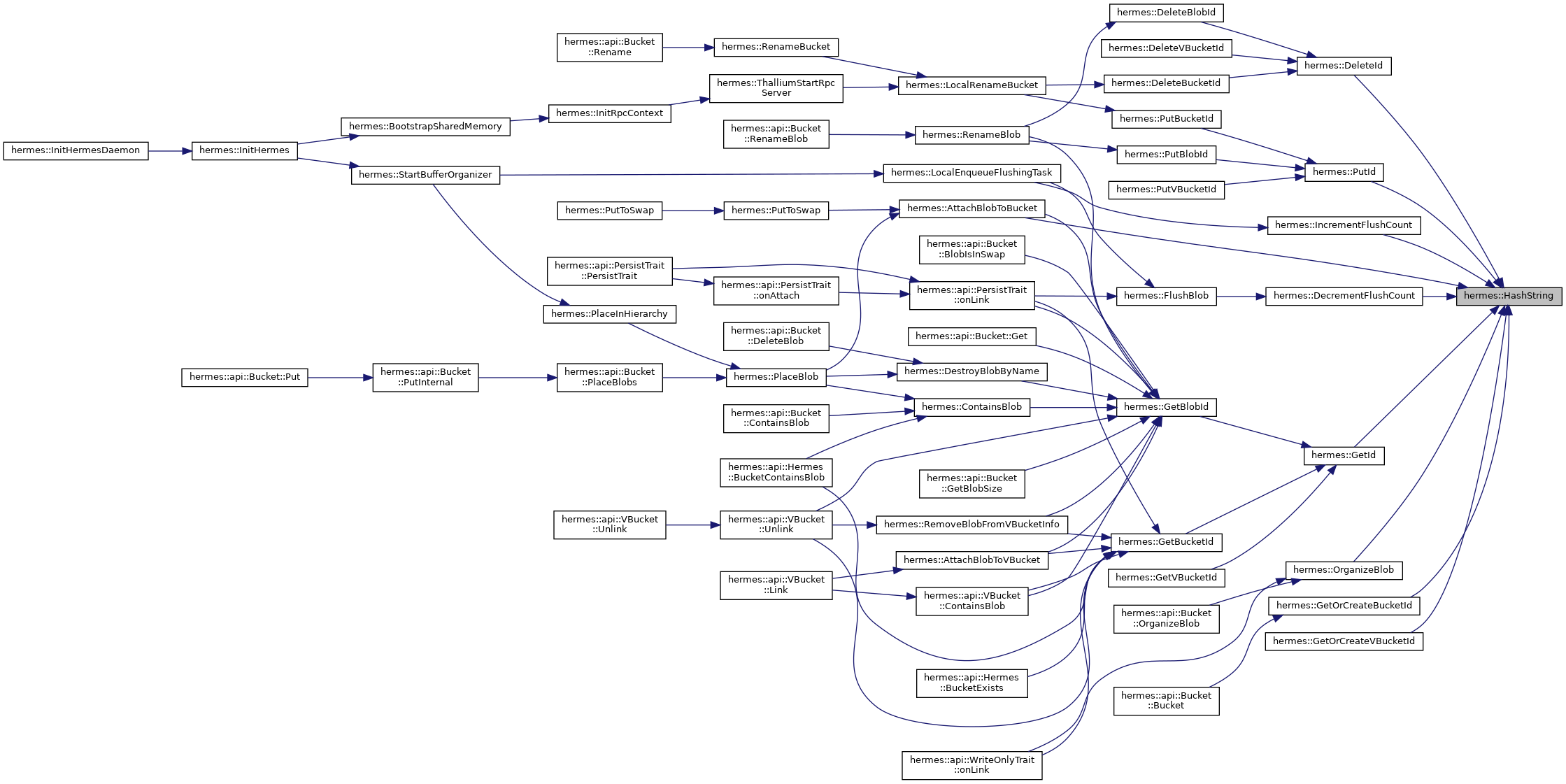
◆ GetId()
| u64 hermes::GetId | ( | SharedMemoryContext * | context, |
| RpcContext * | rpc, | ||
| const char * | name, | ||
| MapType | map_type | ||
| ) |
get id

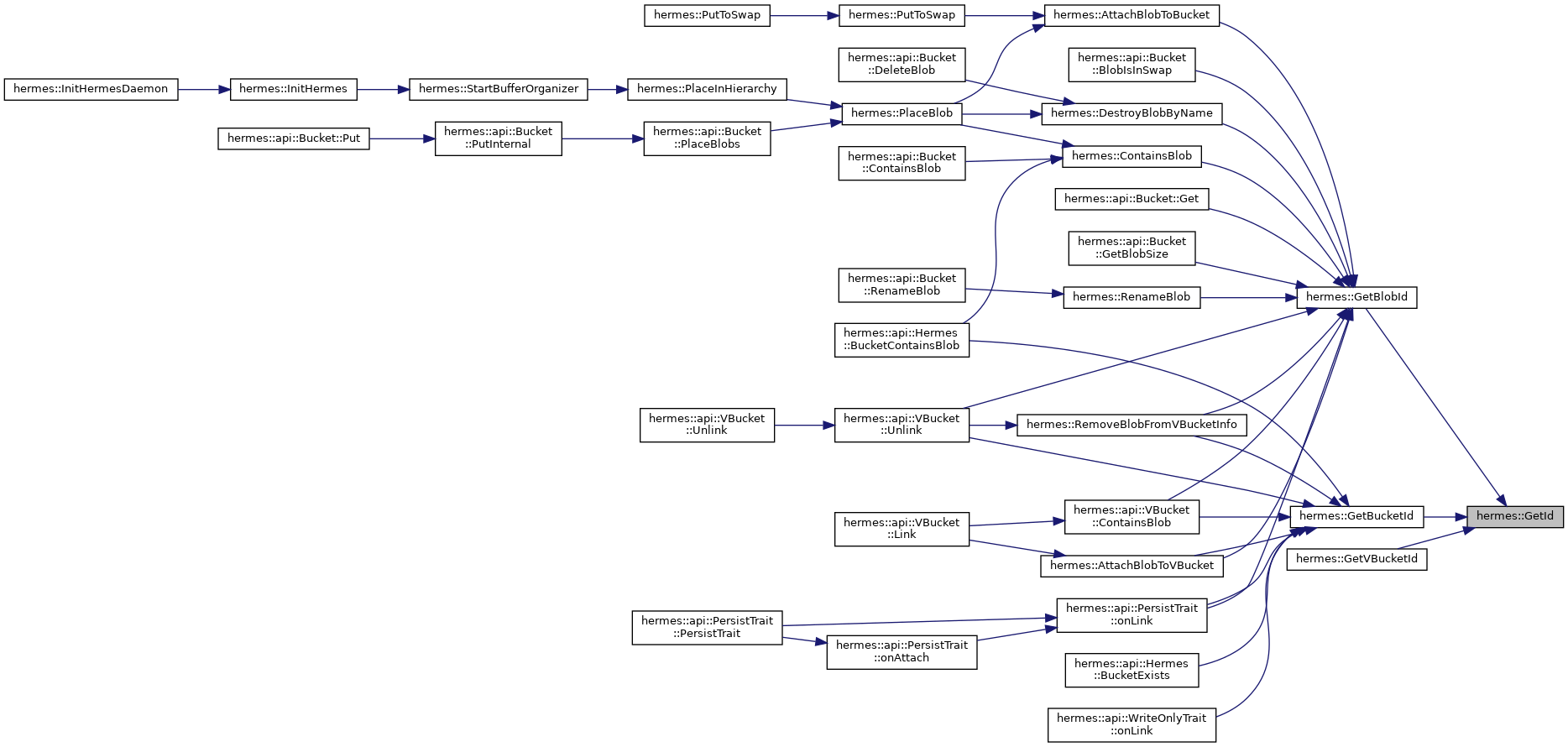
◆ GetBucketId()
| BucketID hermes::GetBucketId | ( | SharedMemoryContext * | context, |
| RpcContext * | rpc, | ||
| const char * | name | ||
| ) |
get bucket id

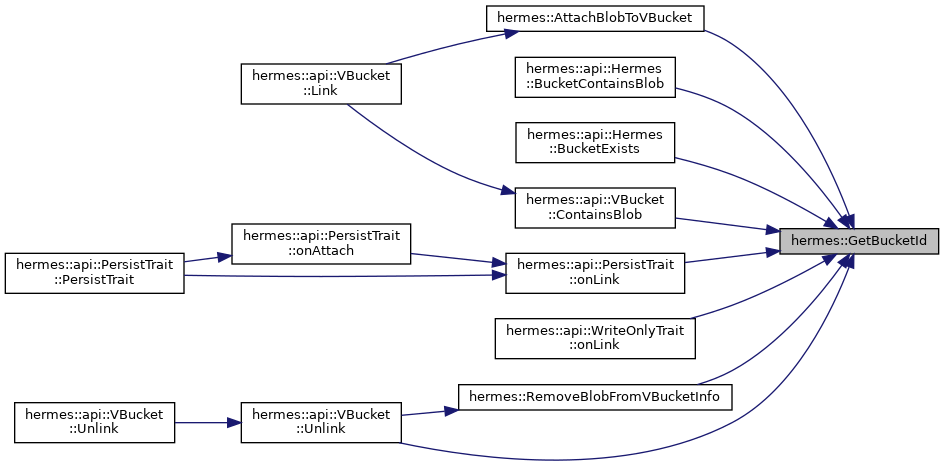
◆ LocalGetBucketId()
| BucketID hermes::LocalGetBucketId | ( | SharedMemoryContext * | context, |
| const char * | name | ||
| ) |
get local bucket id


◆ GetVBucketId()
| VBucketID hermes::GetVBucketId | ( | SharedMemoryContext * | context, |
| RpcContext * | rpc, | ||
| const char * | name | ||
| ) |
get virtual bucket id

◆ LocalGetVBucketId()
| VBucketID hermes::LocalGetVBucketId | ( | SharedMemoryContext * | context, |
| const char * | name | ||
| ) |
get local virtual bucket id


◆ MakeInternalBlobName()
| std::string hermes::MakeInternalBlobName | ( | const std::string & | name, |
| BucketID | id | ||
| ) |
make an internal BLOB name

◆ GetBlobId()
| BlobID hermes::GetBlobId | ( | SharedMemoryContext * | context, |
| RpcContext * | rpc, | ||
| const std::string & | name, | ||
| BucketID | bucket_id, | ||
| bool | track_stats | ||
| ) |
get BLOB id

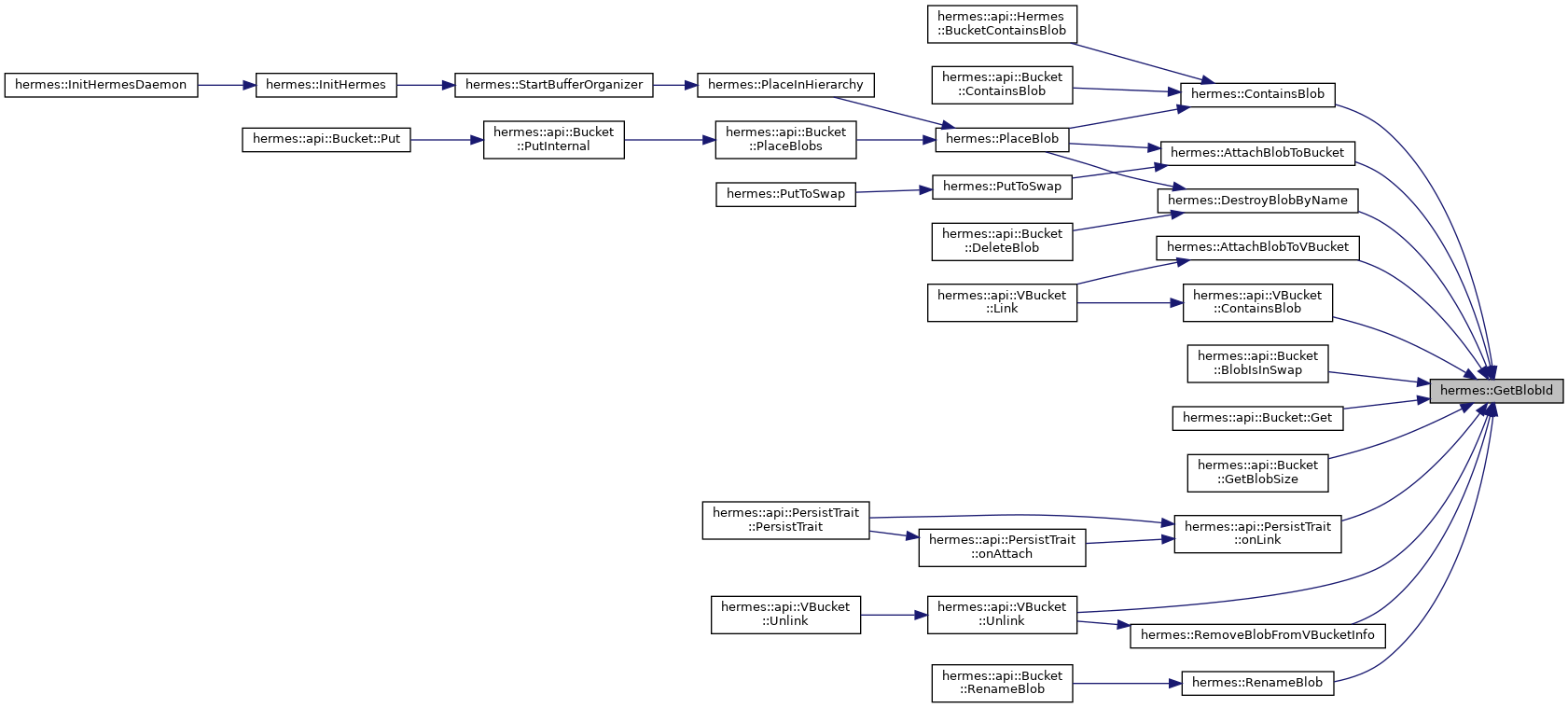
◆ PutId()
| void hermes::PutId | ( | MetadataManager * | mdm, |
| RpcContext * | rpc, | ||
| const std::string & | name, | ||
| u64 | id, | ||
| MapType | map_type | ||
| ) |
put BLOB id
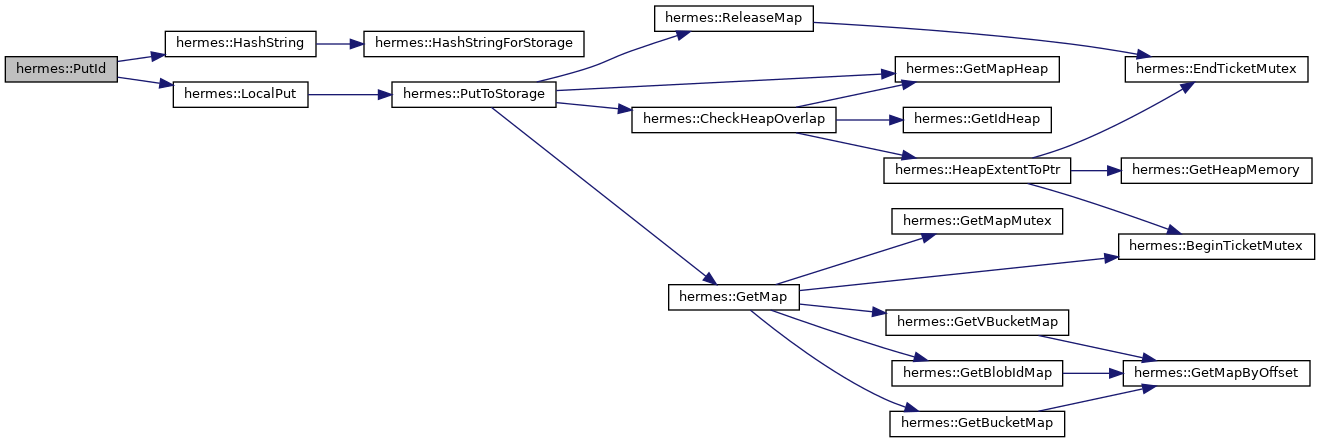

◆ PutBucketId()
| void hermes::PutBucketId | ( | MetadataManager * | mdm, |
| RpcContext * | rpc, | ||
| const std::string & | name, | ||
| BucketID | id | ||
| ) |
put bucket id


◆ LocalPutBucketId()
| void hermes::LocalPutBucketId | ( | MetadataManager * | mdm, |
| const std::string & | name, | ||
| BucketID | id | ||
| ) |
put bucket id locally
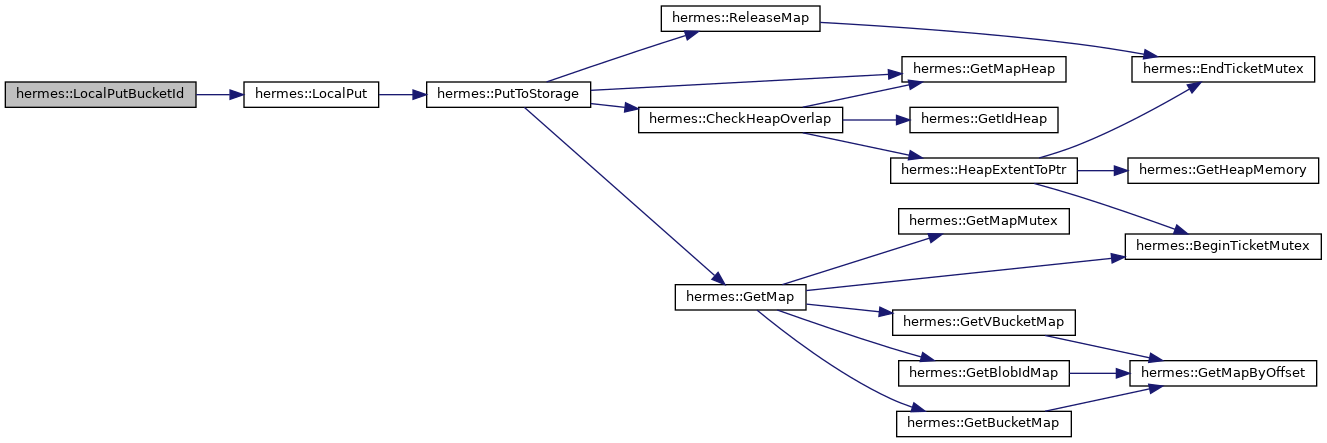

◆ PutVBucketId()
| void hermes::PutVBucketId | ( | MetadataManager * | mdm, |
| RpcContext * | rpc, | ||
| const std::string & | name, | ||
| VBucketID | id | ||
| ) |
put virtual bucket id

◆ LocalPutVBucketId()
| void hermes::LocalPutVBucketId | ( | MetadataManager * | mdm, |
| const std::string & | name, | ||
| VBucketID | id | ||
| ) |
put virtual bucket id locally


◆ PutBlobId()
| void hermes::PutBlobId | ( | MetadataManager * | mdm, |
| RpcContext * | rpc, | ||
| const std::string & | name, | ||
| BlobID | id, | ||
| BucketID | bucket_id | ||
| ) |
put BLOB id


◆ DeleteId()
| void hermes::DeleteId | ( | MetadataManager * | mdm, |
| RpcContext * | rpc, | ||
| const std::string & | name, | ||
| MapType | map_type | ||
| ) |
delete id


◆ DeleteBucketId()
| void hermes::DeleteBucketId | ( | MetadataManager * | mdm, |
| RpcContext * | rpc, | ||
| const std::string & | name | ||
| ) |
delete bucket id


◆ DeleteVBucketId()
| void hermes::DeleteVBucketId | ( | MetadataManager * | mdm, |
| RpcContext * | rpc, | ||
| const std::string & | name | ||
| ) |
delete virtual bucket id

◆ LocalDeleteBlobInfo()
| void hermes::LocalDeleteBlobInfo | ( | MetadataManager * | mdm, |
| BlobID | blob_id | ||
| ) |
delete BLOB information locally


◆ LocalDeleteBlobId()
| void hermes::LocalDeleteBlobId | ( | MetadataManager * | mdm, |
| const std::string & | name, | ||
| BucketID | bucket_id | ||
| ) |
delete BLOB id locally


◆ DeleteBlobId()
| void hermes::DeleteBlobId | ( | MetadataManager * | mdm, |
| RpcContext * | rpc, | ||
| const std::string & | name, | ||
| BucketID | bucket_id | ||
| ) |
delete BLOB id


◆ LocalGetBucketInfoByIndex()
| BucketInfo * hermes::LocalGetBucketInfoByIndex | ( | MetadataManager * | mdm, |
| u32 | index | ||
| ) |
get bucket information by index index locally
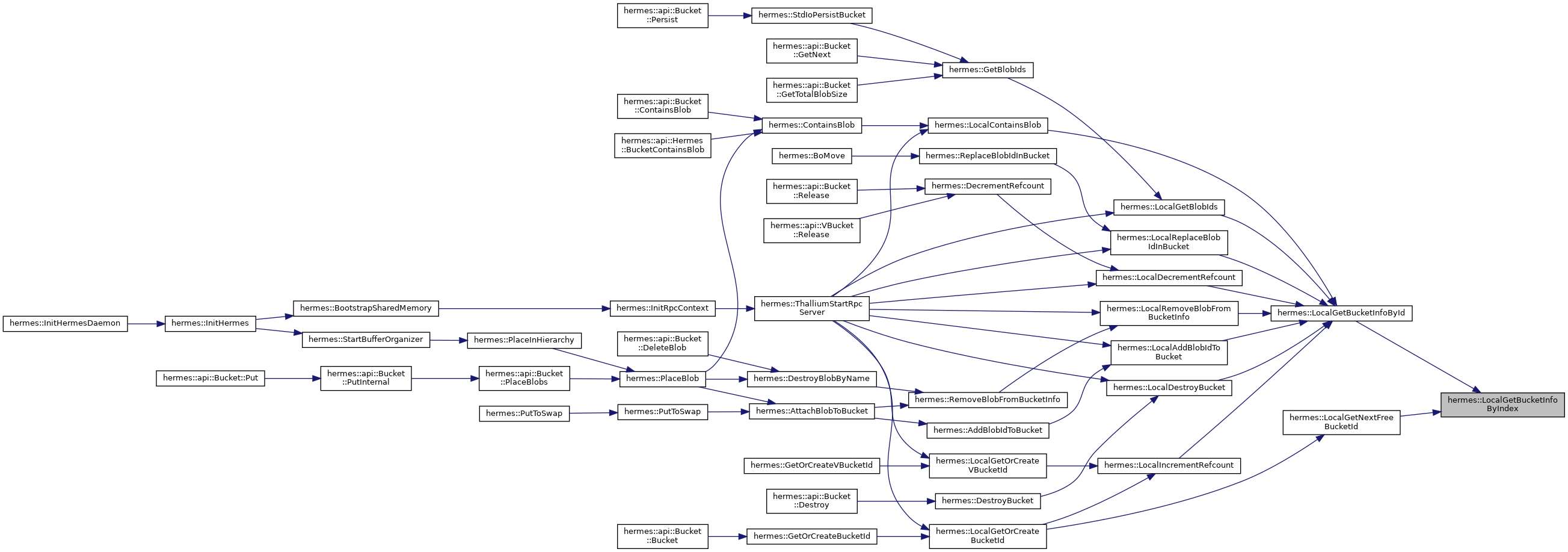
◆ LocalGetBlobNameFromId()
| std::string hermes::LocalGetBlobNameFromId | ( | SharedMemoryContext * | context, |
| BlobID | blob_id | ||
| ) |
get BLOB name from blob_id locally


◆ GetBlobNameFromId()
| std::string hermes::GetBlobNameFromId | ( | SharedMemoryContext * | context, |
| RpcContext * | rpc, | ||
| BlobID | blob_id | ||
| ) |
get BLOB name from blob_id


◆ HexStringToU64()
| u64 hermes::HexStringToU64 | ( | const std::string & | s | ) |
Faster version of std::stoull.
This is 4.1x faster than std::stoull. Since we generate all the numbers that we use this function on, we can guarantee the following:
- The size will always be kBucketIdStringSize.
- The number will always be unsigned and within the range of a u64.
- There will never be invalid characters passed in (only 0-9 and a-f).
Avoiding all this input sanitization and error checking is how we can get a 4.1x speedup.
- Parameters
-
s A string with size at least kBucketIdStringSize, where the first kBucketIdStringSize characters consist only of 0-9 and a-f.
- Returns
- The u64 representation of the first kBucketIdStringSize characters of
s.

◆ LocalGetBucketIdFromBlobId()
| BucketID hermes::LocalGetBucketIdFromBlobId | ( | SharedMemoryContext * | context, |
| BlobID | id | ||
| ) |
get bucket ID from blob_id locally


◆ GetBucketIdFromBlobId()
| BucketID hermes::GetBucketIdFromBlobId | ( | SharedMemoryContext * | context, |
| RpcContext * | rpc, | ||
| BlobID | id | ||
| ) |
get bucket ID from blob_id


◆ LocalGetBucketInfoById()
| BucketInfo* hermes::LocalGetBucketInfoById | ( | MetadataManager * | mdm, |
| BucketID | id | ||
| ) |
get bucket information from bucket_id

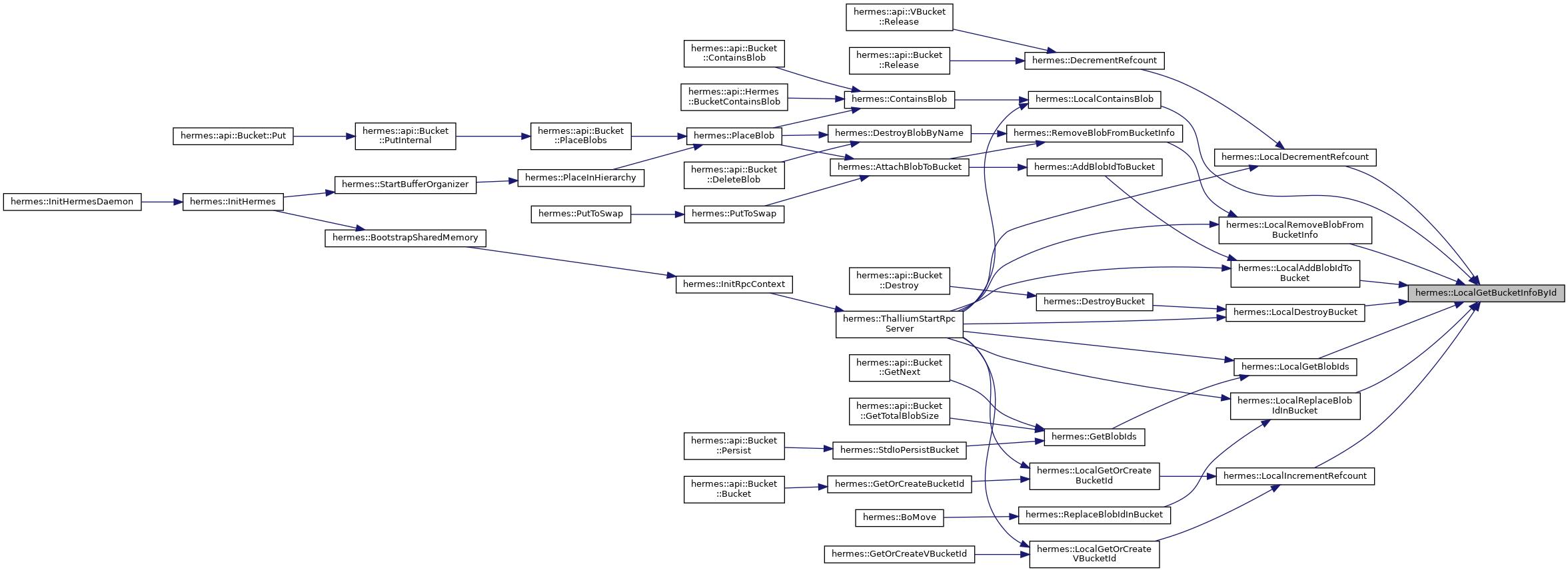
◆ GetBlobIds()
| std::vector< BlobID > hermes::GetBlobIds | ( | SharedMemoryContext * | context, |
| RpcContext * | rpc, | ||
| BucketID | bucket_id | ||
| ) |
get BLOB IDs from bucket_id


◆ GetVBucketInfoByIndex()
| VBucketInfo * hermes::GetVBucketInfoByIndex | ( | MetadataManager * | mdm, |
| u32 | index | ||
| ) |
get virtual bucket information by index

◆ LocalGetNextFreeBucketId()
| BucketID hermes::LocalGetNextFreeBucketId | ( | SharedMemoryContext * | context, |
| const std::string & | name | ||
| ) |
Returns an available BucketID and marks it as in use in the MDM.
Assumes MetadataManager::bucket_mutex is already held by the caller.
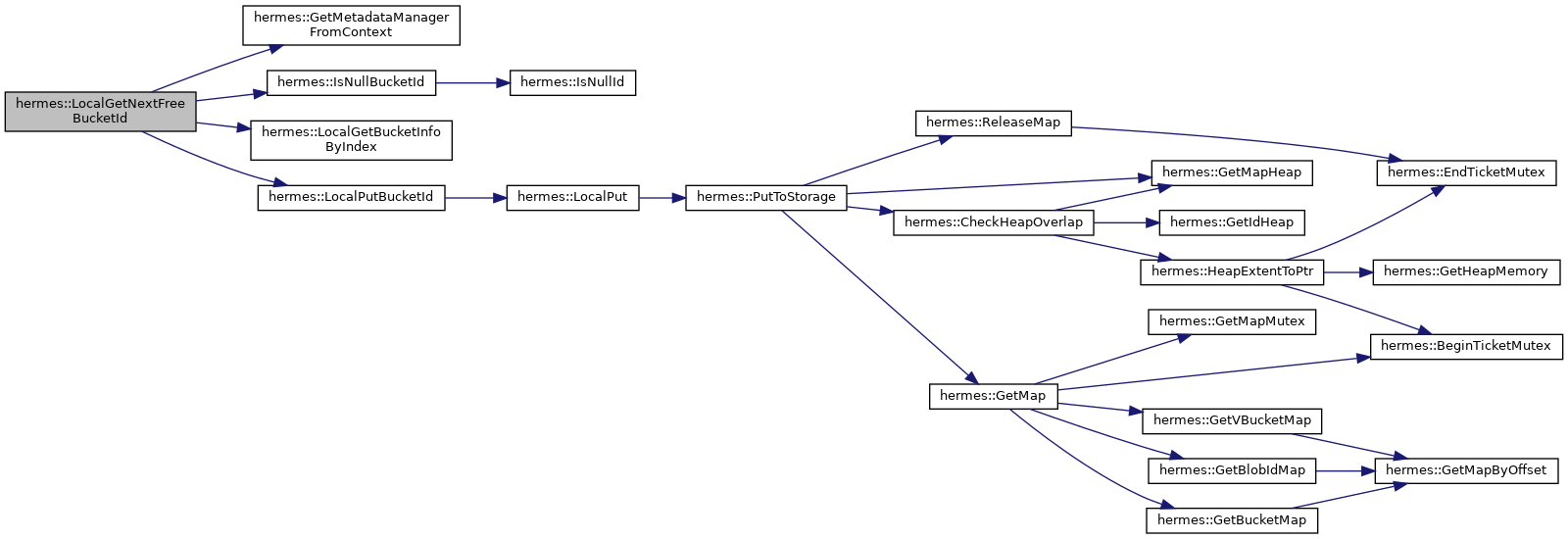

◆ LocalGetOrCreateBucketId()
| BucketID hermes::LocalGetOrCreateBucketId | ( | SharedMemoryContext * | context, |
| const std::string & | name | ||
| ) |
get or create a bucket ID locally


◆ GetOrCreateBucketId()
| BucketID hermes::GetOrCreateBucketId | ( | SharedMemoryContext * | context, |
| RpcContext * | rpc, | ||
| const std::string & | name | ||
| ) |
get or create a bucket ID


◆ LocalGetNextFreeVBucketId()
| VBucketID hermes::LocalGetNextFreeVBucketId | ( | SharedMemoryContext * | context, |
| const std::string & | name | ||
| ) |
Returns an available VBucketID and marks it as in use in the MDM.
Assumes MetadataManager::vbucket_mutex is already held by the caller.
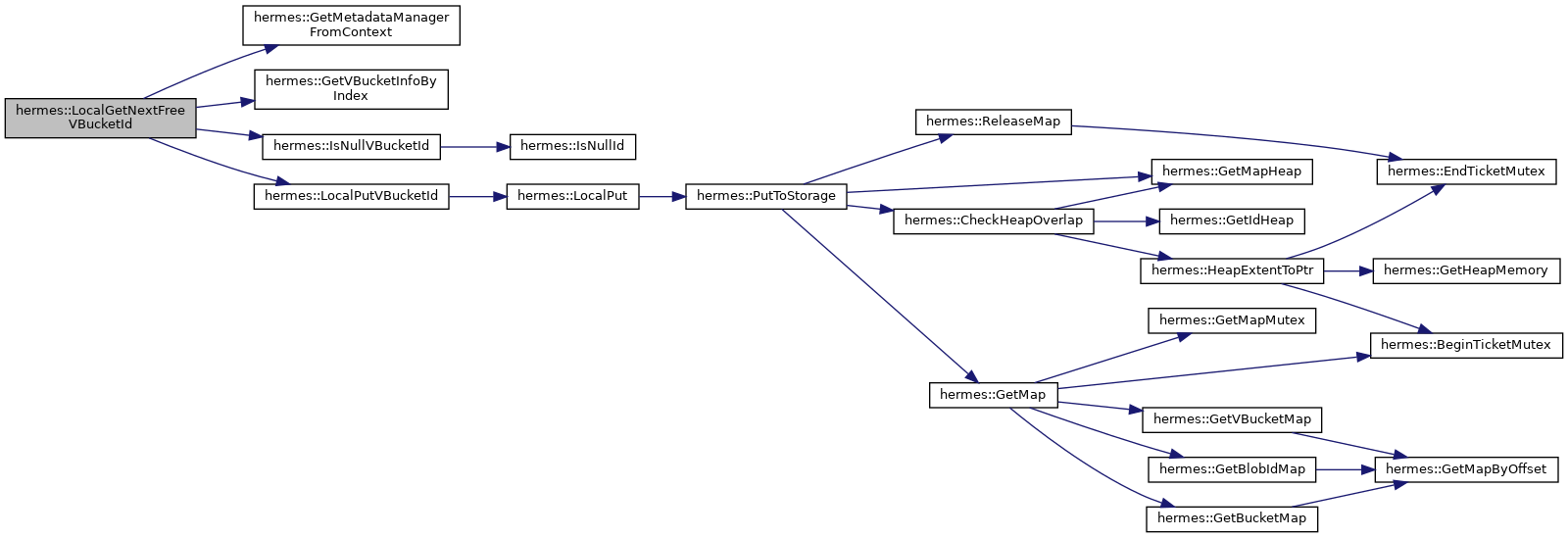

◆ LocalGetOrCreateVBucketId()
| VBucketID hermes::LocalGetOrCreateVBucketId | ( | SharedMemoryContext * | context, |
| const std::string & | name | ||
| ) |
get or create a virtual bucket ID locally


◆ GetOrCreateVBucketId()
| VBucketID hermes::GetOrCreateVBucketId | ( | SharedMemoryContext * | context, |
| RpcContext * | rpc, | ||
| const std::string & | name | ||
| ) |
get or create a virtual bucket ID

◆ CopyIds()
copy IDs
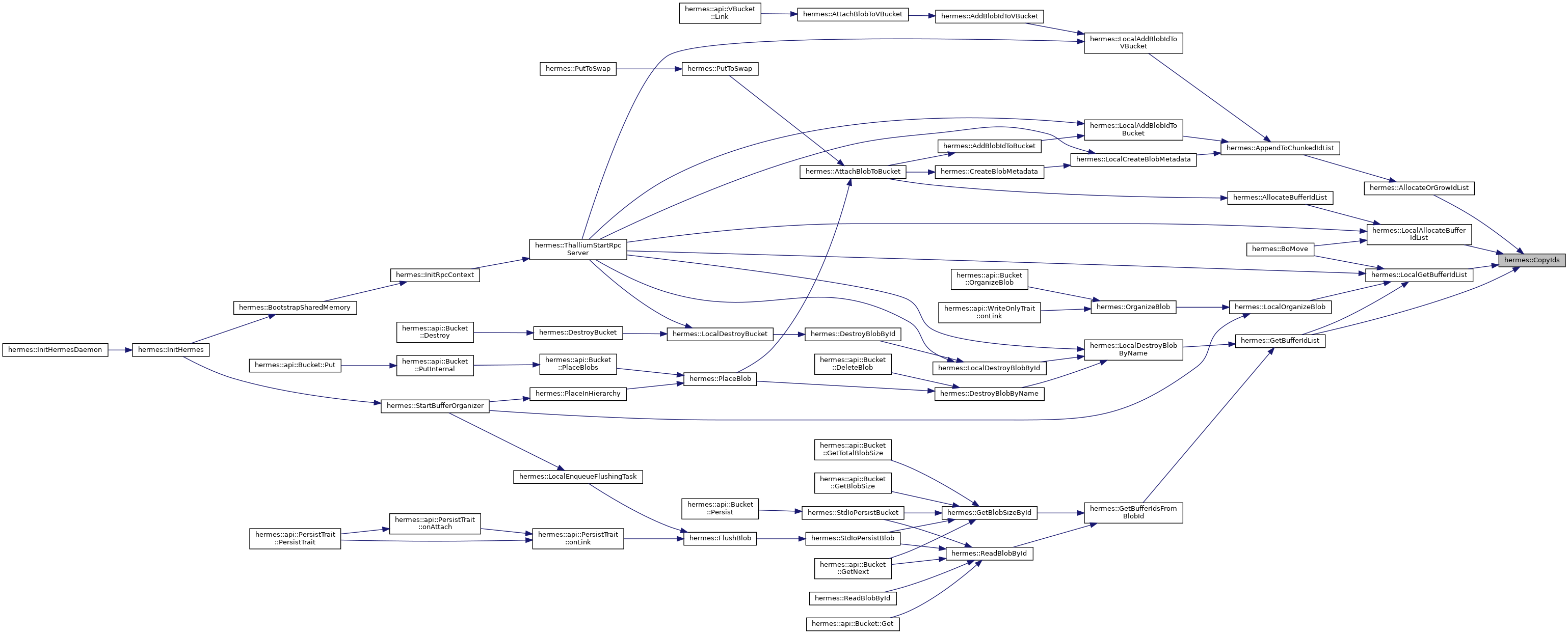
◆ ReplaceBlobIdInBucket()
| void hermes::ReplaceBlobIdInBucket | ( | SharedMemoryContext * | context, |
| RpcContext * | rpc, | ||
| BucketID | bucket_id, | ||
| BlobID | old_blob_id, | ||
| BlobID | new_blob_id | ||
| ) |
Deletes old_blob_id from bucket_id and adds new_blob_id. It combines the delete and the add into one call in order to avoid multiple RPCs.


◆ AddBlobIdToBucket()
| void hermes::AddBlobIdToBucket | ( | MetadataManager * | mdm, |
| RpcContext * | rpc, | ||
| BlobID | blob_id, | ||
| BucketID | bucket_id | ||
| ) |
add BLOB ID to bucket
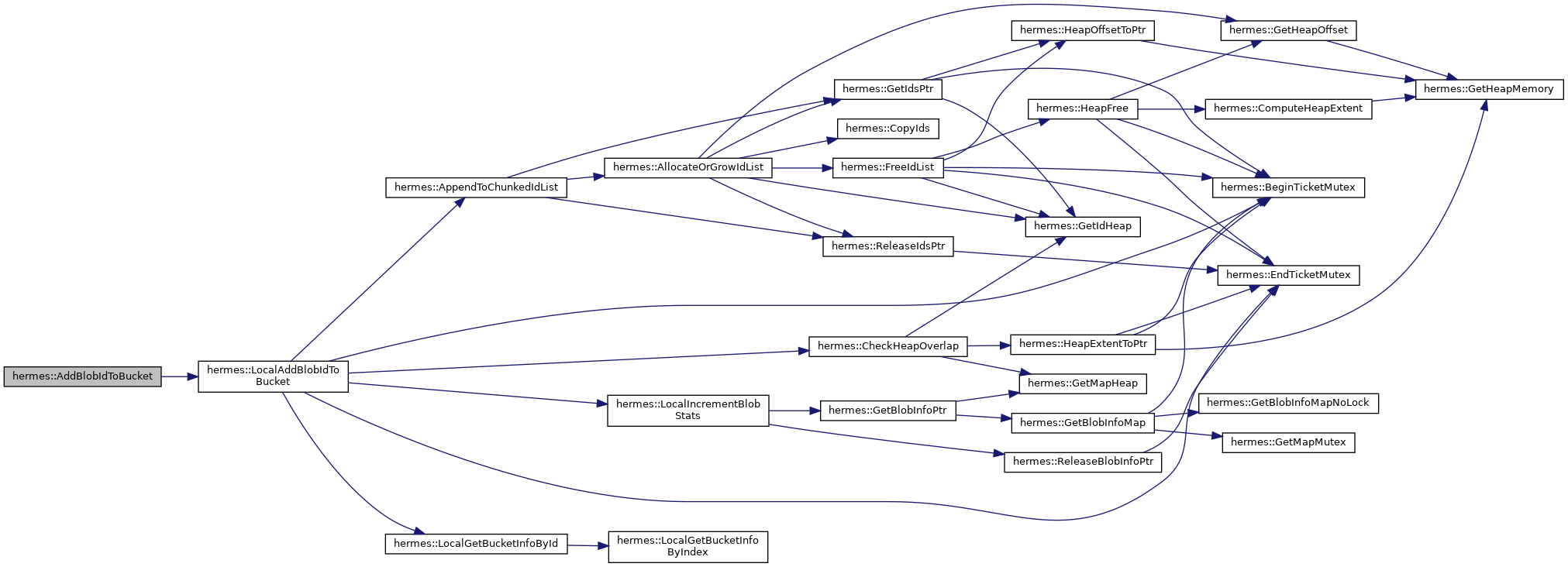

◆ AddBlobIdToVBucket()
| void hermes::AddBlobIdToVBucket | ( | MetadataManager * | mdm, |
| RpcContext * | rpc, | ||
| BlobID | blob_id, | ||
| VBucketID | vbucket_id | ||
| ) |
add BLOB ID to virtual bucket


◆ AllocateBufferIdList()
| u32 hermes::AllocateBufferIdList | ( | SharedMemoryContext * | context, |
| RpcContext * | rpc, | ||
| u32 | target_node, | ||
| const std::vector< BufferID > & | buffer_ids | ||
| ) |
allocate buffer ID list


◆ BlobIsInSwap()
| bool hermes::BlobIsInSwap | ( | BlobID | id | ) |
is BLOB in swap?

◆ GetBufferIdList() [1/2]
| void hermes::GetBufferIdList | ( | Arena * | arena, |
| SharedMemoryContext * | context, | ||
| RpcContext * | rpc, | ||
| BlobID | blob_id, | ||
| BufferIdArray * | buffer_ids | ||
| ) |
get buffer ID list


◆ GetBufferIdList() [2/2]
| std::vector< BufferID > hermes::GetBufferIdList | ( | SharedMemoryContext * | context, |
| RpcContext * | rpc, | ||
| BlobID | blob_id | ||
| ) |
get buffer ID list as vector

◆ GetBufferIdsFromBlobId()
| BufferIdArray hermes::GetBufferIdsFromBlobId | ( | Arena * | arena, |
| SharedMemoryContext * | context, | ||
| RpcContext * | rpc, | ||
| BlobID | blob_id, | ||
| u32 ** | sizes | ||
| ) |
get buffer IDs from BLOB id


◆ LocalCreateBlobMetadata()
| void hermes::LocalCreateBlobMetadata | ( | SharedMemoryContext * | context, |
| MetadataManager * | mdm, | ||
| const std::string & | blob_name, | ||
| BlobID | blob_id, | ||
| TargetID | effective_target | ||
| ) |
create BLOB metadata locally
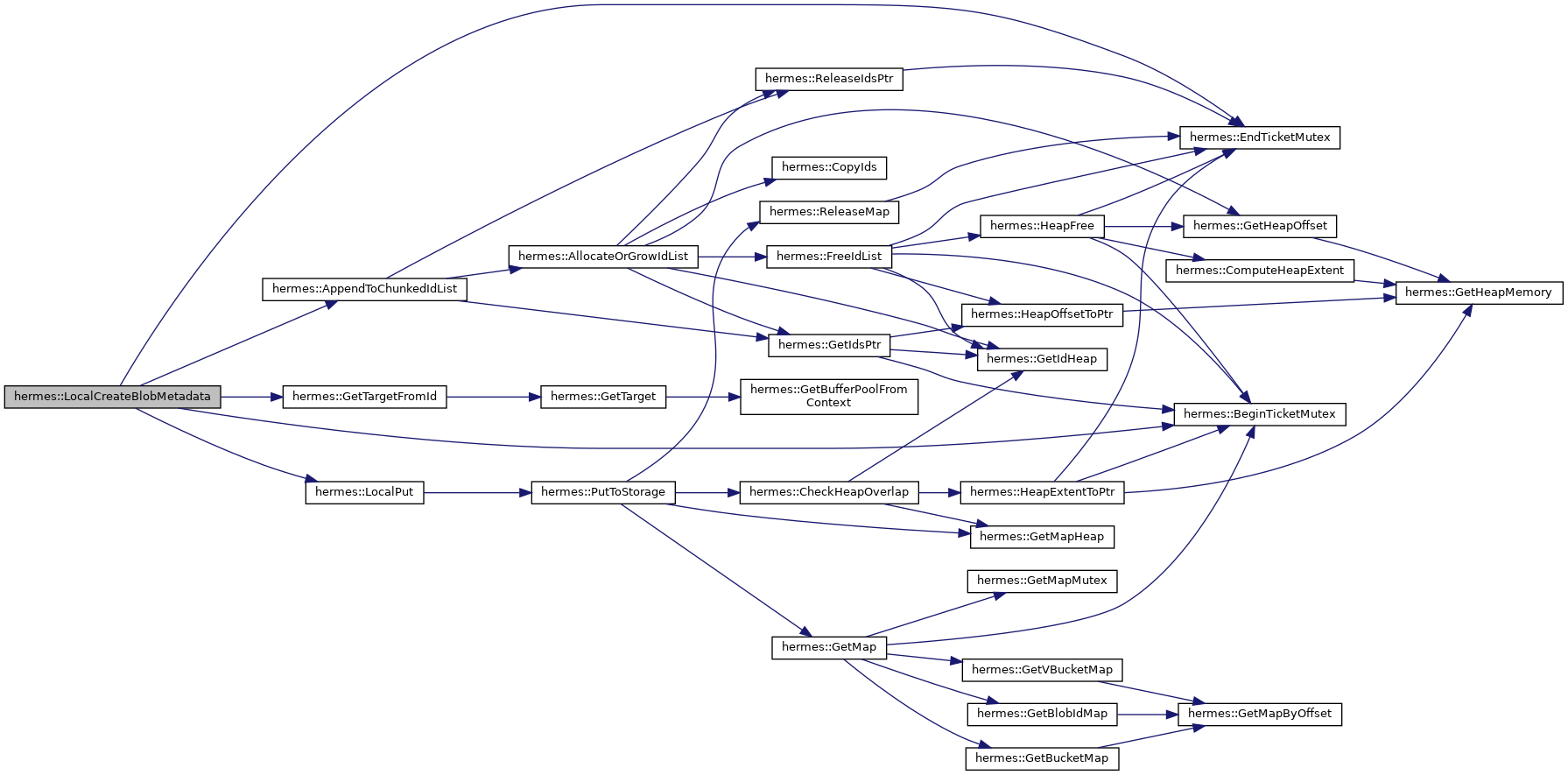

◆ CreateBlobMetadata()
| void hermes::CreateBlobMetadata | ( | SharedMemoryContext * | context, |
| RpcContext * | rpc, | ||
| const std::string & | blob_name, | ||
| BlobID | blob_id, | ||
| TargetID | effective_target | ||
| ) |
create BLOB metadata
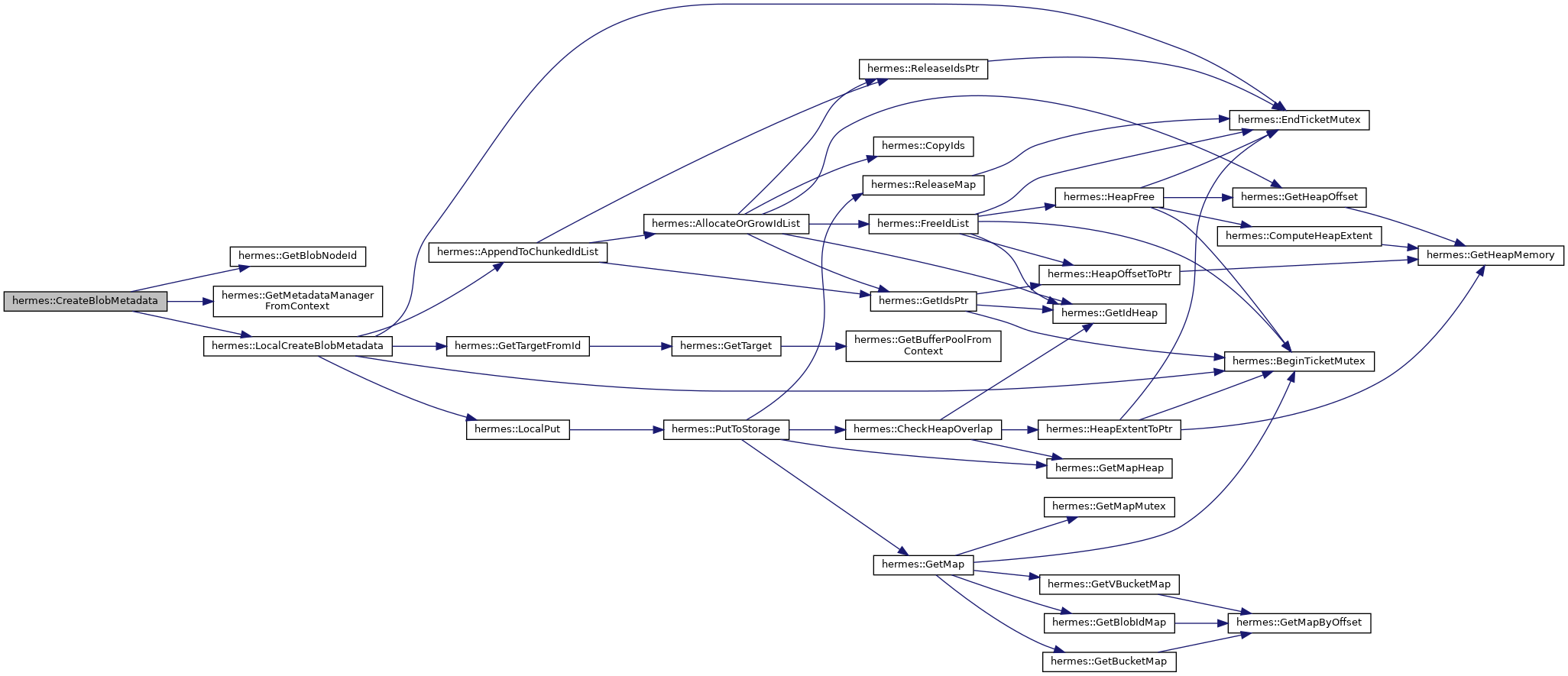

◆ AttachBlobToBucket()
| void hermes::AttachBlobToBucket | ( | SharedMemoryContext * | context, |
| RpcContext * | rpc, | ||
| const char * | blob_name, | ||
| BucketID | bucket_id, | ||
| const std::vector< BufferID > & | buffer_ids, | ||
| TargetID | effective_target, | ||
| bool | is_swap_blob, | ||
| bool | called_from_buffer_organizer | ||
| ) |
attach BLOB to bucket
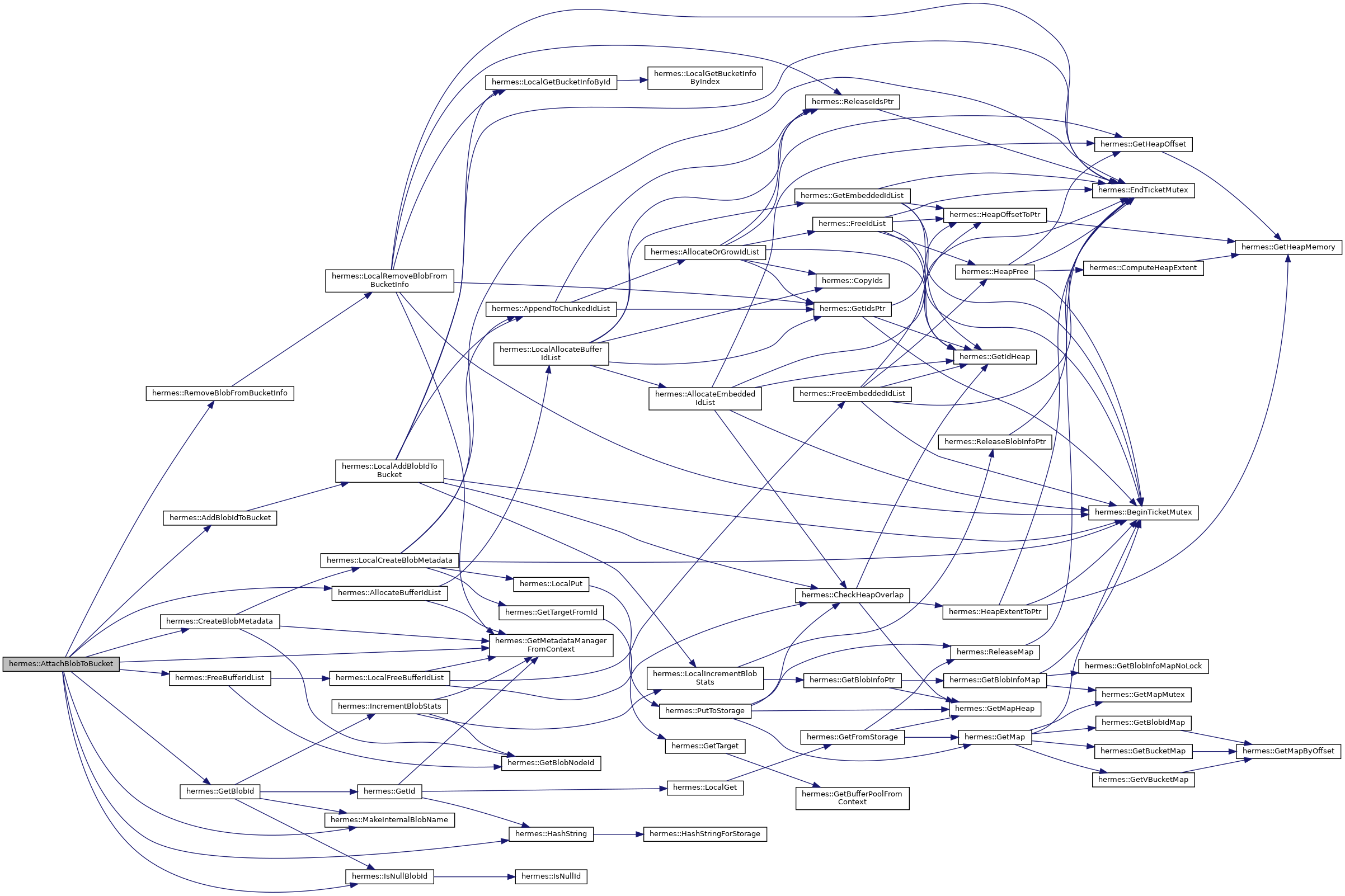

◆ FreeBufferIdList()
| void hermes::FreeBufferIdList | ( | SharedMemoryContext * | context, |
| RpcContext * | rpc, | ||
| BlobID | blob_id | ||
| ) |
free buffer ID list


◆ LocalDeleteBlobMetadata()
| void hermes::LocalDeleteBlobMetadata | ( | MetadataManager * | mdm, |
| const char * | blob_name, | ||
| BlobID | blob_id, | ||
| BucketID | bucket_id | ||
| ) |
delete BLOB metadata locally


◆ WaitForOutstandingBlobOps()
| void hermes::WaitForOutstandingBlobOps | ( | MetadataManager * | mdm, |
| BlobID | blob_id | ||
| ) |
wait for outstanding BLOB operations


◆ LocalDestroyBlobByName()
| void hermes::LocalDestroyBlobByName | ( | SharedMemoryContext * | context, |
| RpcContext * | rpc, | ||
| const char * | blob_name, | ||
| BlobID | blob_id, | ||
| BucketID | bucket_id | ||
| ) |
destroy BLOB by name locally
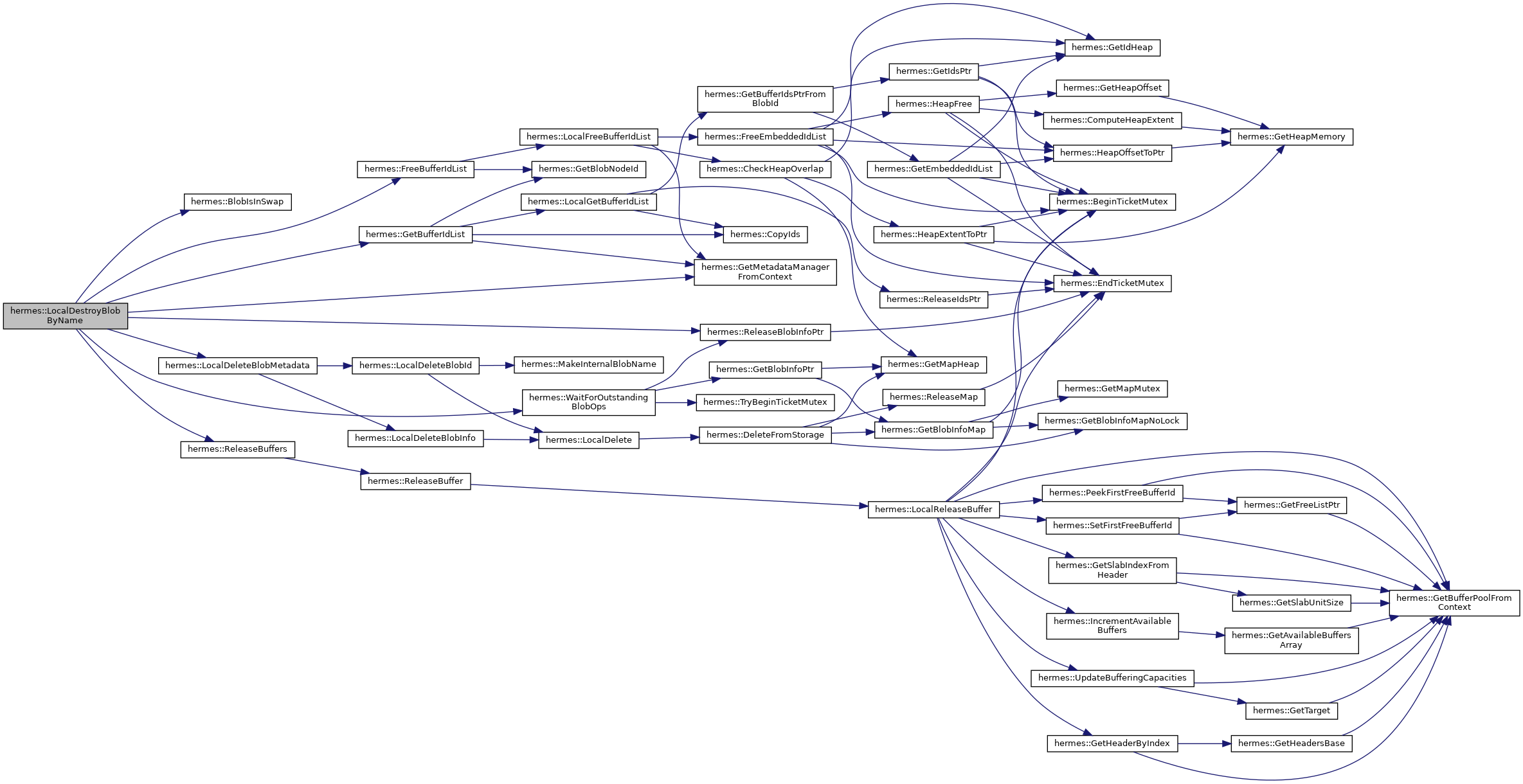

◆ LocalDestroyBlobById()
| void hermes::LocalDestroyBlobById | ( | SharedMemoryContext * | context, |
| RpcContext * | rpc, | ||
| BlobID | blob_id, | ||
| BucketID | bucket_id | ||
| ) |
destroy BLOB by ID locally
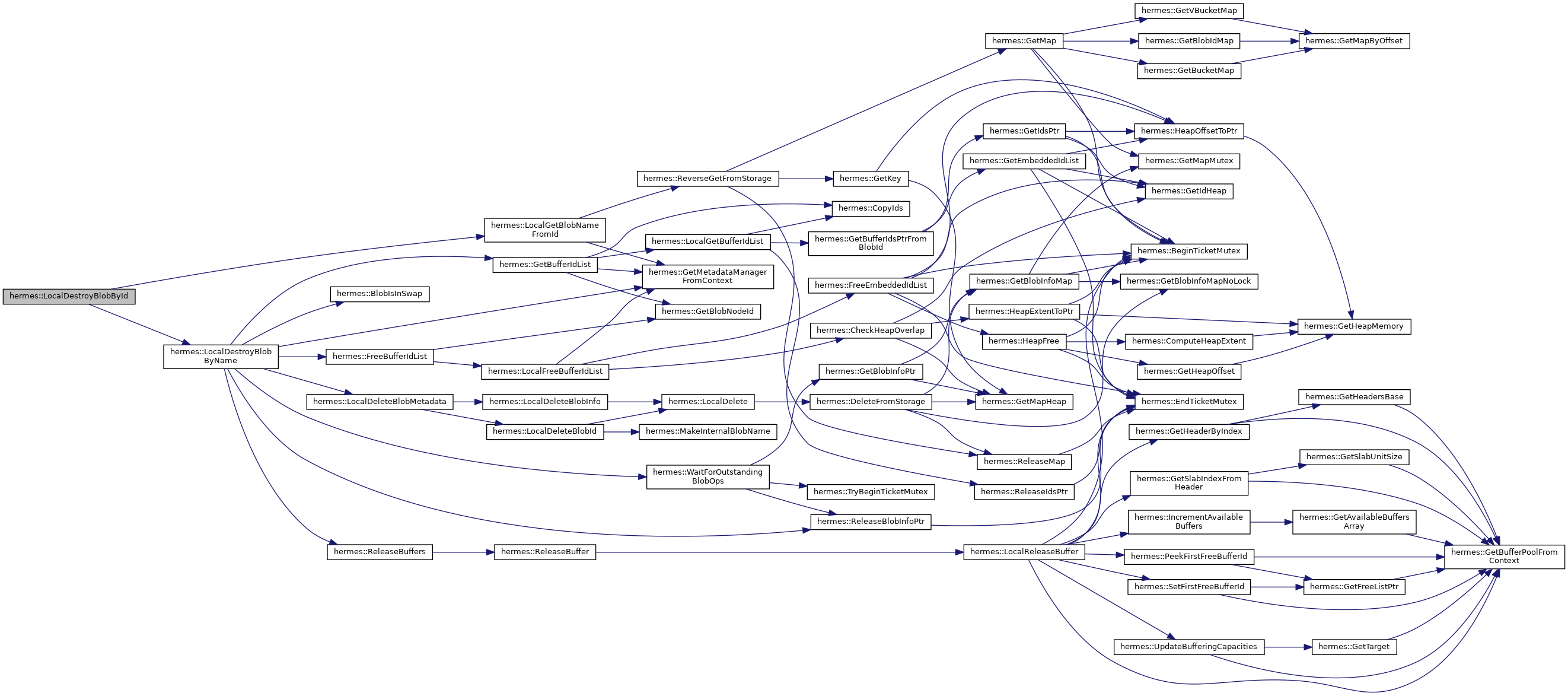

◆ RemoveBlobFromBucketInfo()
| void hermes::RemoveBlobFromBucketInfo | ( | SharedMemoryContext * | context, |
| RpcContext * | rpc, | ||
| BucketID | bucket_id, | ||
| BlobID | blob_id | ||
| ) |
remove BLOB from Bucket


◆ DestroyBlobByName()
| void hermes::DestroyBlobByName | ( | SharedMemoryContext * | context, |
| RpcContext * | rpc, | ||
| BucketID | bucket_id, | ||
| const std::string & | blob_name | ||
| ) |
destroy BLOB by name
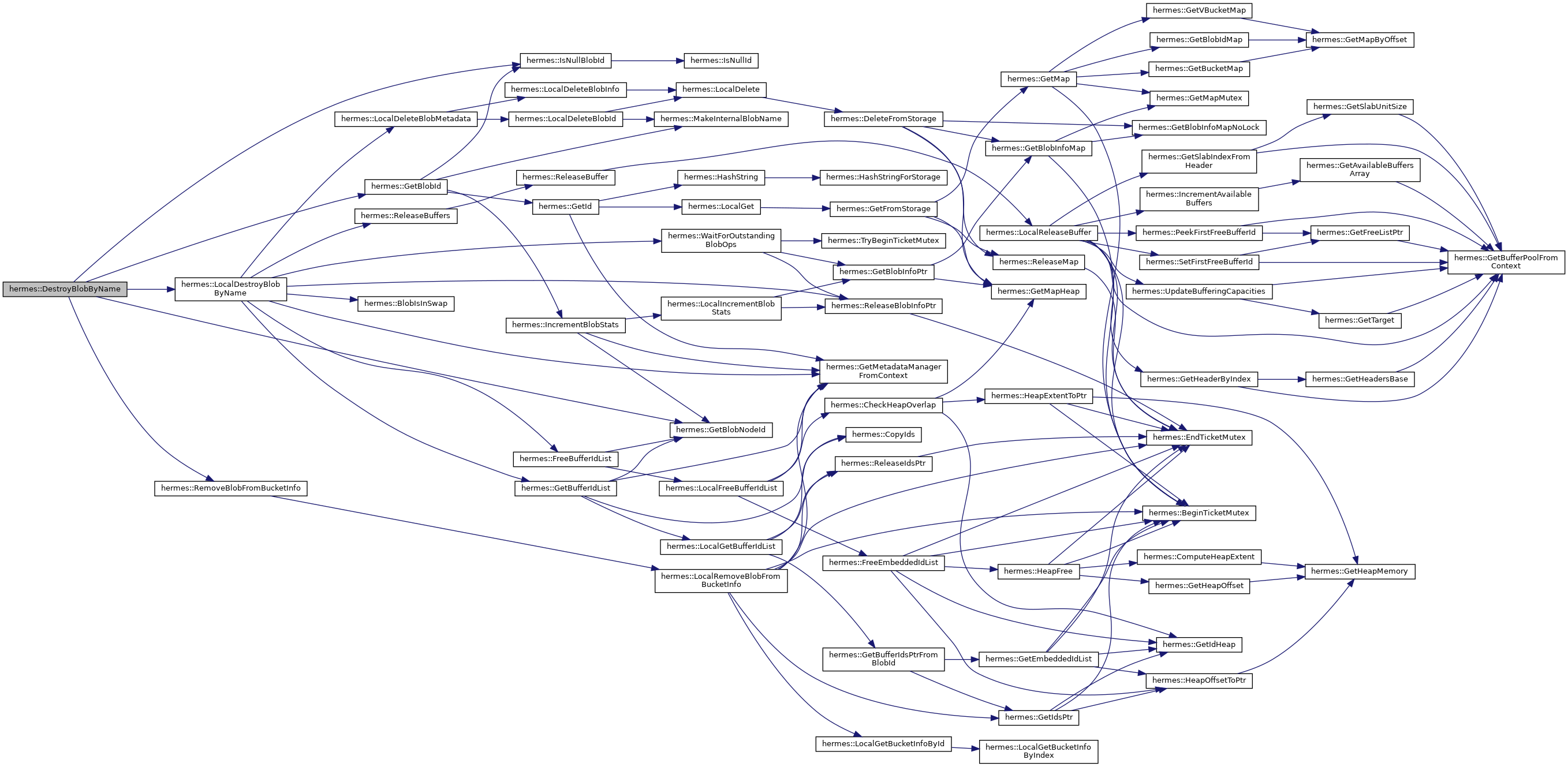

◆ RenameBlob()
| void hermes::RenameBlob | ( | SharedMemoryContext * | context, |
| RpcContext * | rpc, | ||
| const std::string & | old_name, | ||
| const std::string & | new_name, | ||
| BucketID | bucket_id | ||
| ) |
rename BLOB


◆ ContainsBlob()
| bool hermes::ContainsBlob | ( | SharedMemoryContext * | context, |
| RpcContext * | rpc, | ||
| BucketID | bucket_id, | ||
| const std::string & | blob_name | ||
| ) |
does bucket_id bucket contain blob_name BLOB?


◆ DestroyBlobById()
| void hermes::DestroyBlobById | ( | SharedMemoryContext * | context, |
| RpcContext * | rpc, | ||
| BlobID | id, | ||
| BucketID | bucket_id | ||
| ) |
destroy BLOB by ID
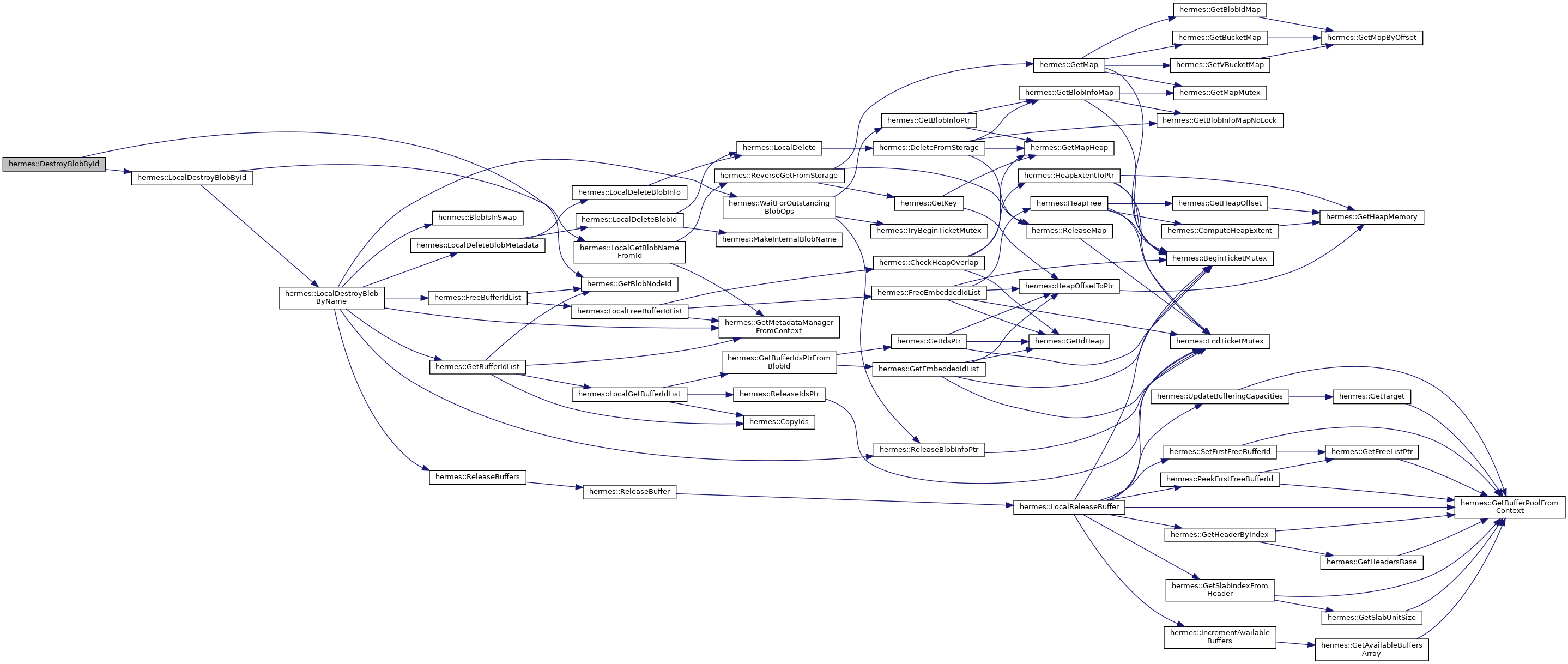

◆ DestroyBucket()
| bool hermes::DestroyBucket | ( | SharedMemoryContext * | context, |
| RpcContext * | rpc, | ||
| const char * | name, | ||
| BucketID | bucket_id | ||
| ) |
destroy bucket
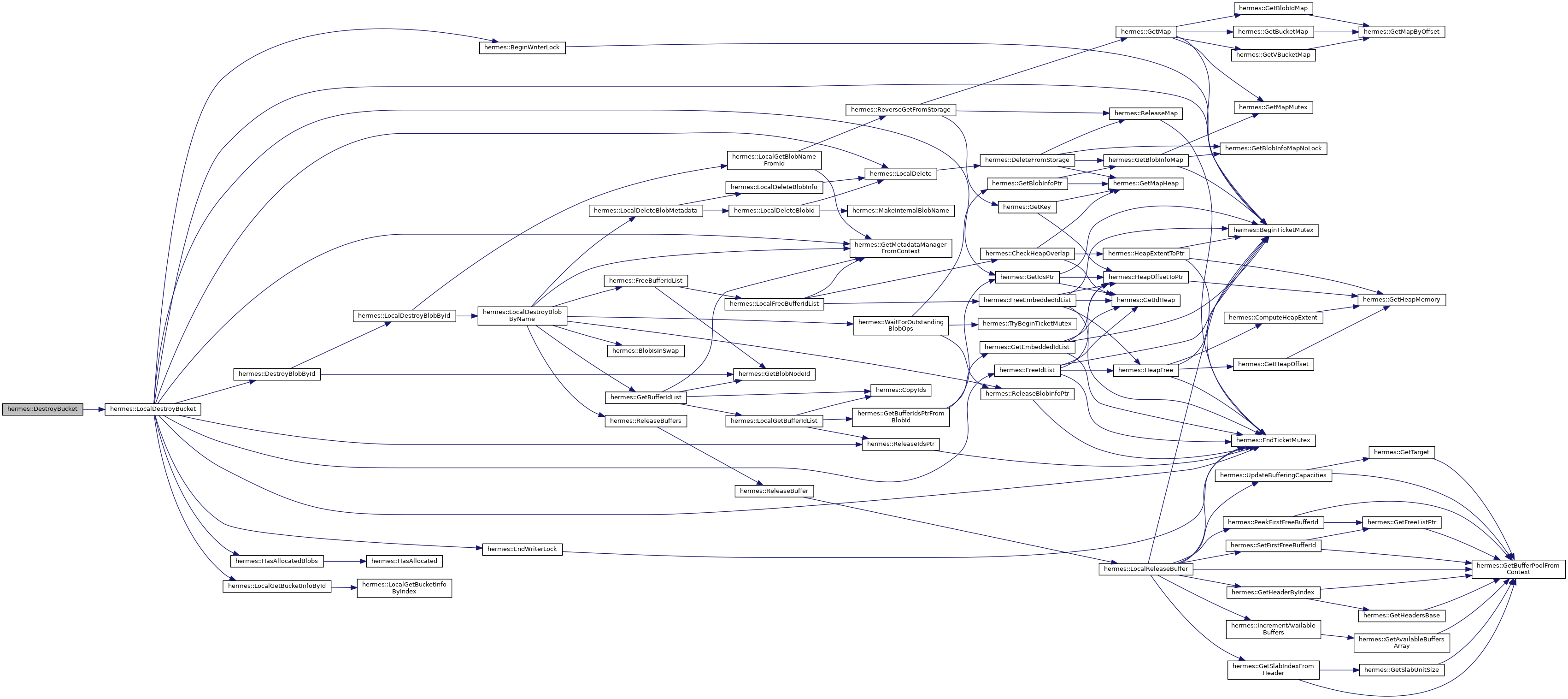

◆ DestroyVBucket()
| bool hermes::DestroyVBucket | ( | SharedMemoryContext * | context, |
| RpcContext * | rpc, | ||
| const char * | name, | ||
| VBucketID | vbucket_id | ||
| ) |
destroy virtual bucket


◆ LocalRenameBucket()
| void hermes::LocalRenameBucket | ( | SharedMemoryContext * | context, |
| RpcContext * | rpc, | ||
| BucketID | id, | ||
| const std::string & | old_name, | ||
| const std::string & | new_name | ||
| ) |
rename bucket locally


◆ RenameBucket()
| void hermes::RenameBucket | ( | SharedMemoryContext * | context, |
| RpcContext * | rpc, | ||
| BucketID | id, | ||
| const std::string & | old_name, | ||
| const std::string & | new_name | ||
| ) |
rename bucket


◆ LocalIncrementRefcount() [1/2]
| void hermes::LocalIncrementRefcount | ( | SharedMemoryContext * | context, |
| BucketID | id | ||
| ) |
increment reference count locally


◆ LocalDecrementRefcount() [1/2]
| void hermes::LocalDecrementRefcount | ( | SharedMemoryContext * | context, |
| BucketID | id | ||
| ) |
decrement reference count locally


◆ DecrementRefcount() [1/2]
| void hermes::DecrementRefcount | ( | SharedMemoryContext * | context, |
| RpcContext * | rpc, | ||
| BucketID | id | ||
| ) |
decrement reference count


◆ LocalGetRemainingTargetCapacity()
| u64 hermes::LocalGetRemainingTargetCapacity | ( | SharedMemoryContext * | context, |
| TargetID | id | ||
| ) |
get remaning target capacity locally


◆ GetLocalSystemViewState() [1/2]
| SystemViewState* hermes::GetLocalSystemViewState | ( | MetadataManager * | mdm | ) |
get local system view state from mdm metadata mamanger

◆ GetLocalSystemViewState() [2/2]
| SystemViewState * hermes::GetLocalSystemViewState | ( | SharedMemoryContext * | context | ) |
get local system view state from context
get local system view state

◆ LocalGetGlobalDeviceCapacities()
| std::vector< u64 > hermes::LocalGetGlobalDeviceCapacities | ( | SharedMemoryContext * | context | ) |
get global device capacities locally


◆ GetGlobalDeviceCapacities()
| std::vector< u64 > hermes::GetGlobalDeviceCapacities | ( | SharedMemoryContext * | context, |
| RpcContext * | rpc | ||
| ) |
get global device capacities

◆ GetGlobalSystemViewState()
| GlobalSystemViewState * hermes::GetGlobalSystemViewState | ( | SharedMemoryContext * | context | ) |
get global system view state from context


◆ LocalUpdateGlobalSystemViewState()
| std::vector< ViolationInfo > hermes::LocalUpdateGlobalSystemViewState | ( | SharedMemoryContext * | context, |
| u32 | node_id, | ||
| std::vector< i64 > | adjustments | ||
| ) |
update global system view state locally


◆ UpdateGlobalSystemViewState()
| void hermes::UpdateGlobalSystemViewState | ( | SharedMemoryContext * | context, |
| RpcContext * | rpc | ||
| ) |
update global system view state


◆ FindTargetIdFromDeviceId()
| TargetID hermes::FindTargetIdFromDeviceId | ( | const std::vector< TargetID > & | targets, |
| DeviceID | device_id | ||
| ) |
find target ID from device ID
◆ GetOffsetFromMdm()
|
static |
get offset from metadata manager

◆ CreateSystemViewState()
| SystemViewState* hermes::CreateSystemViewState | ( | Arena * | arena, |
| Config * | config | ||
| ) |
create system view state

◆ CreateGlobalSystemViewState()
| GlobalSystemViewState* hermes::CreateGlobalSystemViewState | ( | RpcContext * | rpc, |
| Arena * | arena, | ||
| Config * | config | ||
| ) |
create global system view state

◆ GetSwapFilename()
| std::string hermes::GetSwapFilename | ( | MetadataManager * | mdm, |
| u32 | node_id | ||
| ) |
get swap file name

◆ SwapBlobToVec()
swap BLOB to vector

◆ VecToSwapBlob()
◆ IdArrayToSwapBlob()
| SwapBlob hermes::IdArrayToSwapBlob | ( | BufferIdArray | ids | ) |
ID array to swap BLOB

◆ InitMetadataManager()
| void hermes::InitMetadataManager | ( | MetadataManager * | mdm, |
| RpcContext * | rpc, | ||
| Arena * | arena, | ||
| Config * | config | ||
| ) |
initialize metadata manager
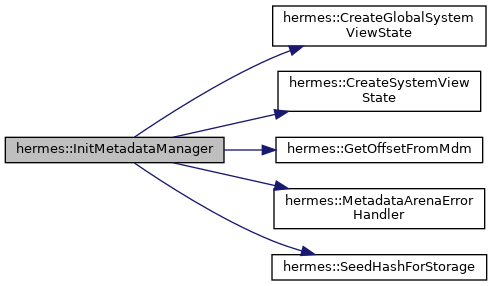

◆ LocalGetVBucketInfoByIndex()
| VBucketInfo* hermes::LocalGetVBucketInfoByIndex | ( | MetadataManager * | mdm, |
| u32 | index | ||
| ) |
get virtual bucket information by index locally

◆ LocalGetVBucketInfoById()
| VBucketInfo* hermes::LocalGetVBucketInfoById | ( | MetadataManager * | mdm, |
| VBucketID | id | ||
| ) |
get virtual bucket information by id locally


◆ LocalIncrementRefcount() [2/2]
| void hermes::LocalIncrementRefcount | ( | SharedMemoryContext * | context, |
| VBucketID | id | ||
| ) |
increment reference counter locally

◆ LocalDecrementRefcount() [2/2]
| void hermes::LocalDecrementRefcount | ( | SharedMemoryContext * | context, |
| VBucketID | id | ||
| ) |
decrement reference counter locally

◆ DecrementRefcount() [2/2]
| void hermes::DecrementRefcount | ( | SharedMemoryContext * | context, |
| RpcContext * | rpc, | ||
| VBucketID | id | ||
| ) |
decrement reference counter

◆ GetRelativeNodeId()
| u32 hermes::GetRelativeNodeId | ( | RpcContext * | rpc, |
| int | offset | ||
| ) |
get relative node ID

◆ GetNextNode()
| u32 hermes::GetNextNode | ( | RpcContext * | rpc | ) |
get next node


◆ GetPreviousNode()
| u32 hermes::GetPreviousNode | ( | RpcContext * | rpc | ) |
get previous node


◆ GetNodeTargets()
| std::vector<TargetID> hermes::GetNodeTargets | ( | SharedMemoryContext * | context, |
| RpcContext * | rpc, | ||
| u32 | target_node | ||
| ) |
get node targets


◆ GetNeighborhoodTargets()
| std::vector< TargetID > hermes::GetNeighborhoodTargets | ( | SharedMemoryContext * | context, |
| RpcContext * | rpc | ||
| ) |
get neighborhood node targets


◆ GetRemainingTargetCapacity()
| u64 hermes::GetRemainingTargetCapacity | ( | SharedMemoryContext * | context, |
| RpcContext * | rpc, | ||
| TargetID | target_id | ||
| ) |
get remaining target capacity


◆ GetRemainingTargetCapacities()
| std::vector< u64 > hermes::GetRemainingTargetCapacities | ( | SharedMemoryContext * | context, |
| RpcContext * | rpc, | ||
| const std::vector< TargetID > & | targets | ||
| ) |
get remaining target capacities


◆ AttachBlobToVBucket()
| void hermes::AttachBlobToVBucket | ( | SharedMemoryContext * | context, |
| RpcContext * | rpc, | ||
| const char * | blob_name, | ||
| const char * | bucket_name, | ||
| VBucketID | vbucket_id | ||
| ) |
attach BLOB to VBucket
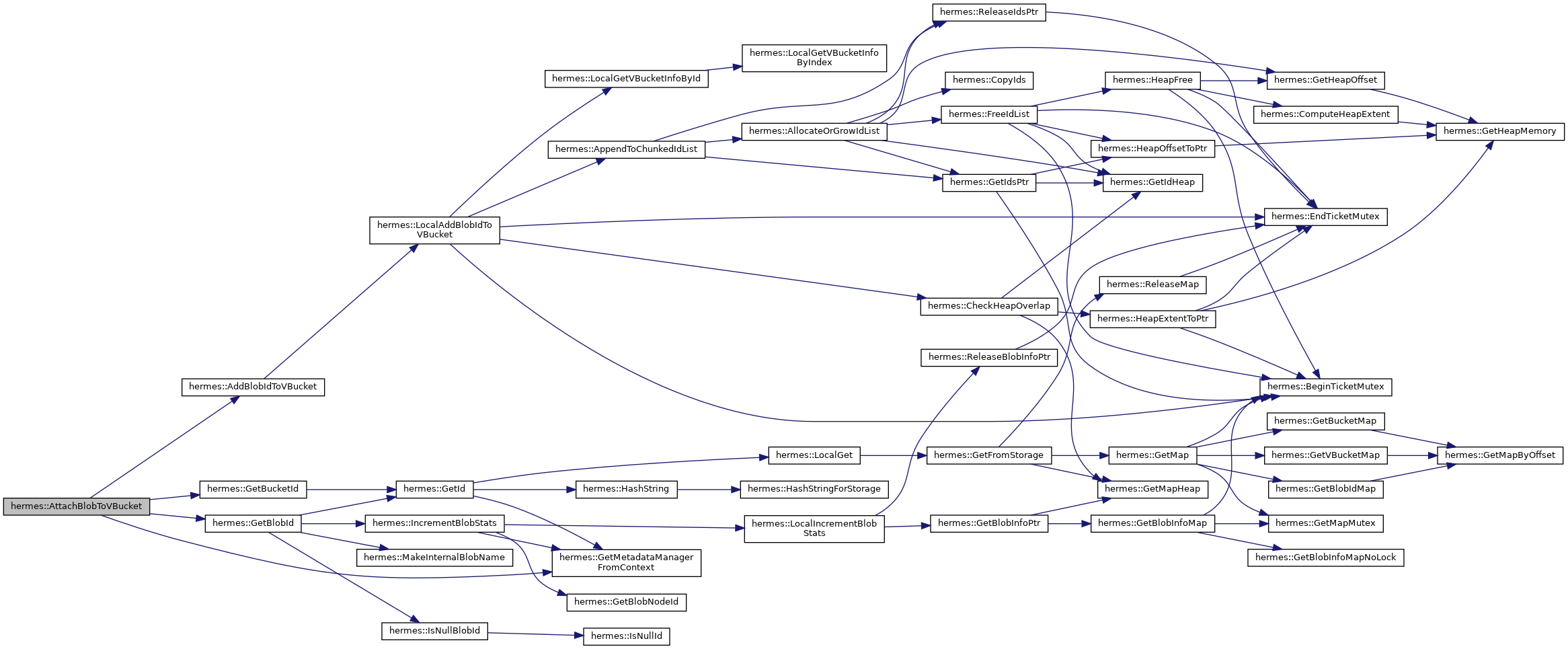

◆ LocalGetBucketNameById()
| std::string hermes::LocalGetBucketNameById | ( | SharedMemoryContext * | context, |
| BucketID | blob_id | ||
| ) |
get bucket name by ID locally


◆ GetBlobsFromVBucketInfo()
| std::vector< BlobID > hermes::GetBlobsFromVBucketInfo | ( | SharedMemoryContext * | context, |
| RpcContext * | rpc, | ||
| VBucketID | vbucket_id | ||
| ) |
get BLOB from VBucket

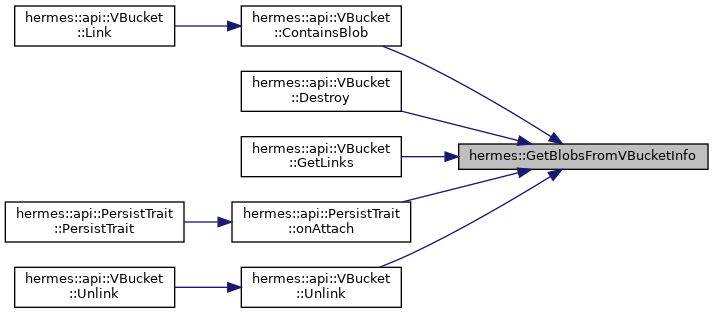
◆ RemoveBlobFromVBucketInfo()
| void hermes::RemoveBlobFromVBucketInfo | ( | SharedMemoryContext * | context, |
| RpcContext * | rpc, | ||
| VBucketID | vbucket_id, | ||
| const char * | blob_name, | ||
| const char * | bucket_name | ||
| ) |
remove BLOB from VBucket


◆ GetBucketNameById()
| std::string hermes::GetBucketNameById | ( | SharedMemoryContext * | context, |
| RpcContext * | rpc, | ||
| BucketID | id | ||
| ) |
get bucket name by bucket ID


◆ ScoringFunction()
| f32 hermes::ScoringFunction | ( | MetadataManager * | mdm, |
| Stats * | stats | ||
| ) |
Returns the score calculated from stats.
A high score indicates a "cold" Blob, or one that has not been accessed very recently or frequently.

◆ LocalGetNumOutstandingFlushingTasks()
| int hermes::LocalGetNumOutstandingFlushingTasks | ( | SharedMemoryContext * | context, |
| VBucketID | id | ||
| ) |
get number of outstanding flushing tasks locally


◆ GetNumOutstandingFlushingTasks()
| int hermes::GetNumOutstandingFlushingTasks | ( | SharedMemoryContext * | context, |
| RpcContext * | rpc, | ||
| VBucketID | id | ||
| ) |
get number of outstanding flushing tasks


◆ LocalLockBlob()
| bool hermes::LocalLockBlob | ( | SharedMemoryContext * | context, |
| BlobID | blob_id | ||
| ) |
lock BLOB locally
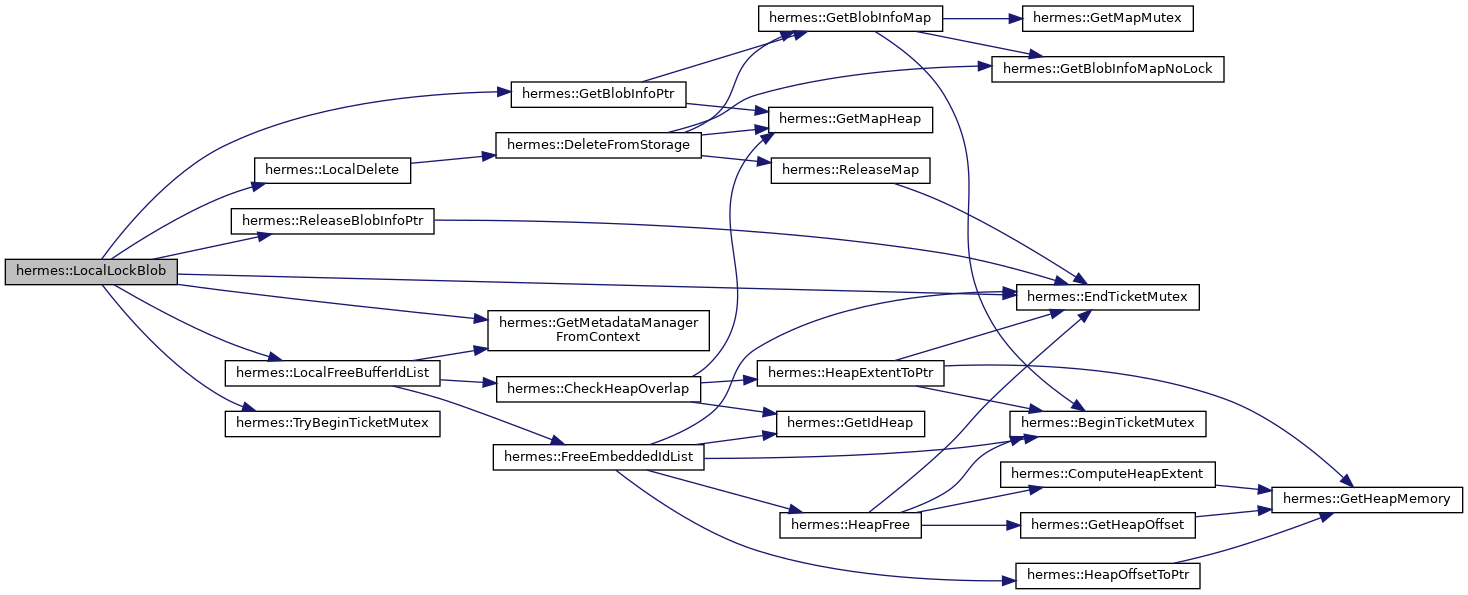

◆ LocalUnlockBlob()
| bool hermes::LocalUnlockBlob | ( | SharedMemoryContext * | context, |
| BlobID | blob_id | ||
| ) |
unlock BLOB locally


◆ GetPidTid()
◆ LockBlob()
| bool hermes::LockBlob | ( | SharedMemoryContext * | context, |
| RpcContext * | rpc, | ||
| BlobID | blob_id | ||
| ) |
lock BLOB
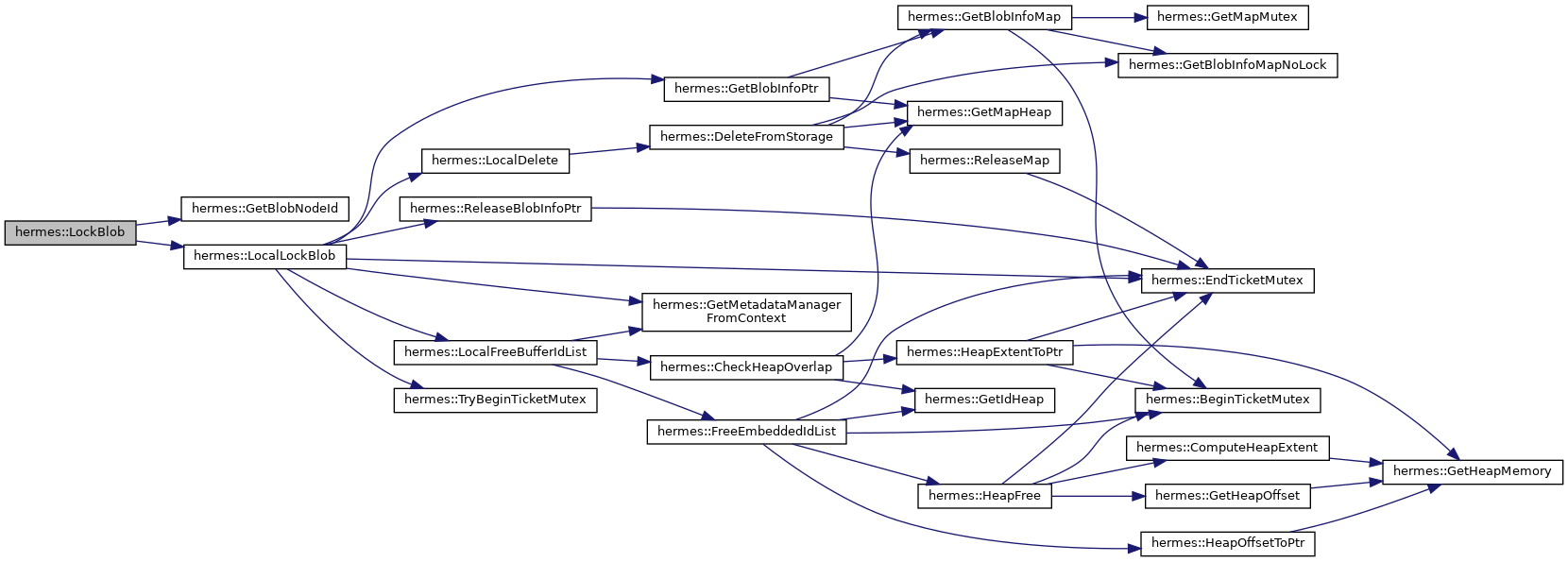

◆ UnlockBlob()
| bool hermes::UnlockBlob | ( | SharedMemoryContext * | context, |
| RpcContext * | rpc, | ||
| BlobID | blob_id | ||
| ) |
unlock BLOB


◆ MakeShmemString() [1/2]
| void hermes::MakeShmemString | ( | ShmemString * | sms, |
| u8 * | memory, | ||
| const char * | val, | ||
| u32 | size | ||
| ) |
make shared memory string

◆ MakeShmemString() [2/2]
| void hermes::MakeShmemString | ( | ShmemString * | sms, |
| u8 * | memory, | ||
| const std::string & | val | ||
| ) |
Creates a ShmemString with the value val at location memory.
- Precondition
- The address of
smsmust be lower thanmemorybecause theoffsetis from the beginning of the sms.
- Parameters
-
[out] sms The ShmemString instance to be filled out. memory The location in shared memory to store the val.val The string to store.

◆ GetShmemString()
| std::string hermes::GetShmemString | ( | ShmemString * | sms | ) |
Retrieves a ShmemString into a std::string
- Parameters
-
sms The ShmemString that represents the internal string
- Returns
- A newly allocated std::string containing a copy of the string from shared memory, or an empty std::string if the ShmemString is invalid.

◆ InitNeighborhoodTargets()
| void hermes::InitNeighborhoodTargets | ( | SharedMemoryContext * | context, |
| RpcContext * | rpc | ||
| ) |
initialize neighborhood targets


◆ BeginGlobalTicketMutex()
| void hermes::BeginGlobalTicketMutex | ( | SharedMemoryContext * | context, |
| RpcContext * | rpc | ||
| ) |
begin global ticket mutex
◆ EndGlobalTicketMutex()
| void hermes::EndGlobalTicketMutex | ( | SharedMemoryContext * | context, |
| RpcContext * | rpc | ||
| ) |
end global ticket mutex
◆ LocalBeginGlobalTicketMutex()
| void hermes::LocalBeginGlobalTicketMutex | ( | MetadataManager * | mdm | ) |
begin global ticket mutex locally
◆ LocalEndGlobalTicketMutex()
| void hermes::LocalEndGlobalTicketMutex | ( | MetadataManager * | mdm | ) |
end global ticket mutex locally
◆ IncrementBlobStats()
| void hermes::IncrementBlobStats | ( | SharedMemoryContext * | context, |
| RpcContext * | rpc, | ||
| BlobID | blob_id | ||
| ) |
increment BLOB stats

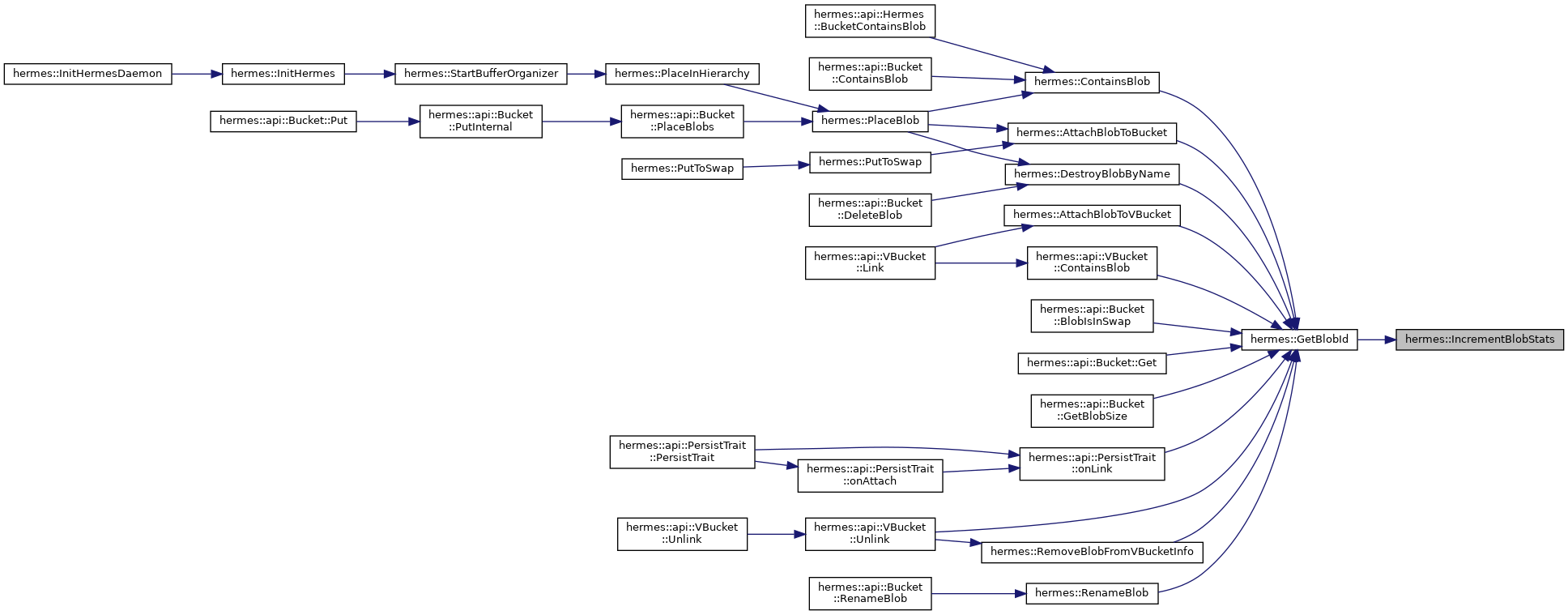
◆ LocalIncrementBlobStats()
| void hermes::LocalIncrementBlobStats | ( | MetadataManager * | mdm, |
| BlobID | blob_id | ||
| ) |
increment BLOB stats locally

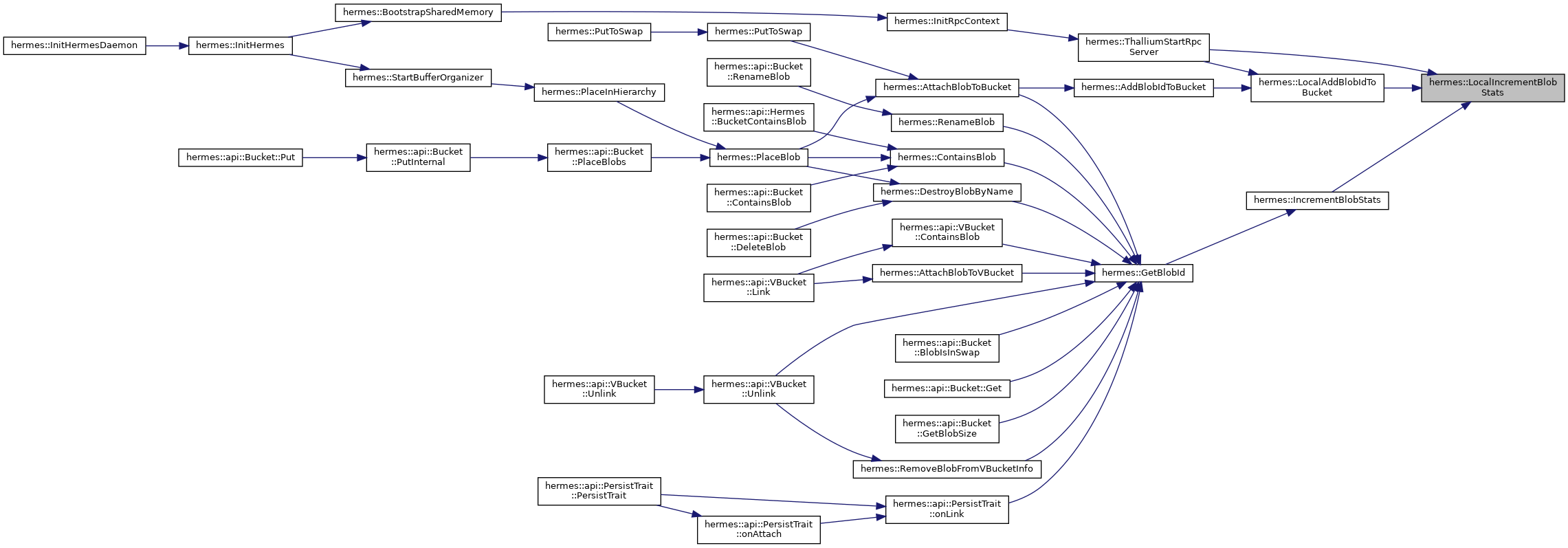
◆ LocalReplaceBlobIdInBucket()
| void hermes::LocalReplaceBlobIdInBucket | ( | SharedMemoryContext * | context, |
| BucketID | bucket_id, | ||
| BlobID | old_blob_id, | ||
| BlobID | new_blob_id | ||
| ) |
replace BLOB ID in bucket locally


◆ GetMapMutex()
| TicketMutex * hermes::GetMapMutex | ( | MetadataManager * | mdm, |
| MapType | map_type | ||
| ) |
get ticket mutex based on map_type
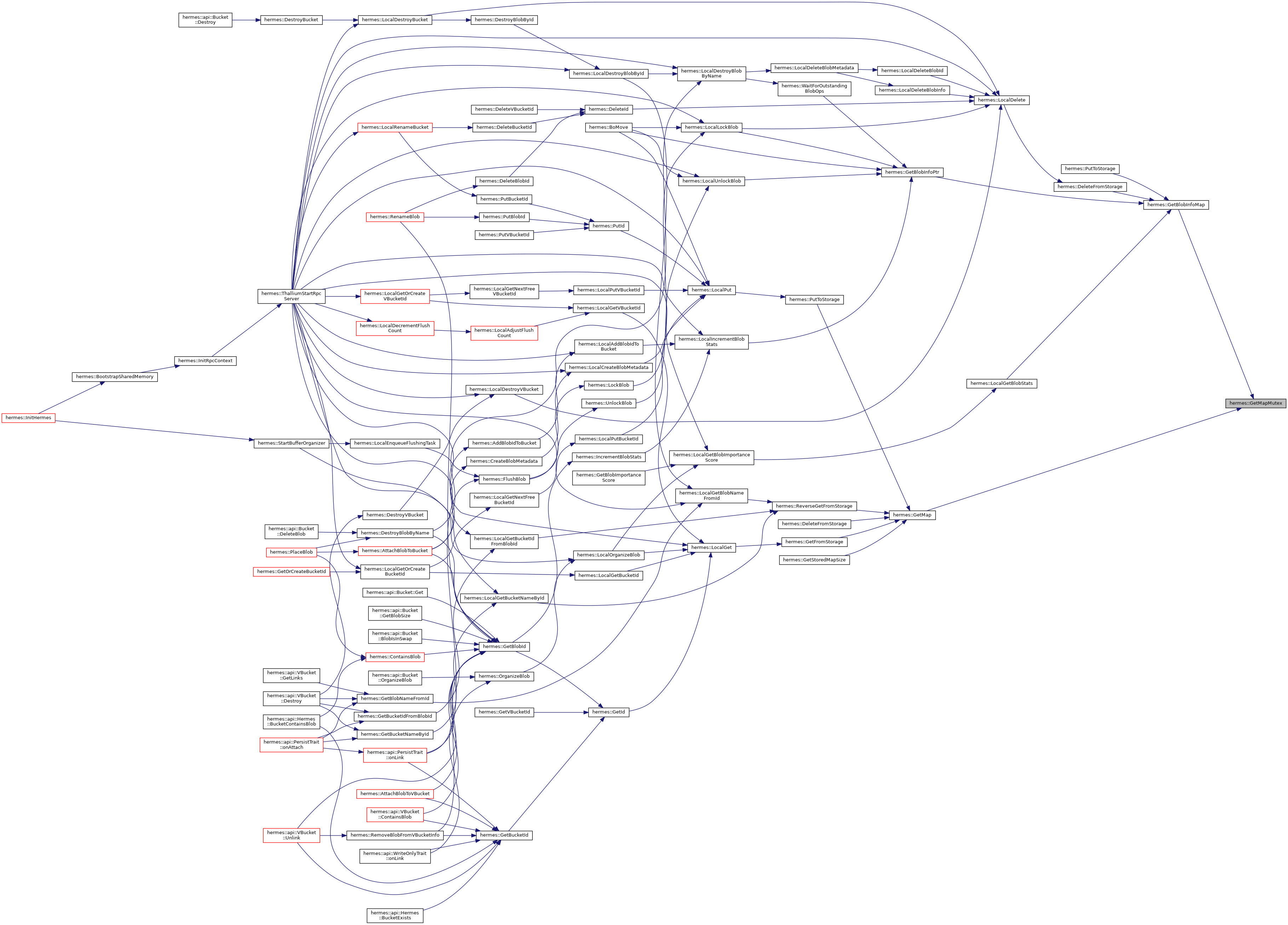
◆ LocalAddBlobIdToBucket()
| void hermes::LocalAddBlobIdToBucket | ( | MetadataManager * | mdm, |
| BucketID | bucket_id, | ||
| BlobID | blob_id, | ||
| bool | track_stats | ||
| ) |
add BLOB ID to bucket locally
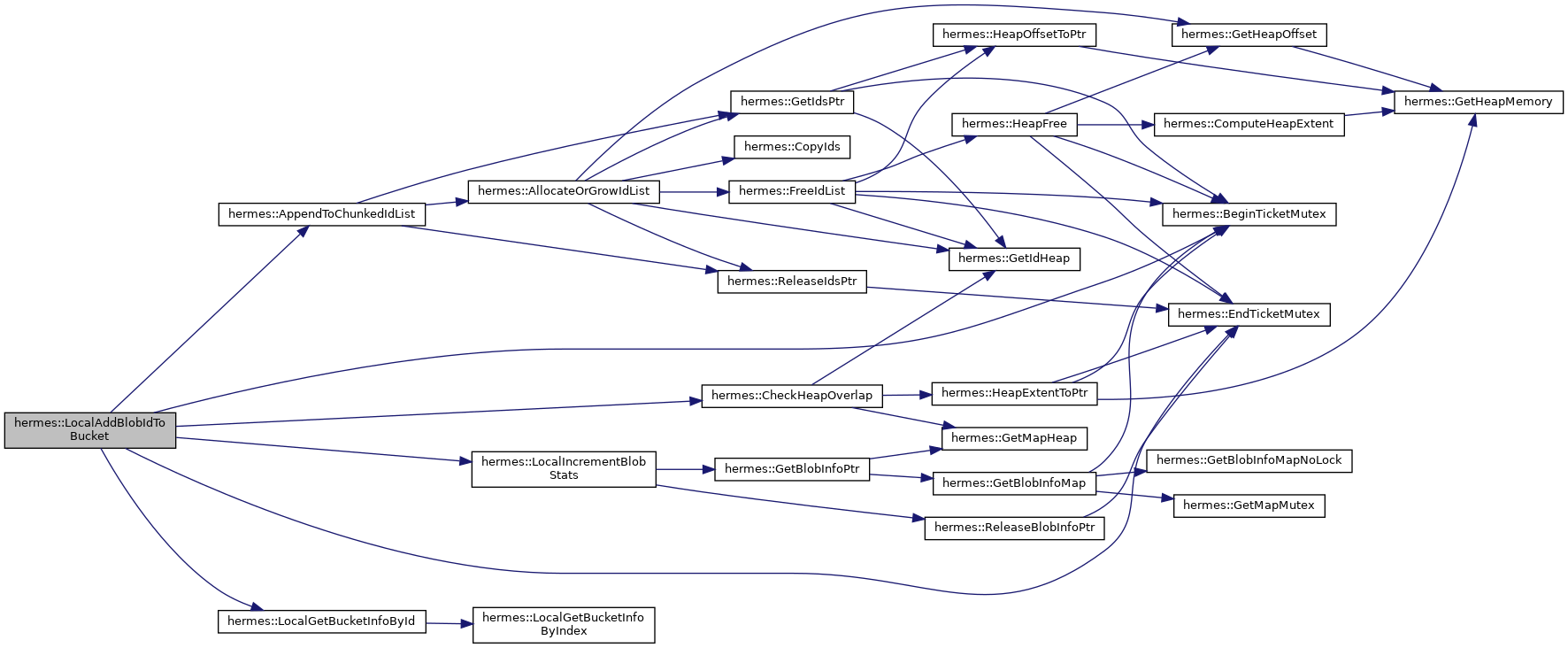

◆ LocalAddBlobIdToVBucket()
| void hermes::LocalAddBlobIdToVBucket | ( | MetadataManager * | mdm, |
| VBucketID | vbucket_id, | ||
| BlobID | blob_id | ||
| ) |
add BLOB ID to virtual bucket locally
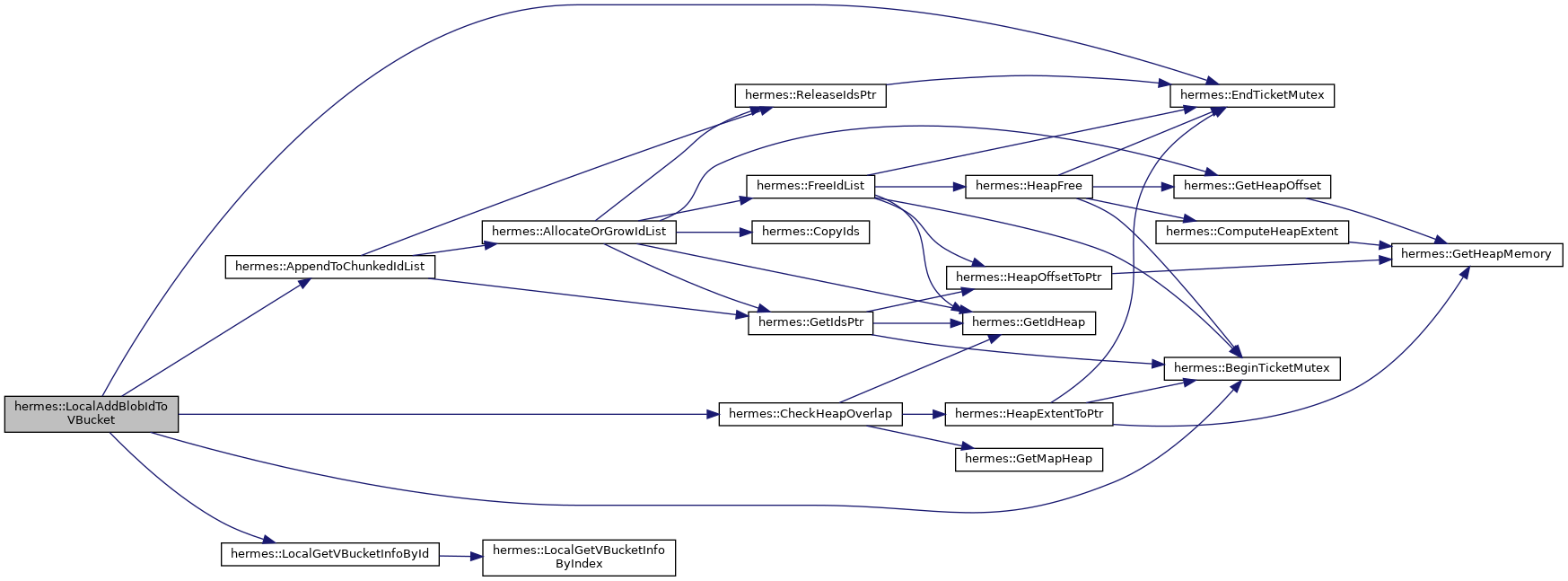

◆ LocalGetBufferIdList() [1/2]
| std::vector< BufferID > hermes::LocalGetBufferIdList | ( | MetadataManager * | mdm, |
| BlobID | blob_id | ||
| ) |
get buffer ID list locally


◆ LocalGetBufferIdList() [2/2]
| void hermes::LocalGetBufferIdList | ( | Arena * | arena, |
| MetadataManager * | mdm, | ||
| BlobID | blob_id, | ||
| BufferIdArray * | buffer_ids | ||
| ) |
get buffer ID list into buffer_ids locally

◆ LocalFreeBufferIdList()
| void hermes::LocalFreeBufferIdList | ( | SharedMemoryContext * | context, |
| BlobID | blob_id | ||
| ) |
free buffer ID list locally


◆ LocalDestroyBucket()
| bool hermes::LocalDestroyBucket | ( | SharedMemoryContext * | context, |
| RpcContext * | rpc, | ||
| const char * | bucket_name, | ||
| BucketID | bucket_id | ||
| ) |
destroy bucket locally
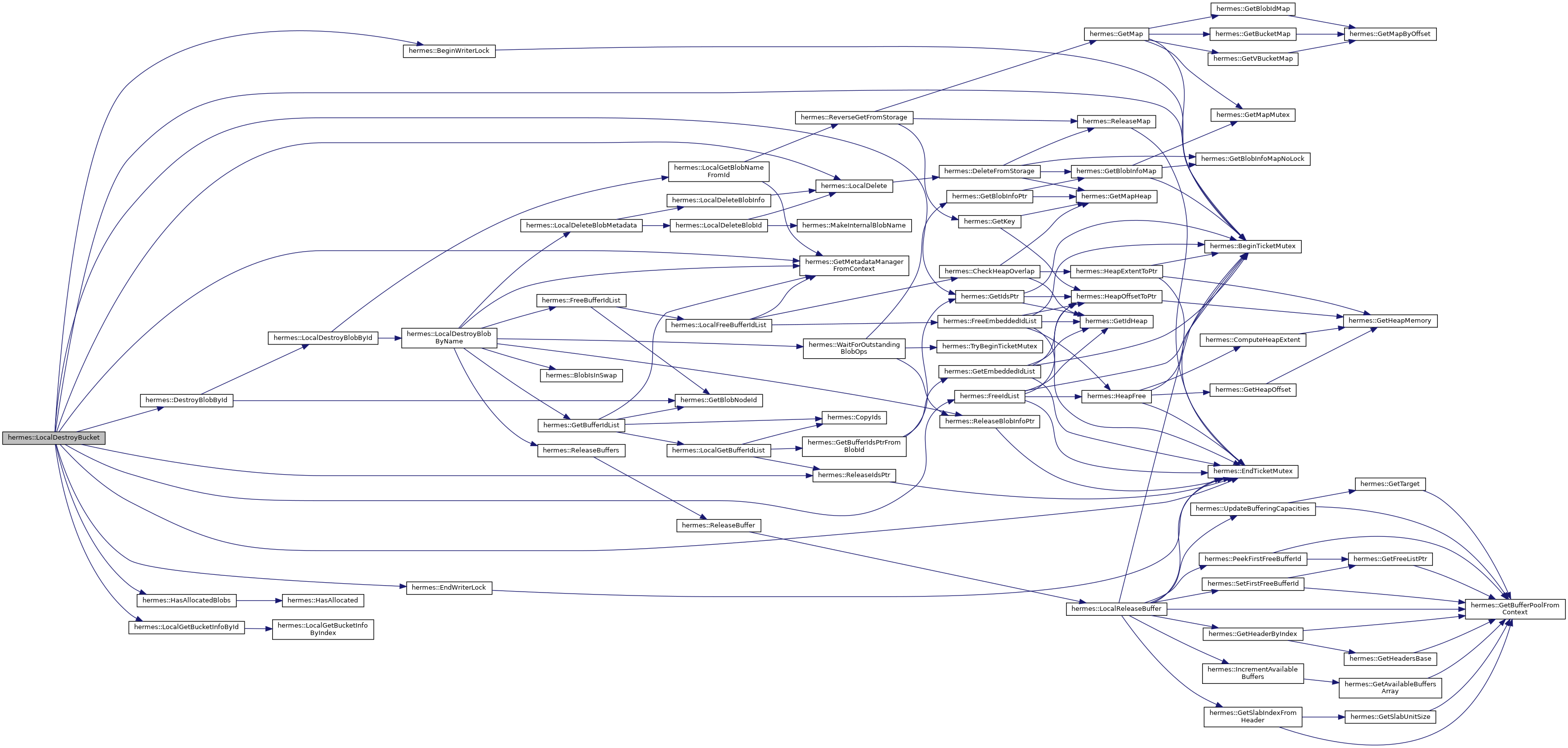

◆ LocalDestroyVBucket()
| bool hermes::LocalDestroyVBucket | ( | SharedMemoryContext * | context, |
| const char * | vbucket_name, | ||
| VBucketID | vbucket_id | ||
| ) |
destroy virtual bucket locally
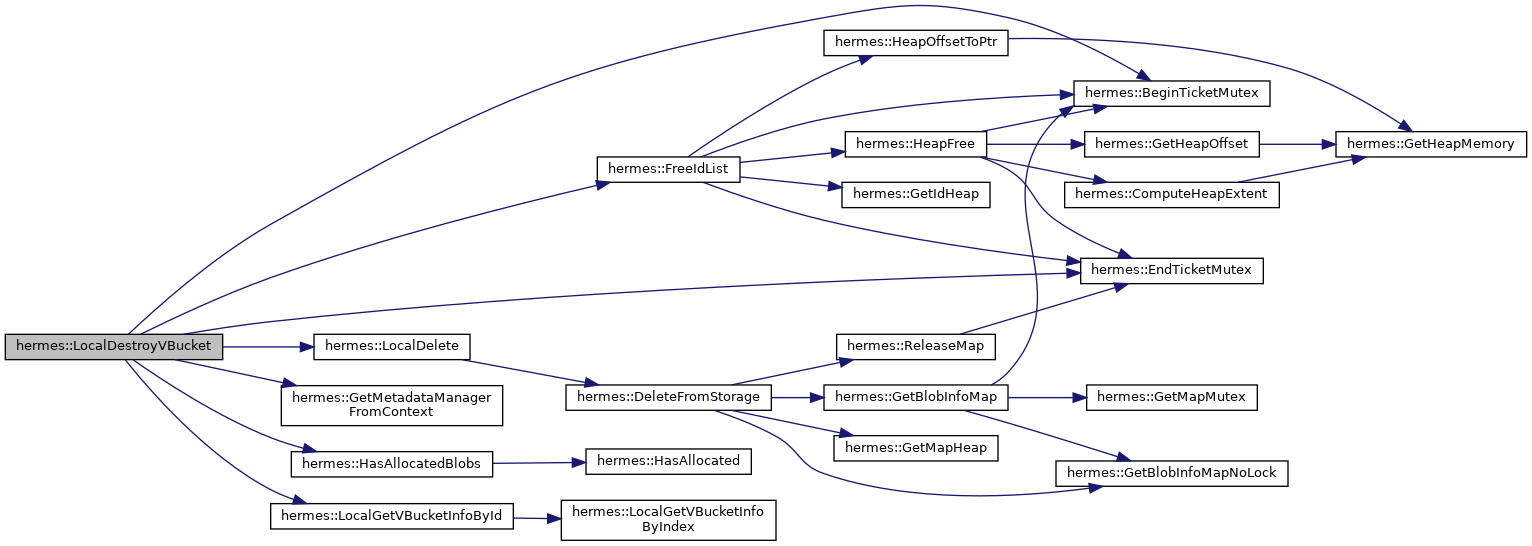

◆ LocalAllocateBufferIdList()
| u32 hermes::LocalAllocateBufferIdList | ( | MetadataManager * | mdm, |
| const std::vector< BufferID > & | buffer_ids | ||
| ) |
allocate buffer ID list locally
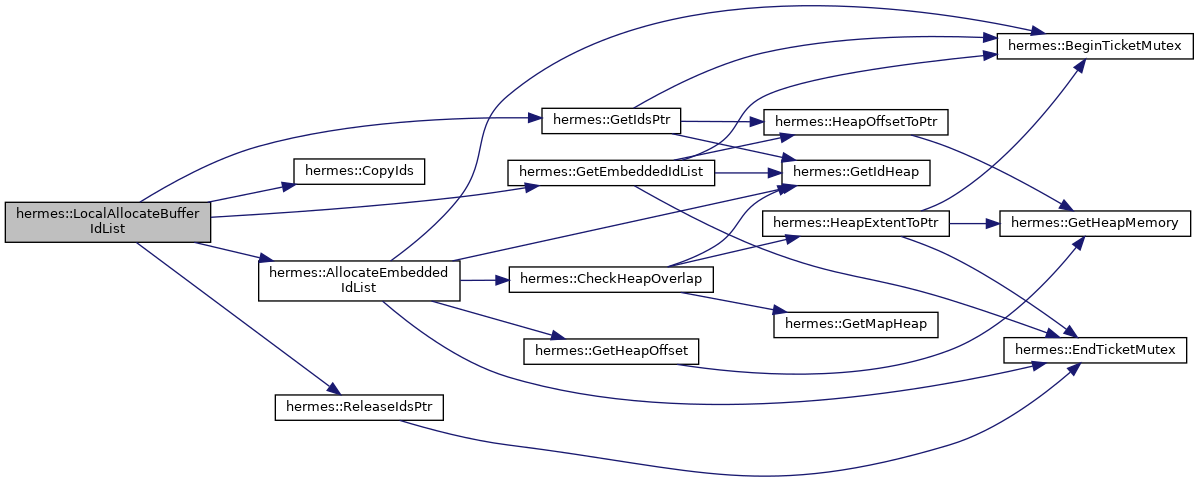

◆ LocalContainsBlob()
| bool hermes::LocalContainsBlob | ( | SharedMemoryContext * | context, |
| BucketID | bucket_id, | ||
| BlobID | blob_id | ||
| ) |
does bucket_id contain blob_id BLOB locally?


◆ LocalRemoveBlobFromBucketInfo()
| void hermes::LocalRemoveBlobFromBucketInfo | ( | SharedMemoryContext * | context, |
| BucketID | bucket_id, | ||
| BlobID | blob_id | ||
| ) |
remove BLOB from bucket locally


◆ StartGlobalSystemViewStateUpdateThread()
| void hermes::StartGlobalSystemViewStateUpdateThread | ( | SharedMemoryContext * | context, |
| RpcContext * | rpc, | ||
| Arena * | arena, | ||
| double | sleep_ms | ||
| ) |
start global system view state update thread


◆ InitMetadataStorage()
| void hermes::InitMetadataStorage | ( | SharedMemoryContext * | context, |
| MetadataManager * | mdm, | ||
| Arena * | arena, | ||
| Config * | config | ||
| ) |
initialize metadata storage
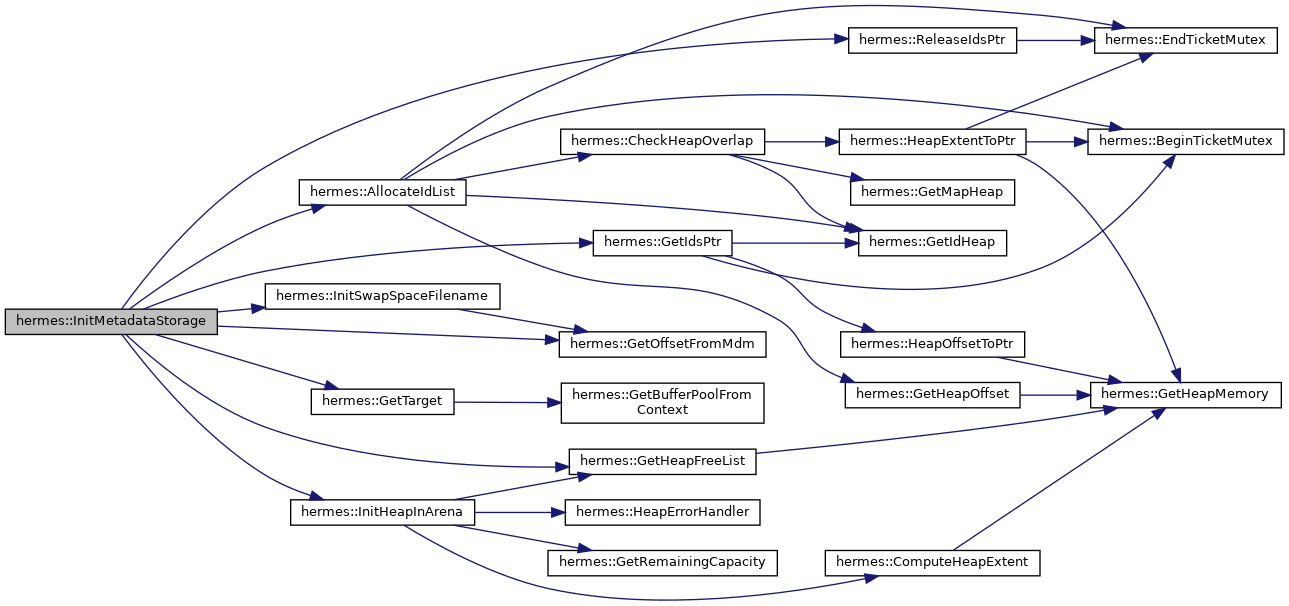

◆ LocalGetBlobIds()
| std::vector< BlobID > hermes::LocalGetBlobIds | ( | SharedMemoryContext * | context, |
| BucketID | bucket_id | ||
| ) |
get BLOB IDs locally


◆ LocalGetNodeTargets()
| std::vector< TargetID > hermes::LocalGetNodeTargets | ( | SharedMemoryContext * | context | ) |
get node targets locally


◆ LocalGetBlobImportanceScore()
| f32 hermes::LocalGetBlobImportanceScore | ( | SharedMemoryContext * | context, |
| BlobID | blob_id | ||
| ) |
get BLOB's importance score locally


◆ LocalRemoveBlobFromVBucketInfo()
| void hermes::LocalRemoveBlobFromVBucketInfo | ( | SharedMemoryContext * | context, |
| VBucketID | vbucket_id, | ||
| BlobID | blob_id | ||
| ) |
remove BLOB from virtual bucket locally


◆ LocalGetBlobsFromVBucketInfo()
| std::vector< BlobID > hermes::LocalGetBlobsFromVBucketInfo | ( | SharedMemoryContext * | context, |
| VBucketID | vbucket_id | ||
| ) |
get BLOBs from virtual bucket information locally


◆ GetIdHeap()
| Heap * hermes::GetIdHeap | ( | MetadataManager * | mdm | ) |
get ID heap
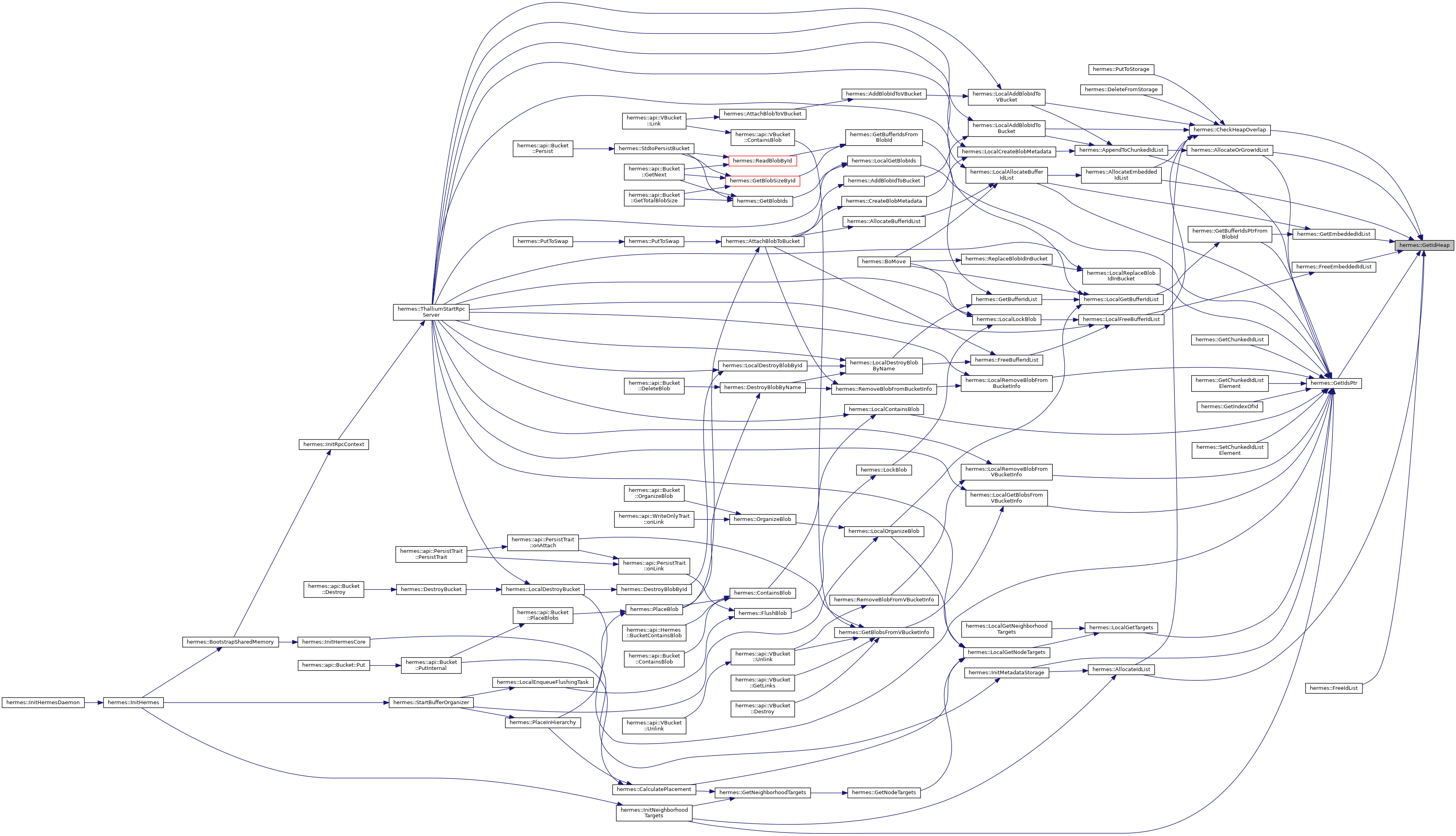
◆ GetMapHeap()
| Heap * hermes::GetMapHeap | ( | MetadataManager * | mdm | ) |
get map heap
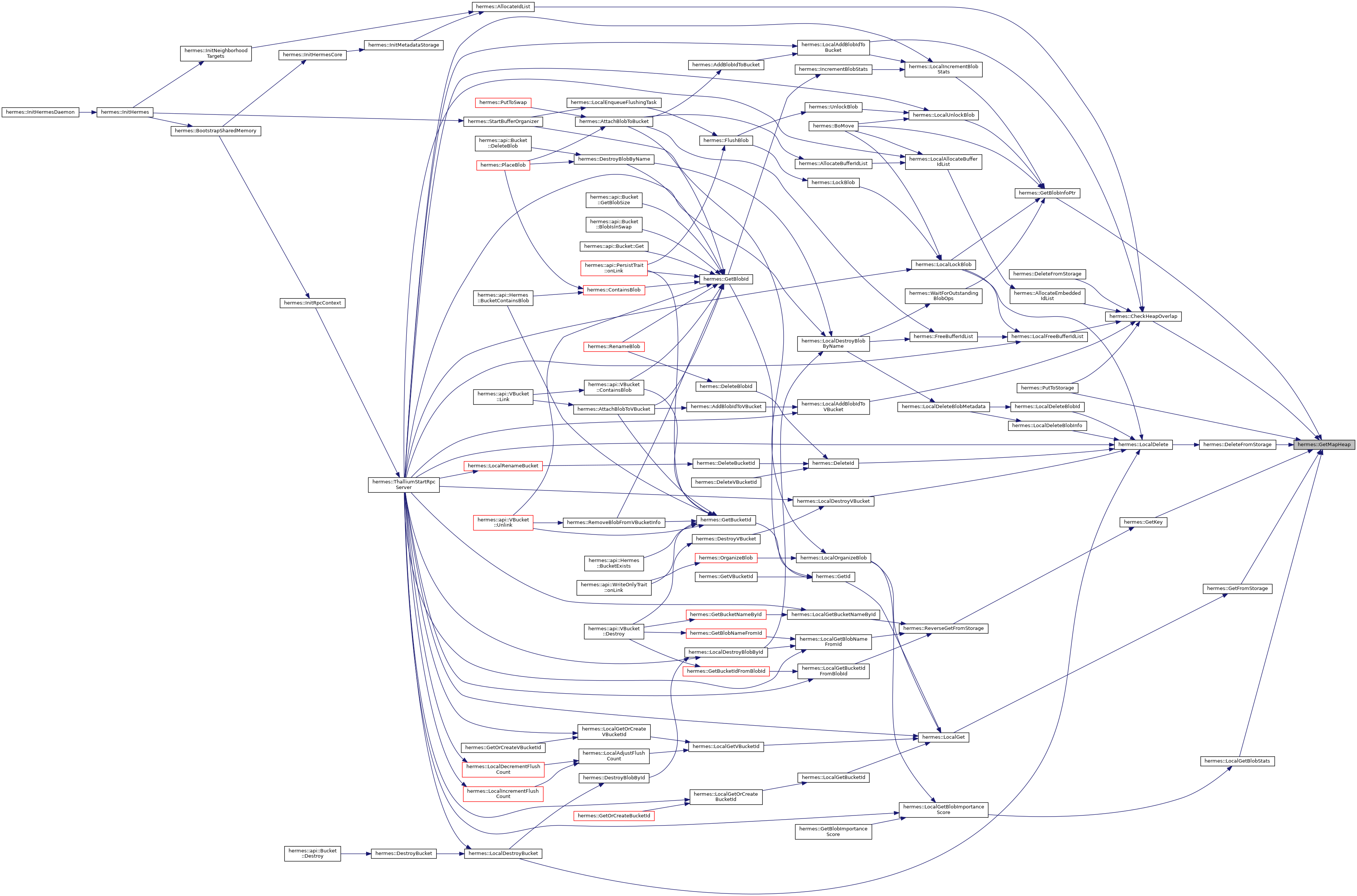
◆ AllocateIdList()
| IdList hermes::AllocateIdList | ( | MetadataManager * | mdm, |
| u32 | length | ||
| ) |
allocate ID list


◆ FreeIdList() [1/2]
| void hermes::FreeIdList | ( | MetadataManager * | mdm, |
| IdList | id_list | ||
| ) |
free id_list ID list


◆ AppendToChunkedIdList()
| u32 hermes::AppendToChunkedIdList | ( | MetadataManager * | mdm, |
| ChunkedIdList * | id_list, | ||
| u64 | id | ||
| ) |
Assumes the caller has protected id_list with a lock.
- Returns
- The index of the appended
id.


◆ PutToStorage() [1/2]
| void hermes::PutToStorage | ( | MetadataManager * | mdm, |
| const char * | key, | ||
| u64 | val, | ||
| MapType | map_type | ||
| ) |
put map_type to storage
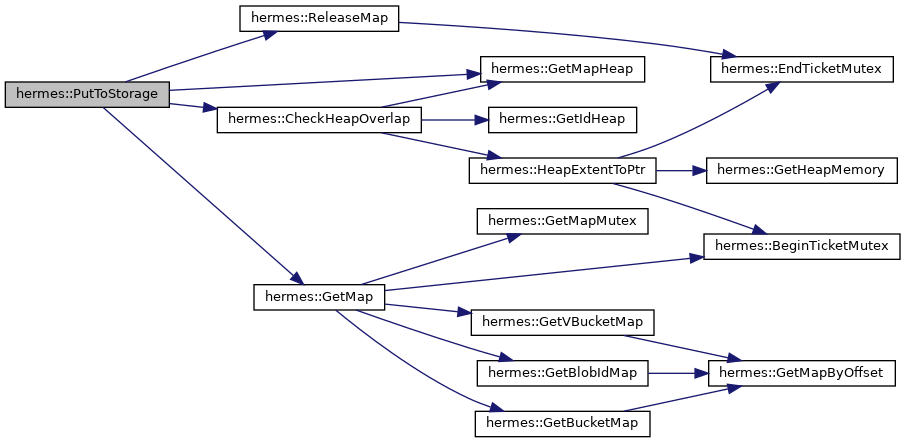

◆ PutToStorage() [2/2]
| void hermes::PutToStorage | ( | MetadataManager * | mdm, |
| BlobID | key, | ||
| const BlobInfo & | val | ||
| ) |
put to storage

◆ GetFromStorage()
| u64 hermes::GetFromStorage | ( | MetadataManager * | mdm, |
| const char * | key, | ||
| MapType | map_type | ||
| ) |
get from storage

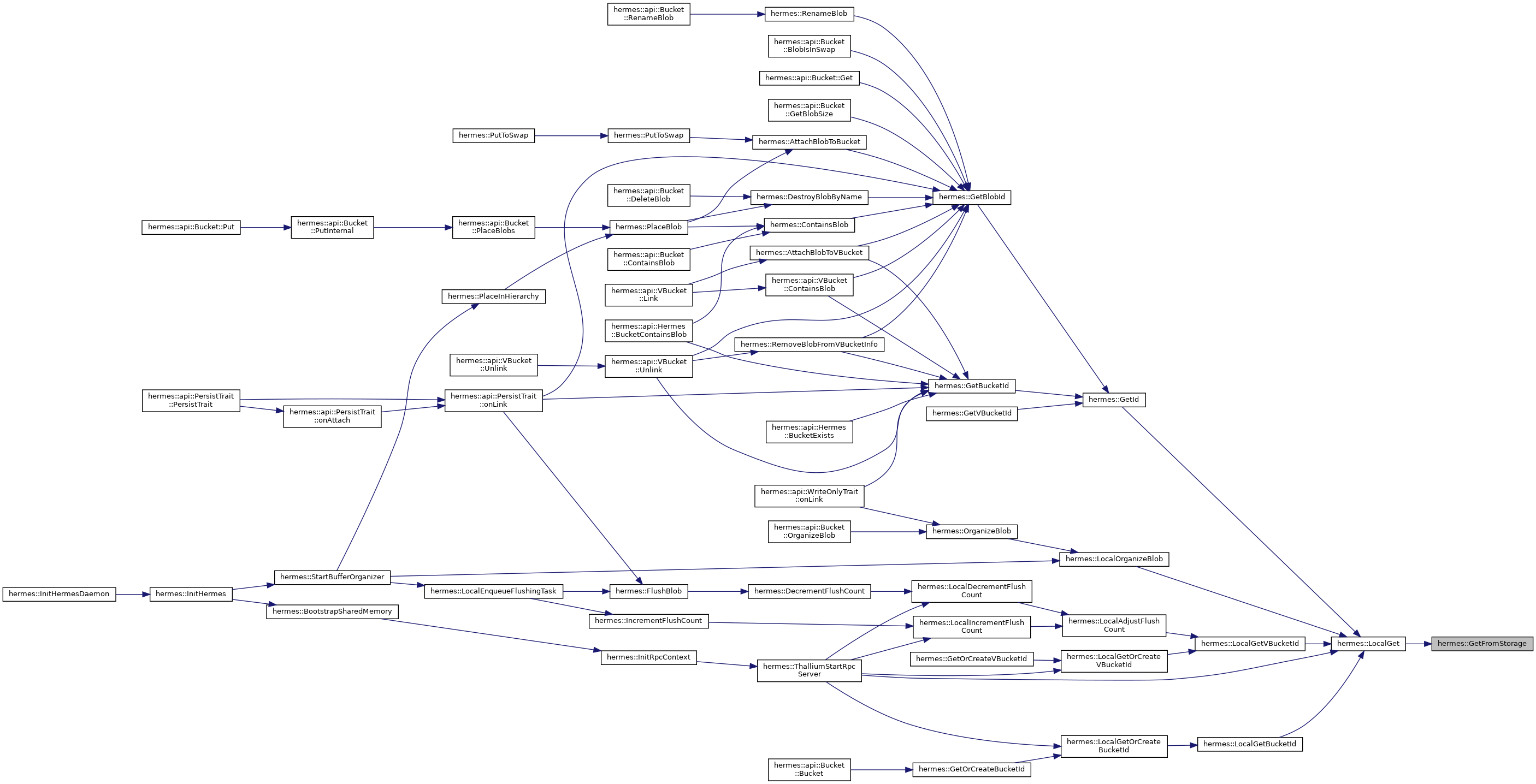
◆ ReverseGetFromStorage()
| std::string hermes::ReverseGetFromStorage | ( | MetadataManager * | mdm, |
| u64 | id, | ||
| MapType | map_type | ||
| ) |
reverse the get from storage operation
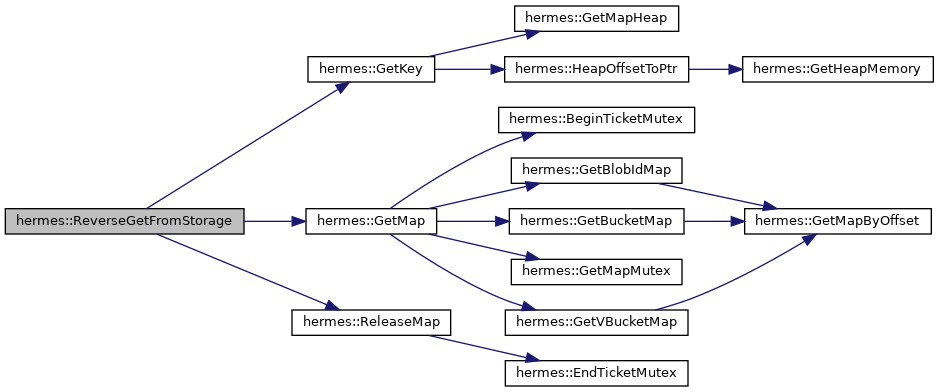

◆ DeleteFromStorage() [1/2]
| void hermes::DeleteFromStorage | ( | MetadataManager * | mdm, |
| BlobID | key, | ||
| bool | lock | ||
| ) |
delete from storage


◆ DeleteFromStorage() [2/2]
| void hermes::DeleteFromStorage | ( | MetadataManager * | mdm, |
| const char * | key, | ||
| MapType | map_type | ||
| ) |
delete map_type from storage
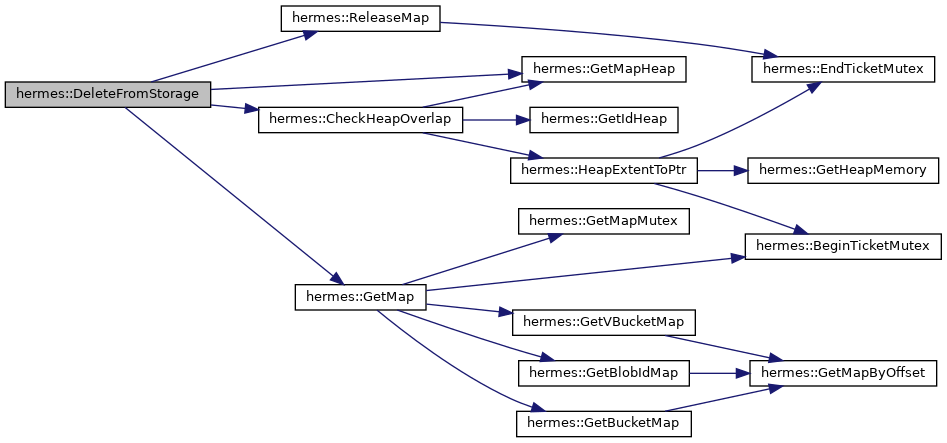
◆ HashStringForStorage()
| u32 hermes::HashStringForStorage | ( | MetadataManager * | mdm, |
| RpcContext * | rpc, | ||
| const char * | str | ||
| ) |
generate hash string for storage
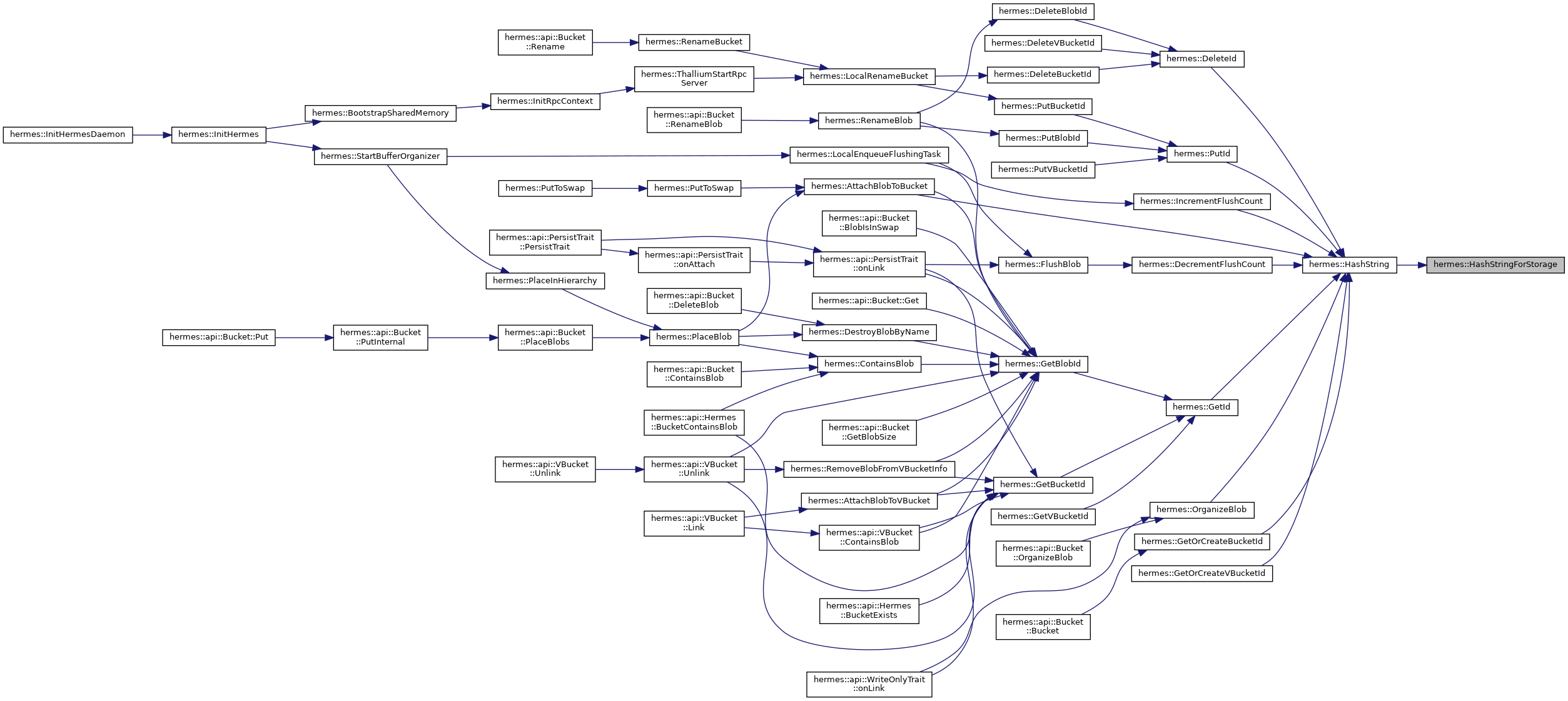
◆ SeedHashForStorage()
| void hermes::SeedHashForStorage | ( | size_t | seed | ) |
seed hash for storage

◆ GetStoredMapSize()
| size_t hermes::GetStoredMapSize | ( | MetadataManager * | mdm, |
| MapType | map_type | ||
| ) |
get the size of stored map

◆ LocalGetNeighborhoodTargets()
| std::vector< TargetID > hermes::LocalGetNeighborhoodTargets | ( | SharedMemoryContext * | context | ) |
get neighborhood targets locally

◆ GetBlobInfoPtr()
| BlobInfo * hermes::GetBlobInfoPtr | ( | MetadataManager * | mdm, |
| BlobID | blob_id | ||
| ) |
Takes a lock on mdm->blob_info_map_mutex. Requires a corresponding ReleaseBlobInfoPtr call.

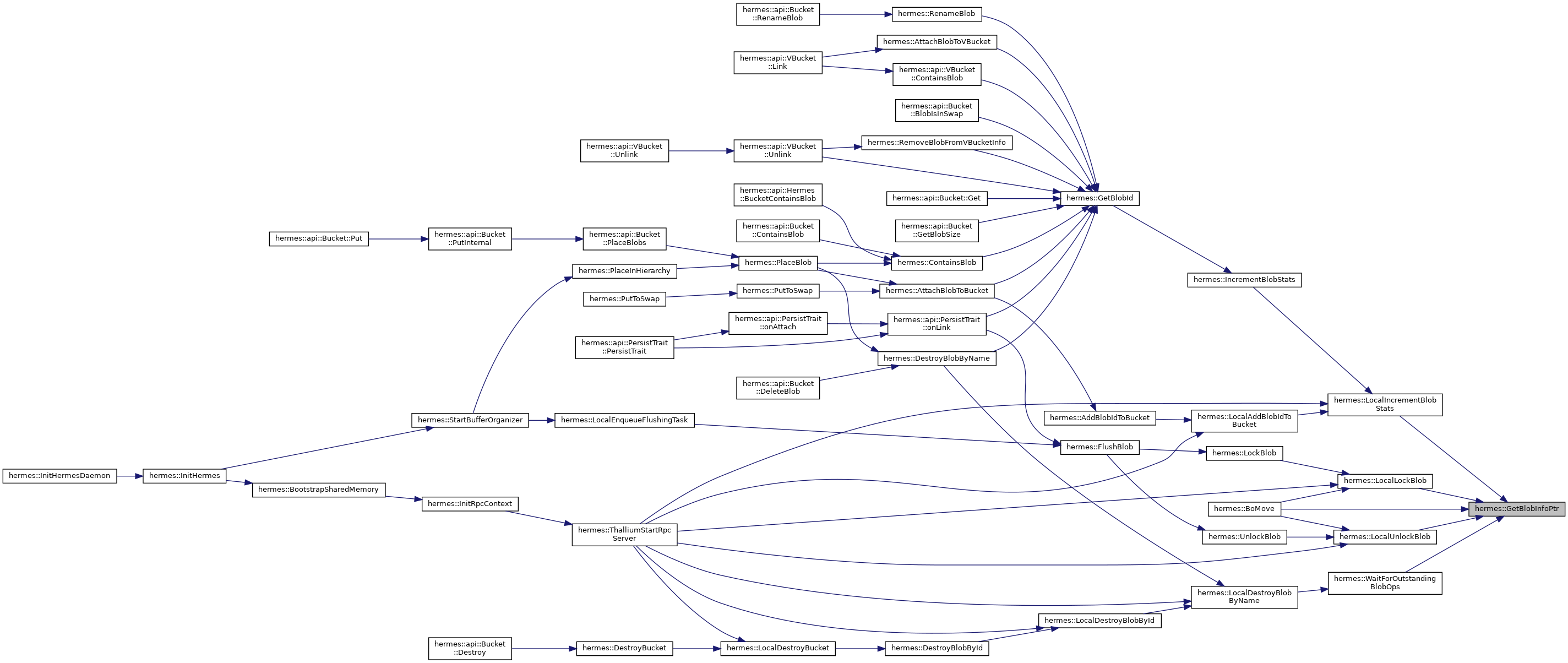
◆ ReleaseBlobInfoPtr()
| void hermes::ReleaseBlobInfoPtr | ( | MetadataManager * | mdm | ) |
release pointer to BLOB information

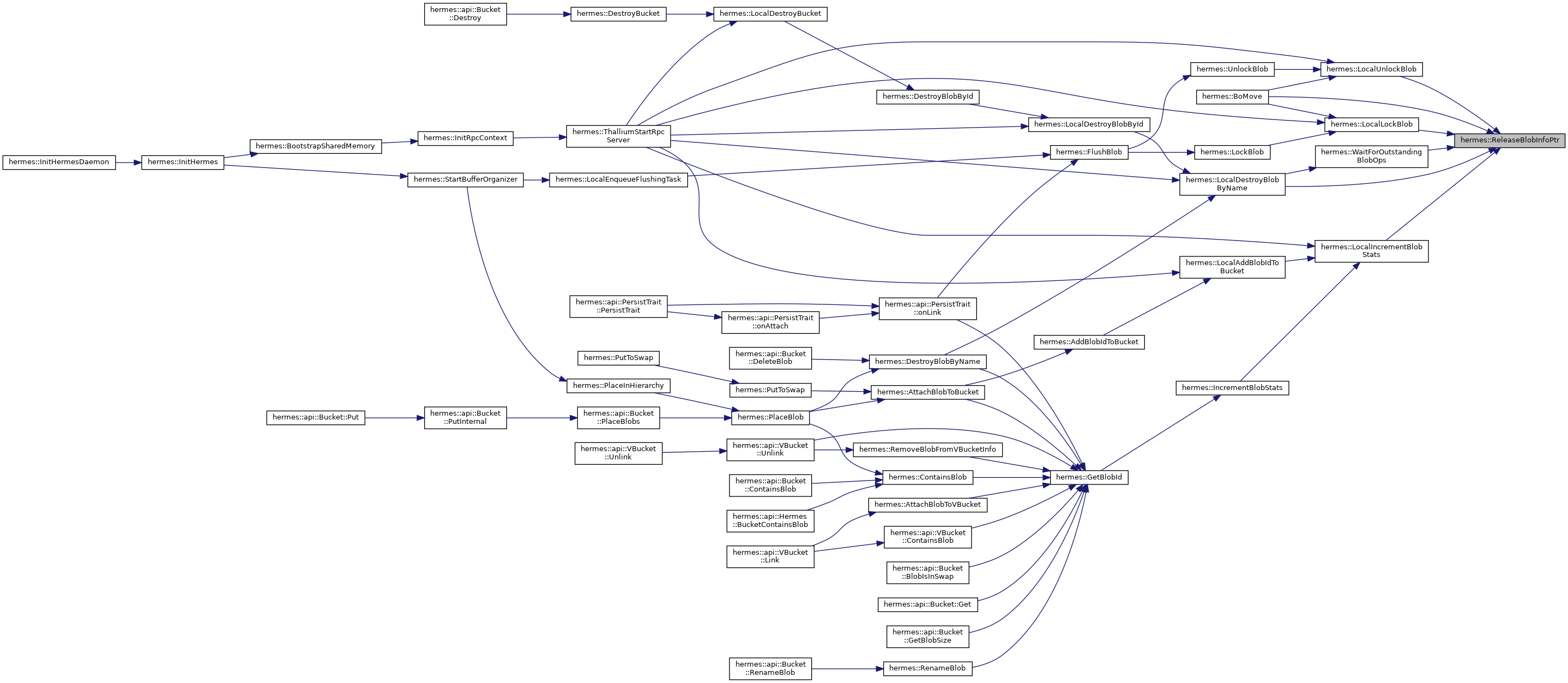
◆ GetIdsPtr() [1/2]
| u64 * hermes::GetIdsPtr | ( | MetadataManager * | mdm, |
| IdList | id_list | ||
| ) |
Return a pointer to the internal array of IDs that the id_list represents.
This call acquires a lock, and must be paired with a corresponding call to ReleaseIdsPtr to release the lock.

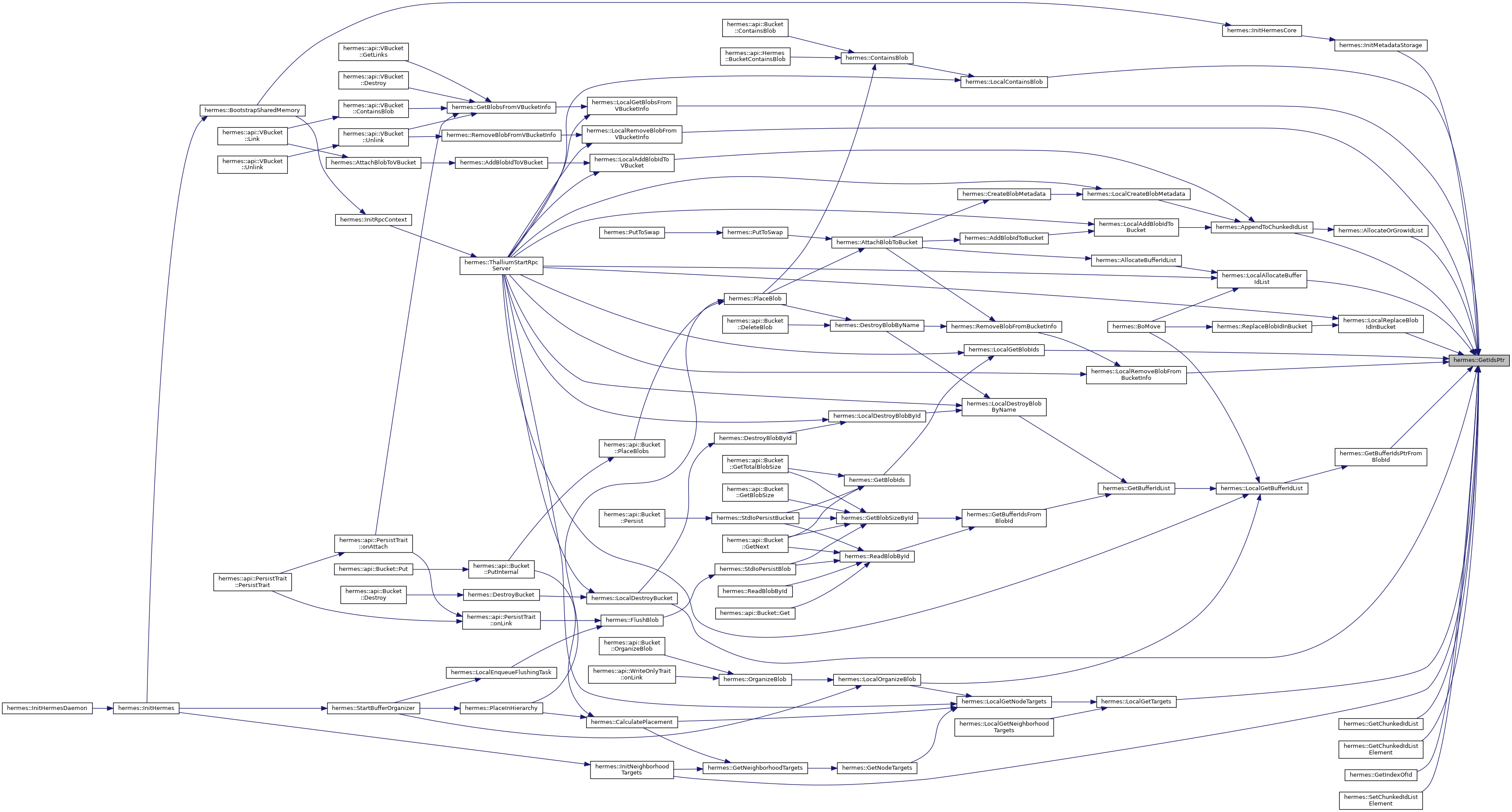
◆ GetIdsPtr() [2/2]
| u64 * hermes::GetIdsPtr | ( | MetadataManager * | mdm, |
| ChunkedIdList | id_list | ||
| ) |
get pointer to the internal array of IDs that the chucked id_list represents

◆ ReleaseIdsPtr()
| void hermes::ReleaseIdsPtr | ( | MetadataManager * | mdm | ) |
release IDs pointer

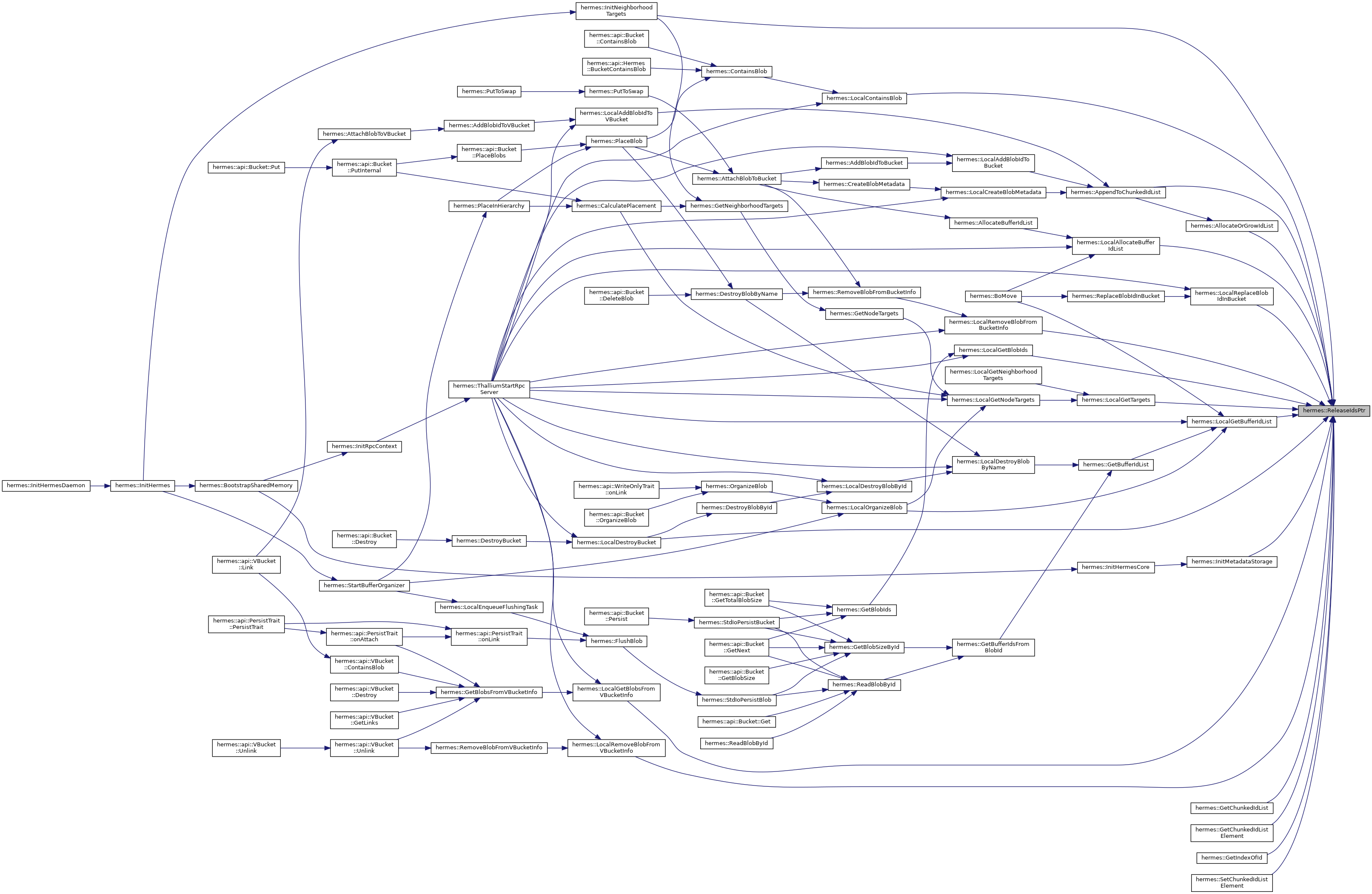
◆ GetChunkedIdList()
| std::vector< u64 > hermes::GetChunkedIdList | ( | MetadataManager * | mdm, |
| ChunkedIdList | id_list | ||
| ) |
Assumes the caller has protected id_list with a lock.
- Returns
- A vector of the IDs.

◆ GetMapByOffset()
|
static |
get map by offset
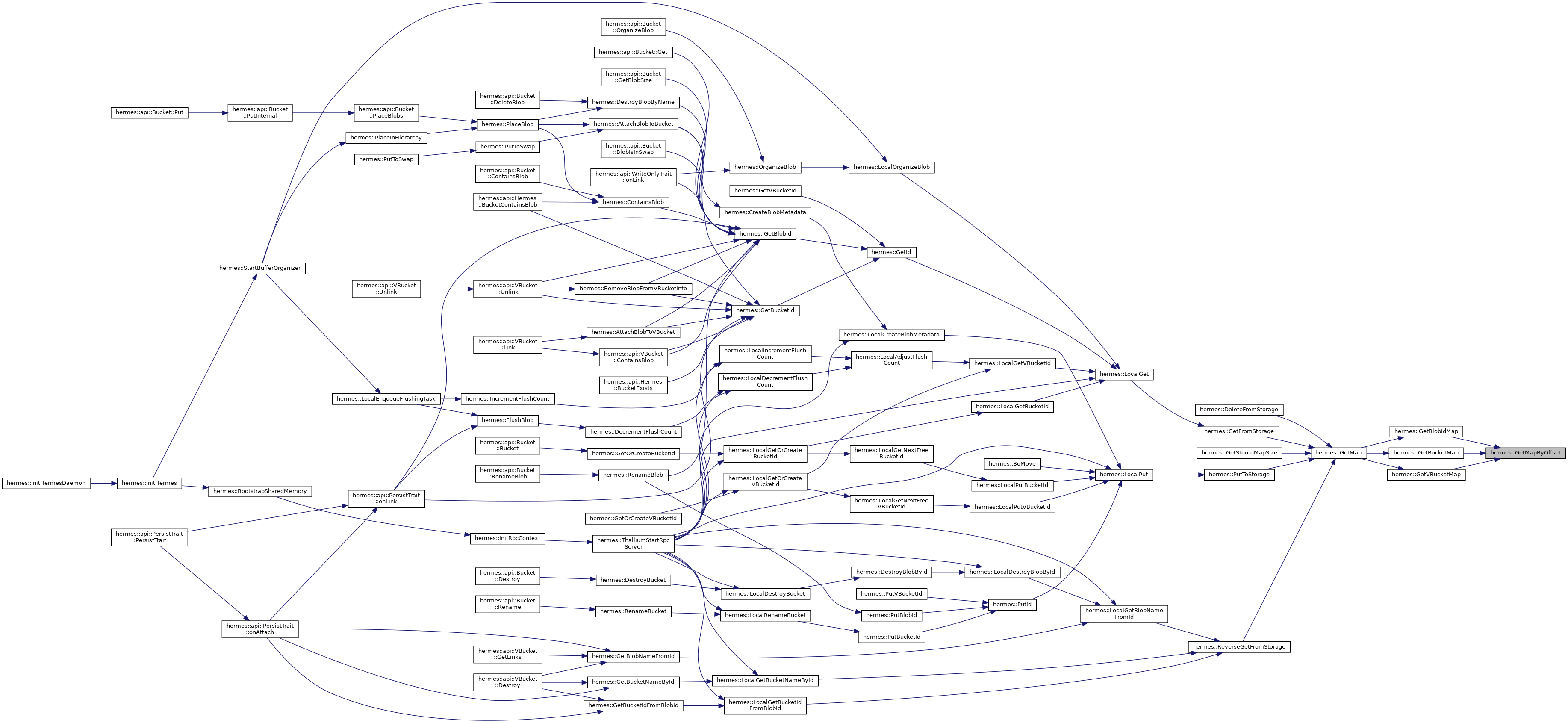
◆ GetBucketMap()
|
static |
get bucket map

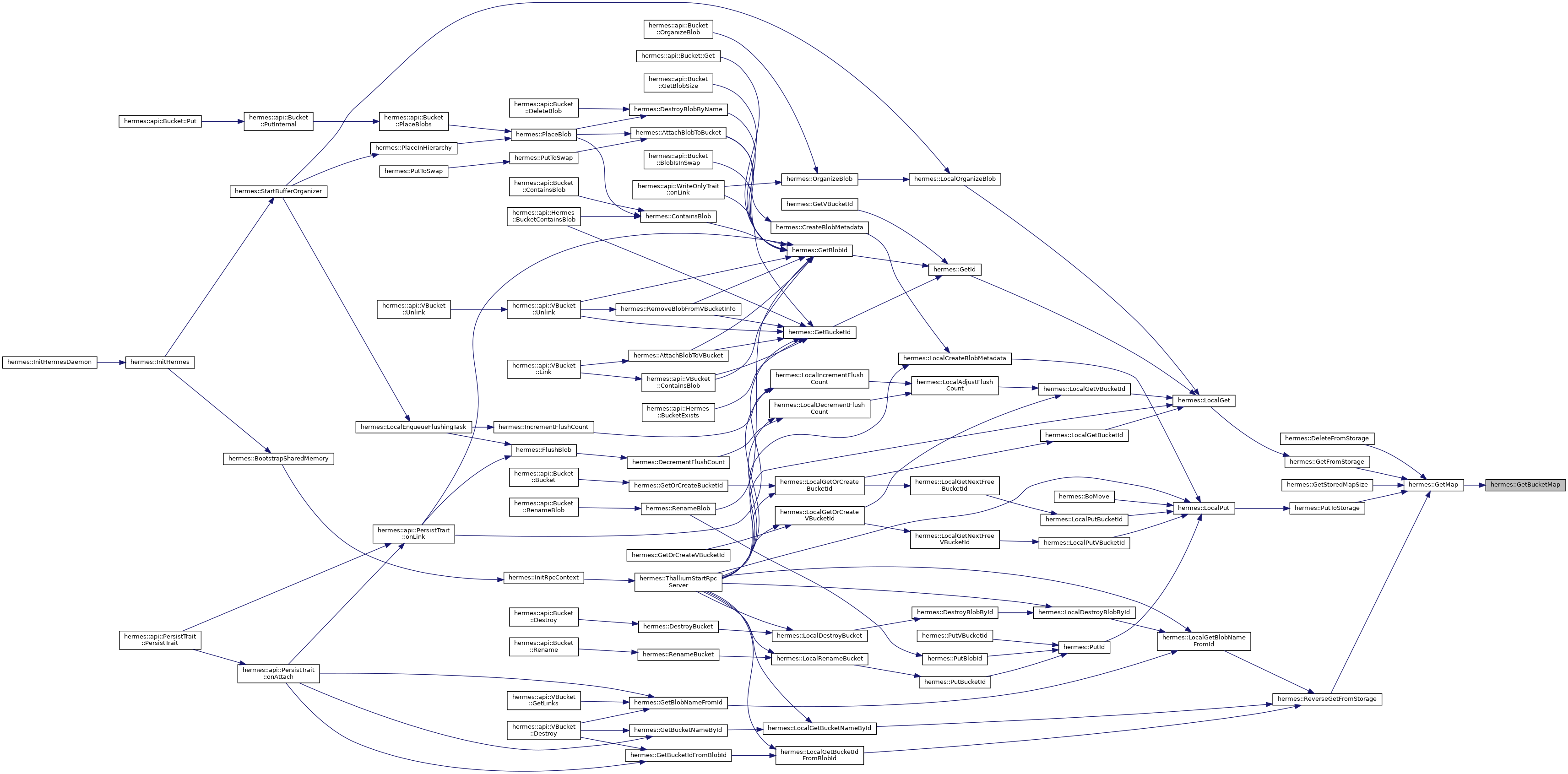
◆ GetVBucketMap()
|
static |
get virtual bucket map

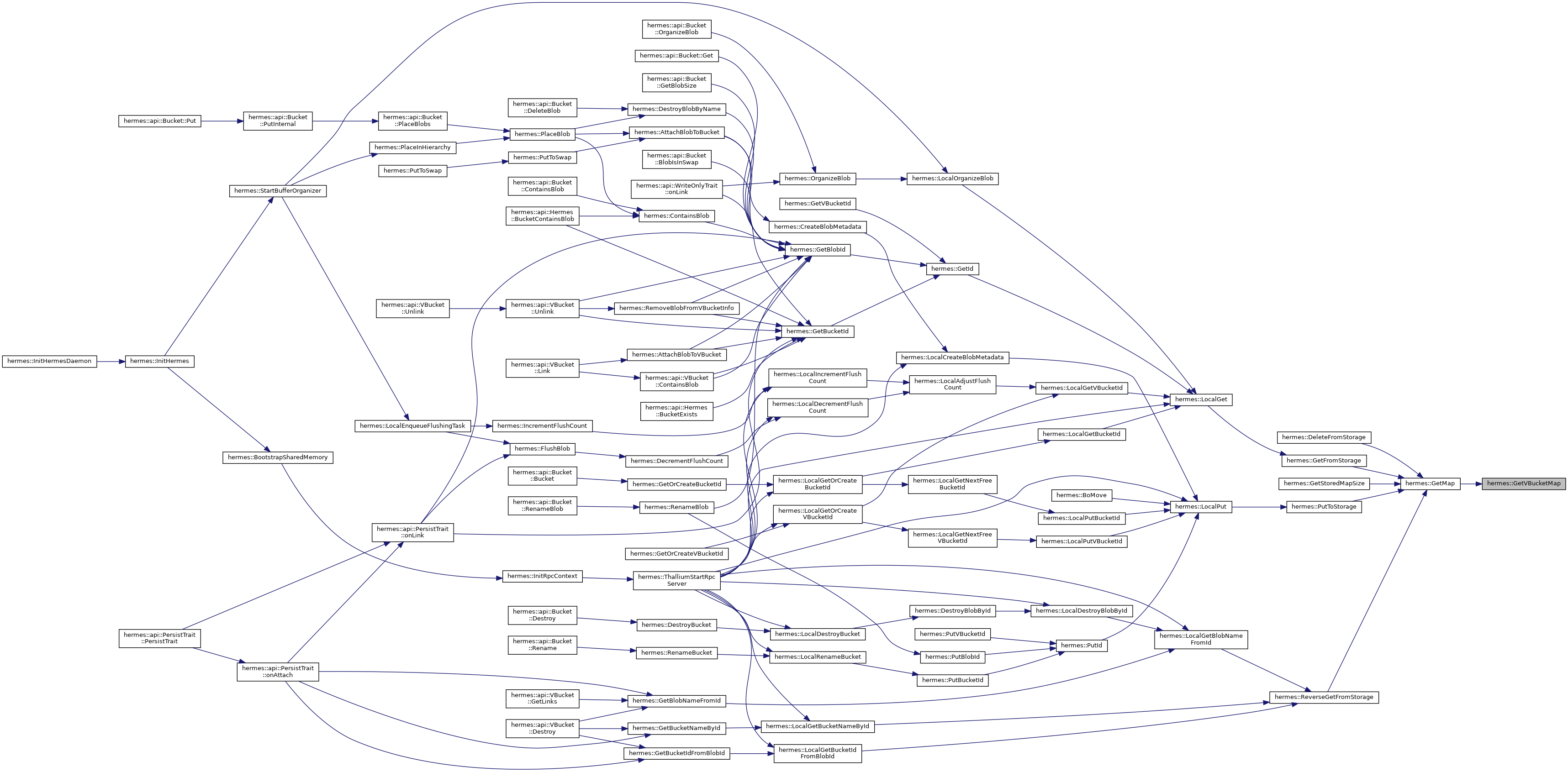
◆ GetBlobIdMap()
|
static |
get BLOB ID map

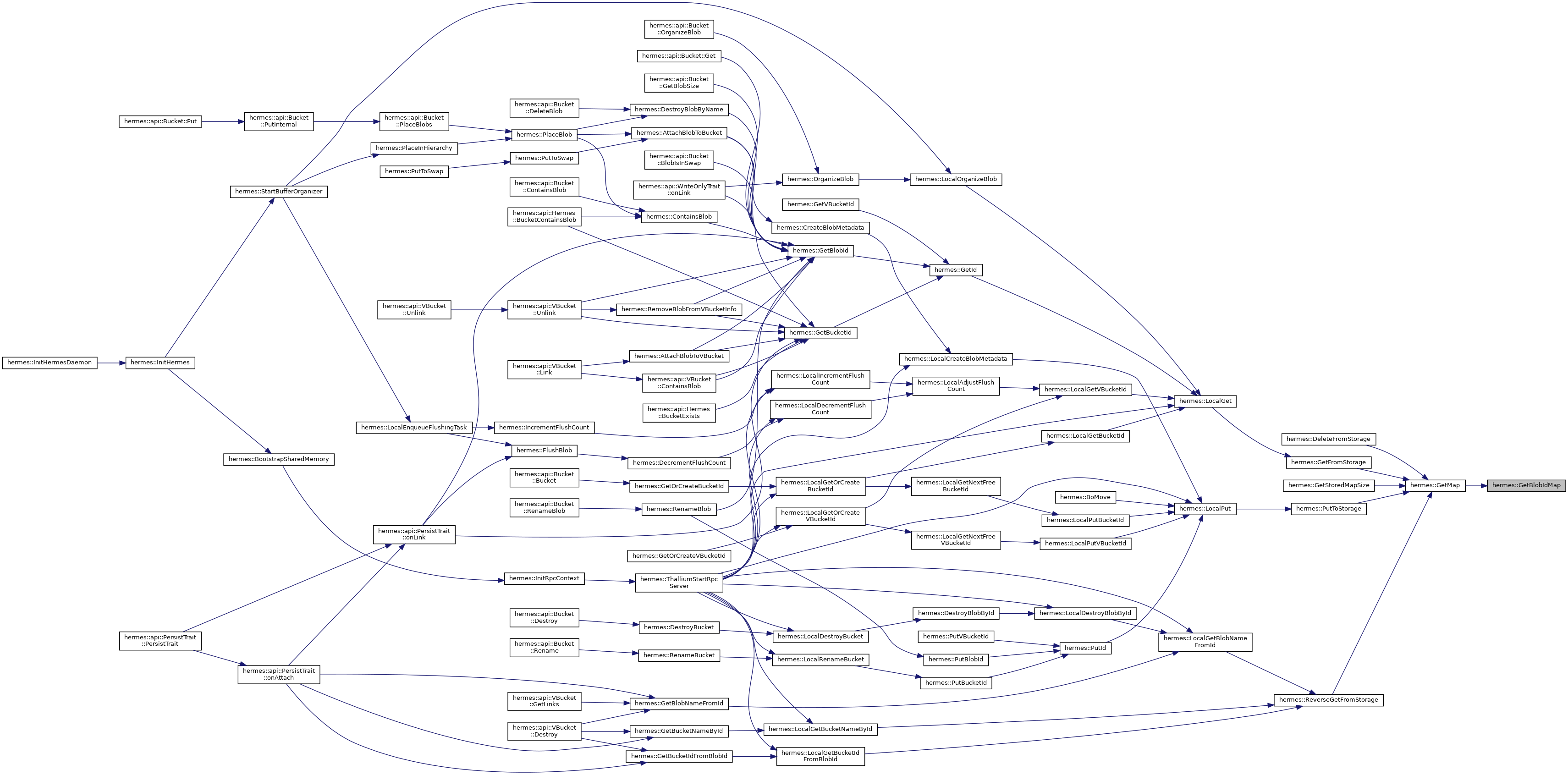
◆ CheckHeapOverlap()
| void hermes::CheckHeapOverlap | ( | MetadataManager * | mdm | ) |
check if heap overlaps


◆ GetMap()
| IdMap* hermes::GetMap | ( | MetadataManager * | mdm, |
| MapType | map_type | ||
| ) |
◆ GetBlobInfoMapNoLock()
| BlobInfoMap* hermes::GetBlobInfoMapNoLock | ( | MetadataManager * | mdm | ) |
get BLOB information map without mutex locking
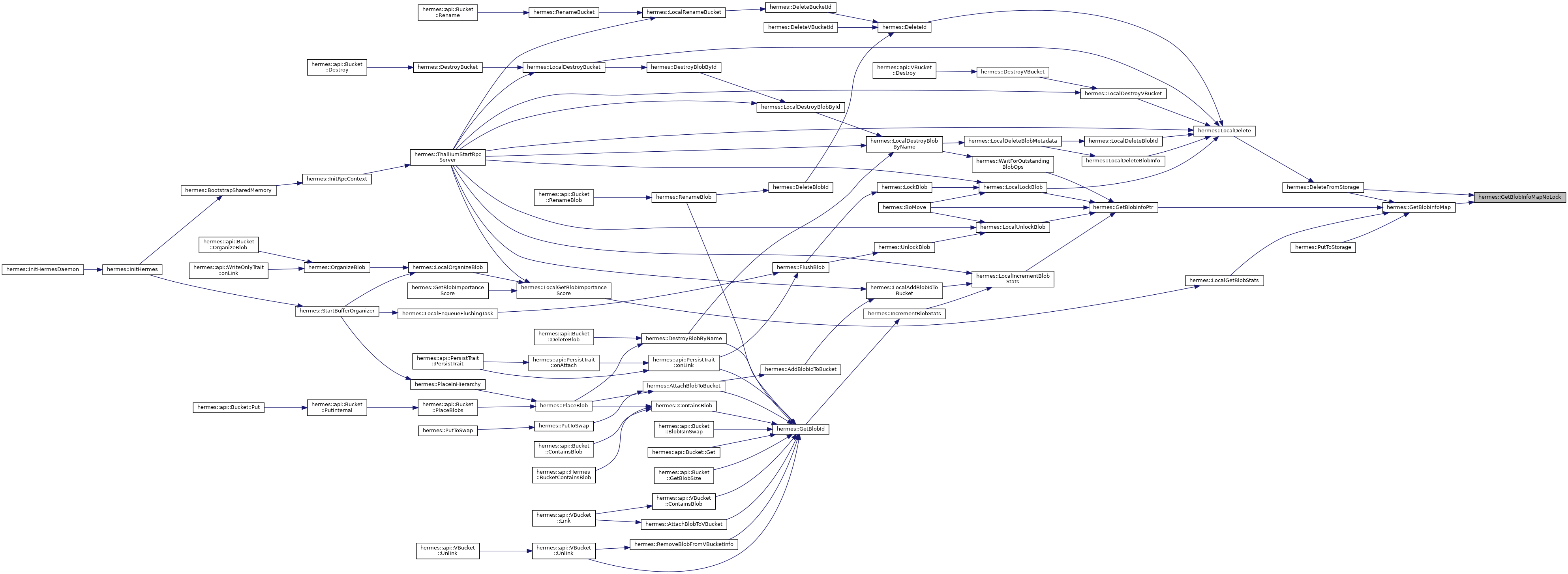
◆ GetBlobInfoMap()
| BlobInfoMap* hermes::GetBlobInfoMap | ( | MetadataManager * | mdm | ) |
get BLOB information map

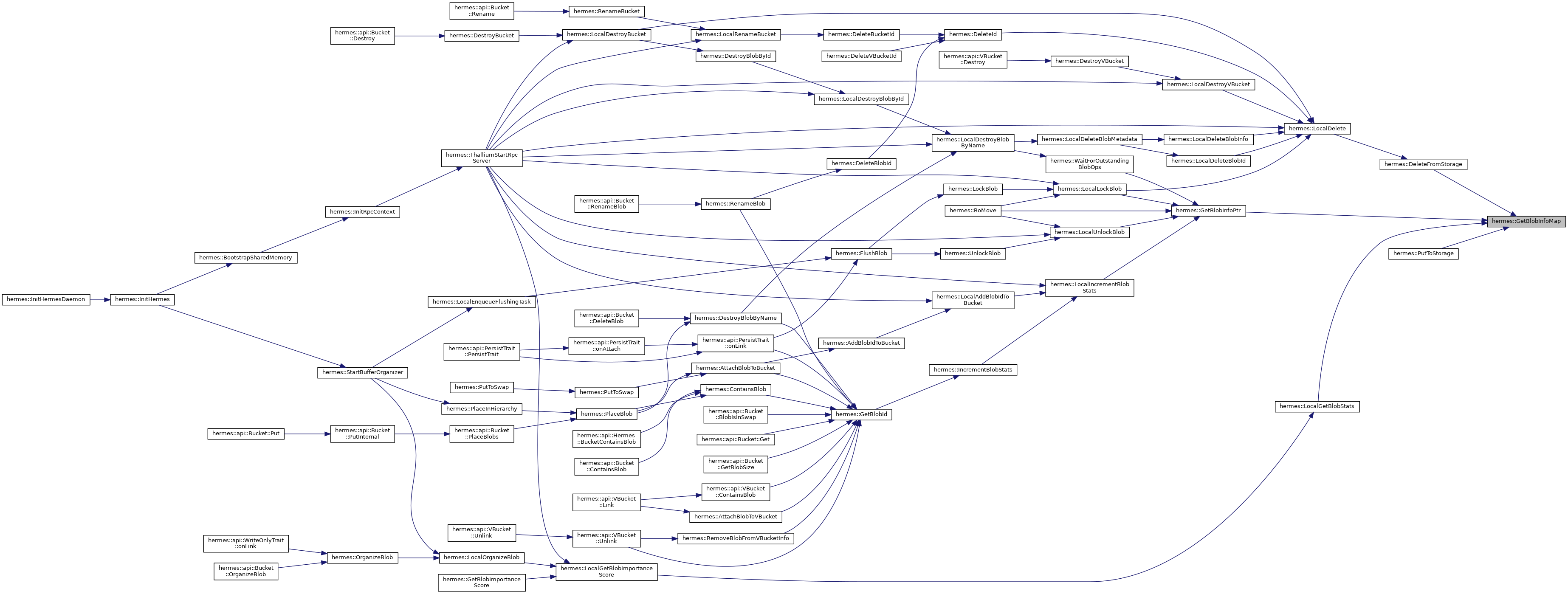
◆ ReleaseMap()
| void hermes::ReleaseMap | ( | MetadataManager * | mdm, |
| MapType | map_type | ||
| ) |
Releases the lock acquired by GetMap.

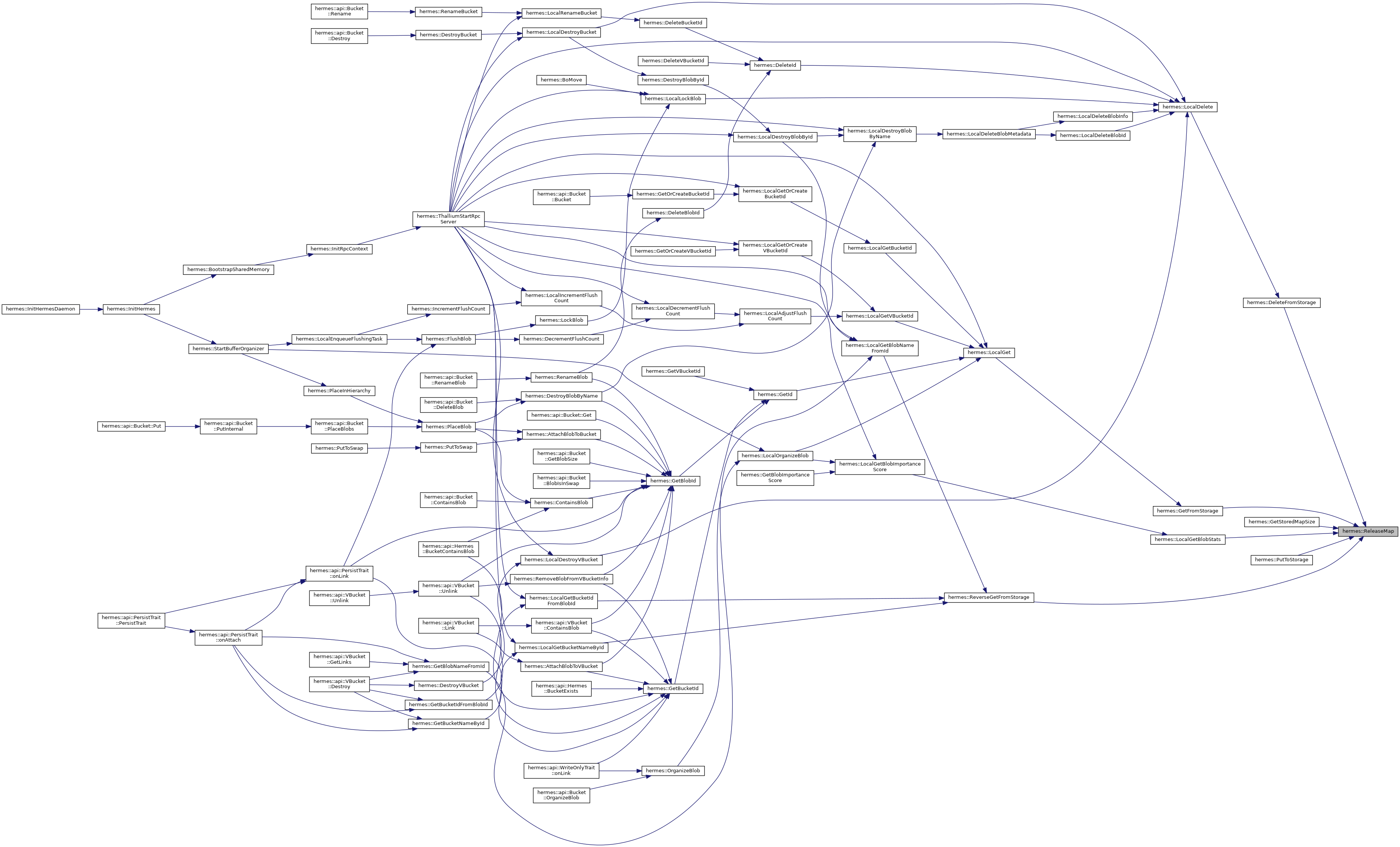
◆ LocalGetBlobStats()
| Stats hermes::LocalGetBlobStats | ( | SharedMemoryContext * | context, |
| BlobID | blob_id | ||
| ) |
get BLOB stats locally
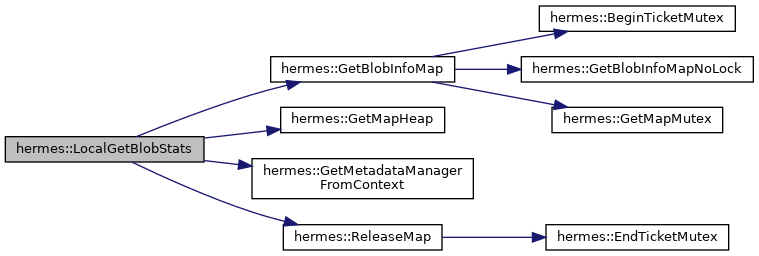

◆ GetEmbeddedIdList()
| IdList hermes::GetEmbeddedIdList | ( | MetadataManager * | mdm, |
| u32 | offset | ||
| ) |
Returns a copy of an embedded IdList.
An IdList that consists of BufferIDs contains an embedded IdList as the first element of the list. This is so the BlobID can find information about its buffers from a single offset. If you want a pointer to the BufferIDs in an IdList, then you have to first retrieve the embedded IdList using this function, and then use the resulting IdList in GetIdsPtr.


◆ GetBufferIdsPtrFromBlobId()
| BufferID* hermes::GetBufferIdsPtrFromBlobId | ( | MetadataManager * | mdm, |
| BlobID | blob_id, | ||
| size_t & | length | ||
| ) |
Return a pointer to the internal array of BufferIDs associated with the blob_id.
Acquires a lock, and must be paired with a call to ReleaseIdsPtr to release the lock. The length of the array is returned in the length parameter.


◆ GetKey()
|
static |
Convert a key offset into the pointer where the string is stored.
Even though our maps are char* -> u64, the keys are not actually pointers to strings, but rather offsets into the shared memory Heap where the strings are stored. This function converts the key at index from an offset to a char*. This produces the equivalent of: char *result = map[index].key;


◆ FreeIdList() [2/2]
| void hermes::FreeIdList | ( | MetadataManager * | mdm, |
| T | id_list | ||
| ) |
free ID list

◆ FreeEmbeddedIdList()
| void hermes::FreeEmbeddedIdList | ( | MetadataManager * | mdm, |
| u32 | offset | ||
| ) |
free embedded ID list


◆ AllocateOrGrowIdList()
| void hermes::AllocateOrGrowIdList | ( | MetadataManager * | mdm, |
| ChunkedIdList * | id_list | ||
| ) |
Assumes the caller has protected id_list with a lock.


◆ GetChunkedIdListElement()
| u64 hermes::GetChunkedIdListElement | ( | MetadataManager * | mdm, |
| ChunkedIdList * | id_list, | ||
| u32 | index | ||
| ) |
get chuncked ID list element

◆ SetChunkedIdListElement()
| void hermes::SetChunkedIdListElement | ( | MetadataManager * | mdm, |
| ChunkedIdList * | id_list, | ||
| u32 | index, | ||
| u64 | value | ||
| ) |
set chuncked ID list element

◆ GetIndexOfId()
| i64 hermes::GetIndexOfId | ( | MetadataManager * | mdm, |
| ChunkedIdList * | id_list, | ||
| u64 | id | ||
| ) |
get index of ID

◆ AllocateEmbeddedIdList()
| u32 hermes::AllocateEmbeddedIdList | ( | MetadataManager * | mdm, |
| u32 | length | ||
| ) |
allocate embedded ID list


◆ HasAllocated()
|
inlinestatic |
is list's capacity greater than 0?

◆ HasAllocatedBlobs() [1/2]
|
inlinestatic |
Has virtual bucket info allocated BLOBS?


◆ HasAllocatedBlobs() [2/2]
|
inlinestatic |
Has bucket info allocated BLOBS?

◆ LocalGetTargets()
| std::vector<TargetID> hermes::LocalGetTargets | ( | SharedMemoryContext * | context, |
| IdList | target_list | ||
| ) |
get targets locally


◆ InitSwapSpaceFilename()
| void hermes::InitSwapSpaceFilename | ( | MetadataManager * | mdm, |
| Arena * | arena, | ||
| Config * | config | ||
| ) |
initialize swap space file name


◆ InitRpcContext()
| void hermes::InitRpcContext | ( | RpcContext * | rpc, |
| u32 | num_nodes, | ||
| u32 | node_id, | ||
| Config * | config | ||
| ) |
initialize RPC context
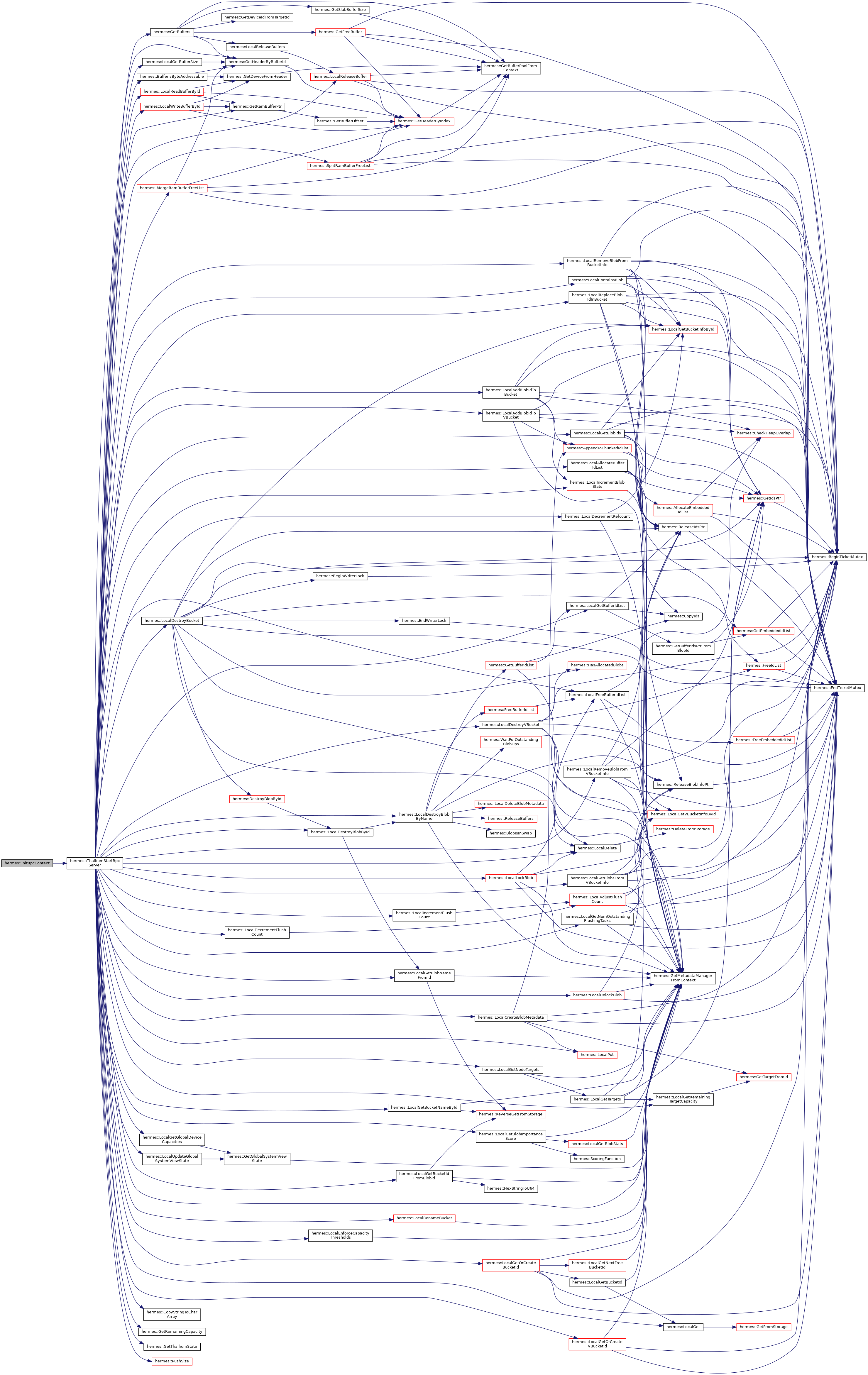

◆ CreateRpcState()
| void * hermes::CreateRpcState | ( | Arena * | arena | ) |
create RPC state

◆ InitRpcClients()
| void hermes::InitRpcClients | ( | RpcContext * | rpc | ) |
initialize RPC clients


◆ ShutdownRpcClients()
| void hermes::ShutdownRpcClients | ( | RpcContext * | rpc | ) |
shut down RPC clients


◆ RunDaemon()
| void hermes::RunDaemon | ( | SharedMemoryContext * | context, |
| RpcContext * | rpc, | ||
| CommunicationContext * | comm, | ||
| Arena * | trans_arena, | ||
| const char * | shmem_name | ||
| ) |
run daemon
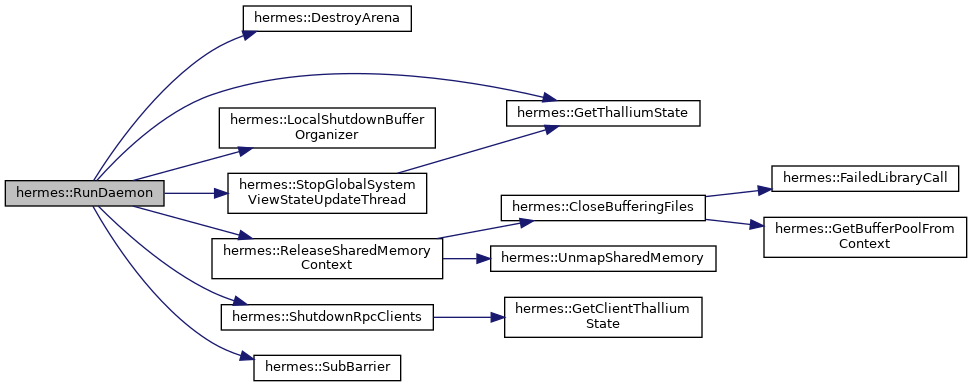

◆ FinalizeClient()
| void hermes::FinalizeClient | ( | SharedMemoryContext * | context, |
| RpcContext * | rpc, | ||
| CommunicationContext * | comm, | ||
| Arena * | trans_arena, | ||
| bool | stop_daemon | ||
| ) |
finalize client
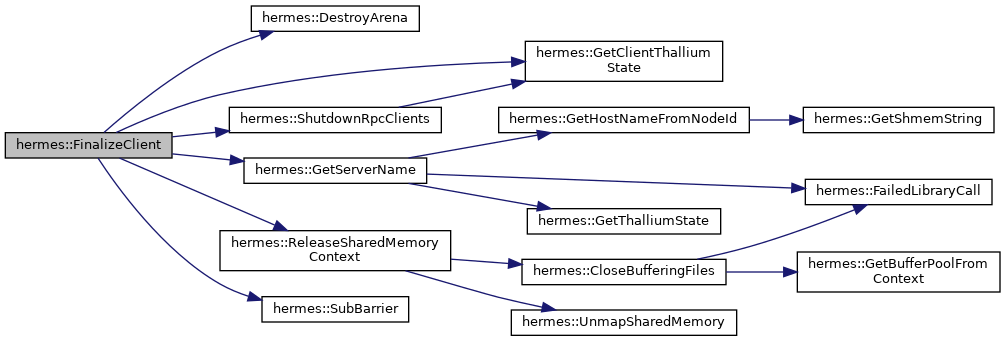

◆ FinalizeRpcContext()
| void hermes::FinalizeRpcContext | ( | RpcContext * | rpc, |
| bool | is_daemon | ||
| ) |
finalize RPC context


◆ GetServerName()
| std::string hermes::GetServerName | ( | RpcContext * | rpc, |
| u32 | node_id, | ||
| bool | is_buffer_organizer | ||
| ) |
get server name


◆ GetProtocol()
| std::string hermes::GetProtocol | ( | RpcContext * | rpc | ) |
get protocol


◆ StartBufferOrganizer()
| void hermes::StartBufferOrganizer | ( | SharedMemoryContext * | context, |
| RpcContext * | rpc, | ||
| Arena * | arena, | ||
| const char * | addr, | ||
| int | num_threads, | ||
| int | port | ||
| ) |
start buffer organizer
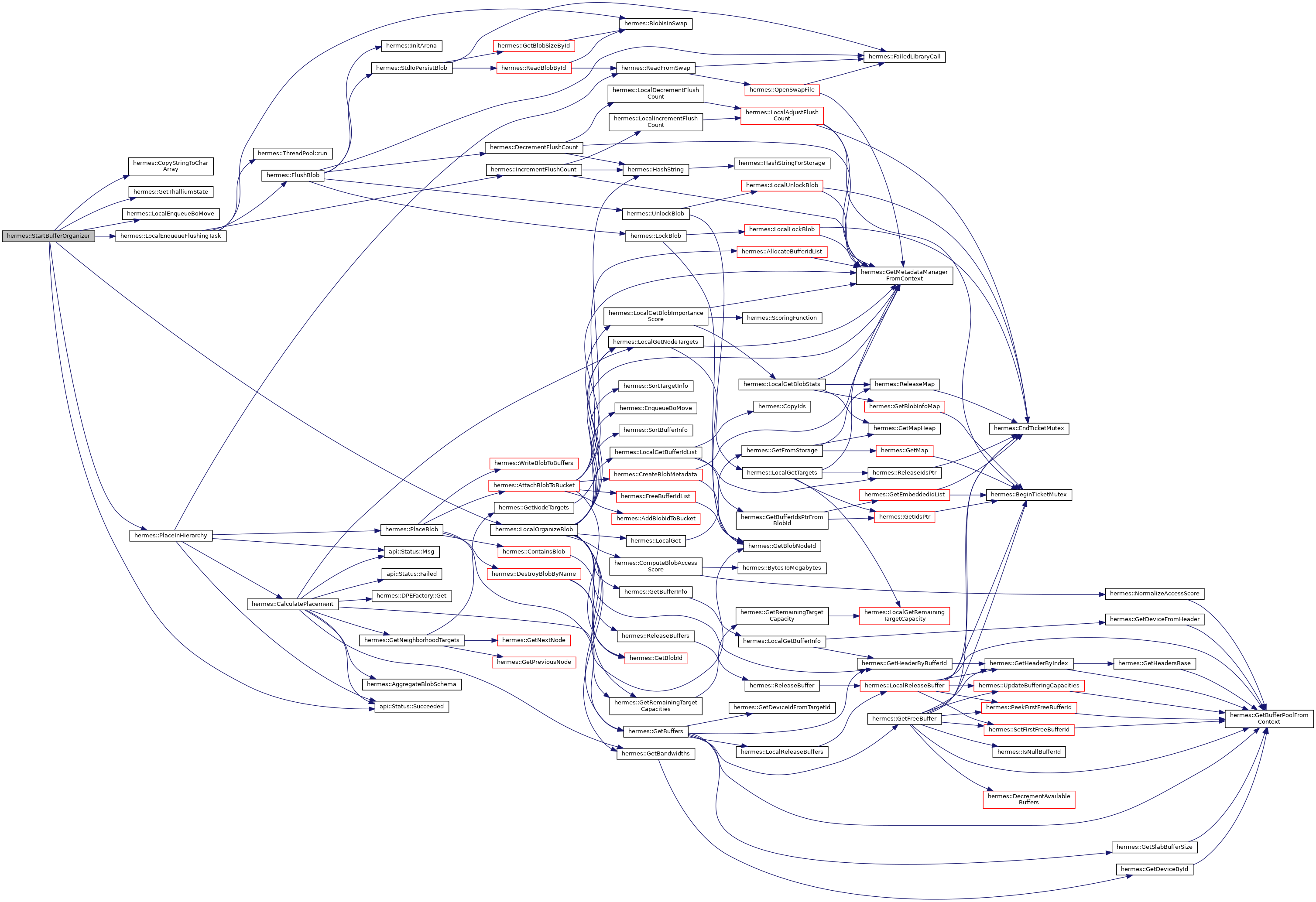

◆ CopyStringToCharArray()
| void hermes::CopyStringToCharArray | ( | const std::string & | src, |
| char * | dest, | ||
| size_t | max | ||
| ) |
copy string to character array

◆ ThalliumStartRpcServer()
| void hermes::ThalliumStartRpcServer | ( | SharedMemoryContext * | context, |
| RpcContext * | rpc, | ||
| Arena * | arena, | ||
| const char * | addr, | ||
| i32 | num_rpc_threads | ||
| ) |
start Thallium RPC server
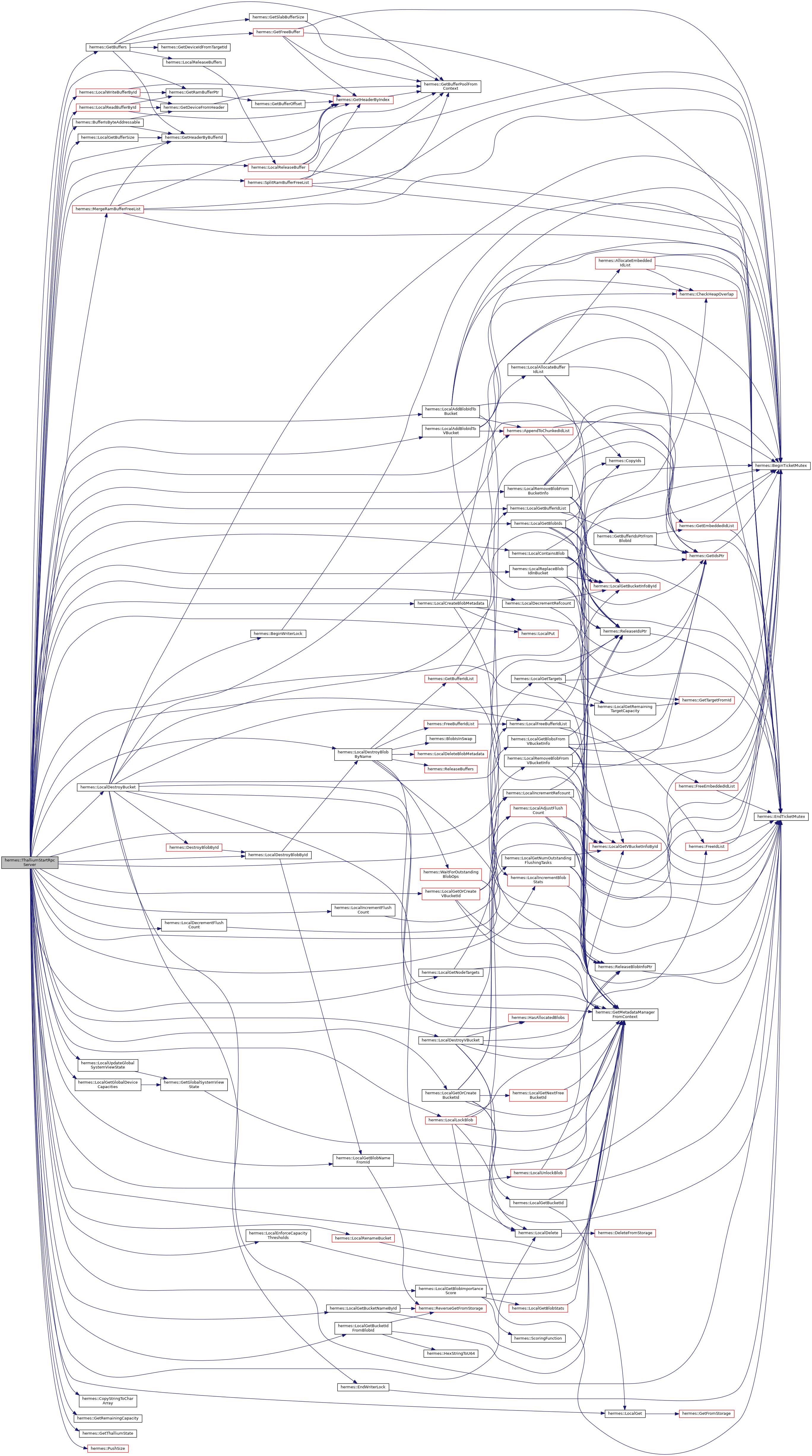

◆ StopGlobalSystemViewStateUpdateThread()
| void hermes::StopGlobalSystemViewStateUpdateThread | ( | RpcContext * | rpc | ) |
stop global system view state update thread


◆ GetHostNameFromNodeId()
| std::string hermes::GetHostNameFromNodeId | ( | RpcContext * | rpc, |
| u32 | node_id | ||
| ) |
get host name from node ID


◆ GetRpcAddress()
| std::string hermes::GetRpcAddress | ( | RpcContext * | rpc, |
| Config * | config, | ||
| u32 | node_id, | ||
| int | port | ||
| ) |
get RPC address


◆ BulkRead()
| size_t hermes::BulkRead | ( | RpcContext * | rpc, |
| u32 | node_id, | ||
| const char * | func_name, | ||
| u8 * | data, | ||
| size_t | max_size, | ||
| BufferID | id | ||
| ) |
read bulk


◆ serialize() [1/10]
| void hermes::serialize | ( | A & | ar, |
| BufferID & | buffer_id | ||
| ) |
◆ serialize() [2/10]
| void hermes::serialize | ( | A & | ar, |
| BucketID & | bucket_id | ||
| ) |
◆ serialize() [3/10]
| void hermes::serialize | ( | A & | ar, |
| VBucketID & | vbucket_id | ||
| ) |
◆ serialize() [4/10]
| void hermes::serialize | ( | A & | ar, |
| BlobID & | blob_id | ||
| ) |
◆ serialize() [5/10]
| void hermes::serialize | ( | A & | ar, |
| TargetID & | target_id | ||
| ) |
◆ serialize() [6/10]
| void hermes::serialize | ( | A & | ar, |
| SwapBlob & | swap_blob | ||
| ) |
serialize swap_blob
◆ serialize() [7/10]
| void hermes::serialize | ( | A & | ar, |
| BufferInfo & | info | ||
| ) |
serialize info
◆ save() [1/4]
| void hermes::save | ( | A & | ar, |
| MapType & | map_type | ||
| ) |
Lets Thallium know how to serialize a MapType.
This function is called implicitly by Thallium.
- Parameters
-
ar An archive provided by Thallium. map_type The MapType to serialize.
◆ load() [1/4]
| void hermes::load | ( | A & | ar, |
| MapType & | map_type | ||
| ) |
Lets Thallium know how to serialize a MapType.
This function is called implicitly by Thallium.
- Parameters
-
ar An archive provided by Thallium. map_type The MapType to serialize.
◆ save() [2/4]
| void hermes::save | ( | A & | ar, |
| BoPriority & | priority | ||
| ) |
save priority
◆ load() [2/4]
| void hermes::load | ( | A & | ar, |
| BoPriority & | priority | ||
| ) |
load priority
◆ save() [3/4]
| void hermes::save | ( | A & | ar, |
| ThresholdViolation & | violation | ||
| ) |
save violation
◆ load() [3/4]
| void hermes::load | ( | A & | ar, |
| ThresholdViolation & | violation | ||
| ) |
load violation
◆ save() [4/4]
| void hermes::save | ( | A & | ar, |
| BoOperation & | op | ||
| ) |
save buffer organizer op
◆ load() [4/4]
| void hermes::load | ( | A & | ar, |
| BoOperation & | op | ||
| ) |
load buffer organizer op
◆ serialize() [8/10]
| void hermes::serialize | ( | A & | ar, |
| BoArgs & | bo_args | ||
| ) |
serialize buffer organizer arguments
◆ serialize() [9/10]
| void hermes::serialize | ( | A & | ar, |
| BoTask & | bo_task | ||
| ) |
serialize buffer organizer task
◆ serialize() [10/10]
| void hermes::serialize | ( | A & | ar, |
| ViolationInfo & | info | ||
| ) |
serialize violation information
◆ GetThalliumState()
|
inlinestatic |
get Thallium state

◆ GetClientThalliumState()
|
inlinestatic |
get Thallium client state

◆ IsBoFunction()
|
static |
is func_name buffer organizer function?

◆ RpcCall()
| ReturnType hermes::RpcCall | ( | RpcContext * | rpc, |
| u32 | node_id, | ||
| const char * | func_name, | ||
| Ts... | args | ||
| ) |
RPC call

◆ RoundUpToMultiple()
| size_t hermes::RoundUpToMultiple | ( | size_t | val, |
| size_t | multiple | ||
| ) |
Rounds a value up to the next given multiple.
Returns the original value if it is already divisible by multiple.
Example:
- Parameters
-
val The initial value to round. multiple The multiple to round up to.
- Returns
- The next multiple of multiple that is greater than or equal to val.

◆ RoundDownToMultiple()
| size_t hermes::RoundDownToMultiple | ( | size_t | val, |
| size_t | multiple | ||
| ) |
Rounds a value down to the previous given multiple.
Returns the original value if it is already divisible by multiple.
Example:
- Parameters
-
val The initial value to round. multiple The multiple to round down to.
- Returns
- The previous multiple of multiple that is less than or equal to val.

◆ InitDefaultConfig()
| void hermes::InitDefaultConfig | ( | Config * | config | ) |
◆ FailedLibraryCall()
| void hermes::FailedLibraryCall | ( | std::string | func | ) |
print an error message for func function that failed

Variable Documentation
◆ kGlobalDebugMaxAllocations
| const int hermes::kGlobalDebugMaxAllocations = KILOBYTES(64) |
global debug maxium allocations
◆ global_debug_id_state
| DebugState* hermes::global_debug_id_state |
global debug id state
◆ global_debug_map_state
| DebugState* hermes::global_debug_map_state |
global debug map state
◆ global_debug_map_name
| char hermes::global_debug_map_name[] = "/hermes_debug_map_heap" |
name for global debug map heap
◆ global_debug_id_name
| char hermes::global_debug_id_name[] = "/hermes_debug_id_heap" |
name for global debug id heap
◆ kDefaultCoeffs
| const size_t hermes::kDefaultCoeffs = 1000 + 1 |
GLPK documentation: http://most.ccib.rutgers.edu/glpk.pdf
◆ kMaxBufferPoolSlabs
|
staticconstexpr |
max. buffer pool slabs
◆ kMaxPathLength
|
constexpr |
max. path length
◆ kMaxBufferPoolShmemNameLength
|
constexpr |
max. buffer pool shared memory name length
◆ kMaxDevices
|
constexpr |
max. devices
◆ kMaxBucketNameSize
|
constexpr |
max. bucket name size
◆ kMaxVBucketNameSize
|
constexpr |
max. virtual bucket name size
◆ kPlaceInHierarchy
|
constexpr |
a string to represent the place in hierarchy
◆ kSwapTargetId
| const TargetID hermes::kSwapTargetId = {{0, 0, 0}} |
A constant for swap target IDs
◆ kBucketIdStringSize
|
constexpr |
A constant for bucket id string size
◆ kMaxBlobNameSize
|
constexpr |
The maximum size in bytes allowed for Blob names.
◆ kAttemptsBeforeYield
| const int hermes::kAttemptsBeforeYield = 100 |
A constant value for maximum attempts for ticket lock
◆ hextable
|
static |
- Note
- (chogan): Lookup table for HexStringToU64()
◆ kGlobalMutexNodeId
|
static |
global mutex node ID
◆ kIdListChunkSize
| const int hermes::kIdListChunkSize = 10 |
chunk size of ID list
◆ kMaxTraitsPerVBucket
|
staticconstexpr |
maxinum number of traits per bucket
◆ kMaxServerNameSize
| const int hermes::kMaxServerNameSize = 128 |
maximum size of server name
◆ kMaxServerSuffixSize
| const int hermes::kMaxServerSuffixSize = 16 |
maximum size of server suffix
◆ kMaxServerNamePrefix
| const int hermes::kMaxServerNamePrefix = 32 |
max. server name prefix
◆ kMaxServerNamePostfix
| const int hermes::kMaxServerNamePostfix = 8 |
max. server name suffix
◆ kBoPrefix
| const char hermes::kBoPrefix[] = "BO::" |
buffer organizer prefix
◆ kBoPrefixLength
| const int hermes::kBoPrefixLength = sizeof(kBoPrefix) - 1 |
buffer organizer prefix length





